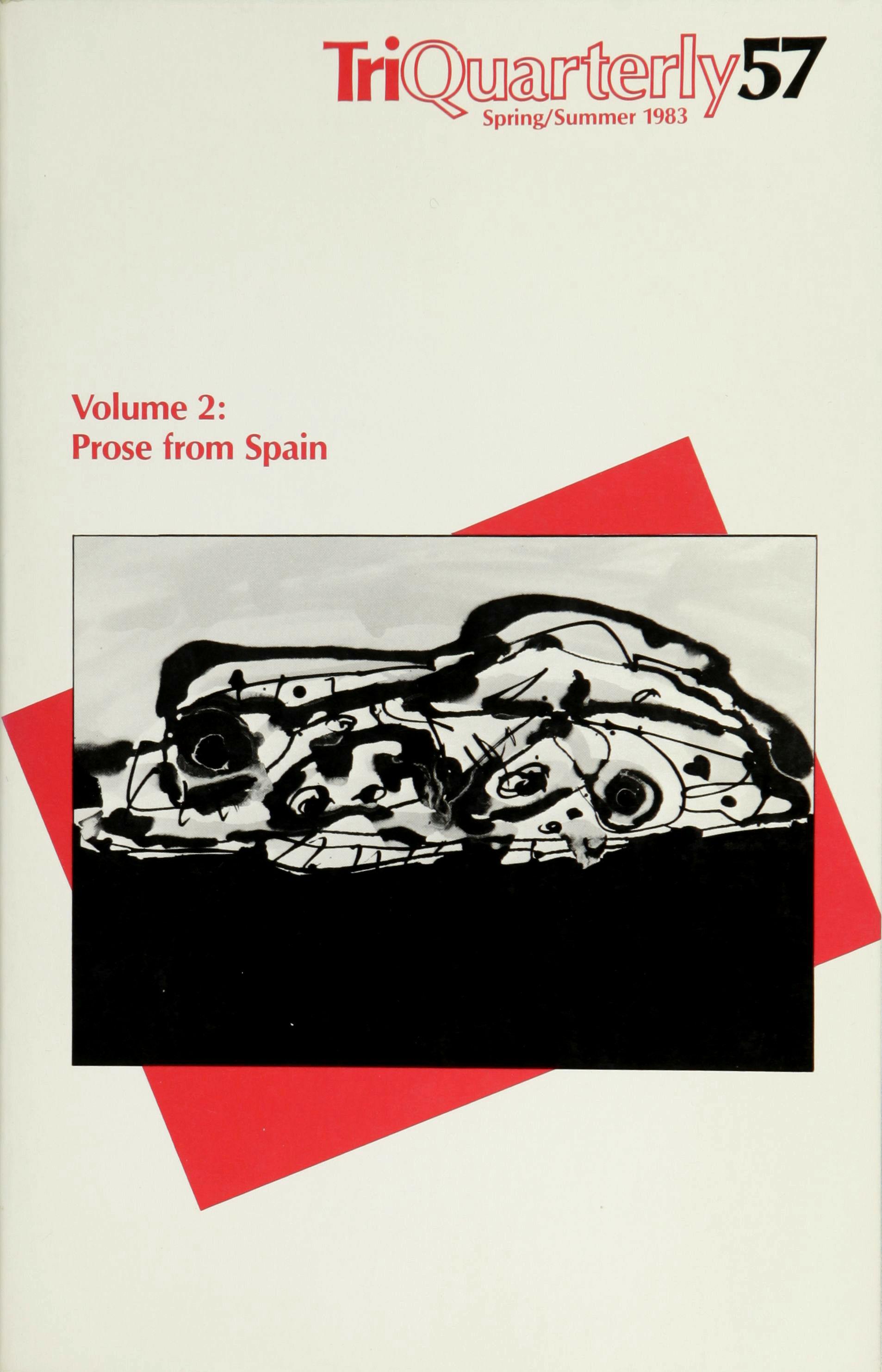
Volume 2: Prose from Spain

SprinK/Summer 1983

Volume 2 of 2 Volumes: Prose from Spain
Editor
Coeditors of this volume
Associate Editor
Managing Editor
Manuscripts Editor
Assistant Editor
Design Director
TriQuarterly Fellow
Editorial Assistants
Advisory Editors
Reginald Gibbons
Reginald Gibbons, Anthony L. Geist, David Hayman, Suzanne Jill Levine
Bob Perlongo
Molly McQuade
Susan Hahn
Fred Shafer
Gini Kondziolka
Chris Olson
Will Johnson, Joe laRusso, Michael Lindsay, David Simpatico
Robert Alter, Michael Anania, Elliott Anderson, Terrence Des Pres, Gloria Emerson, Richard Ford, George Garrett, Gerald Graff, Francine du Plessix Gray, Michael S. Harper, David Hayman, Bill Henderson, Maxine Kumin, Elizabeth Pochoda, Michael Ryan
TRIQUARTERLY IS AN INTERNATIONAL JOURNAL OF ART. WRITING, AND CULTURALlNQUIRY PUBUSHED IN THE FALL, WINTER, AND SPRING AT NORTHWESTERN UNIVERSITY. EVANSTON, ILLINOIS 60201.
Subscription rates: one year $14.00; two years $25.00; three years $35.00. Foreign subscriptions $3.00 per year additional. Life subscription $100.00. USA or foreign. Single copies usually $5.95. This issue: $3.95 each volume. Correspondence and subscriptions should be addressed to Tri�rterly, NORTHWESTERN UNIVERSITY. 1735 Benson Avenue. Evanston, Illinois 60201. The editors invite submissions of fiction. poetry. and literary essays. No manuscripts will be returned unless accompanied by a stamped. selfaddressed envelope. All manuscripts accepted for publication become the property of TriQuarterIy, unless otherwise indicated. Copyright © 1983 by TriQj.Jarterly. All rights reserved. The views expressed in this magazine are to be attributed to the writers. not the editors or sponsors. Printed in the United States of America.
National distributor to retail trade: B. Deboer, 113 East Central Street-Rear, Nurlev, New Jersey 07110. Distributor for West Coast trade: Bookpeople, 2940 Seventh Street. Berkeley. California 94710. Midwest: Bookslinger, 330 East Ninth Street, St. Paul. Minnesota 55101 and Prairie News Agency, 2404 West Hirsch Street, Chicago, Illinois 60622.
Reprints of back Issues of Tri�rterly are available in full format from Kraus Reprint Company. Route 100, Millwood. New York 10546, and in microfilm from University Microfilms International, 300 North Zeeb Road. Ann Arbor, Michigan 48106. ISSN: 00413097.
57
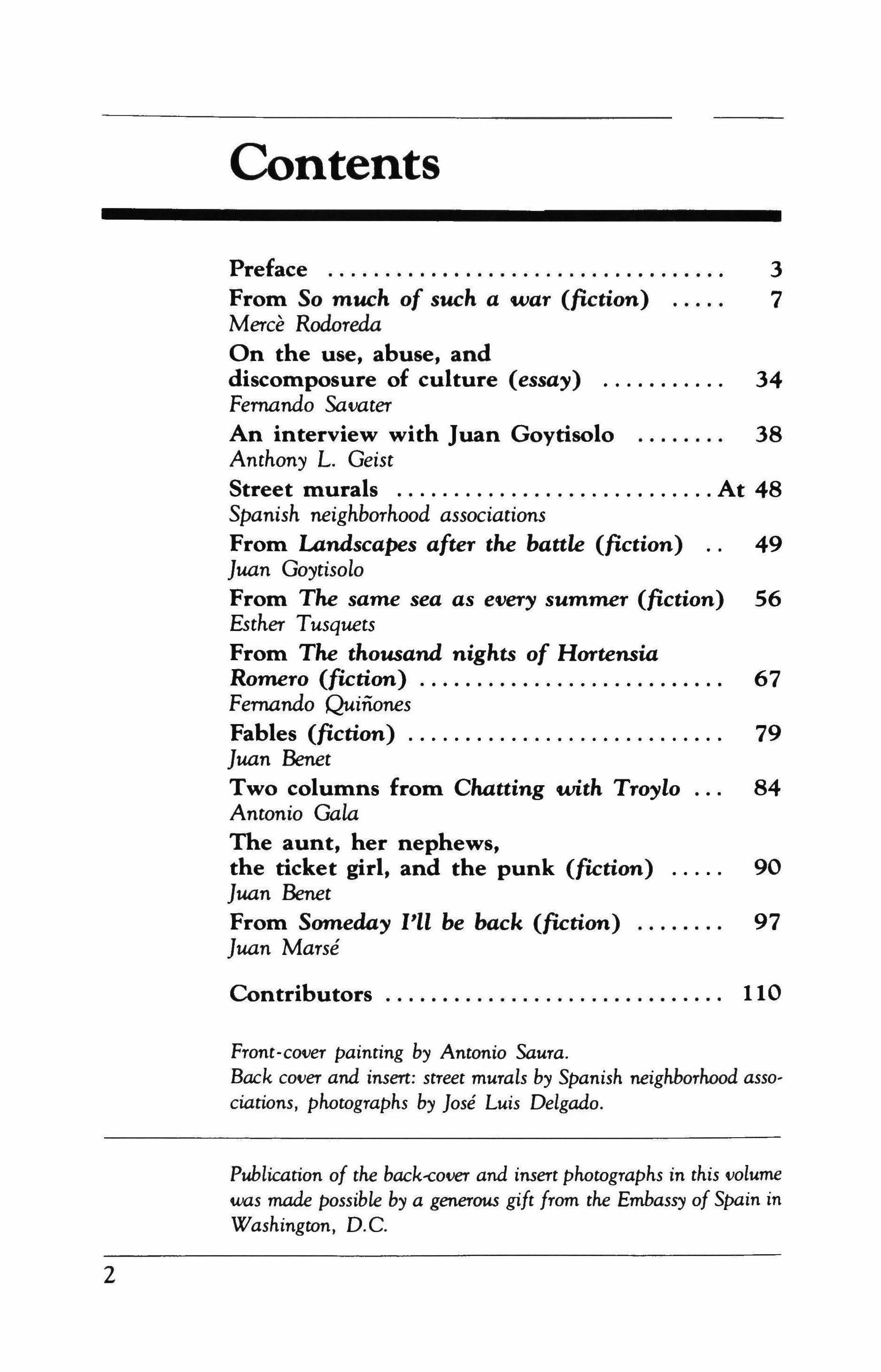
Contents Preface 3 From So much of such a war (fiction) 7 Merce Rodoreda On the use, abuse, and discomposure of culture (essay) Fernando S£lVater 34 An interview with Juan Govtisolo 38 Anthony L. Geist Street murals At 48 Spanish neighborhood associations From Landscapes after the battle (fiction) 49 Juan Goytisolo From The same sea as every summer (fiction) 56 Esther Tusquets From The thousand nights of Hortensia Romero (fiction) 67 Fernando Quinones Fables (fiction) 79 Juan Benet Two columns from Chatting with Troylo 84 Antonio Gala The aunt, her nephews, the ticket girl, and the punk (f-rction) 90 Juan Benet From Someday I'll be back (fiction) 97 Juan Marse Contributors 110 Front-cover painting by Antonio Saura. Back cover and insert: street murals by Spanish neighborhood associations, photographs by Jose Luis Delgado. Publication of the back-cover and insert photographs in this tlolume was made possible by a generous gift from the Embassy of Spain in Washington, D.C. 2
Preface
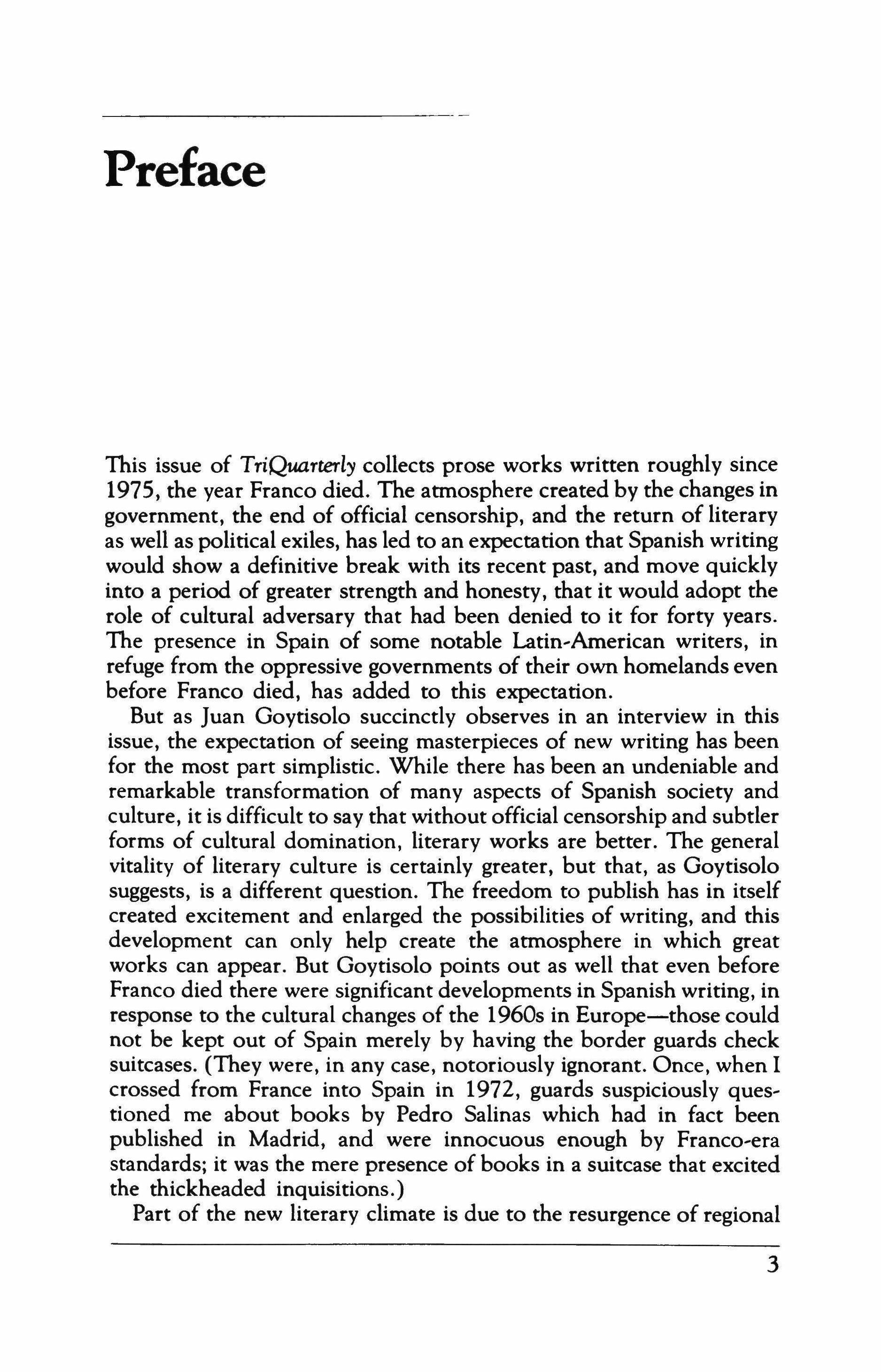
This issue of TriQuarterly collects prose works written roughly since 1975, the year Franco died. The atmosphere created by the changes in government, the end of official censorship, and the return of literary as well as political exiles, has led to an expectation that Spanish writing would show a definitive break with its recent past, and move quickly into a period of greater strength and honesty, that it would adopt the role of cultural adversary that had been denied to it for forty years. The presence in Spain of some notable Latin-American writers, in refuge from the oppressive governments of their own homelands even before Franco died, has added to this expectation.
But as Juan Goytisolo succinctly observes in an interview in this issue, the expectation of seeing masterpieces of new writing has been for the most part simplistic. While there has been an undeniable and remarkable transformation of many aspects of Spanish society and culture, it is difficult to say that without official censorship and subtler forms of cultural domination, literary works are better. The general vitality of literary culture is certainly greater, but that, as Goytisolo suggests, is a different question. The freedom to publish has in itself created excitement and enlarged the possibilities of writing, and this development can only help create the atmosphere in which great works can appear. But Goytisolo points out as well that even before Franco died there were significant developments in Spanish writing, in response to the cultural changes of the 1960s in Europe-those could not be kept out of Spain merely by having the border guards check suitcases. (They were, in any case, notoriously ignorant. Once, when I crossed from France into Spain in 1972, guards suspiciously questioned me about books by Pedro Salinas which had in fact been published in Madrid, and were innocuous enough by Franco-era standards; it was the mere presence of books in a suitcase that excited the thickheaded inquisitions.)
Part of the new literary climate is due to the resurgence of regional
3
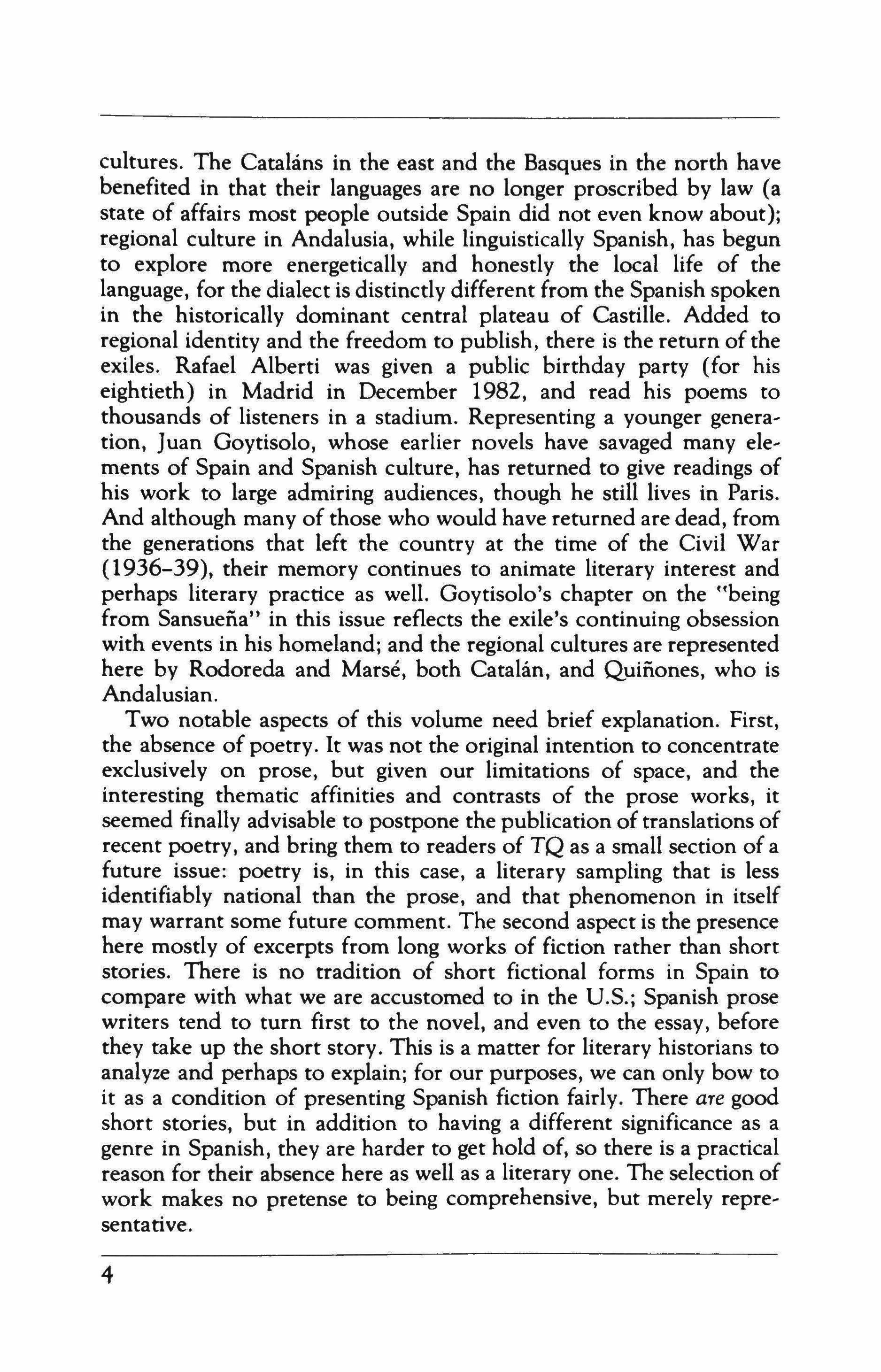
cultures. The Catalans in the east and the Basques in the north have benefited in that their languages are no longer proscribed by law (a state of affairs most people outside Spain did not even know about); regional culture in Andalusia, while linguistically Spanish, has begun to explore more energetically and honestly the local life of the language, for the dialect is distinctly different from the Spanish spoken in the historically dominant central plateau of Castille. Added to regional identity and the freedom to publish, there is the return of the exiles. Rafael Alberti was given a public birthday party (for his eightieth) in Madrid in December 1982, and read his poems to thousands of listeners in a stadium. Representing a younger genera, tion, Juan Goytisolo, whose earlier novels have savaged many elements of Spain and Spanish culture, has returned to give readings of his work to large admiring audiences, though he still lives in Paris. And although many of those who would have returned are dead, from the generations that left the country at the time of the Civil War (1936-39), their memory continues to animate literary interest and perhaps literary practice as well. Goytisolo's chapter on the "being from Sansuefia" in this issue reflects the exile's continuing obsession with events in his homeland; and the regional cultures are represented here by Rodoreda and Marse, both Catalan, and Quinones, who is Andalusian.
Two notable aspects of this volume need brief explanation. First, the absence of poetry. It was not the original intention to concentrate exclusively on prose, but given our limitations of space, and the interesting thematic affinities and contrasts of the prose works, it seemed finally advisable to postpone the publication of translations of recent poetry, and bring them to readers of TQ as a small section of a future issue: poetry is, in this case, a literary sampling that is less identifiably national than the prose, and that phenomenon in itself may warrant some future comment. The second aspect is the presence here mostly of excerpts from long works of fiction rather than short stories. There is no tradition of short fictional forms in Spain to compare with what we are accustomed to in the U.S.; Spanish prose writers tend to turn first to the novel, and even to the essay, before they take up the short story. This is a matter for literary historians to analyze and perhaps to explain; for our purposes, we can only bow to it as a condition of presenting Spanish fiction fairly. There are good short stories, but in addition to having a different significance as a genre in Spanish, they are harder to get hold of, so there is a practical reason for their absence here as well as a literary one. The selection of work makes no pretense to being comprehensive, but merely representative.
4

With its sister volume devoted to writings from the last two years in Poland, the Spanish volume appears at a moment when the two cultures of Spain and Poland offer interesting perspectives on each other. The first notable contrast is that the Polish work tends to be much more documentary, and this contrast has its root in the fact that under Franco's censorship, the Spanish writers had no underground publishing, but instead, reacting as if literary conditions in Spain were much more like those in France, say, than those in Poland, continued to publish what it was possible to publish-work that did not openly criticize the regime or strike the censors as immoral under Franco's repressive standards (which now, having vanished, have of course left the door open to pornography, also). Foreigners and Spaniards alike were much freer to enter and leave the country than in any East European country, and a strong semblance of openness was maintained. Foreign literary publications could be received, even if they could not be published in Spanish translation. But the final result among writers was the habit of self-censorship in a very subtle and pervasive form, and a kind of demoralization that sent writers like Goytisolo abroad to stay. So Spanish writing during the Franco years and afterward tends to reflect the formal experimentation of writers in other western countries, and conveys an impression ofstrictly literary value that contrasts with the impression one gets from recent Polish writing of aesthetic concerns often subordinated to documentary ones.
This does not mean the Spaniards acquiesced to past oppression. Now, in fact, they are quite unwilling to let go of memories of the official shackling of culture. The photos in this issue of street murals, all of which were painted by Spanish neighborhood associations, vividly recall the Civil War and its long aftermath, and do so not only in political but also in cultural terms. Picasso's "Guernica" appears on the side of a small building; the poets Miguel Hernandez, who died in prison shortly after the end of the Civil War, and Antonio Machado, who died after crossing the border into France with other refugees, are both memorialized. These two portrait murals were painted in 1976. When Jose Luis Delgado, who has photographed perhaps hundreds of these murals since 1975, went to Andalusia in January 1983, he discovered that many of the murals were gone-the walls on which they had been painted, invariably humble, had been torn down to make way for.condos and office buildings. Progress in art had yielded to Progress.
This points again to the fruitful contrast between the Spanish and Polish volumes of TQ. If the Polish writers wish to have the "normal" life of men and women as their subject (see the diary by Kazimierz
5

Brandys in TQ #57, Vol. I) rather than a life distorted by the extremes of censorship, internment, shortages, and the absence of basic human freedoms, the Spanish writers have found that their versions of these problems, once removed, give way to other problems-bespeaking fuller life, indeed, and no less of a challenge to the writer. But it may take some time before the wounds of the Civil War and the long bleak years that followed it are healed, and before writers feel free this time not from an oppressive government but from the present compulsion to address the way those lives must negotiate an enormous maze of cultural and political, as well as domestic, difficulty. Perhaps it is we who are too unthinking in separating the two spheres, however, and they who-having had the necessity forced on them by their historyare now exploring connections that we should heed more than we do.
This project was postponed many times, until, when I took it on in late 1981, some of the works that had been gathered by the original coeditors, David Hayman and Suzanne Jill Levine, had already found their way into print in English elsewhere. A few others I chose not to include for editorial reasons. But Juan Benet's story and the excerpt from Esther Tusquets' novel date from the project's beginnings. With the help of Anthony L. Geist, the rest of the volume was assembled over the space of many months. A sign of the changing times in Spain is a generous contribution by the Spanish embassy in Washington toward the costs of producing this volume. A few years ago, this would have been as unthinkable as the presence, in Spain, of Picasso's "Guernica.
-Reginald Gibbons
February I9B3
6
From So much of such a war
Merce Rodoreda

The escape
A light breeze came in through the window. When the clock in the dining room struck three I got up and made my escape without, as they say, washing my face and with only what I had on. After going about fifty steps something made me turn around and look at the house. It was shining bright in the moonlight. Standing there in the doorway with me in his arms when I was a child was my father, looking at me. It was the first time I was going out alone at night in streets that weren't in my own neighborhood. I ran. Goodbye, carnations, goodbye! Rossend and I were supposed to meet in the jardinets: he was going to come with a van that he didn't know how to explain to me that he had gotten. I am the friend of a very important Captain and we do what we want to. Rossend wasn't in the Jardinets, and there wasn't any van. But, whatever happened, I couldn't go back home. It had gotten stuck in my head to go to the war, and to the war I would go. Maybe Rossend, who had to escape in secret also, hadn't been able to come. After waiting a little while under the blue street lights, I sat down on a bench, I got up from the bench, and I sat down again. I crossed the street and half hid in a doorway because people were coming. I sat down on the doorstep. Opposite me were the fountain, the plants, the trees. The moon was coming through the leaves and spattering the ground with light. I got up from the doorstep and went over to the bench again. For a good long while I couldn't stop going from one side to the other. Finally a white van with black and red letters plastered all over both sides stopped in front of me. Rossend and three other boys jumped out just as the sirens began to wail. And right away the beams of the antiaircraft searchlights began to sweep the sky. I would have liked to see a bomb fall. The airplane passed over us,
7

very low; we could hear the engine almost on top of the houses. The antiaircraft guns were spitting fire. Get down. Get against the wall, the antiaircraft guns are more dangerous than the bombs. Those sirens Rossend covered his ears and closed his eyes. One of the three boys, the one who seemed to be the youngest of the three, said in a deep man's voice, if those sirens bother you I'd like to see what you look like at the front, where they never stop. I just came from the front, said another of the boys, who was wearing a red handkerchief around his neck and a knife stuck in his belt, let them bomb as much as they want; it won't do them any good. We're stronger. You can't mess around with the People. The other side, they start to run when they see us. Word of honor. They hide. I stand up on the top ofthe trench with the butt of the gun on my thigh So they can take your picture, said the one with the deep voice. Shut up. Rossend asked him: and they shoot to kill? Shut up. And the boy who hadn't said anything the whole time said without looking at us, but you've never been to the front, have you? What do you mean? And this wound here in my leg, what does it say? He rolled up a pant-leg and showed us a red scar near his knee. You got that wound from who knows what kind of animal kicking you. You always have to contradict me. Because I know you and I know you lie more than you talk straight The sound of the airplane was getting farther away. The antiaircraft lights were still clawing at the sky. Everyone in the van! Now we're beginning to live, Rossend said, grabbing the steering wheel. The boy with the red neckerchief sat next to him. I got in the back with the others. In one corner were half a dozen rifles. If I liked the idea of going to the war, it was, among other things, because of going with Rossend; I had known him since we were children, we had played together, we were friends, he lived near my house. These others I didn't know where they came from, where they had been born, or who their parents were.
They were a drag If Rossend had at least let me sit next to him I crawled into a corner. The boys were stretched out on the floor and I stretched out too. They stank. They were breathing heavily. The one with the deep voice made a strange sound with his teeth every once in a while. The shaking of the truck was putting me to sleep. Why did Rossend have to be such good friends with the boy with the red handkerchief who stood up on the trench if the others said he was a liar? A dream was jumbling up my head and I began to see my father waving goodbye to me beneath a house hanging in midair all tiled with shining colors and the blue streetlights and the moonlight through the leaves and everything was beginning to spin: father, father's hand, shining house, moonlight, blue streetlights, spears of light against the sky I got to the front lines fast asleep.
B
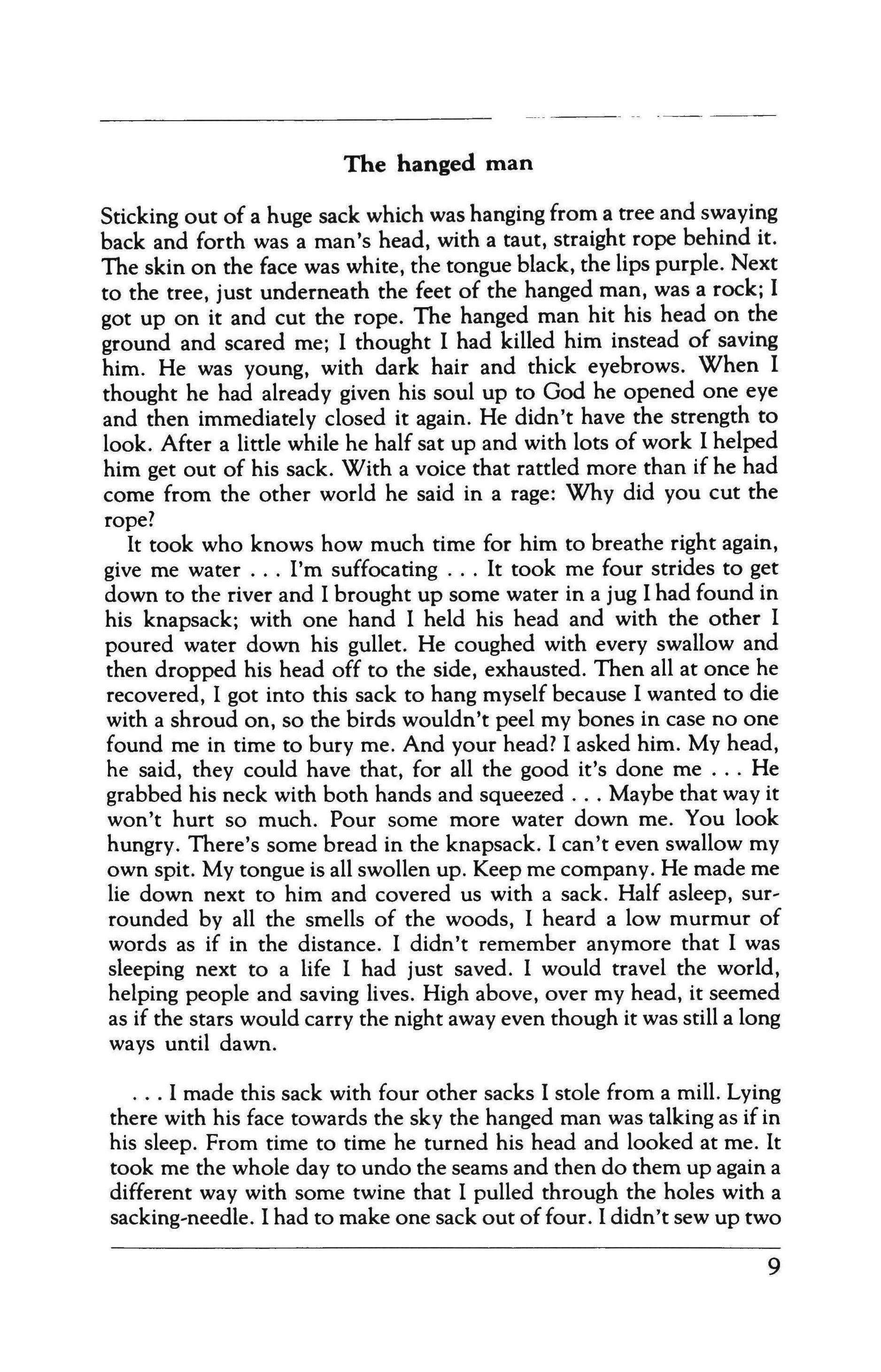
The hanged man
Sticking out of a huge sack which was hanging from a tree and swaying back and forth was a man's head, with a taut, straight rope behind it. The skin on the face was white, the tongue black, the lips purple. Next to the tree, just underneath the feet of the hanged man, was a rock; I got up on it and cut the rope. The hanged man hit his head on the ground and scared me; I thought I had killed him instead of saving him. He was young, with dark hair and thick eyebrows. When I thought he had already given his soul up to God he opened one eye and then immediately closed it again. He didn't have the strength to look. After a little while he half sat up and with lots of work I helped him get out of his sack. With a voice that rattled more than if he had come from the other world he said in a rage: Why did you cut the rope?
It took who knows how much time for him to breathe right again, give me water I'm suffocating It took me four strides to get down to the river and I brought up some water in a jug I had found in his knapsack; with one hand I held his head and with the other I poured water down his gullet. He coughed with every swallow and then dropped his head off to the side, exhausted. Then all at once he recovered, I got into this sack to hang myself because I wanted to die with a shroud on, so the birds wouldn't peel my bones in case no one found me in time to bury me. And your head? I asked him. My head, he said, they could have that, for all the good it's done me He grabbed his neck with both hands and squeezed Maybe that way it won't hurt so much. Pour some more water down me. You look hungry. There's some bread in the knapsack. I can't even swallow my own spit. My tongue is all swollen up. Keep me company. He made me lie down next to him and covered us with a sack. Half asleep, surrounded by all the smells of the woods, I heard a low murmur of words as if in the distance. I didn't remember anymore that I was sleeping next to a life I had just saved. I would travel the world, helping people and saving lives. High above, over my head, it seemed as if the stars would carry the night away even though it was still a long ways until dawn
I made this sack with four other sacks I stole from a mill. Lying there with his face towards the sky the hanged man was talking as if in his sleep. From time to time he turned his head and looked at me. It took me the whole day to undo the seams and then do them up again a different way with some twine that I pulled through the holes with a sacking-needle. I had to make one sack out of four. I didn't sew up two
9
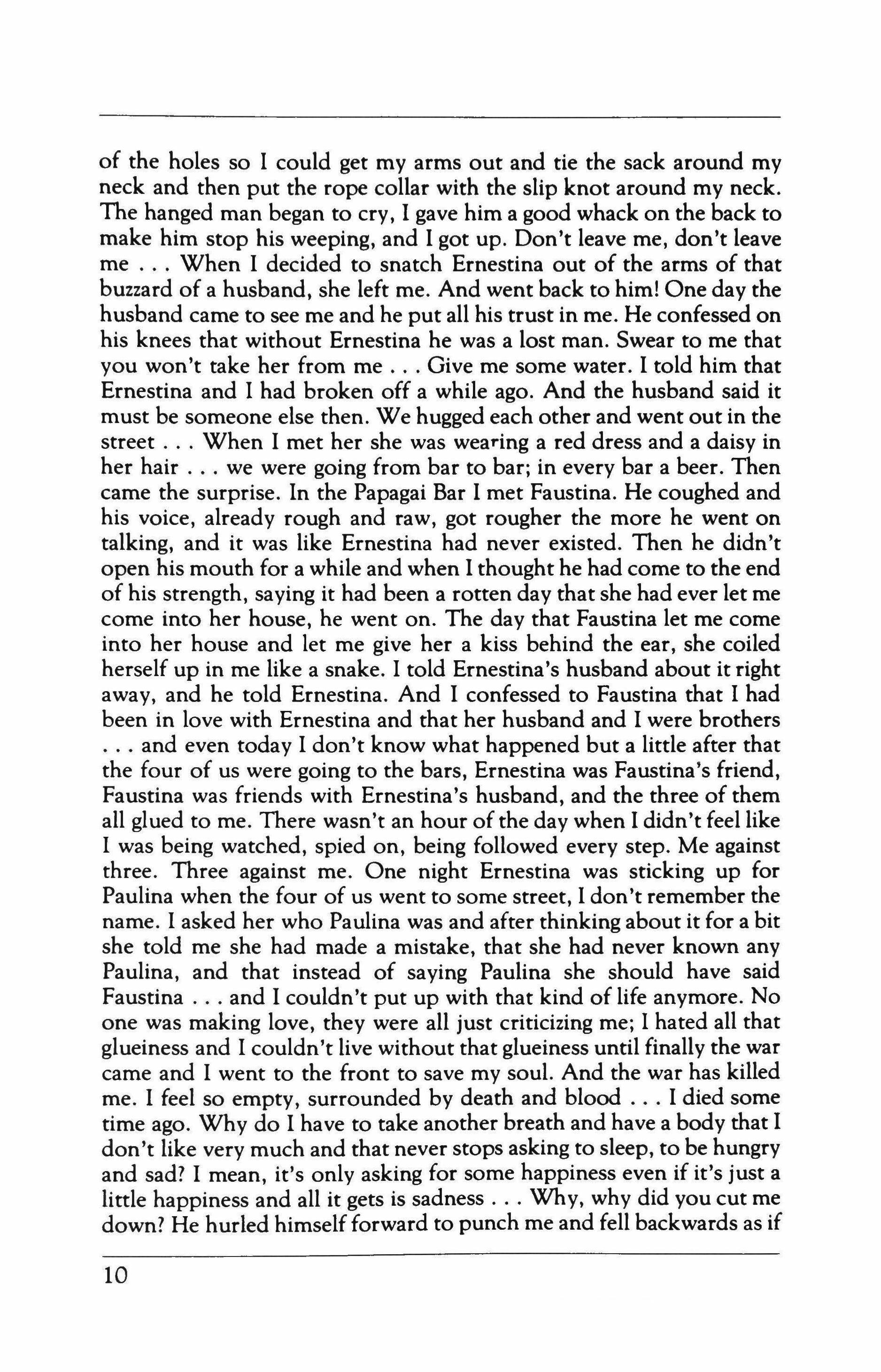
of the holes so I could get my arms out and tie the sack around my neck and then put the rope collar with the slip knot around my neck. The hanged man began to cry, I gave him a good whack on the back to make him stop his weeping, and I got up. Don't leave me, don't leave me When I decided to snatch Ernestina out of the arms of that buzzard of a husband, she left me. And went back to him! One day the husband came to see me and he put all his trust in me. He confessed on his knees that without Ernestina he was a lost man. Swear to me that you won't take her from me Give me some water. I told him that Ernestina and I had broken off a while ago. And the husband said it must be someone else then. We hugged each other and went out in the street When I met her she was wearing a red dress and a daisy in her hair we were going from bar to bar; in every bar a beer. Then came the surprise. In the Papagai Bar I met Faustina. He coughed and his voice, already rough and raw, got rougher the more he went on talking, and it was like Ernestina had never existed. Then he didn't open his mouth for a while and when I thought he had come to the end of his strength, saying it had been a rotten day that she had ever let me come into her house, he went on. The day that Faustina let me come into her house and let me give her a kiss behind the ear, she coiled herself up in me like a snake. I told Ernestina's husband about it right away, and he told Ernestina. And I confessed to Faustina that I had been in love with Ernestina and that her husband and I were brothers and even today I don't know what happened but a little after that the four of us were going to the bars, Ernestina was Faustina's friend, Faustina was friends with Ernestina's husband, and the three of them all glued to me. There wasn't an hour of the day when I didn't feel like I was being watched, spied on, being followed every step. Me against three. Three against me. One night Ernestina was sticking up for Paulina when the four of us went to some street, I don't remember the name. I asked her who Paulina was and after thinking about it for a bit she told me she had made a mistake, that she had never known any Paulina, and that instead of saying Paulina she should have said Faustina and I couldn't put up with that kind of life anymore. No one was making love, they were all just criticizing me; I hated all that glueiness and I couldn't live without that glueiness until finally the war came and I went to the front to save my soul. And the war has killed me. I feel so empty, surrounded by death and blood I died some time ago. Why do I have to take another breath and have a body that I don't like very much and that never stops asking to sleep, to be hungry and sad? I mean, it's only asking for some happiness even if it's just a little happiness and all it gets is sadness Why, why did you cut me down? He hurled himself forward to punch me and fell backwards as if
10

I had punched him. I wrapped him up in the sack and dragged him behind the rock, next to the tree where he had hung himself. Little by little I covered him up with stones. I couldn't dig a hole to bury him in because I didn't have even a hoe, or a pick, or a shovel.
The girl at the river
There were a few rinds of cheese on the floor and three or four crusts of bread. I ate everything quickly. I picked some more blackberries. And little by little I went on down to the river. The water on the other side wasn't blue: it was green, with clouds sliding over it. I would have liked to be a river so I would feel strong and I got right in. I swam like a fish; the beating didn't hurt anymore. My father had some cousins who lived in Barceloneta on Atlanrida Street. We used to go looking for seashells with his children and a girl named Monica. I learned how to swim and row with them. After I was in the water I pulled the bandage off my arm; the flesh around the wound that I got one day when I fell on a pile of broken bottles, was all purple. On the other side of the river there was a big stand of cane and reed and through the reed and cane I saw her: prettier than life, standing, naked, with a pitchfork in her hand. Her hair was light blond like mine when I was a boy; her waist slender, each thigh a sight to behold, as my mother used to say about the carnations, each carnation a sight to behold, each of them a fruit, and fully ripe. I got closer and closer to her, she saw me and when I was right beside her, smiling, she stuck me with the pitchfork. Her teeth were like the very whitest little river stones. The sun came out. All the cane and all the leaves were swaying back and forth. She tossed the pitchfork away and threw herself into the water. I began to swim up the river with her following behind.
Stretched out in the sun we stuffed ourselves with blackberries. She looked at me. Her eyes were violet, specked with gold like that neighbor girl with the cat whose mother had me take care of her one afternoon. She told me her father was a miller at the mill farther up the river and I couldn't stop looking at her eyes. Her father was fighting in the war and she only saw him on Sundays. Her mother's name was Marta. Hers, Eva. She would have liked to be a boy instead of a girl. She hunted birds with a slingshot. She went fishing and if the fish were too small she threw them back in the river, and she liked to do it because it was like she was giving life to them. She hunted rabbits and
11
quail with a dog and a shotgun. If she had been born a boy she would have gone to the war, she was dying to go, but her father had made her promise not to leave him and he wouldn't let her do what she would have liked to do. Out of the blue she asked me if I liked soap bubbles. The most beautiful thing about soap bubbles was that after being so patient and watching them come out of the pipe all filled with colors, they flew away and came apart as if someone had pricked them. She was talking on her back, with her hands behind her neck and looking at the sky. I wanted to touch her, to lay her down on a bed of green leaves pulled off of violets' stems. But if the war that has gone on so long goes on any longer, I'll cut my hair, I'll dress like a boy and go to the front. She stopped talking because on the other side of the river, higher and farther than the place where I had seen her with the pitchfork, was a man coming our way on a donkey with a gun slung over his shoulder. That's my father, which means today is Sunday. It was a long time before we raised our heads and when we raised them who knows where the miller was by then. A light breeze was playing around us and we fell asleep when the moon came out. She woke up before I did and when I opened my eyes she wasn't beside me. She went for a swim and I did too. I couldn't hold myself back and I grabbed her foot. It slipped through my fingers like an eel. Let's get out! Three black shapes were coming down the river. They were dead soldiers. They threw them from the Merlot Cliffs to save themselves the trouble of burying them. I pushed them away with the pitchfork so they wouldn't get stuck and rot in the reeds and cane that are my palace.
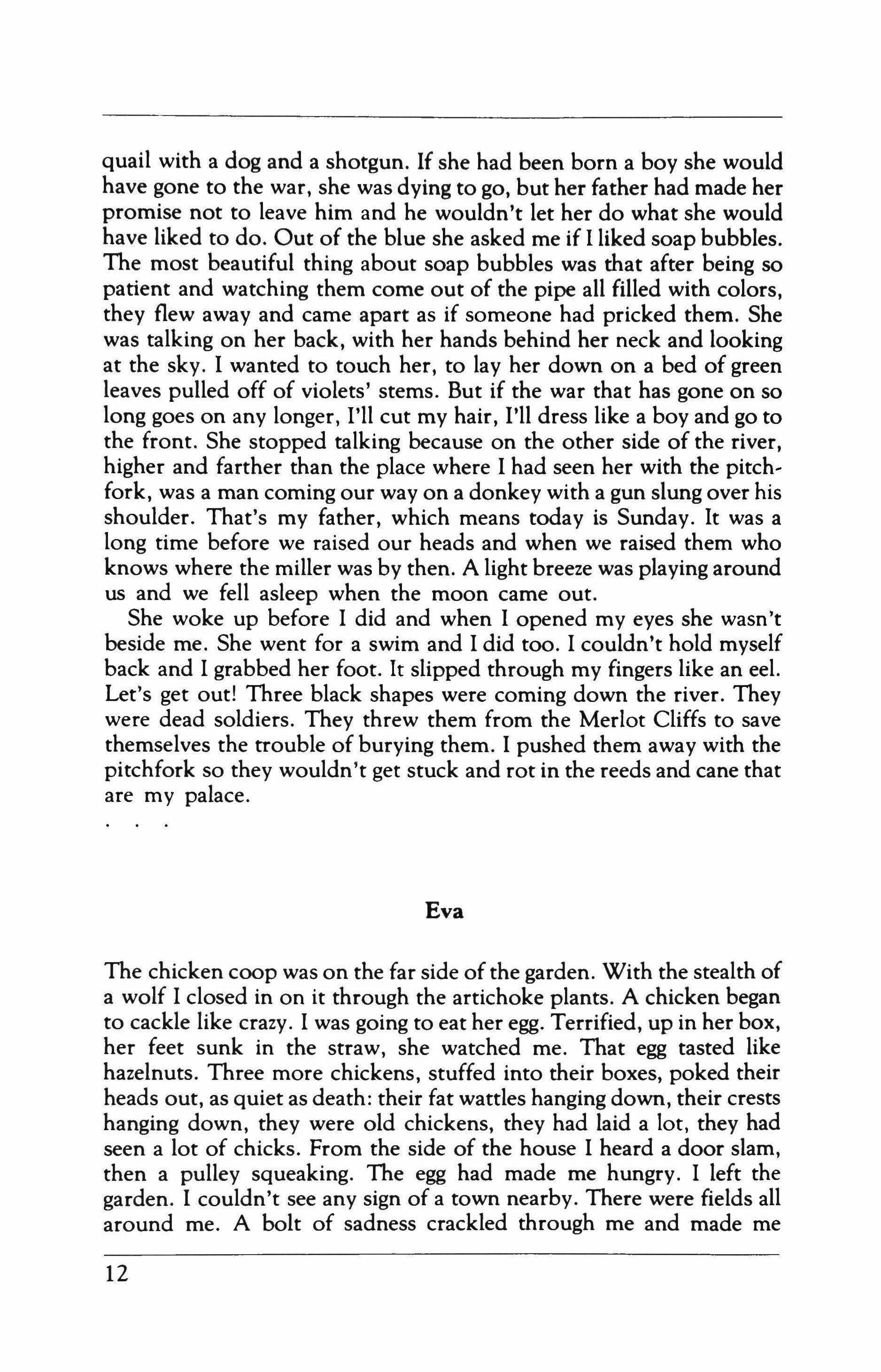
The chicken coop was on the far side of the garden. With the stealth of a wolf I closed in on it through the artichoke plants. A chicken began to cackle like crazy. I was going to eat her egg. Terrified, up in her box, her feet sunk in the straw, she watched me. That egg tasted like hazelnuts. Three more chickens, stuffed into their boxes, poked their heads out, as quiet as death: their fat wattles hanging down, their crests hanging down, they were old chickens, they had laid a lot, they had seen a lot of chicks. From the side of the house I heard a door slam, then a pulley squeaking. The egg had made me hungry. I left the garden. I couldn't see any sign of a town nearby. There were fields all around me. A bolt of sadness crackled through me and made me
Eva
12
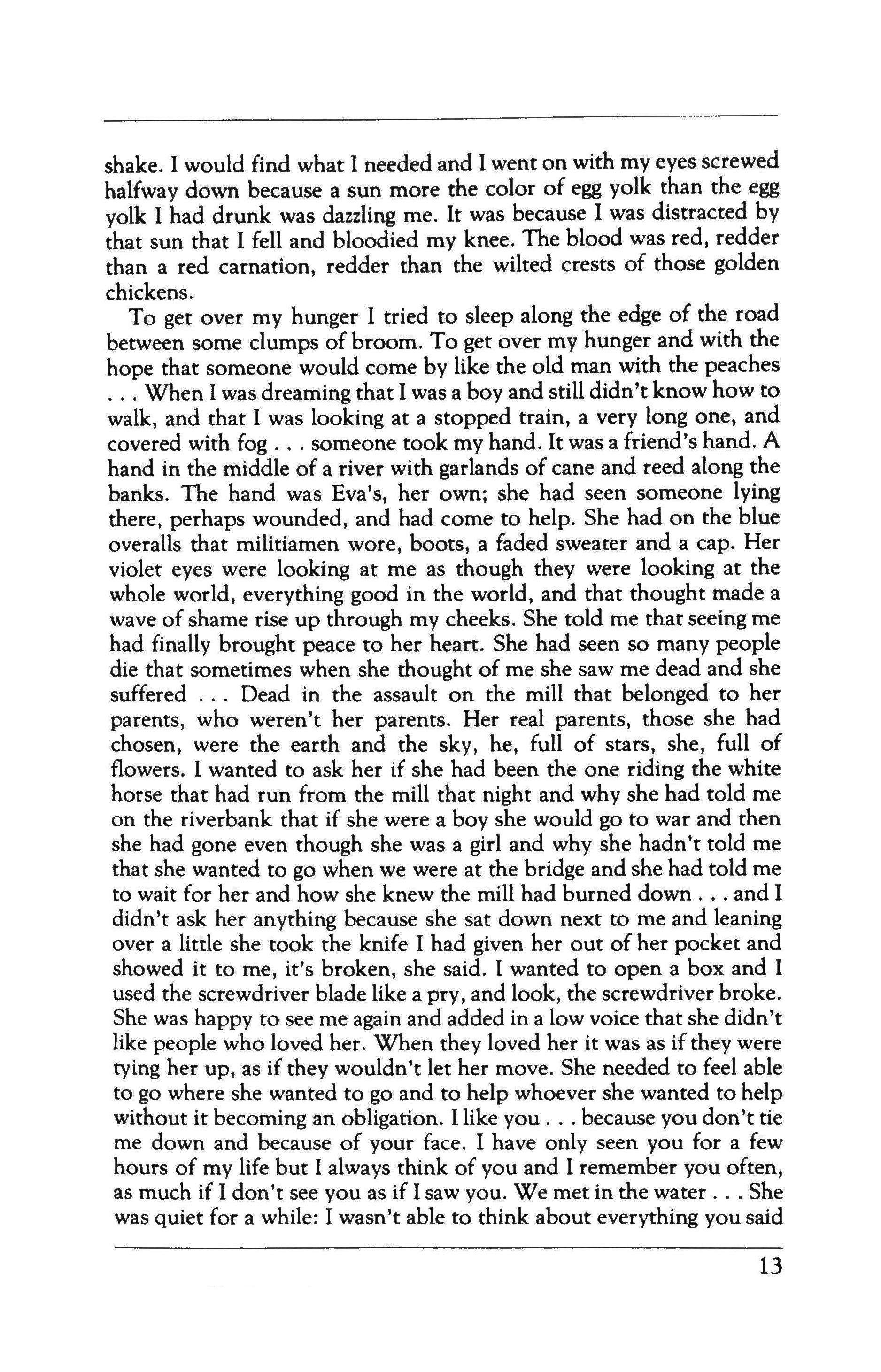
shake. I would find what I needed and I went on with my eyes screwed halfway down because a sun more the color of egg yolk than the egg yolk I had drunk was dazzling me. It was because I was distracted by that sun that I fell and bloodied my knee. The blood was red, redder than a red carnation, redder than the wilted crests of those golden chickens.
To get over my hunger I tried to sleep along the edge of the road between some clumps of broom. To get over my hunger and with the hope that someone would come by like the old man with the peaches
When I was dreaming that I was a boy and still didn't know how to walk, and that I was looking at a stopped train, a very long one, and covered with fog someone took my hand. It was a friend's hand. A hand in the middle of a river with garlands of cane and reed along the banks. The hand was Eva'S, her own; she had seen someone lying there, perhaps wounded, and had come to help. She had on the blue overalls that militiamen wore, boots, a faded sweater and a cap. Her violet eyes were looking at me as though they were looking at the whole world, everything good in the world, and that thought made a wave of shame rise up through my cheeks. She told me that seeing me had finally brought peace to her heart. She had seen so many people die that sometimes when she thought of me she saw me dead and she suffered Dead in the assault on the mill that belonged to her parents, who weren't her parents. Her real parents, those she had chosen, were the earth and the sky, he, full of stars, she, full of flowers. I wanted to ask her if she had been the one riding the white horse that had run from the mill that night and why she had told me on the riverbank that if she were a boy she would go to war and then she had gone even though she was a girl and why she hadn't told me that she wanted to go when we were at the bridge and she had told me to wait for her and how she knew the mill had burned down and I didn't ask her anything because she sat down next to me and leaning over a little she took the knife I had given her out of her pocket and showed it to me, it's broken, she said. I wanted to open a box and I used the screwdriver blade like a pry, and look, the screwdriver broke. She was happy to see me again and added in a low voice that she didn't like people who loved her. When they loved her it was as if they were tying her up, as if they wouldn't let her move. She needed to feel able to go where she wanted to go and to help whoever she wanted to help without it becoming an obligation. I like you because you don't tie me down and because of your face. I have only seen you for a few hours of my life but I always think of you and I remember you often, as much if I don't see you as if I saw you. We met in the water She was quiet for a while: I wasn't able to think about everything you said
13
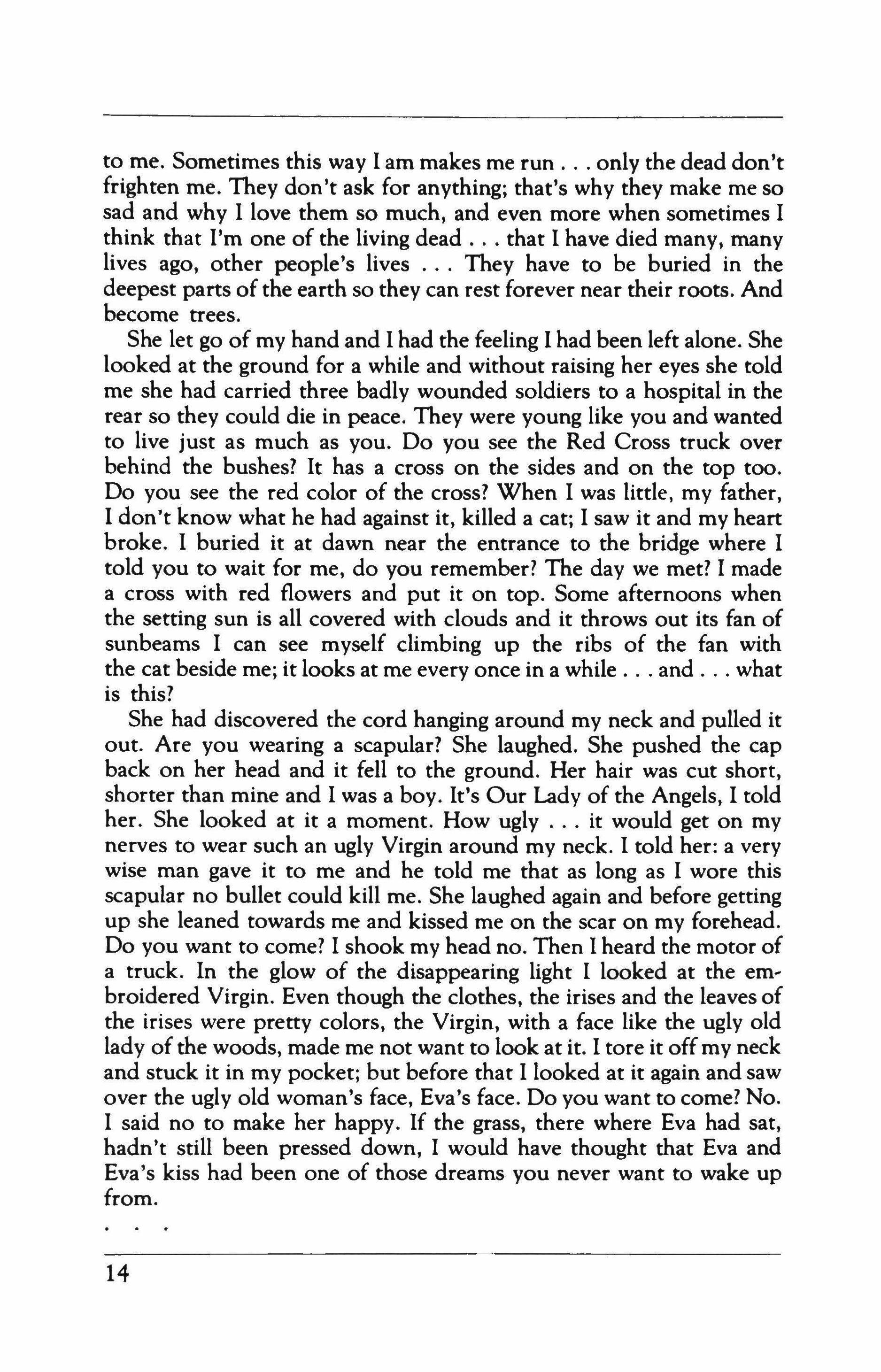
to me. Sometimes this way I am makes me run only the dead don't frighten me. They don't ask for anything; that's why they make me so sad and why I love them so much, and even more when sometimes I think that I'm one of the living dead that I have died many, many lives ago, other people's lives They have to be buried in the deepest parts of the earth so they can rest forever near their roots. And become trees.
She let go of my hand and I had the feeling I had been left alone. She looked at the ground for a while and without raising her eyes she told me she had carried three badly wounded soldiers to a hospital in the rear so they could die in peace. They were young like you and wanted to live just as much as you. Do you see the Red Cross truck over behind the bushes? It has a cross on the sides and on the top too. Do you see the red color of the cross? When I was little, my father, I don't know what he had against it, killed a cat; I saw it and my heart broke. I buried it at dawn near the entrance to the bridge where I told you to wait for me, do you remember? The day we met? I made a cross with red flowers and put it on top. Some afternoons when the setting sun is all covered with clouds and it throws out its fan of sunbeams I can see myself climbing up the ribs of the fan with the cat beside me; it looks at me every once in a while and what is this?
She had discovered the cord hanging around my neck and pulled it out. Are you wearing a scapular? She laughed. She pushed the cap back on her head and it fell to the ground. Her hair was cut short, shorter than mine and I was a boy. It's Our Lady of the Angels, I told her. She looked at it a moment. How ugly it would get on my nerves to wear such an ugly Virgin around my neck. I told her: a very wise man gave it to me and he told me that as long as I wore this scapular no bullet could kill me. She laughed again and before getting up she leaned towards me and kissed me on the scar on my forehead. Do you want to come? I shook my head no. Then I heard the motor of a truck. In the glow of the disappearing light I looked at the em' broidered Virgin. Even though the clothes, the irises and the leaves of the irises were pretty colors, the Virgin, with a face like the ugly old lady of the woods, made me not want to look at it. I tore it off my neck and stuck it in my pocket; but before that I looked at it again and saw over the ugly old woman's face, Eva's face. Do you want to come? No. I said no to make her happy. If the grass, there where Eva had sat, hadn't still been pressed down, I would have thought that Eva and Eva's kiss had been one of those dreams you never want to wake up from.
14
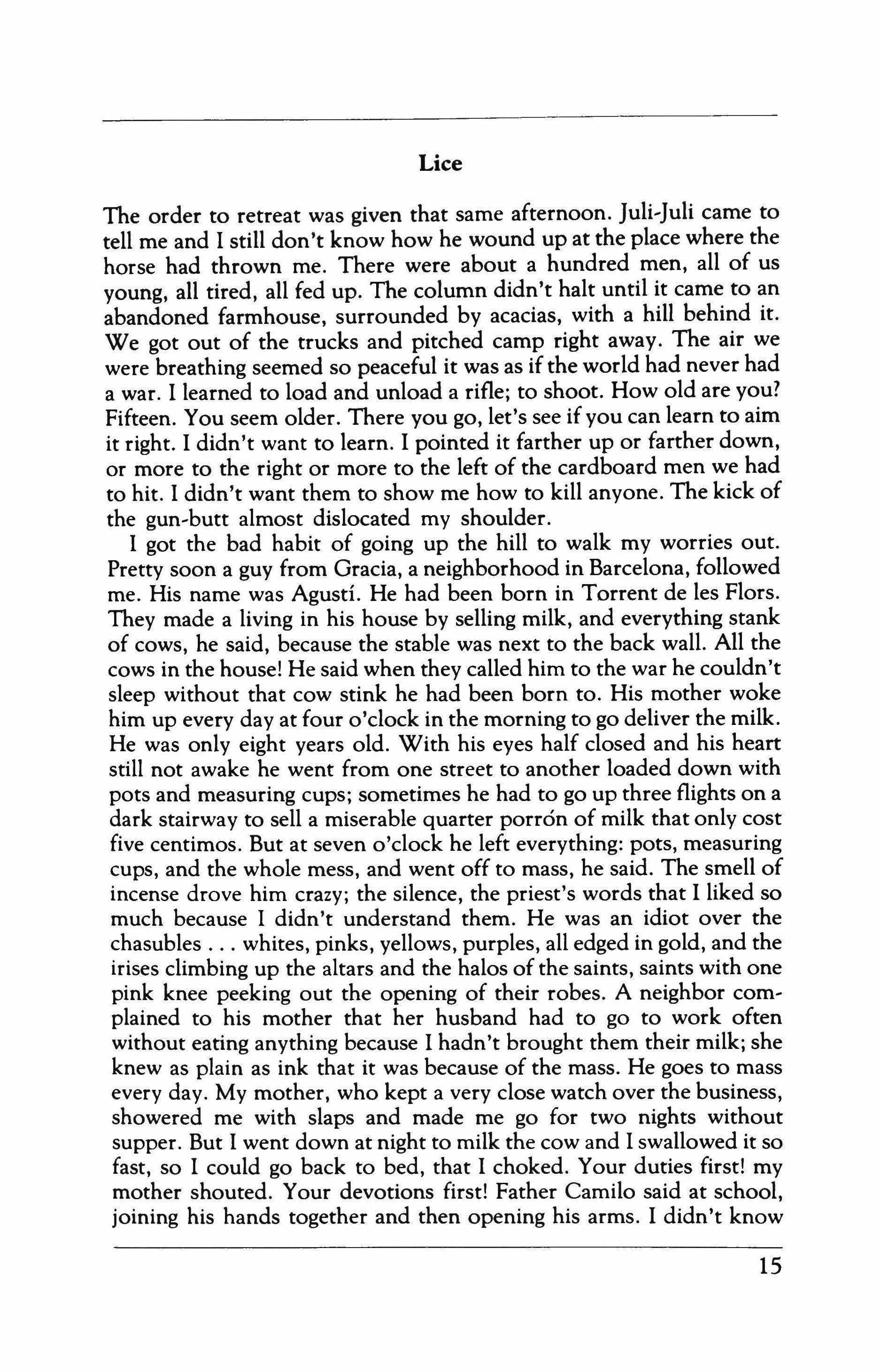
Lice
The order to retreat was given that same afternoon. juli-juli came to tell me and I still don't know how he wound up at the place where the horse had thrown me. There were about a hundred men, all of us young, all tired, all fed up. The column didn't halt until it came to an abandoned farmhouse, surrounded by acacias, with a hill behind it. We got out of the trucks and pitched camp right away. The air we were breathing seemed so peaceful it was as if the world had never had a war. I learned to load and unload a rifle; to shoot. How old are you? Fifteen. You seem older. There you go, let's see if you can learn to aim it right. I didn't want to learn. I pointed it farther up or farther down, or more to the right or more to the left of the cardboard men we had to hit. I didn't want them to show me how to kill anyone. The kick of the gun-butt almost dislocated my shoulder. I got the bad habit of going up the hill to walk my worries out. Pretty soon a guy from Gracia, a neighborhood in Barcelona, followed me. His name was Agusti. He had been born in Torrent de les Flors. They made a living in his house by selling milk, and everything stank of cows, he said, because the stable was next to the back wall. All the cows in the house! He said when they called him to the war he couldn't sleep without that cow stink he had been born to. His mother woke him up every day at four o'clock in the morning to go deliver the milk. He was only eight years old. With his eyes half closed and his heart still not awake he went from one street to another loaded down with pots and measuring cups; sometimes he had to go up three flights on a dark stairway to sell a miserable quarter porron of milk that only cost five centimos. But at seven o'clock he left everything: pots, measuring cups, and the whole mess, and went off to mass, he said. The smell of incense drove him crazy; the silence, the priest's words that I liked so much because I didn't understand them. He was an idiot over the chasubles whites, pinks, yellows, purples, all edged in gold, and the irises climbing up the altars and the halos of the saints, saints with one pink knee peeking out the opening of their robes. A neighbor com' plained to his mother that her husband had to go to work often without eating anything because I hadn't brought them their milk; she knew as plain as ink that it was because of the mass. He goes to mass every day. My mother, who kept a very close watch over the business, showered me with slaps and made me go for two nights without supper. But I went down at night to milk the cow and I swallowed it so fast, so I could go back to bed, that I choked. Your duties first! my mother shouted. Your devotions first! Father Camilo said at school, joining his hands together and then opening his arms. I didn't know
15
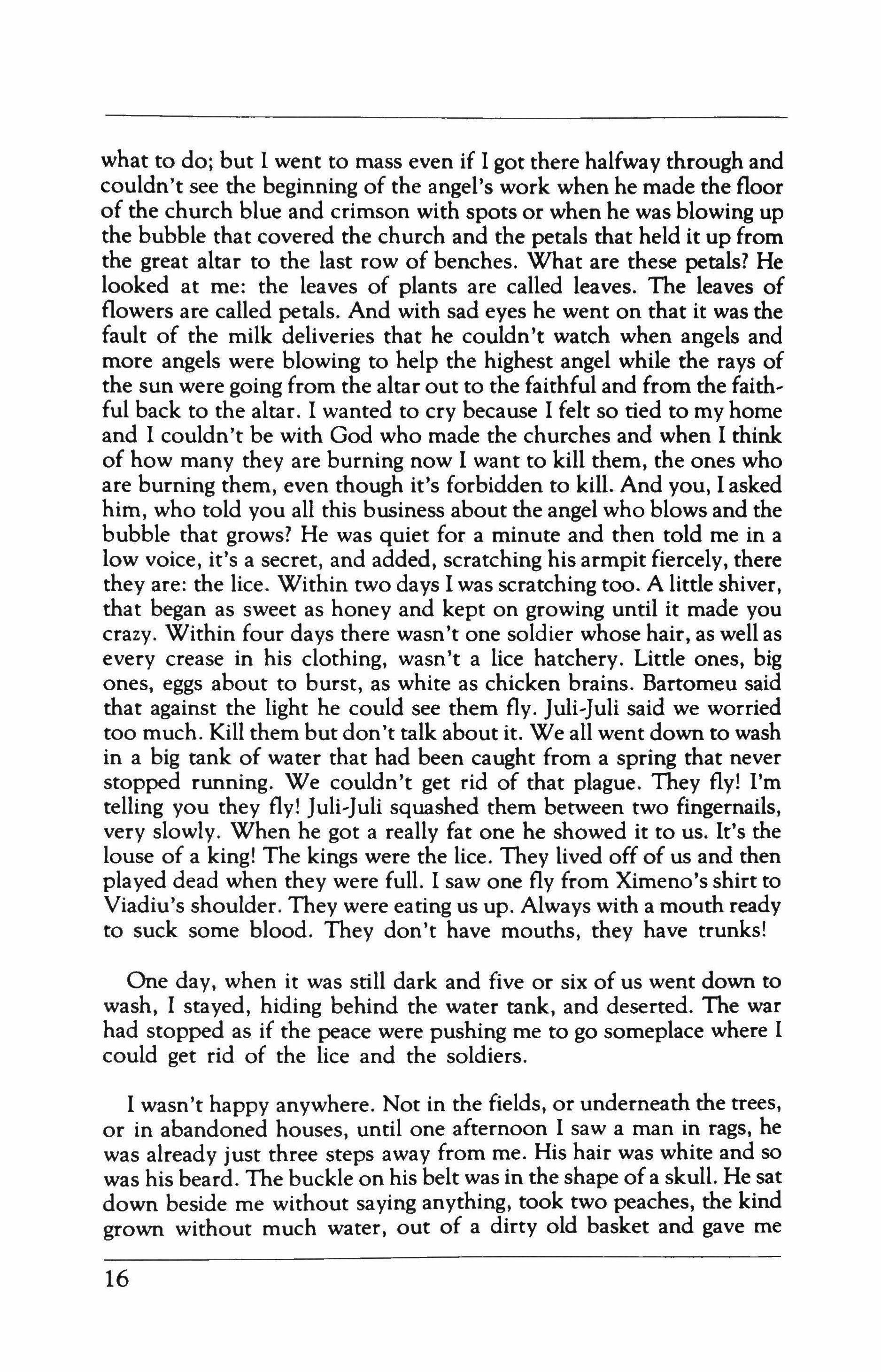
what to do; but I went to mass even if I got there halfway through and couldn't see the beginning of the angel's work when he made the floor of the church blue and crimson with spots or when he was blowing up the bubble that covered the church and the petals that held it up from the great altar to the last row of benches. What are these petals? He looked at me: the leaves of plants are called leaves. The leaves of flowers are called petals. And with sad eyes he went on that it was the fault of the milk deliveries that he couldn't watch when angels and more angels were blowing to help the highest angel while the rays of the sun were going from the altar out to the faithful and from the faith, ful back to the altar. I wanted to cry because I felt so tied to my home and I couldn't be with God who made the churches and when I think of how many they are burning now I want to kill them, the ones who are burning them, even though it's forbidden to kill. And you, I asked him, who told you all this business about the angel who blows and the bubble that grows? He was quiet for a minute and then told me in a low voice, it's a secret, and added, scratching his armpit fiercely, there they are: the lice. Within two days I was scratching too. A little shiver, that began as sweet as honey and kept on growing until it made you crazy. Within four days there wasn't one soldier whose hair, as well as every crease in his clothing, wasn't a lice hatchery. Little ones, big ones, eggs about to burst, as white as chicken brains. Bartomeu said that against the light he could see them fly. juli-juli said we worried too much. Kill them but don't talk about it. We all went down to wash in a big tank of water that had been caught from a spring that never stopped running. We couldn't get rid of that plague. They fly! I'm telling you they fly! juli-juli squashed them between two fingernails, very slowly. When he got a really fat one he showed it to us. It's the louse of a king! The kings were the lice. They lived off of us and then played dead when they were full. I saw one fly from Ximeno's shirt to Viadiu's shoulder. They were eating us up. Always with a mouth ready to suck some blood. They don't have mouths, they have trunks!
One day, when it was still dark and five or six of us went down to wash, I stayed, hiding behind the water tank, and deserted. The war had stopped as if the peace were pushing me to go someplace where I could get rid of the lice and the soldiers.
I wasn't happy anywhere. Not in the fields, or underneath the trees, or in abandoned houses, until one afternoon I saw a man in rags, he was already just three steps away from me. His hair was white and so was his beard. The buckle on his belt was in the shape of a skull. He sat down beside me without saying anything, took two peaches, the kind grown without much water, out of a dirty old basket and gave me
16
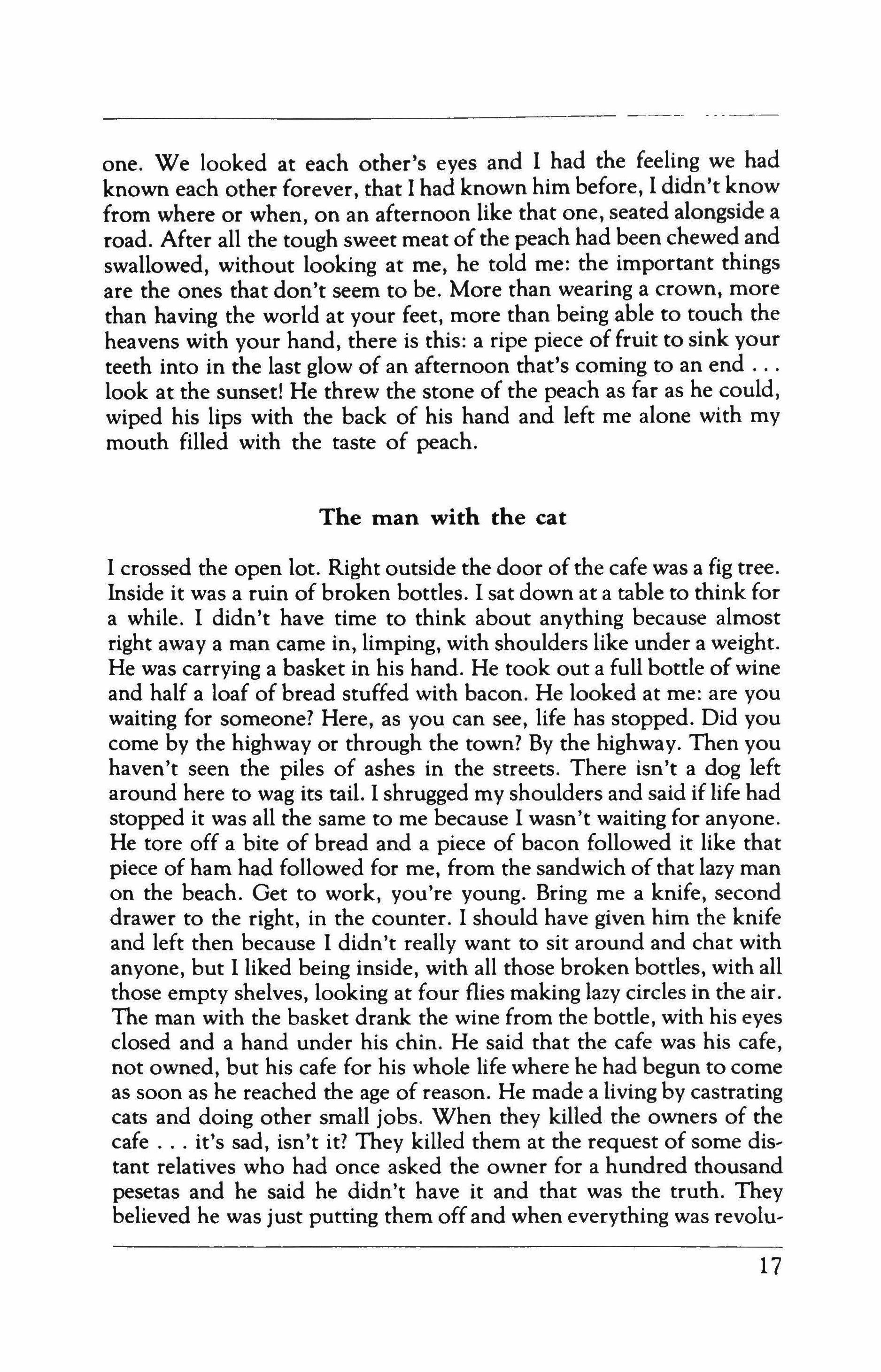
one. We looked at each other's eyes and I had the feeling we had known each other forever, that I had known him before, I didn't know from where or when, on an afternoon like that one, seated alongside a road. After all the tough sweet meat of the peach had been chewed and swallowed, without looking at me, he told me: the important things are the ones that don't seem to be. More than wearing a crown, more than having the world at your feet, more than being able to touch the heavens with your hand, there is this: a ripe piece of fruit to sink your teeth into in the last glow of an afternoon that's coming to an end look at the sunset! He threw the stone of the peach as far as he could, wiped his lips with the back of his hand and left me alone with my mouth filled with the taste of peach.
The man with the cat
I crossed the open lot. Right outside the door of the cafe was a fig tree. Inside it was a ruin of broken bottles. I sat down at a table to think for a while. I didn't have time to think about anything because almost right away a man carne in, limping, with shoulders like under a weight. He was carrying a basket in his hand. He took out a full bottle of wine and half a loaf of bread stuffed with bacon. He looked at me: are you waiting for someone? Here, as you can see, life has stopped. Did you corne by the highway or through the town? By the highway. Then you haven't seen the piles of ashes in the streets. There isn't a dog left around here to wag its tail. I shrugged my shoulders and said if life had stopped it was all the same to me because I wasn't waiting for anyone. He tore off a bite of bread and a piece of bacon followed it like that piece of ham had followed for me, from the sandwich of that lazy man on the beach. Get to work, you're young. Bring me a knife, second drawer to the right, in the counter. I should have given him the knife and left then because I didn't really want to sit around and chat with anyone, but I liked being inside, with all those broken bottles, with all those empty shelves, looking at four flies making lazy circles in the air. The man with the basket drank the wine from the bottle, with his eyes closed and a hand under his chin. He said that the cafe was his cafe, not owned, but his cafe for his whole life where he had begun to corne as soon as he reached the age of reason. He made a living by castrating cats and doing other small jobs. When they killed the owners of the cafe it's sad, isn't it? They killed them at the request of some distant relatives who had once asked the owner for a hundred thousand pesetas and he said he didn't have it and that was the truth. They believed he was just putting them offand when everything was revolu-
17

tioning, bang. But anyway, this has always been my cafe and it always will be because I don't have anywhere else to go. Where I live, half the ceiling has fallen in. He was quiet then and looked at me with his head lowered and his eyes looking up a little. Do you want to see the cat? Pretending to be thinking about something, I looked outside. I know I'm not much of anything. My father was different he made pitchers and washbasins. When he touched the clay a form was born. And since the man with the basket was looking at me while he was talking, and smiling as though he thought I had just hatched from an egg, I told him his father wasn't his father at all. He grabbed a bottle and was about to throw it at my head but he held himself back. His father, I told him, had only made his body; his soul was a lost soul that for years had been looking for someplace to go. And that the moment he had taken his first breath it had entered into him. His eyes filled with rage and he asked me if I had drunk from a fountain full of water mixed with moonlight. To shut me up, I thought, he took a package out of the basket. Do you want to see it? It was a stuffed cat with the tail stuck into the body and the ears standing straight up. Tiger' striped. My wife couldn't stand even a picture of it and I always put it on the night table that's what I would like to do to a lot of people; stuff them with straw and make them be quiet. Stuff them nice and full of straw. The cat, this very one, belonged to some neighbors. It was a great ratter, a royal cat. Its owners showered it with attention: it ate from a china plate and slept on velvet; some rich neighbors, who could keep as many cats as they wanted. Every night I used to chew on my pillow, envy was eating me up. And in order to get it I learned how to stuff. I tempted it into my house by showing it a chicken head tied to a string it came into the garden, very cautiously, and I got it for myself. Ever since then I have slept with the cat next to me. My wedding night too. When my wife died, may she rest in peace, I learned to meow, and before going to sleep, with the cat in the bed, I would meow for a while as though it were the cat singing me a serenade. And I still meow. And that's how I fall asleep.
Pride
It was getting light. I had slept badly, my arms on the table and my head on my arms. My neck hurt and my mouth tasted like copper. On the far side of the empty expanse, half covered in fog, a few dark shapes were getting in and out of a small truck with the lights on. Two men were coming over, each with a box on his shoulders. Just as they came into the cafe there were two shots. That does it for them. The
18
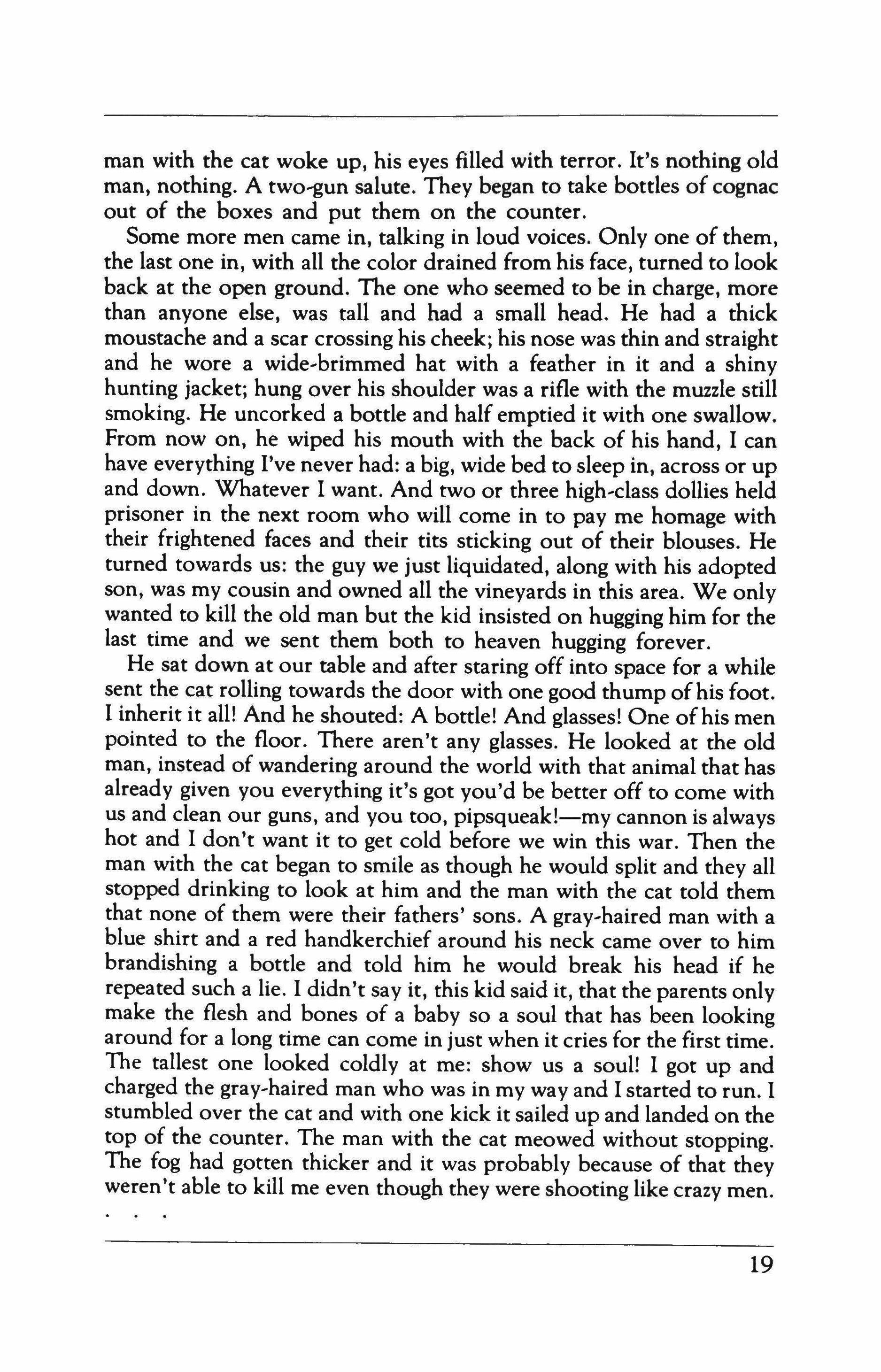
man with the cat woke up, his eyes filled with terror. It's nothing old man, nothing. A two-gun salute. They began to take bottles of cognac out of the boxes and put them on the counter.
Some more men carne in, talking in loud voices. Only one of them, the last one in, with all the color drained from his face, turned to look back at the open ground. The one who seemed to be in charge, more than anyone else, was tall and had a small head. He had a thick moustache and a scar crossing his cheek; his nose was thin and straight and he wore a wide-brimmed hat with a feather in it and a shiny hunting jacket; hung over his shoulder was a rifle with the muzzle still smoking. He uncorked a bottle and half emptied it with one swallow. From now on, he wiped his mouth with the back of his hand, I can have everything I've never had: a big, wide bed to sleep in, across or up and down. Whatever I want. And two or three high-class dollies held prisoner in the next room who will come in to pay me homage with their frightened faces and their tits sticking out of their blouses. He turned towards us: the guy we just liquidated, along with his adopted son, was my cousin and owned all the vineyards in this area. We only wanted to kill the old man but the kid insisted on hugging him for the last time and we sent them both to heaven hugging forever. He sat down at our table and after staring off into space for a while sent the cat rolling towards the door with one good thump of his foot. I inherit it all! And he shouted: A bottle! And glasses! One ofhis men pointed to the floor. There aren't any glasses. He looked at the old man, instead of wandering around the world with that animal that has already given you everything it's got you'd be better off to come with us and clean our guns, and you too, pipsqueak!-my cannon is always hot and I don't want it to get cold before we win this war. Then the man with the cat began to smile as though he would split and they all stopped drinking to look at him and the man with the cat told them that none of them were their fathers' sons. A gray-haired man with a blue shirt and a red handkerchief around his neck came over to him brandishing a bottle and told him he would break his head if he repeated such a lie. I didn't say it, this kid said it, that the parents only make the flesh and bones of a baby so a soul that has been looking around for a long time can corne in just when it cries for the first time. The tallest one looked coldly at me: show us a soul! I got up and charged the gray-haired man who was in my way and I started to run. I stumbled over the cat and with one kick it sailed up and landed on the top of the counter. The man with the cat meowed without stopping. The fog had gotten thicker and it was probably because of that they weren't able to kill me even though they were shooting like crazy men.
19

Matilde's beautiful belly
I was trying to look at the sun, like the old man at the hermitage, to see if it would burn my pupils, when that game was stopped by the thunder of a motorcycle that braked suddenly almost right on top of me. The man on the motorcycle said, if you want me to take you someplace just say where straight out, because I'm not going anywhere in particular. His mouth was twisted up in a grimace of disgust. His teeth were long, the eyeteeth like a dog's. His eyes were so nervous that they were looking every which way without coming to rest on anything. Haven't you decided? He took a pack of cigarettes out of the right-hand pocket of his hunting jacket and stuck it right in front of me, saying, my boy, they left you looking like a new man. He put the pack so near my nose, he was so insistent that I take a cigarette, I had to assure him that I had never smoked, except for a few weeds when I was a boy and wanted to be a big man hiding from my mother. Smoke! The first drag on it made me cough. My eyes watered. And the man on the motorcycle said that he smoked fast so the cigarette would be finished in a hurry and he could light another one right away. The best part is lighting them. That's why men who have lost their sight don't smoke when I get tired of smoking I'll fix up that awful hair of yours. Who in the hell left you looking like that? I liked him because he had those eyes that wandered from the branches to me, from the highway to the weeds, from the end of his cigarette to the end of mine that was slowly becoming an ash.
He began to tell me his story, saying that he had a ship in a bottle and that if he had become a barber it was his father's fault: when he was a boy his father used to ask him to cut the hair on his neck because he couldn't do it himself. The barber who lived two doors down the street took me on as an apprentice; he was a sad man, and bald, and suffered from liver problems and lived only on boiled rice. He died just when I finished being a soldier and so I was left with the barber, shop. All the customers knew me and kept coming. It had two big windows, one on the main street and the other on a little side street, full of bottles with labels for quinines and essences and one huge bottle that had been full ofcologne and that I filled with water. On the opposite corner was a bakery. When my boss died the baker did likewise. Two months later the bakery became a florist shop. It took me quite a while to notice the mistress. Finally, on the feast day of Saint Magdalena, I went in to buy a rose because I was tired of hearing Magdalena's complaints that I never gave her anything. She was a manicurist and on Sundays she used to come to the house, we would
20
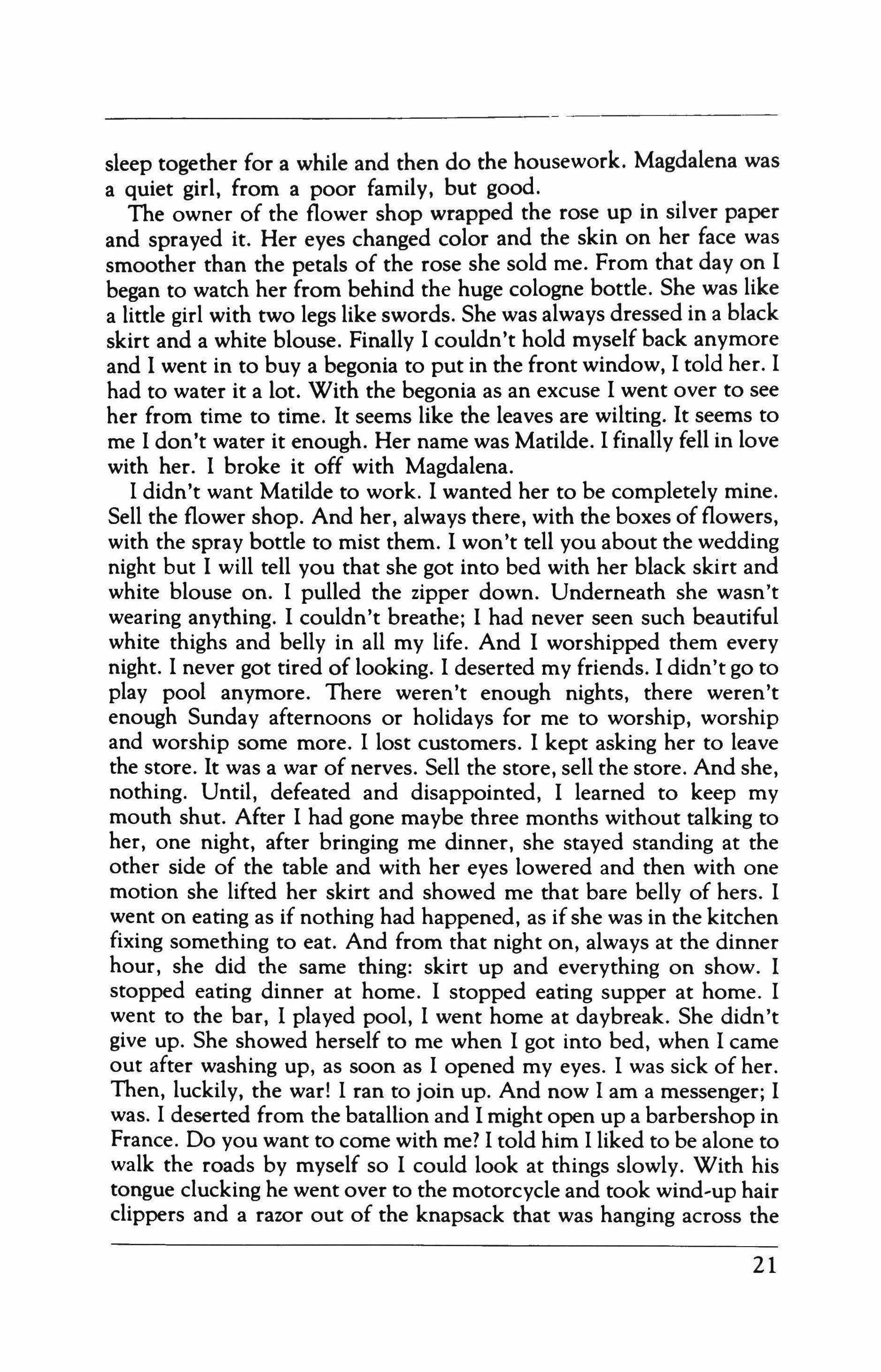
sleep together for a while and then do the housework. Magdalena was a quiet girl, from a poor family, but good.
The owner of the flower shop wrapped the rose up in silver paper and sprayed it. Her eyes changed color and the skin on her face was smoother than the petals of the rose she sold me. From that day on I began to watch her from behind the huge cologne bottle. She was like a little girl with two legs like swords. She was always dressed in a black skirt and a white blouse. Finally I couldn't hold myself back anymore and I went in to buy a begonia to put in the front window, I told her. I had to water it a lot. With the begonia as an excuse I went over to see her from time to time. It seems like the leaves are wilting. It seems to me I don't water it enough. Her name was Matilde. I finally fell in love with her. I broke it off with Magdalena.
I didn't want Matilde to work. I wanted her to be completely mine. Sell the flower shop. And her, always there, with the boxes of flowers, with the spray bottle to mist them. I won't tell you about the wedding night but I will tell you that she got into bed with her black skirt and white blouse on. I pulled the zipper down. Underneath she wasn't wearing anything. I couldn't breathe; I had never seen such beautiful white thighs and belly in all my life. And I worshipped them every night. I never got tired of looking. I deserted my friends. I didn't go to play pool anymore. There weren't enough nights, there weren't enough Sunday afternoons or holidays for me to worship, worship and worship some more. I lost customers. I kept asking her to leave the store. It was a war of nerves. Sell the store, sell the store. And she, nothing. Until, defeated and disappointed, I learned to keep my mouth shut. After I had gone maybe three months without talking to her, one night, after bringing me dinner, she stayed standing at the other side of the table and with her eyes lowered and then with one motion she lifted her skirt and showed me that bare belly of hers. I went on eating as if nothing had happened, as if she was in the kitchen fixing something to eat. And from that night on, always at the dinner hour, she did the same thing: skirt up and everything on show. I stopped eating dinner at home. I stopped eating supper at home. I went to the bar, I played pool, I went home at daybreak. She didn't give up. She showed herself to me when I got into bed, when I came out after washing up, as soon as I opened my eyes. I was sick of her. Then, luckily, the war! I ran to join up. And now I am a messenger; I was. I deserted from the batallion and I might open up a barbershop in France. Do you want to come with me? I told him I liked to be alone to walk the roads by myself so I could look at things slowly. With his tongue clucking he went over to the motorcycle and took wind-up hair clippers and a razor out of the knapsack that was hanging across the
21
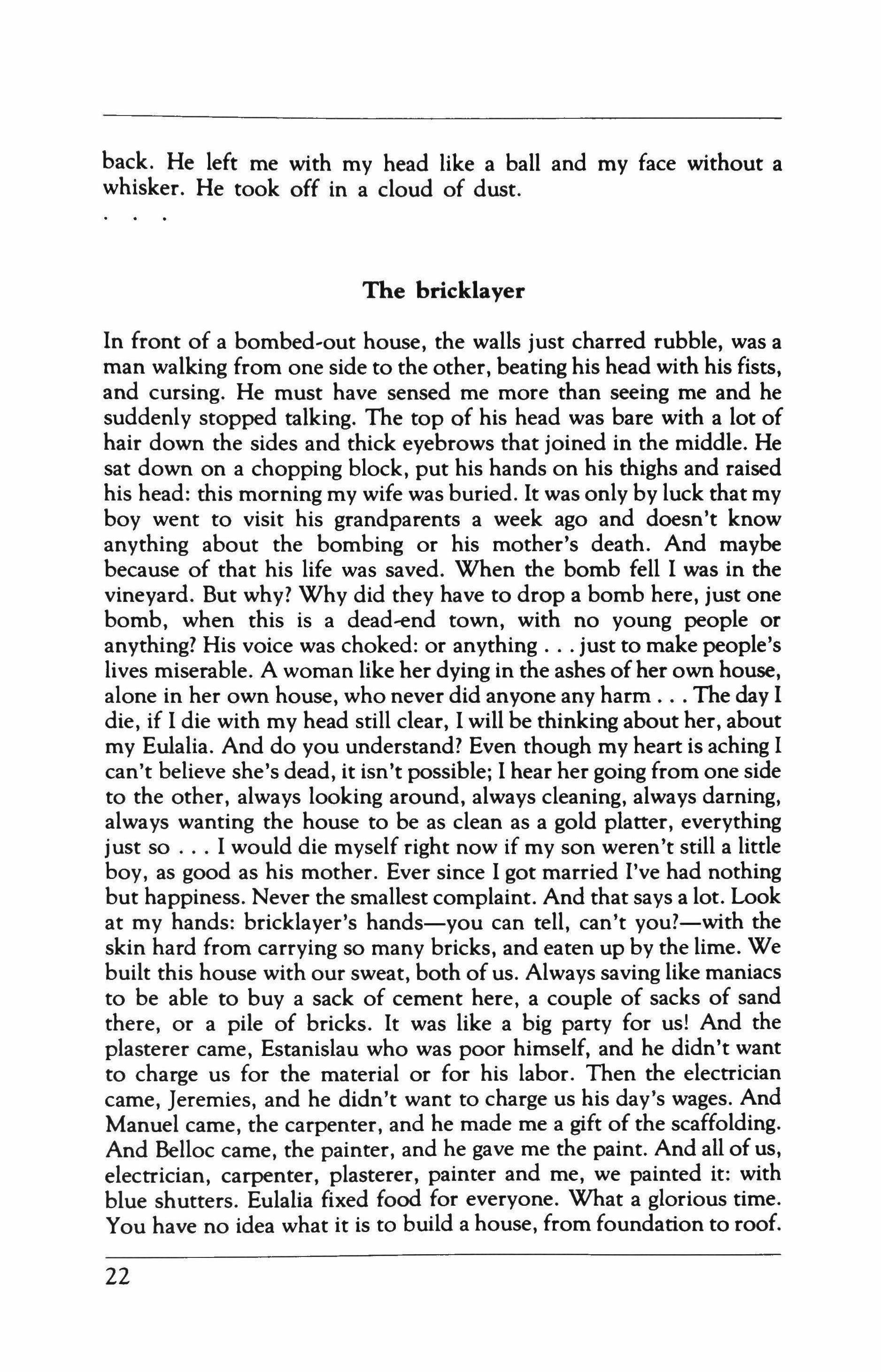
back. He left me with my head like a ball and my face without a whisker. He took off in a cloud of dust.
The bricklayer
In front of a bombed-out house, the walls just charred rubble, was a man walking from one side to the other, beating his head with his fists, and cursing. He must have sensed me more than seeing me and he suddenly stopped talking. The top of his head was bare with a lot of hair down the sides and thick eyebrows that joined in the middle. He sat down on a chopping block, put his hands on his thighs and raised his head: this morning my wife was buried. It was only by luck that my boy went to visit his grandparents a week ago and doesn't know anything about the bombing or his mother's death. And maybe because of that his life was saved. When the bomb fell I was in the vineyard. But why? Why did they have to drop a bomb here, just one bomb, when this is a dead-end town, with no young people or anything? His voice was choked: or anything just to make people's lives miserable. A woman like her dying in the ashes ofher own house, alone in her own house, who never did anyone any harm The day I die, if I die with my head still clear, I will be thinking about her, about my Eulalia. And do you understand? Even though my heart is aching I can't believe she's dead, it isn't possible; I hear her going from one side to the other, always looking around, always cleaning, always darning, always wanting the house to be as clean as a gold platter, everything just so I would die myself right now if my son weren't still a little boy, as good as his mother. Ever since I got married I've had nothing but happiness. Never the smallest complaint. And that says a lot. Look at my hands: bricklayer's hands-you can tell, can't you?-with the skin hard from carrying so many bricks, and eaten up by the lime. We built this house with our sweat, both of us. Always saving like maniacs to be able to buy a sack of cement here, a couple of sacks of sand there, or a pile of bricks. It was like a big party for us! And the plasterer came, Estanislau who was poor himself, and he didn't want to charge us for the material or for his labor. Then the electrician came, Jeremies, and he didn't want to charge us his day's wages. And Manuel came, the carpenter, and he made me a gift of the scaffolding. And Belloc came, the painter, and he gave me the paint. And all of us, electrician, carpenter, plasterer, painter and me, we painted it: with blue shutters. Eulalia fixed food for everyone. What a glorious time. You have no idea what it is to build a house, from foundation to roof.
22
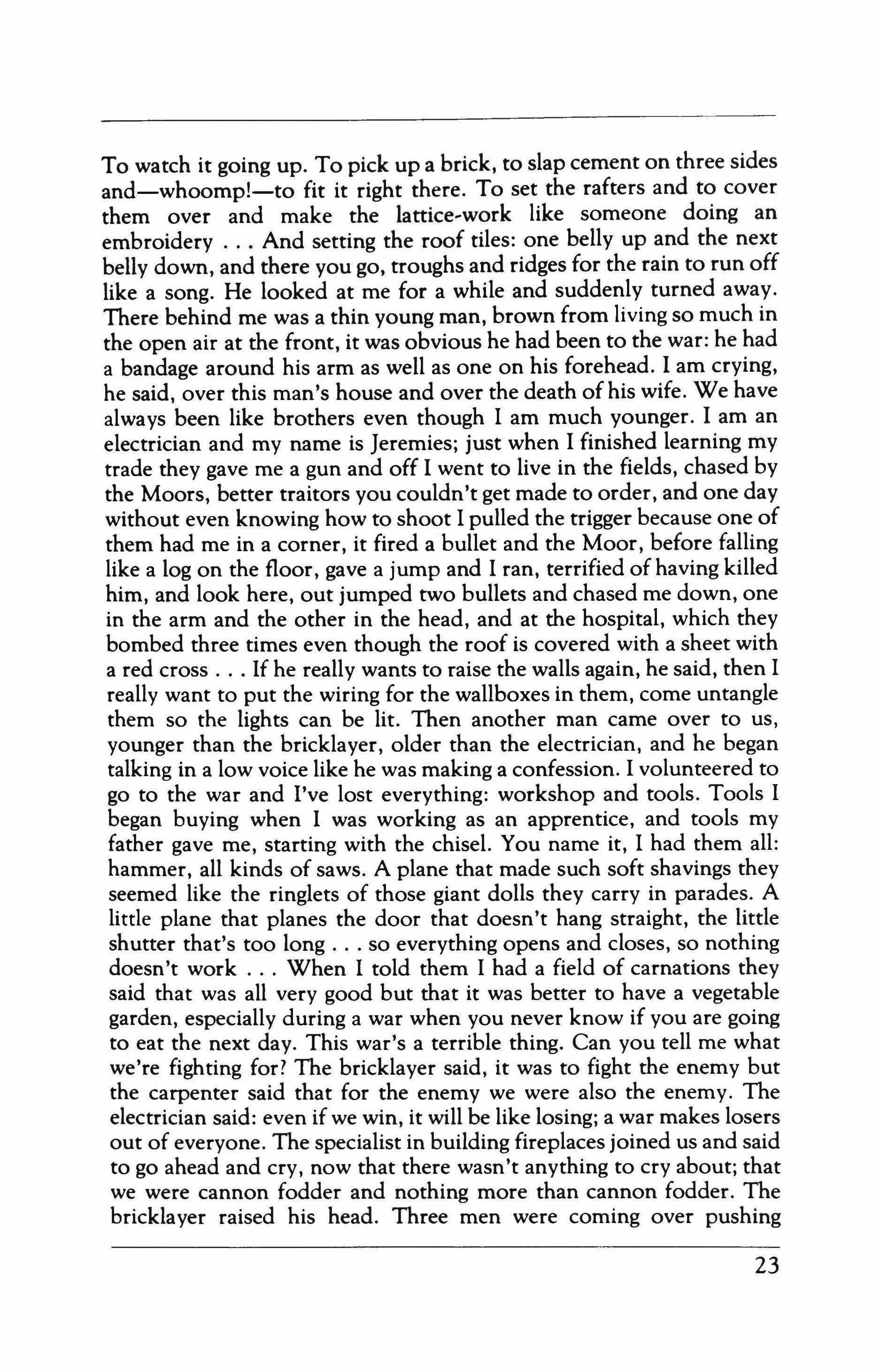
To watch it going up. To pick up a brick, to slap cement on three sides and-whoomp!-to fit it right there. To set the rafters and to cover them over and make the lattice-work like someone doing an embroidery And setting the roof tiles: one belly up and the next belly down, and there you go, troughs and ridges for the rain to run off like a song. He looked at me for a while and suddenly turned away. There behind me was a thin young man, brown from living so much in the open air at the front, it was obvious he had been to the war: he had a bandage around his arm as well as one on his forehead. I am crying, he said, over this man's house and over the death of his wife. We have always been like brothers even though I am much younger. I am an electrician and my name is Jeremies; just when I finished learning my trade they gave me a gun and off I went to live in the fields, chased by the Moors, better traitors you couldn't get made to order, and one day without even knowing how to shoot I pulled the trigger because one of them had me in a corner, it fired a bullet and the Moor, before falling like a log on the floor, gave a jump and I ran, terrified of having killed him, and look here, out jumped two bullets and chased me down, one in the arm and the other in the head, and at the hospital, which they bombed three times even though the roof is covered with a sheet with a red cross If he really wants to raise the walls again, he said, then I really want to put the wiring for the wallboxes in them, come untangle them so the lights can be lit. Then another man came over to us, younger than the bricklayer, older than the electrician, and he began talking in a low voice like he was making a confession. 1 volunteered to go to the war and I've lost everything: workshop and tools. Tools I began buying when I was working as an apprentice, and tools my father gave me, starting with the chisel. You name it, 1 had them all: hammer, all kinds of saws. A plane that made such soft shavings they seemed like the ringlets of those giant dolls they carry in parades. A little plane that planes the door that doesn't hang straight, the little shutter that's too long so everything opens and closes, so nothing doesn't work When I told them 1 had a field of carnations they said that was all very good but that it was better to have a vegetable garden, especially during a war when you never know if you are going to eat the next day. This war's a terrible thing. Can you tell me what we're fighting for? The bricklayer said, it was to fight the enemy but the carpenter said that for the enemy we were also the enemy. The electrician said: even if we win, it will be like losing; a war makes losers out of everyone. The specialist in building fireplaces joined us and said to go ahead and cry, now that there wasn't anything to cry about; that we were cannon fodder and nothing more than cannon fodder. The bricklayer raised his head. Three men were coming over pushing
23
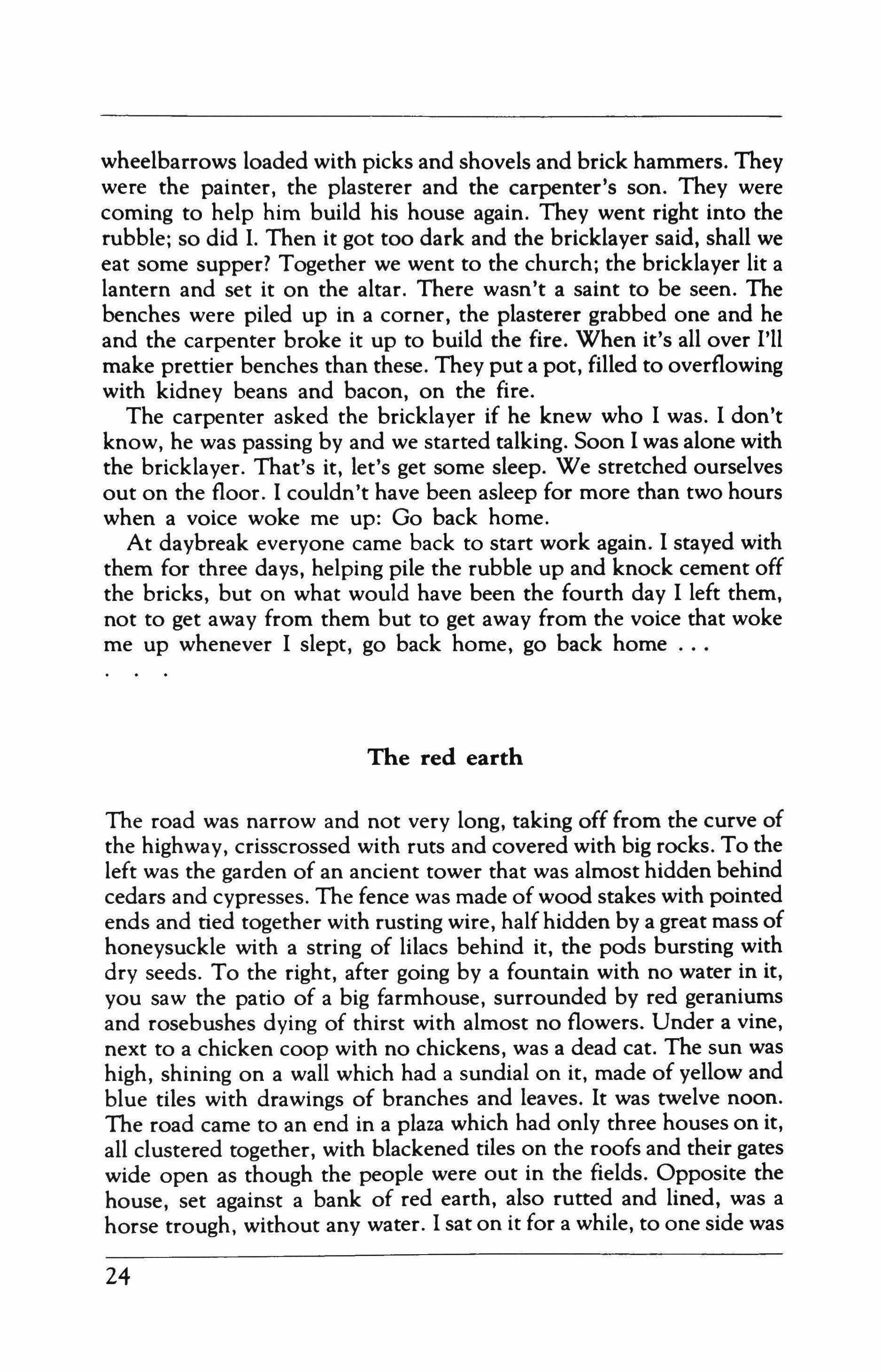
wheelbarrows loaded with picks and shovels and brick hammers. They were the painter, the plasterer and the carpenter's son. They were coming to help him build his house again. They went right into the rubble; so did I. Then it got too dark and the bricklayer said, shall we eat some supper? Together we went to the church; the bricklayer lit a lantern and set it on the altar. There wasn't a saint to be seen. The benches were piled up in a corner, the plasterer grabbed one and he and the carpenter broke it up to build the fire. When it's all over I'll make prettier benches than these. They put a pot, filled to overflowing with kidney beans and bacon, on the fire.
The carpenter asked the bricklayer if he knew who I was. I don't know, he was passing by and we started talking. Soon I was alone with the bricklayer. That's it, let's get some sleep. We stretched ourselves out on the floor. I couldn't have been asleep for more than two hours when a voice woke me up: Go back home.
At daybreak everyone came back to start work again. I stayed with them for three days, helping pile the rubble up and knock cement off the bricks, but on what would have been the fourth day I left them, not to get away from them but to get away from the voice that woke me up whenever I slept, go back home, go back home
The red earth
The road was narrow and not very long, taking off from the curve of the highway, crisscrossed with ruts and covered with big rocks. To the left was the garden of an ancient tower that was almost hidden behind cedars and cypresses. The fence was made of wood stakes with pointed ends and tied together with rusting wire, half hidden by a great mass of honeysuckle with a string of lilacs behind it, the pods bursting with dry seeds. To the right, after going by a fountain with no water in it, you saw the patio of a big farmhouse, surrounded by red geraniums and rosebushes dying of thirst with almost no flowers. Under a vine, next to a chicken coop with no chickens, was a dead cat. The sun was high, shining on a wall which had a sundial on it, made of yellow and blue tiles with drawings of branches and leaves. It was twelve noon. The road came to an end in a plaza which had only three houses on it, all clustered together, with blackened tiles on the roofs and their gates wide open as though the people were out in the fields. Opposite the house, set against a bank of red earth, also rutted and lined, was a horse trough, without any water. I sat on it for a while, to one side was
24
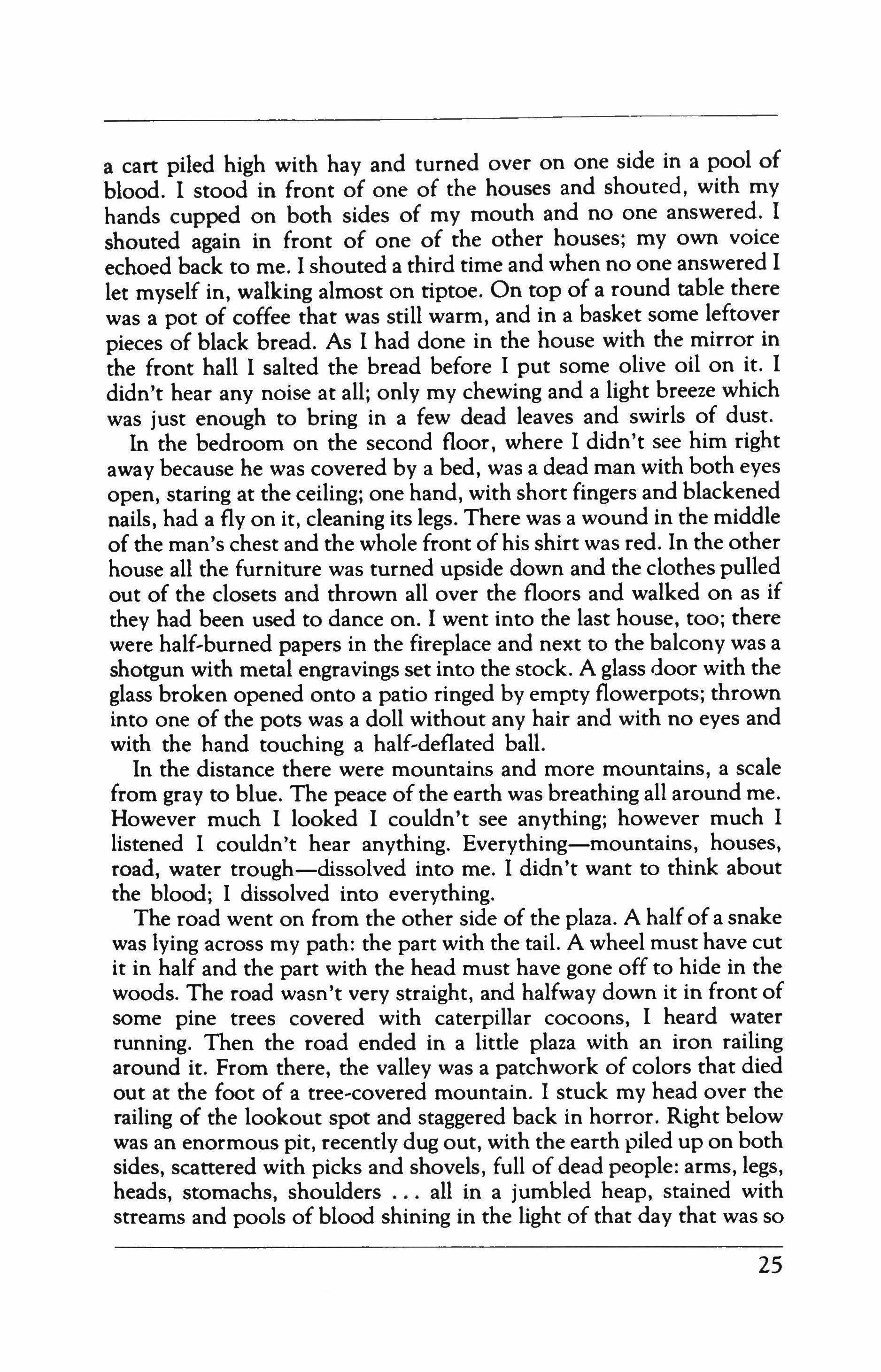
a cart piled high with hay and turned over on one side in a pool of blood. I stood in front of one of the houses and shouted, with my hands cupped on both sides of my mouth and no one answered. I shouted again in front of one of the other houses; my own voice echoed back to me. I shouted a third time and when no one answered I let myself in, walking almost on tiptoe. On top of a round table there was a pot of coffee that was still warm, and in a basket some leftover pieces of black bread. As I had done in the house with the mirror in the front hall I salted the bread before I put some olive oil on it. 1 didn't hear any noise at all; only my chewing and a light breeze which was just enough to bring in a few dead leaves and swirls of dust.
In the bedroom on the second floor, where I didn't see him right away because he was covered by a bed, was a dead man with both eyes open, staring at the ceiling; one hand, with short fingers and blackened nails, had a fly on it, cleaning its legs. There was a wound in the middle of the man's chest and the whole front of his shirt was red. In the other house all the furniture was turned upside down and the clothes pulled out of the closets and thrown all over the floors and walked on as if they had been used to dance on. I went into the last house, too; there were half-burned papers in the fireplace and next to the balcony was a shotgun with metal engravings set into the stock. A glass door with the glass broken opened onto a patio ringed by empty flowerpots; thrown into one of the pots was a doll without any hair and with no eyes and with the hand touching a half-deflated ball.
In the distance there were mountains and more mountains, a scale from gray to blue. The peace of the earth was breathing all around me. However much I looked I couldn't see anything; however much I listened I couldn't hear anything. Everything-mountains, houses, road, water trough-dissolved into me. I didn't want to think about the blood; I dissolved into everything.
The road went on from the other side of the plaza. A halfof a snake was lying across my path: the part with the tail. A wheel must have cut it in half and the part with the head must have gone off to hide in the woods. The road wasn't very straight, and halfway down it in front of some pine trees covered with caterpillar cocoons, I heard water running. Then the road ended in a little plaza with an iron railing around it. From there, the valley was a patchwork of colors that died out at the foot of a tree-covered mountain. I stuck my head over the railing of the lookout spot and staggered back in horror. Right below was an enormous pit, recently dug out, with the earth piled up on both sides, scattered with picks and shovels, full of dead people: arms, legs, heads, stomachs, shoulders all in a jumbled heap, stained with streams and pools of blood shining in the light of that day that was so
25
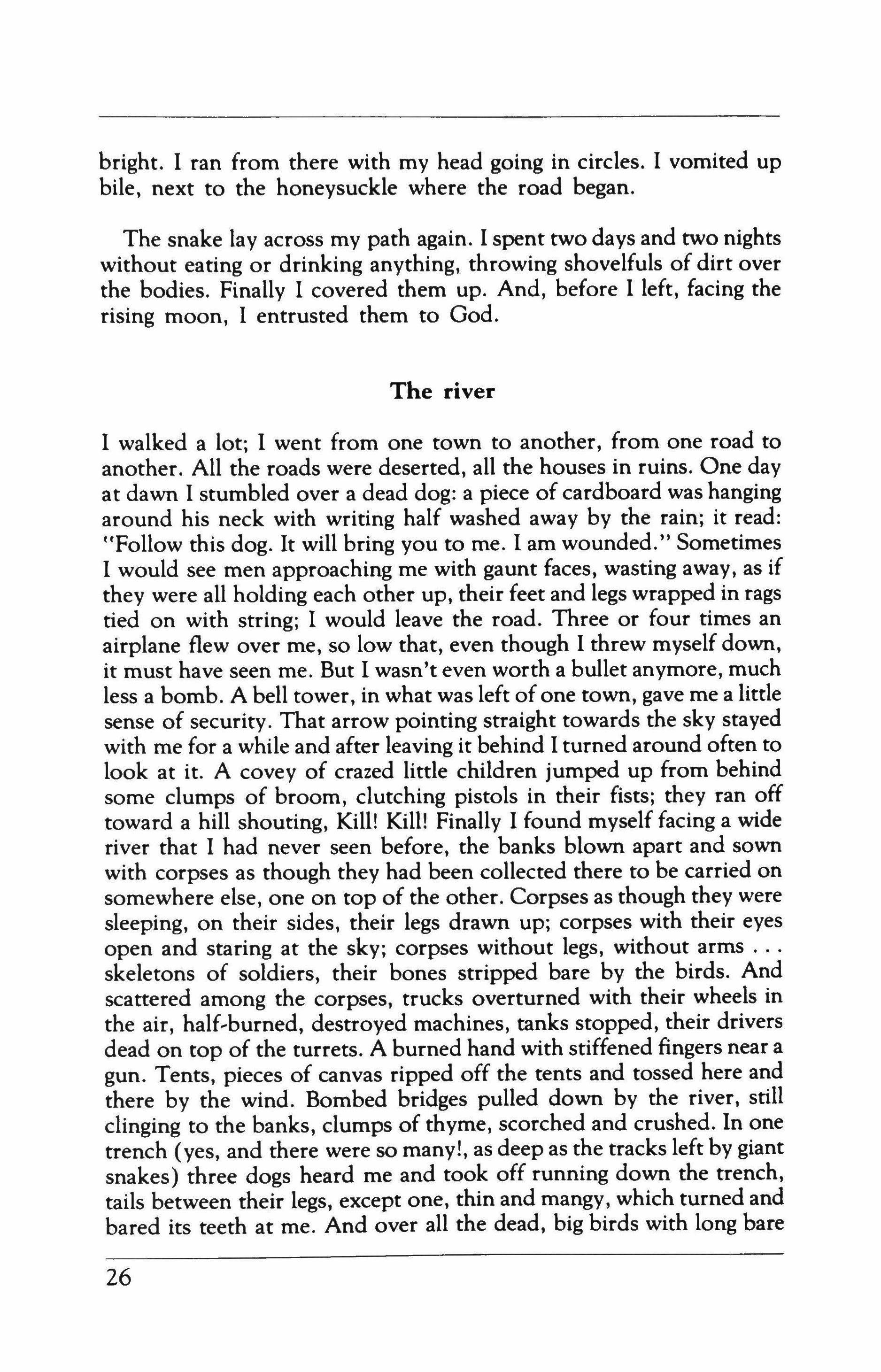
bright. I ran from there with my head going in circles. I vomited up bile, next to the honeysuckle where the road began.
The snake lay across my path again. I spent two days and two nights without eating or drinking anything, throwing shovelfuls of dirt over the bodies. Finally I covered them up. And, before I left, facing the rising moon, I entrusted them to God.
The river
I walked a lot; I went from one town to another, from one road to another. All the roads were deserted, all the houses in ruins. One day at dawn I stumbled over a dead dog: a piece of cardboard was hanging around his neck with writing half washed away by the rain; it read: "Follow this dog. It will bring you to me. I am wounded." Sometimes I would see men approaching me with gaunt faces, wasting away, as if they were all holding each other up, their feet and legs wrapped in rags tied on with string; I would leave the road. Three or four times an airplane flew over me, so low that, even though I threw myself down, it must have seen me. But I wasn't even worth a bullet anymore, much less a bomb. A bell tower, in what was left of one town, gave me a little sense of security. That arrow pointing straight towards the sky stayed with me for a while and after leaving it behind I turned around often to look at it. A covey of crazed little children jumped up from behind some clumps of broom, clutching pistols in their fists; they ran off toward a hill shouting, Kill! Kill! Finally I found myself facing a wide river that I had never seen before, the banks blown apart and sown with corpses as though they had been collected there to be carried on somewhere else, one on top of the other. Corpses as though they were sleeping, on their sides, their legs drawn up; corpses with their eyes open and staring at the sky; corpses without legs, without arms skeletons of soldiers, their bones stripped bare by the birds. And scattered among the corpses, trucks overturned with their wheels in the air, half-burned, destroyed machines, tanks stopped, their drivers dead on top of the turrets. A burned hand with stiffened fingers near a gun. Tents, pieces of canvas ripped off the tents and tossed here and there by the wind. Bombed bridges pulled down by the river, still clinging to the banks, clumps of thyme, scorched and crushed. In one trench (yes, and there were so many!, as deep as the tracks left by giant snakes) three dogs heard me and took off running down the trench, tails between their legs, except one, thin and mangy, which turned and bared its teeth at me. And over all the dead, big birds with long bare
26
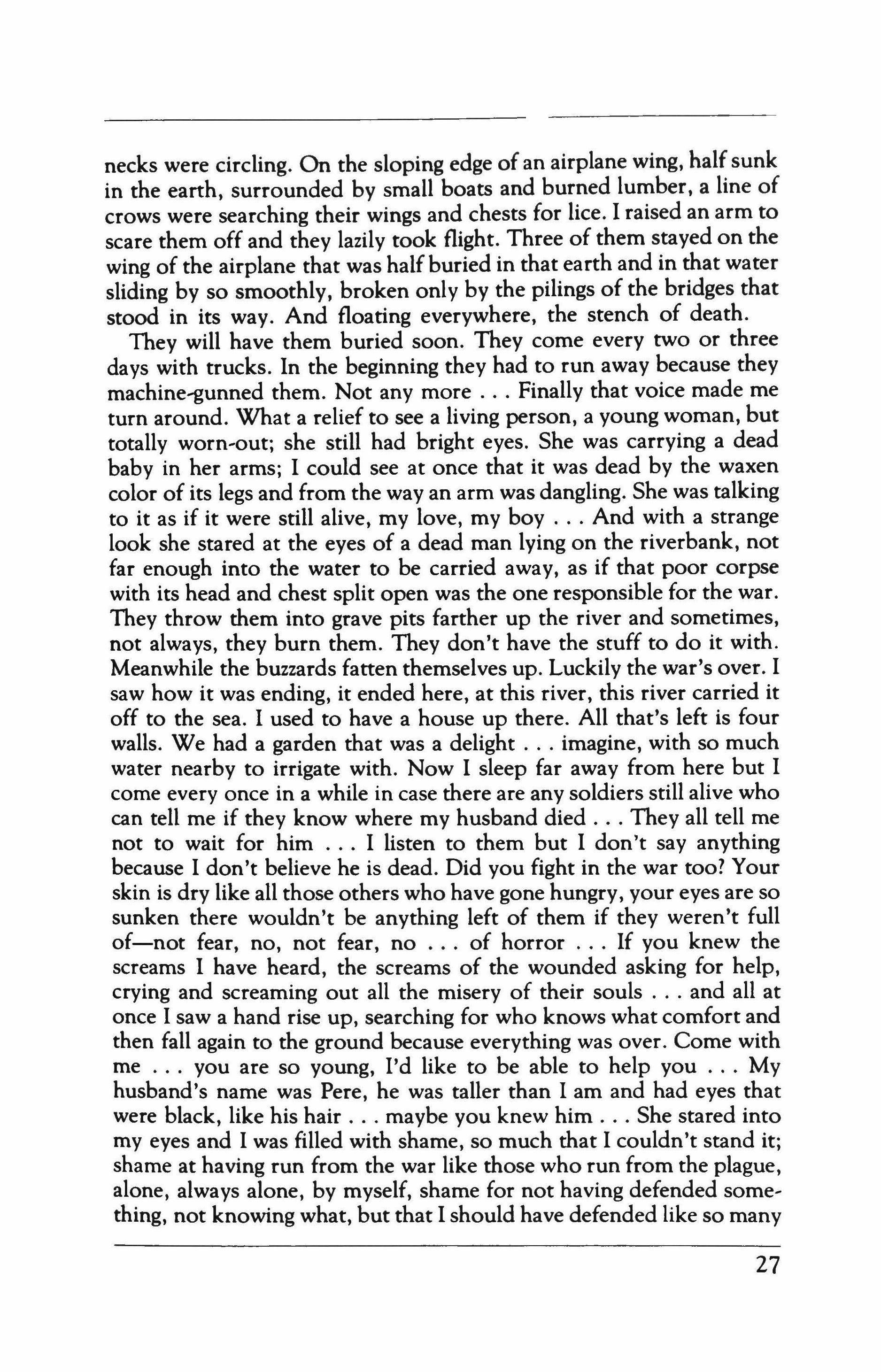
necks were circling. On the sloping edge of an airplane wing, half sunk in the earth, surrounded by small boats and burned lumber, a line of crows were searching their wings and chests for lice. I raised an arm to scare them off and they lazily took flight. Three of them stayed on the wing of the airplane that was halfburied in that earth and in that water sliding by so smoothly, broken only by the pilings of the bridges that stood in its way. And floating everywhere, the stench of death. They will have them buried soon. They come every two or three days with trucks. In the beginning they had to run away because they machine-gunned them. Not any more Finally that voice made me turn around. What a relief to see a living person, a young woman, but totally worn-out; she still had bright eyes. She was carrying a dead baby in her arms; I could see at once that it was dead by the waxen color of its legs and from the wayan arm was dangling. She was talking to it as if it were still alive, my love, my boy And with a strange look she stared at the eyes of a dead man lying on the riverbank, not far enough into the water to be carried away, as if that poor corpse with its head and chest split open was the one responsible for the war. They throw them into grave pits farther up the river and sometimes, not always, they burn them. They don't have the stuff to do it with. Meanwhile the buzzards fatten themselves up. Luckily the war's over. I saw how it was ending, it ended here, at this river, this river carried it off to the sea. I used to have a house up there. All that's left is four walls. We had a garden that was a delight imagine, with so much water nearby to irrigate with. Now I sleep far away from here but I come every once in a while in case there are any soldiers still alive who can tell me if they know where my husband died They all tell me not to wait for him I listen to them but I don't say anything because I don't believe he is dead. Did you fight in the war too? Your skin is dry like all those others who have gone hungry, your eyes are so sunken there wouldn't be anything left of them if they weren't full of-not fear, no, not fear, no of horror If you knew the screams I have heard, the screams of the wounded asking for help, crying and screaming out all the misery of their souls and all at once I saw a hand rise up, searching for who knows what comfort and then fall again to the ground because everything was over. Come with me you are so young, I'd like to be able to help you My husband's name was Pere, he was taller than I am and had eyes that were black, like his hair maybe you knew him She stared into my eyes and I was filled with shame, so much that I couldn't stand it; shame at having run from the war like those who run from the plague, alone, always alone, by myself, shame for not having defended something, not knowing what, but that I should have defended like so many
27
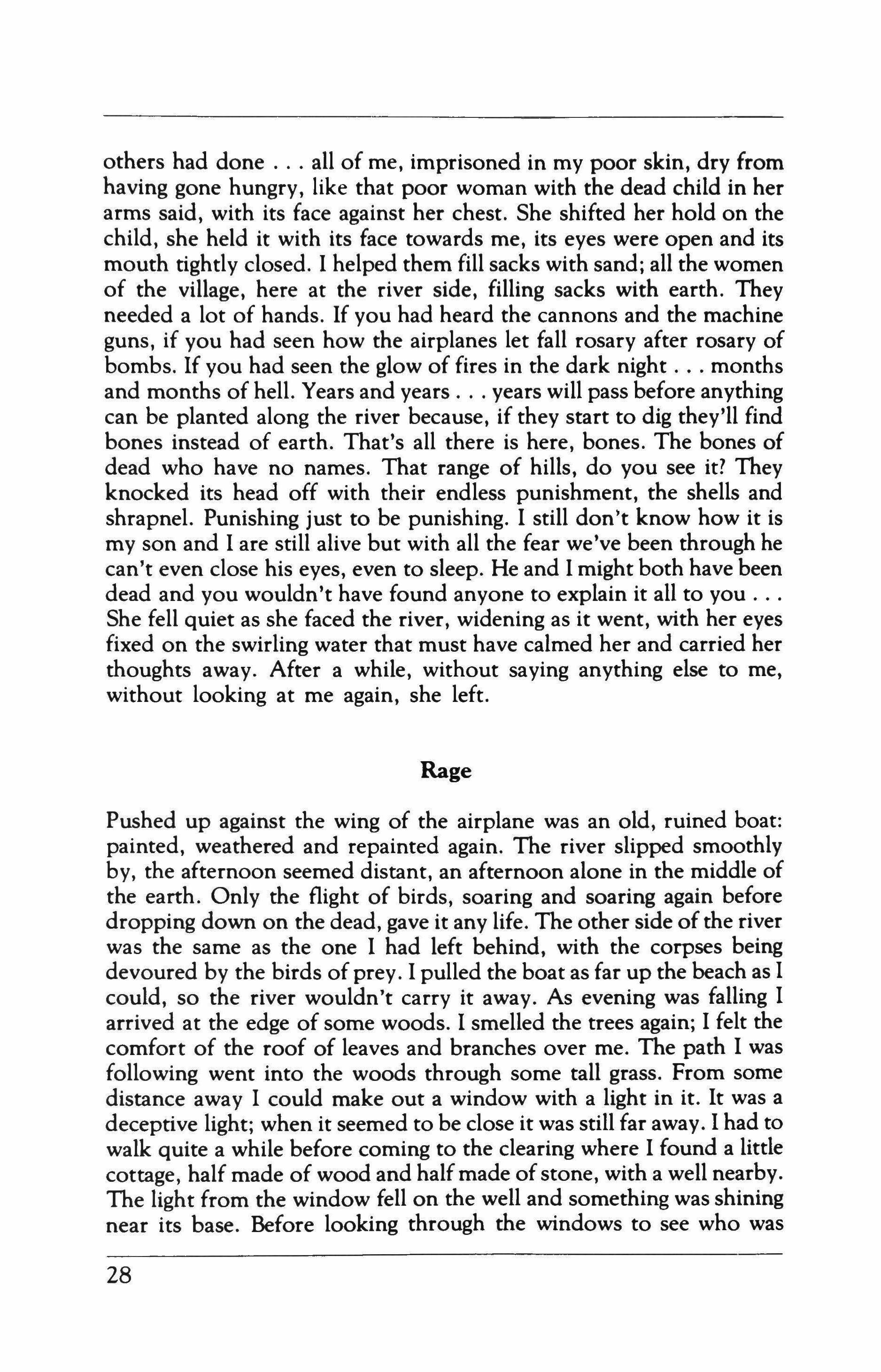
others had done all of me, imprisoned in my poor skin, dry from having gone hungry, like that poor woman with the dead child in her arms said, with its face against her chest. She shifted her hold on the child, she held it with its face towards me, its eyes were open and its mouth tightly closed. I helped them fill sacks with sand; all the women of the village, here at the river side, filling sacks with earth. They needed a lot of hands. If you had heard the cannons and the machine guns, if you had seen how the airplanes let fall rosary after rosary of bombs. If you had seen the glow of fires in the dark night months and months of hell. Years and years years will pass before anything can be planted along the river because, if they start to dig they'll find bones instead of earth. That's all there is here, bones. The bones of dead who have no names. That range of hills, do you see it? They knocked its head off with their endless punishment, the shells and shrapnel. Punishing just to be punishing. I still don't know how it is my son and I are still alive but with all the fear we've been through he can't even close his eyes, even to sleep. He and I might both have been dead and you wouldn't have found anyone to explain it all to you She fell quiet as she faced the river, widening as it went, with her eyes fixed on the swirling water that must have calmed her and carried her thoughts away. After a while, without saying anything else to me, without looking at me again, she left.
Rage
Pushed up against the wing of the airplane was an old, ruined boat: painted, weathered and repainted again. The river slipped smoothly by, the afternoon seemed distant, an afternoon alone in the middle of the earth. Only the flight of birds, soaring and soaring again before dropping down on the dead, gave it any life. The other side of the river was the same as the one I had left behind, with the corpses being devoured by the birds of prey. I pulled the boat as far up the beach as I could, so the river wouldn't carry it away. As evening was falling I arrived at the edge of some woods. I smelled the trees again; I felt the comfort of the roof of leaves and branches over me. The path I was following went into the woods through some tall grass. From some distance away I could make out a window with a light in it. It was a deceptive light; when it seemed to be close it was still far away. I had to walk quite a while before coming to the clearing where I found a little cottage, half made of wood and halfmade of stone, with a well nearby. The light from the window fell on the well and something was shining near its base. Before looking through the windows to see who was
28
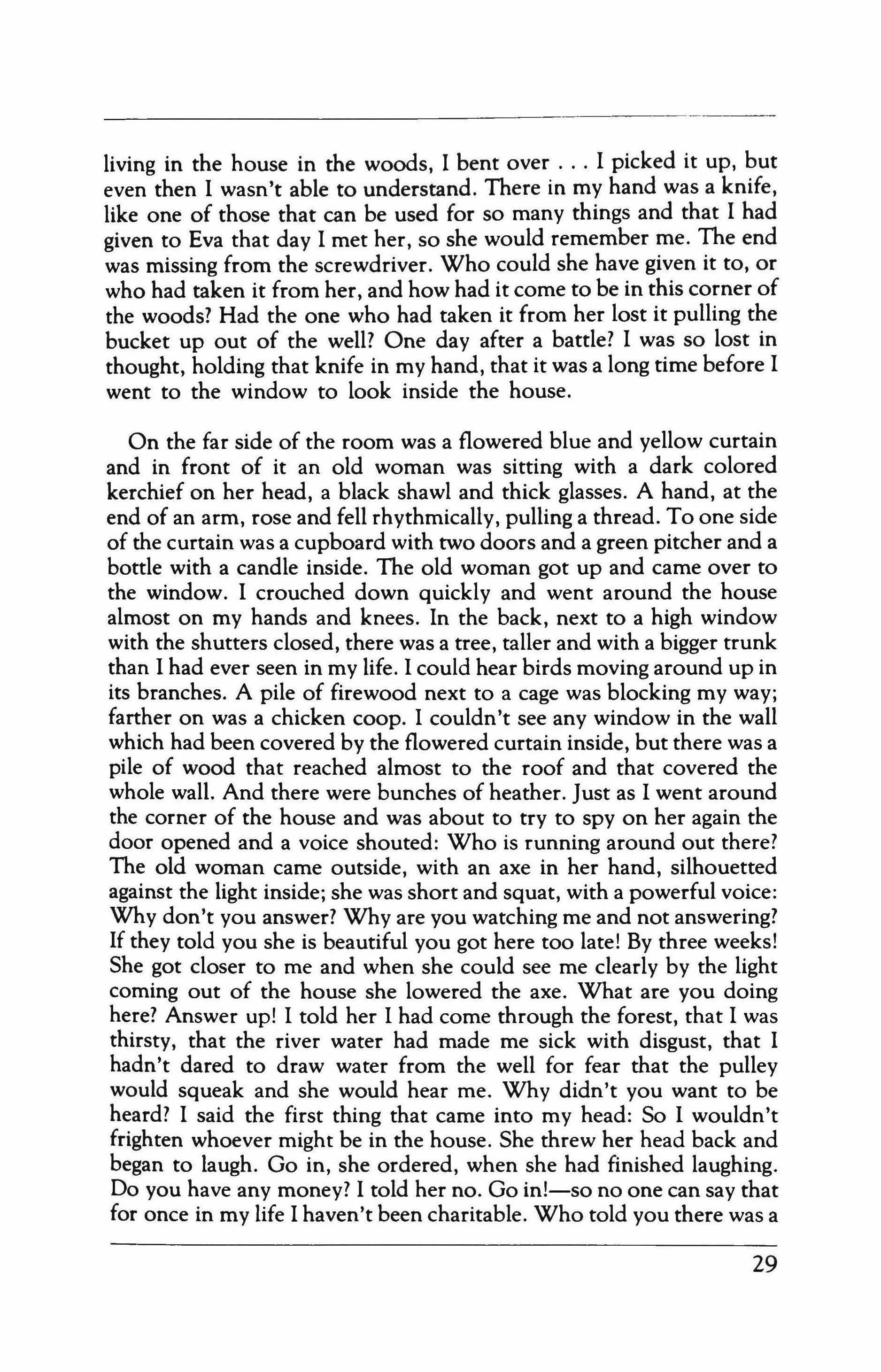
living in the house in the woods, I bent over I picked it up, but even then I wasn't able to understand. There in my hand was a knife, like one of those that can be used for so many things and that I had given to Eva that day I met her, so she would remember me. The end was missing from the screwdriver. Who could she have given it to, or who had taken it from her, and how had it come to be in this corner of the woods? Had the one who had taken it from her lost it pulling the bucket up out of the well? One day after a battle? I was so lost in thought, holding that knife in my hand, that it was a long time before I went to the window to look inside the house.
On the far side of the room was a flowered blue and yellow curtain and in front of it an old woman was sitting with a dark colored kerchief on her head, a black shawl and thick glasses. A hand, at the end of an arm, rose and fell rhythmically, pulling a thread. To one side of the curtain was a cupboard with two doors and a green pitcher and a bottle with a candle inside. The old woman got up and came over to the window. I crouched down quickly and went around the house almost on my hands and knees. In the back, next to a high window with the shutters closed, there was a tree, taller and with a bigger trunk than I had ever seen in my life. I could hear birds moving around up in its branches. A pile of firewood next to a cage was blocking my way; farther on was a chicken coop. I couldn't see any window in the wall which had been covered by the flowered curtain inside, but there was a pile of wood that reached almost to the roof and that covered the whole wall. And there were bunches of heather. Just as I went around the corner of the house and was about to try to spy on her again the door opened and a voice shouted: Who is running around out there? The old woman came outside, with an axe in her hand, silhouetted against the light inside; she was short and squat, with a powerful voice: Why don't you answer? Why are you watching me and not answering? If they told you she is beautiful you got here too late! By three weeks! She got closer to me and when she could see me clearly by the light coming out of the house she lowered the axe. What are you doing here? Answer up! I told her I had come through the forest, that I was thirsty, that the river water had made me sick with disgust, that I hadn't dared to draw water from the well for fear that the pulley would squeak and she would hear me. Why didn't you want to be heard? I said the first thing that came into my head: So I wouldn't frighten whoever might be in the house. She threw her head back and began to laugh. Go in, she ordered, when she had finished laughing. Do you have any money? I told her no. Go in!-so no one can say that for once in my life I haven't been charitable. Who told you there was a
29

house here, in such a secluded place? I felt like telling her my feet had led me here but I was afraid it would make her mad. I followed the path, I was running away from the river The axe was shining and it looked very sharp.
Inside it stank of smoke and boiled cabbage. The fireplace, a very small one, was lit and in a box beside the seat where I had seen the old woman sitting there were skeins of colored threads. Hung on the chimney was a black picture frame, the glass in it more dirty than clean and behind the glass was an embroidered Virgin: the same one as on my scapular. I put my hand in the back pocket of my pants: it wasn't there. I touched my neck: I wasn't wearing it. And then I looked at the old woman from top to bottom, ugly as a bad dream, with a snub nose, small, wide-set eyes, a low forehead, puffy cheeks and a big mouth. She cleared a pile of odds and ends offof the round table, and once she had it straight she put down a botde and two glasses. You'll see how well sit down here, opposite me. Let's hear it! I looked at the chimney and looked at her; I couldn't help comparing the ernbroidered face to the real one. She guessed what I was thinking and began to laugh again the same way, throwing her head back, the skin tighten, ing on her neck and her adam's apple bobbing up and down. You're seeing things. Take a good look at me. Are you a mute? Is that why you aren't talking? I tell you you're seeing things. She was lying more than the lyingest liar that ever lived. That Virgin was her; that man had already told me: the Virgin of the scapulars, all the faces of those Virgins, were her face. She was in love with herself. Ugly as sin and she was in love with herself. How could anyone so fat and ugly love herself? Well, I would really have to be something to embroider my own face, with all the other faces there are in the world. When I was a child the nuns taught me how to embroider. You can't imagine how often I've blessed them. But I have some other income, don't think She got up and opened the flowered curtain; behind it was a cot covered with a red blanket and an armchair with some ropes hanging from the arms and legs. Fairly new ropes, fairly white, not very thick. She brought over an ashtray and put it down on the table, sat down and lit a cigarette. Do you smoke? I said no, with a shake of my head. I do. The soldiers got me used to it. They always brought me some. Have a smoke, old woman, have a smoke it will take your mind off things and at my age I smoke and watch the smoke coming out of my mouth and my nose. Leaning all the way forward she put the cigarette right in front of my face. I feel like I am going to have to pinch you awake. I don't know how you can wander around the world with those eyes you have, like a defenseless child. Aren't you a man? Come on! Where's your courage! And long live war and long live
30

death! She put the cigarette in the ashtray, took the cork out of the bottle and filled the glasses to the brim. This will untie your tongue and wake up your blood. Drink! She lifted her glass, I lifted mine and I emptied it with one swallow: just like she did. To the health of scapulars! That wine was fire. I like you, even if you are still mute. You could receive the Sacred Host without even going to confession. I didn't think I would be enjoying such good company tonight. Put a log on the fire. Drink! Such a quiet night the noises of war reached all the way here, you don't believe it? I have to confess I don't know what the word fear means. Never! She looked at the cigarette and I looked at the ropes on the armchair. Look at me! You've never seen anyone like me. Never ever! She filled her glass again. Drink! She filled mine again. This chair, she said reaching out the arm with the glass in the hand, has a story. The girl who sat here I buried next to the tree behind the house, under the rabbit hutch. The oldest of all the trees. She used to look at it, all filled with birds, so I turned the chair around so she couldn't see it. I covered the window: closed the shutters and piled some wood up behind it. So she couldn't see anything. There were some with black and white feathers, with red breasts, red breasts from eating so many plum berries, with green feathers, like stagnant water, gray ones with blue breasts, all singing just to be singing and hopping just to be hopping, and her with her back turned so she can see only me. Me! I had her here for quite a while. She was beautiful, it's impossible to explain how beautiful she was. When I discovered her I found her passed out at the edge of the garden, near the cabbage. A bullet had gone through her thigh. No, not through it, it was still inside. And then with the kitchen knife no, with the knife she was carrying in a pocket, full of other things that were all in my way, I took the bullet out with these two fingers. The wound got infected. Every day I had to squeeze out the pus and put rags on it, soaked in thyme-water. While I was taking care of her I thought she was mine Drink! She poured more wine, so much more that it spilled over the edge. Drink! I am giving you wine to drink, not to let it go sour. It burned. It burned me. After I cured her she stayed with me forever. Those ropes you've been looking at from time to time were to tie her up with; if not, she would have gotten away. Tied up. Tied up tight to keep the old woman of the woods company. Drink! Don't you think if she had been able to, she would have escaped, jumping off to the other side of the woods like a rabbit? That she would have flown through the windows if she had had wings The first one to see her was a man, not so old, who was running from the bullets and hungry for 1 went outside so he wouldn't feel inhibited and I heard how she screamed. What a weakling! And then at the end, what a scream!
31
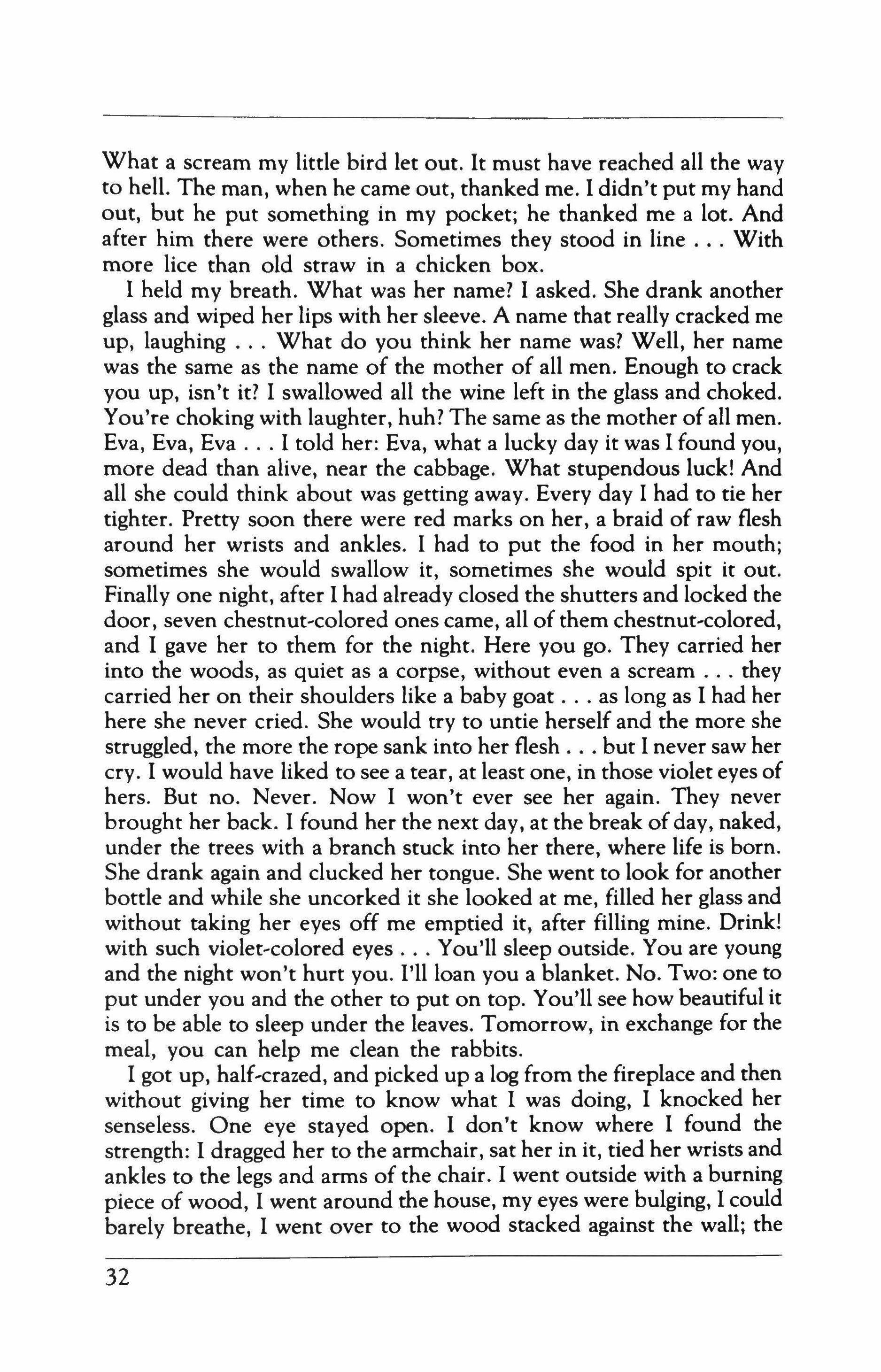
What a scream my little bird let out. It must have reached all the way to hell. The man, when he carne out, thanked me. I didn't put my hand out, but he put something in my pocket; he thanked me a lot. And after him there were others. Sometimes they stood in line With more lice than old straw in a chicken box.
I held my breath. What was her name? I asked. She drank another glass and wiped her lips with her sleeve. A name that really cracked me up, laughing What do you think her name was? Well, her name was the same as the name of the mother of all men. Enough to crack you up, isn't it? I swallowed all the wine left in the glass and choked. You're choking with laughter, huh? The same as the mother of all men. Eva, Eva, Eva I told her: Eva, what a lucky day it was I found you, more dead than alive, near the cabbage. What stupendous luck! And all she could think about was getting away. Every day I had to tie her tighter. Pretty soon there were red marks on her, a braid of raw flesh around her wrists and ankles. I had to put the food in her mouth; sometimes she would swallow it, sometimes she would spit it out. Finally one night, after I had already closed the shutters and locked the door, seven chestnut-colored ones carne, all of them chestnut-colored, and I gave her to them for the night. Here you go. They carried her into the woods, as quiet as a corpse, without even a scream they carried her on their shoulders like a baby goat as long as I had her here she never cried. She would try to untie herself and the more she struggled, the more the rope sank into her flesh but I never saw her cry. I would have liked to see a tear, at least one, in those violet eyes of hers. But no. Never. Now I won't ever see her again. They never brought her back. I found her the next day, at the break ofday, naked, under the trees with a branch stuck into her there, where life is born. She drank again and clucked her tongue. She went to look for another bottle and while she uncorked it she looked at me, filled her glass and without taking her eyes off me emptied it, after filling mine. Drink! with such violet,colored eyes You'll sleep outside. You are young and the night won't hurt you. I'll loan you a blanket. No. Two: one to put under you and the other to put on top. You'll see how beautiful it is to be able to sleep under the leaves. Tomorrow, in exchange for the meal, you can help me clean the rabbits. I got up, half-crazed, and picked up a log from the fireplace and then without giving her time to know what I was doing, I knocked her senseless. One eye stayed open. I don't know where I found the strength: I dragged her to the armchair, sat her in it, tied her wrists and ankles to the legs and arms of the chair. I went outside with a burning piece of wood, I went around the house, my eyes were bulging, I could barely breathe, I went over to the wood stacked against the wall; the
32
two bundles of heather went up in tongues of flame immediately, everything was crackling. The cottage turned into a furnace and the nearest leaves and branches were screaming in the flames. Clutching Eva's knife in one hand and the burning torch in the other, I ran around crazy, setting fire to all the grass, all the broom and all the lowhanging branches. I finally stopped where the path left the woods, my hands and feet frozen, the rest of me a fevered knot. I threw the torch back into the woods. I couldn't find the boat; when I stumbled over it I let myself fall inside. It seemed as if the boat was sinking, that I was floating, that between me and the boat there was nothing, that the river was rising up. Then I dragged it, I still don't know how; and I don't know how, but I found myself on the water with the oars in my hands. I rowed without thinking, lost in that nightmare, under a sky full of low streaming clouds, not knowing what to do, whether to let the river take me downstream or to try to keep going or if one side was any different than another, if anything mattered. Only the river and me. No war, no evil. I picked up Eva's knife, put my hand in the water and opened my fingers. The boat went on by itself until finally I managed to pull it towards land. A beam from the moon fell over me like a sword, the river doubled it back. The fog, a low fog the color of sulfur, dragged itself along, wrapping itself around the dead.
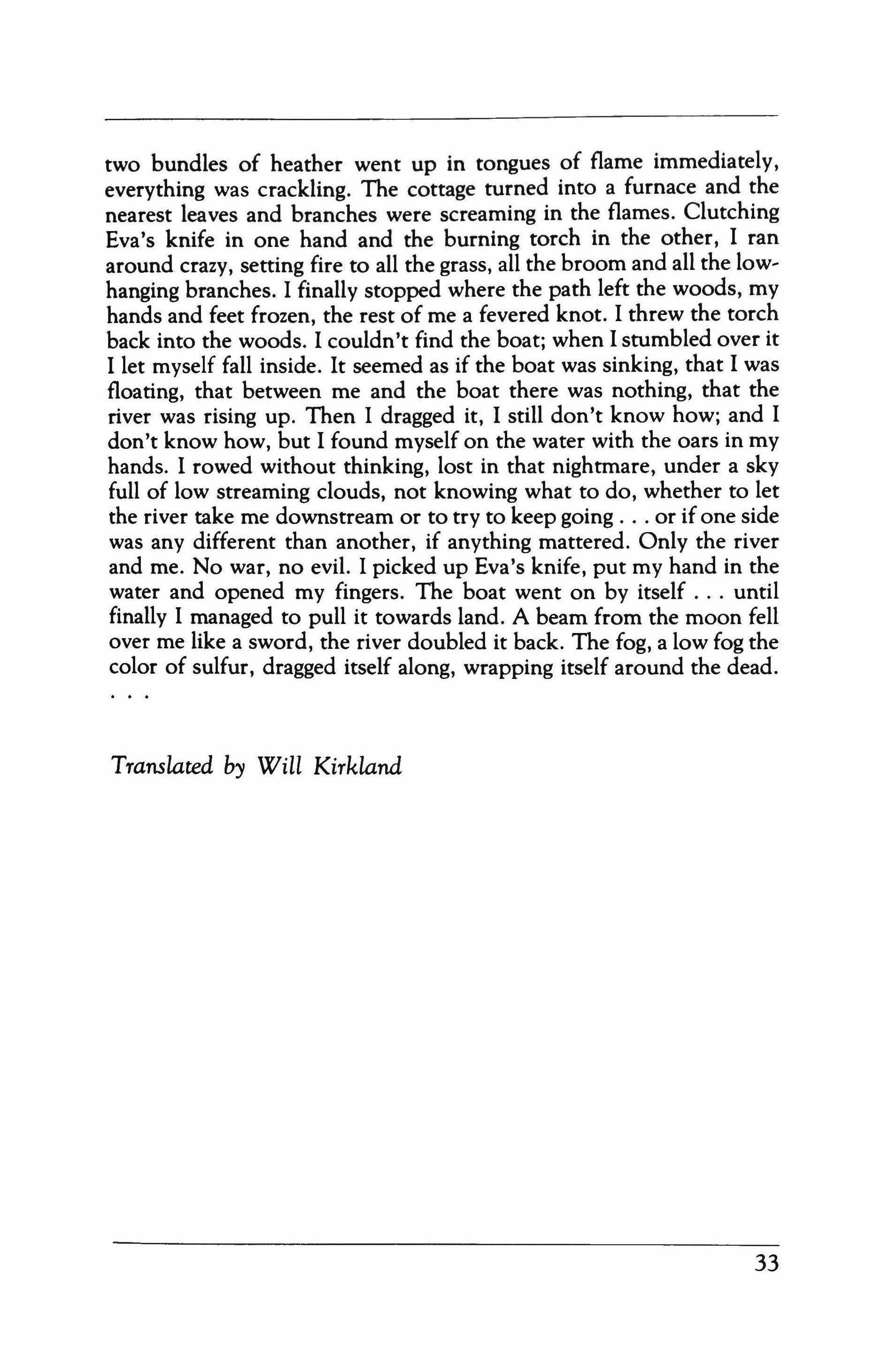 Translated
Translated
by Will
Kirkland
33
On the use, abuse and discomposure of culture
Fernando Savater
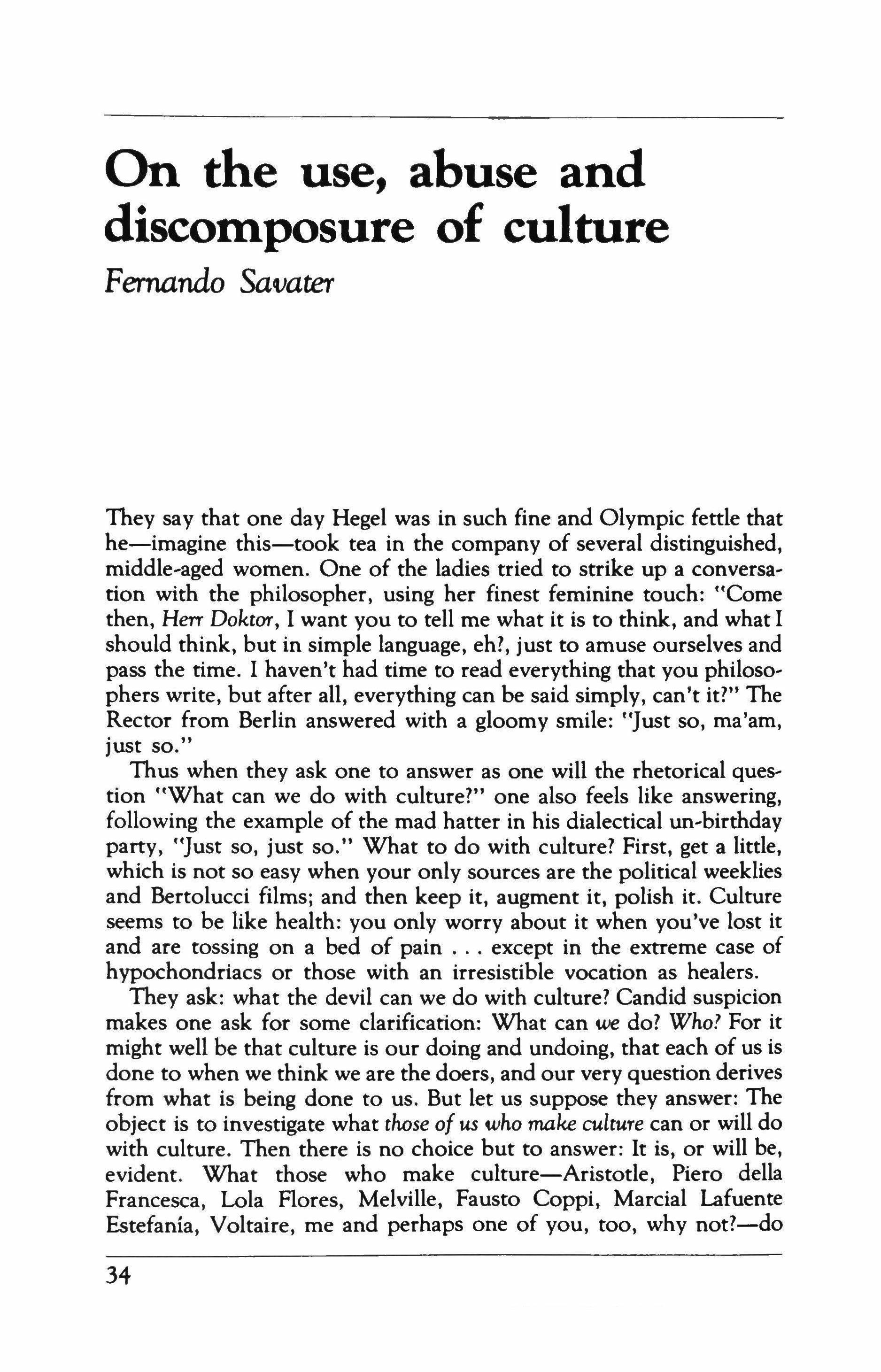
They say that one day Hegel was in such fine and Olympic fettle that he-imagine this-took tea in the company of several distinguished, middle-aged women. One of the ladies tried to strike up a conversation with the philosopher, using her finest feminine touch: "Come then, Herr Doktor, I want you to tell me what it is to think, and what I should think, but in simple language, eh?, just to amuse ourselves and pass the time. I haven't had time to read everything that you philosophers write, but after all, everything can be said simply, can't it?" The Rector from Berlin answered with a gloomy smile: "Just so, ma'am, just so."
Thus when they ask one to answer as one will the rhetorical question "What can we do with culture?" one also feels like answering, following the example of the mad hatter in his dialectical uri-birthday party, "Just so, just so." What to do with culture? First, get a little, which is not so easy when your only sources are the political weeklies and Bertolucci films; and then keep it, augment it, polish it. Culture seems to be like health: you only worry about it when you've lost it and are tossing on a bed of pain except in the extreme case of hypochondriacs or those with an irresistible vocation as healers.
They ask: what the devil can we do with culture? Candid suspicion makes one ask for some clarification: What can we do? Who? For it might well be that culture is our doing and undoing, that each of us is done to when we think we are the doers, and our very question derives from what is being done to us. But let us suppose they answer: The object is to investigate what those of us who make culture can or will do with culture. Then there is no choice but to answer: It is, or will be, evident. What those who make culture-Aristotle, Piero della Francesca, Lola Flores, Melville, Fausto Coppi, Marcial Lafuente Estefania, Voltaire, me and perhaps one of you, too, why not?-do
34
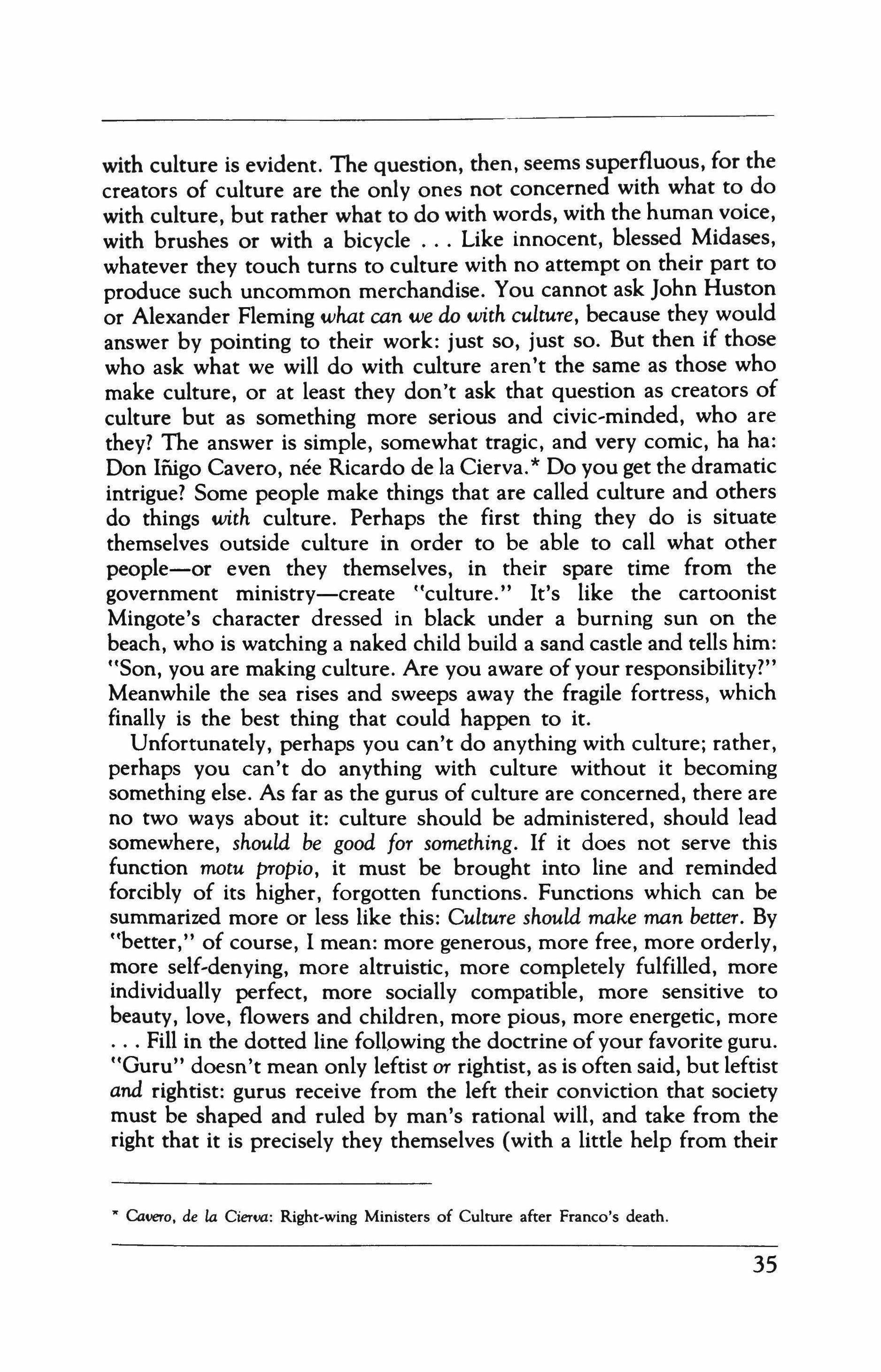
with culture is evident. The question, then, seems superfluous, for the creators of culture are the only ones not concerned with what to do with culture, but rather what to do with words, with the human voice, with brushes or with a bicycle Like innocent, blessed Midases, whatever they touch turns to culture with no attempt on their part to produce such uncommon merchandise. You cannot ask John Huston or Alexander Fleming what can we do with culture, because they would answer by pointing to their work: just so, just so. But then if those who ask what we will do with culture aren't the same as those who make culture, or at least they don't ask that question as creators of culture but as something more serious and civic-minded, who are they? The answer is simple, somewhat tragic, and very comic, ha ha: Don Ifugo Cavero, nee Ricardo de la Cierva. * Do you get the dramatic intrigue? Some people make things that are called culture and others do things with culture. Perhaps the first thing they do is situate themselves outside culture in order to be able to call what other people-or even they themselves, in their spare time from the government ministry-create "culture." It's like the cartoonist Mingote's character dressed in black under a burning sun on the beach, who is watching a naked child build a sand castle and tells him: "Son, you are making culture. Are you aware of your responsibility?" Meanwhile the sea rises and sweeps away the fragile fortress, which finally is the best thing that could happen to it.
Unfortunately, perhaps you can't do anything with culture; rather, perhaps you can't do anything with culture without it becoming something else. As far as the gurus of culture are concerned, there are no two ways about it: culture should be administered, should lead somewhere, should be good for something. If it does not serve this function motu propio, it must be brought into line and reminded forcibly of its higher, forgotten functions. Functions which can be summarized more or less like this: Culture should make man better. By "better," of course, I mean: more generous, more free, more orderly, more self-deriving, more altruistic, more completely fulfilled, more individually perfect, more socially compatible, more sensitive to beauty, love, flowers and children, more pious, more energetic, more Fill in the dotted line following the doctrine of your favorite guru. "Guru" doesn't mean only leftist or rightist, as is often said, but leftist and rightist: gurus receive from the left their conviction that society must be shaped and ruled by man's rational will, and take from the right that it is precisely they themselves (with a little help from their
W CaI.lel'O, de la Cierva: Right-wing Ministers of Culture after Franco's death.
35

friends) that are called to carry out tJelis nolis such lofty designs. So, onward to the redemption of culture! But it happens that culture (that conjunction of active disparities which the guru, in order to manage them better and more easily, calls "culture") is characterized by a certain unmanageable condition: it's not that culture is good for nothing, it's good for anything. Instead ofmaking men better, it makes them better, worse, normal and farnilv-size. Every time a guru and his followers determine, almost always with the most laudable and best intentions in the world, what is best for man, they find that culture gives them that, and the opposite, and something different, and something else that has nothing whatsoever to do with what the local government, the family, or the union (not even the new Polish union!) knows how to manage. In the face of such disconcerting tragedy there are two options, two: the first is pure, simple and honest-giving up (do what you like, I'm going home to dinner); and the secondreaching the conclusion that there are two kinds of culture, good and bad, encouraging one and eliminating the other. Needless to say, the true, pure-blooded guru never heeds the cowardly simplicity of the first solution and opts enthusiastically for the second. Good culture and bad culture; one that makes man better and another that makes him worse: and the poor local governments caught in the middle, trying to foment the first and stop or persecute the second. To make matters worse, one might even suspect that there is a point at which man becomes so culturally good that it can't be worse. Meanwhile, some of the official "worseners" fulfill the paradoxical role of betterment, for if they don't actually cleanse us, they teach us to live happily with our excrement. This doesn't stop the municipal governments: years ago we talked of "bourgeois culture and proletarian culture," which is like saying "bourgeois money and proletarian money," or "bourgeois State and proletarian State." But we also speak of "popular culture," etc. These administrative categories, however, break down from time to time and generate paradoxes. Let us admit, for instance, that culture "is at the service of the ruling class and should really be on the side of the oppressed." Let us forget for the moment that "ruling class," "the oppressed," "at the service of," etc., are themselves cultural fabrications that fall into the same area to which they attempt to bring order. Let us suppose finally that good triumphs, and all the cultural creators begin to defend the oppressed against the ruling class: won't the uniformity of that victory be a sign that culture is once again at the service of the ruling class? Is it possible to imagine a uniformly good culture that at the same time does not enslave us? Won't it be the others, whoever they are and whatever they defend, who incarnate true culture in the well-ordered realm of
36
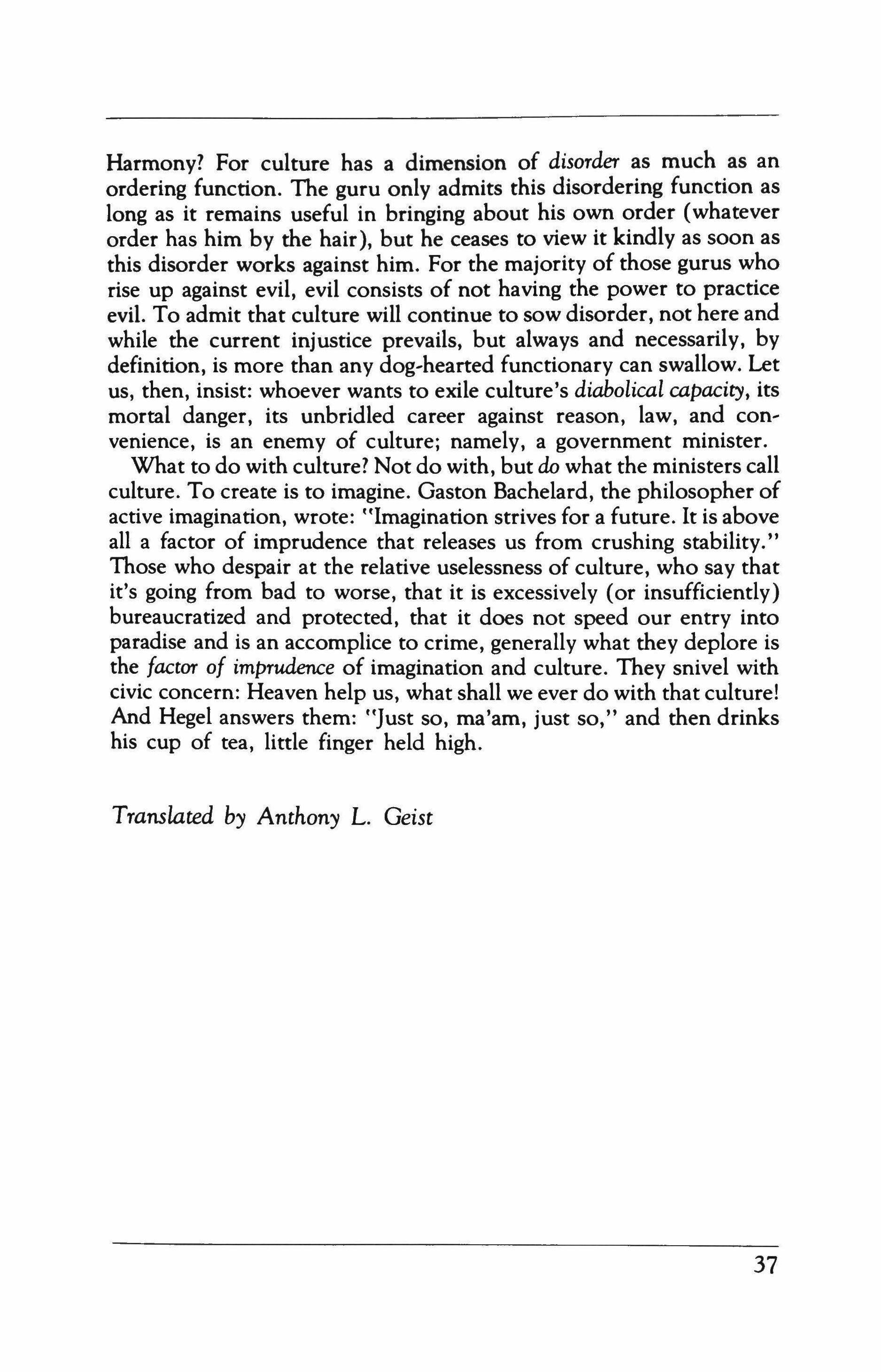
Harmony? For culture has a dimension of disorder as much as an ordering function. The guru only admits this disordering function as long as it remains useful in bringing about his own order (whatever order has him by the hair), but he ceases to view it kindly as soon as this disorder works against him. For the majority of those gurus who rise up against evil, evil consists of not having the power to practice evil. To admit that culture will continue to sow disorder, not here and while the current injustice prevails, but always and necessarily, by definition, is more than any dog-hearted functionary can swallow. Let us, then, insist: whoever wants to exile culture's diabolical capacity, its mortal danger, its unbridled career against reason, law, and convenience, is an enemy of culture; namely, a government minister. What to do with culture? Not do with, but do what the ministers call culture. To create is to imagine. Gaston Bachelard, the philosopher of active imagination, wrote: "Imagination strives for a future. It is above all a factor of imprudence that releases us from crushing stability." Those who despair at the relative uselessness of culture, who say that it's going from bad to worse, that it is excessively (or insufficiently) bureaucratized and protected, that it does not speed our entry into paradise and is an accomplice to crime, generally what they deplore is the factor of imprudence of imagination and culture. They snivel with civic concern: Heaven help us, what shall we ever do with that culture! And Hegel answers them: "Just so, ma'am, just so," and then drinks his cup of tea, little finger held high.
Translated by Anthony L. Geist
37
An interview with Juan Goytisolo
Anthony L. Geist
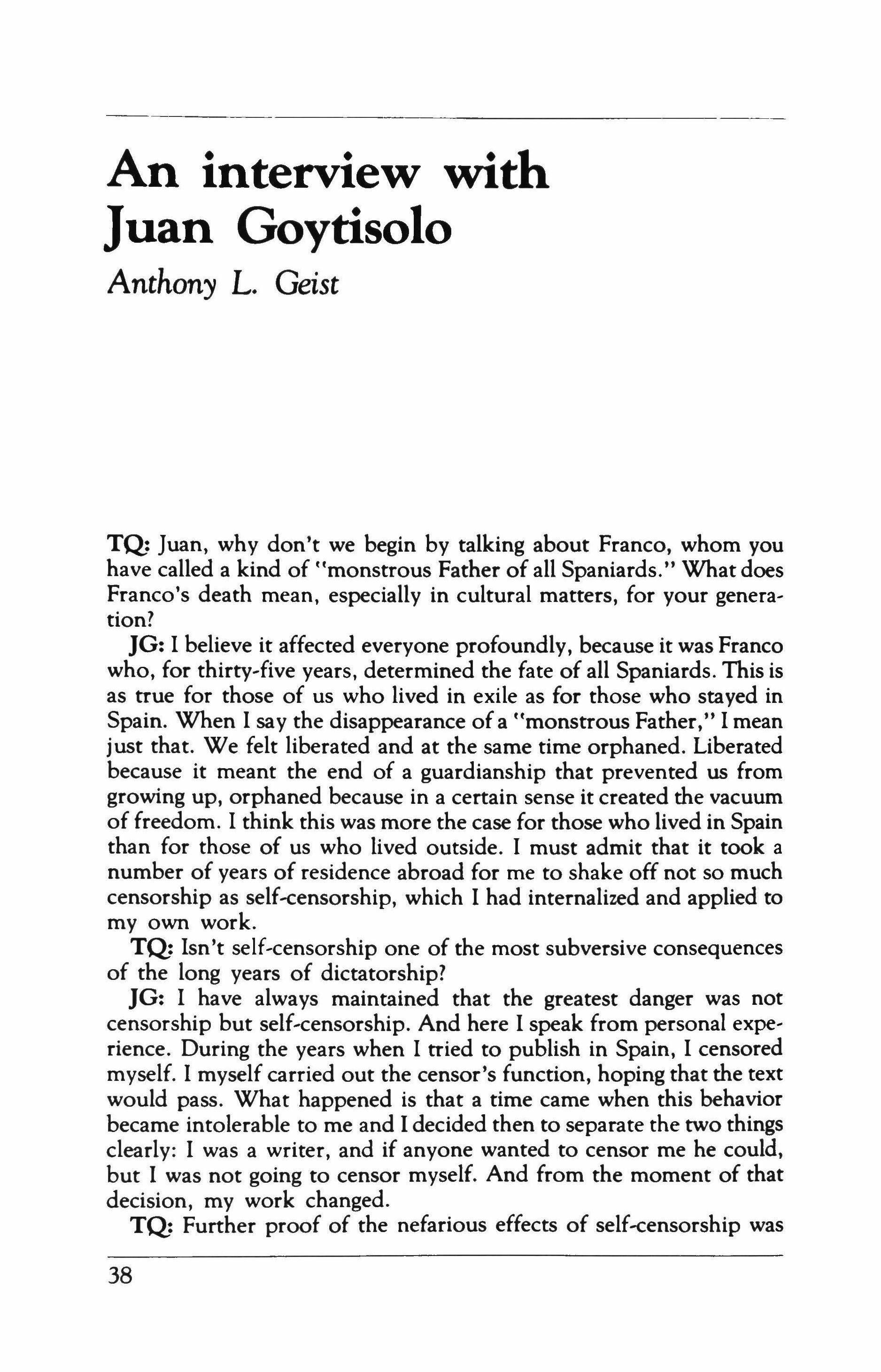
TQ; Juan, why don't we begin by talking about Franco, whom you have called a kind of "monstrous Father of all Spaniards." What does Franco's death mean, especially in cultural matters, for your generation?
JG: I believe it affected everyone profoundly, because it was Franco who, for thirty-five years, determined the fate of all Spaniards. This is as true for those of us who lived in exile as for those who stayed in Spain. When I say the disappearance of a "monstrous Father," I mean just that. We felt liberated and at the same time orphaned. Liberated because it meant the end of a guardianship that prevented us from growing up, orphaned because in a certain sense it created the vacuum of freedom. I think this was more the case for those who lived in Spain than for those of us who lived outside. I must admit that it took a number of years of residence abroad for me to shake off not so much censorship as self-censorship, which I had internalized and applied to my own work.
TQ; Isn't self-censorship one of the most subversive consequences of the long years of dictatorship?
JG: I have always maintained that the greatest danger was not censorship but self-censorship. And here I speak from personal experience. During the years when I tried to publish in Spain, I censored myself. I myself carried out the censor's function, hoping that the text would pass. What happened is that a time came when this behavior became intolerable to me and I decided then to separate the two things clearly; I was a writer, and if anyone wanted to censor me he could, but I was not going to censor myself. And from the moment of that decision, my work changed.
TQ; Further proof of the nefarious effects of self-censorship was
38
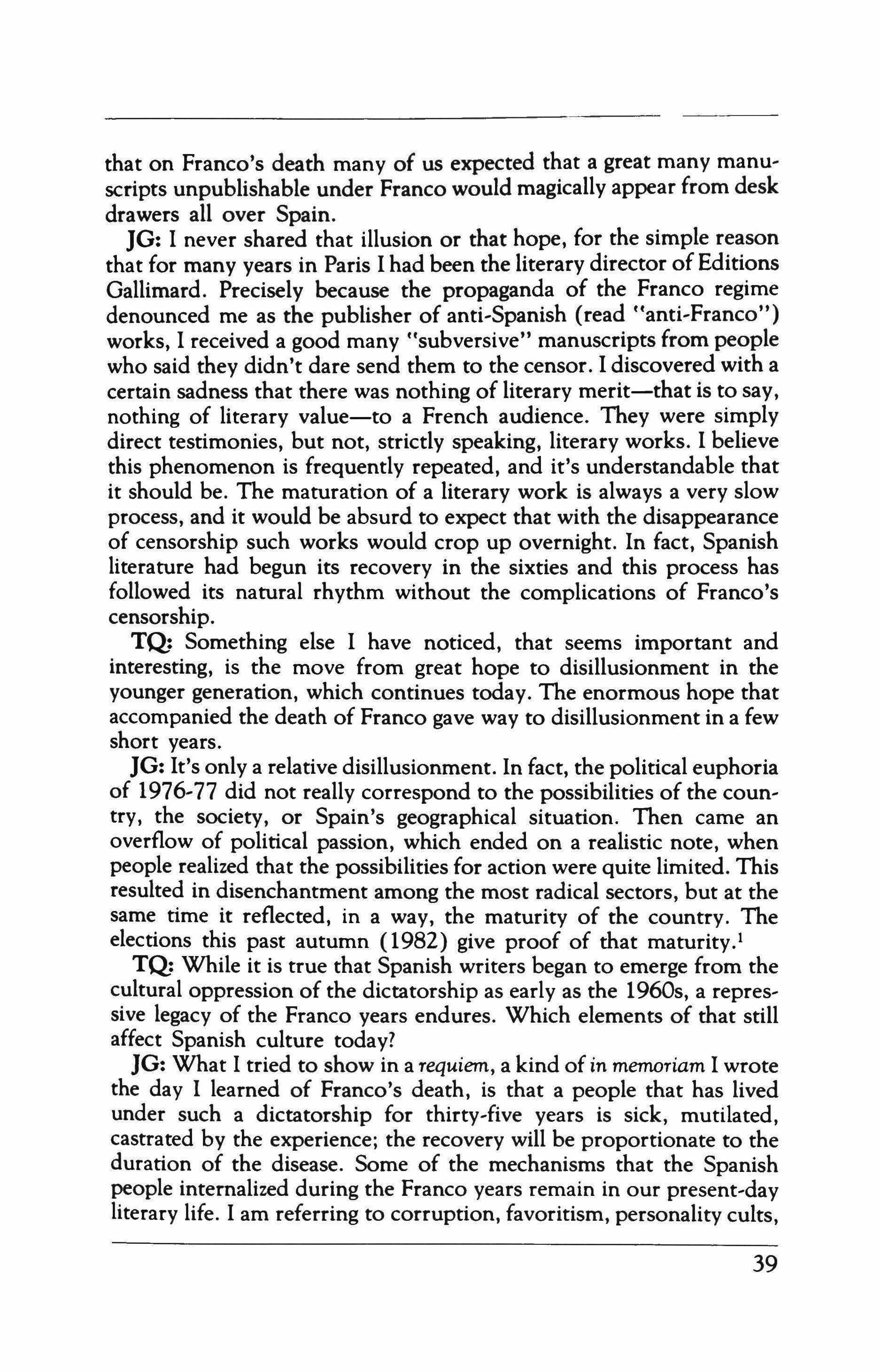
that on Franco's death many of us expected that a great many manuscripts unpublishable under Franco would magically appear from desk drawers all over Spain.
JG: I never shared that illusion or that hope, for the simple reason that for many years in Paris I had been the literary director of Editions Gallimard. Precisely because the propaganda of the Franco regime denounced me as the publisher of anti-Spanish (read "anti-Franco") works, I received a good many "subversive" manuscripts from people who said they didn't dare send them to the censor. I discovered with a certain sadness that there was nothing of literary merit-that is to say, nothing of literary value-to a French audience. They were simply direct testimonies, but not, strictly speaking, literary works. I believe this phenomenon is frequently repeated, and it's understandable that it should be. The maturation of a literary work is always a very slow process, and it would be absurd to expect that with the disappearance of censorship such works would crop up overnight. In fact, Spanish literature had begun its recovery in the sixties and this process has followed its natural rhythm without the complications of Franco's censorship.
TO; Something else I have noticed, that seems important and interesting, is the move from great hope to disillusionment in the younger generation, which continues today. The enormous hope that accompanied the death of Franco gave way to disillusionment in a few short years.
JG: It's only a relative disillusionment. In fact, the political euphoria of 1976�77 did not really correspond to the possibilities of the country, the society, or Spain's geographical situation. Then came an overflow of political passion, which ended on a realistic note, when people realized that the possibilities for action were quite limited. This resulted in disenchantment among the most radical sectors, but at the same time it reflected, in a way, the maturity of the country. The elections this past autumn (1982) give proof of that maturity.'
TQ: While it is true that Spanish writers began to emerge from the cultural oppression of the dictatorship as early as the 1960s, a repressive legacy of the Franco years endures. Which elements of that still affect Spanish culture today?
JG: What I tried to show in a requiem, a kind of in memoriam I wrote the day I learned of Franco's death, is that a people that has lived under such a dictatorship for thirty-five years is sick, mutilated, castrated by the experience; the recovery will be proportionate to the duration of the disease. Some of the mechanisms that the Spanish people internalized during the Franco years remain in our present-day literary life. I am referring to corruption, favoritism, personality cults,
39
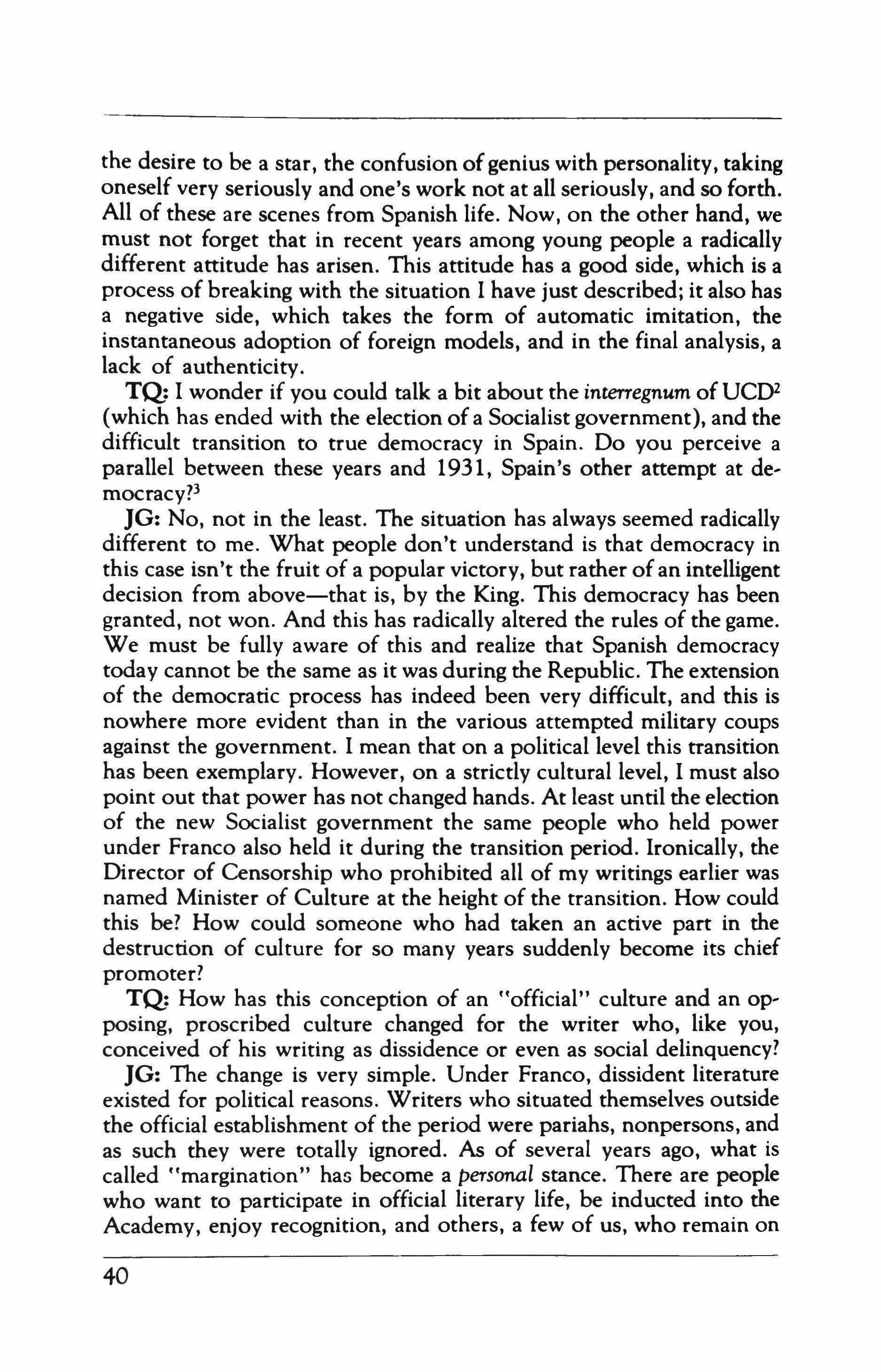
the desire to be a star, the confusion ofgenius with personality, taking oneself very seriously and one's work not at all seriously, and so forth. All of these are scenes from Spanish life. Now, on the other hand, we must not forget that in recent years among young people a radically different attitude has arisen. This attitude has a good side, which is a process of breaking with the situation I have just described; it also has a negative side, which takes the form of automatic imitation, the instantaneous adoption of foreign models, and in the final analysis, a lack of authenticity.
T� I wonder if you could talk a bit about the interregnum of uerY (which has ended with the election of a Socialist government), and the difficult transition to true democracy in Spain. Do you perceive a parallel between these years and 1931, Spain's other attempt at de, mocracvf
JG: No, not in the least. The situation has always seemed radically different to me. What people don't understand is that democracy in this case isn't the fruit of a popular victory, but rather of an intelligent decision from above-that is, by the King. This democracy has been granted, not won. And this has radically altered the rules of the game. We must be fully aware of this and realize that Spanish democracy today cannot be the same as it was during the Republic. The extension of the democratic process has indeed been very difficult, and this is nowhere more evident than in the various attempted military coups against the government. I mean that on a political level this transition has been exemplary. However, on a strictly cultural level, I must also point out that power has not changed hands. At least until the election of the new Socialist government the same people who held power under Franco also held it during the transition period. Ironically, the Director of Censorship who prohibited all of my writings earlier was named Minister of Culture at the height of the transition. How could this be? How could someone who had taken an active part in the destruction of culture for so many years suddenly become its chief promoter?
T� How has this conception of an "official" culture and an opposing, proscribed culture changed for the writer who, like you, conceived of his writing as dissidence or even as social delinquency?
JG: The change is very simple. Under Franco, dissident literature existed for political reasons. Writers who situated themselves outside the official establishment of the period were pariahs, nonpersons, and as such they were totally ignored. As of several years ago, what is called "margination" has become a personal stance. There are people who want to participate in official literary life, be inducted into the Academy, enjoy recognition, and others, a few of us, who remain on
40
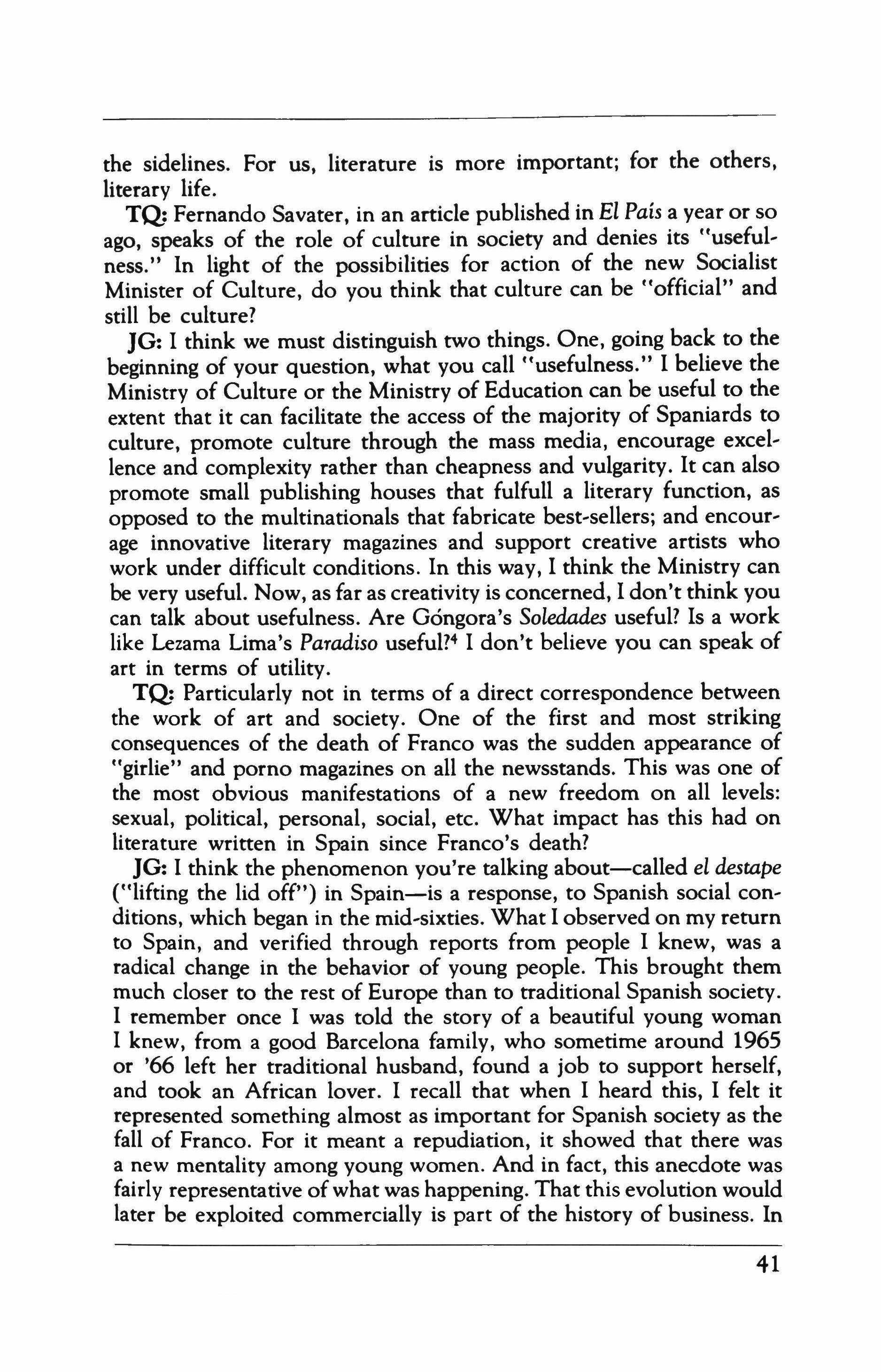
the sidelines. For us, literature is more important; for the others, literary life.
TQ; Fernando Savater, in an article published in El Pais a year or so ago, speaks of the role of culture in society and denies its "useful, ness." In light of the possibilities for action of the new Socialist Minister of Culture, do you think that culture can be "official" and still be culture?
JG: I think we must distinguish two things. One, going back to the beginning of your question, what you call "usefulness." I believe the Ministry of Culture or the Ministry of Education can be useful to the extent that it can facilitate the access of the majority of Spaniards to culture, promote culture through the mass media, encourage excel, lence and complexity rather than cheapness and vulgarity. It can also promote small publishing houses that fulfull a literary function, as opposed to the multinationals that fabricate best-sellers: and encourage innovative literary magazines and support creative artists who work under difficult conditions. In this way, I think the Ministry can be very useful. Now, as far as creativity is concerned, I don't think you can talk about usefulness. Are Gongora's Soledades useful? Is a work like Lezama Lima's Paradiso useful?" I don't believe you can speak of art in terms of utility.
TQ; Particularly not in terms of a direct correspondence between the work of art and society. One of the first and most striking consequences of the death of Franco was the sudden appearance of "girlie" and porno magazines on all the newsstands. This was one of the most obvious manifestations of a new freedom on all levels: sexual, political, personal, social, etc. What impact has this had on literature written in Spain since Franco's death?
JG: I think the phenomenon you're talking about-called el destape ("lifting the lid off") in Spain-is a response, to Spanish social con, ditions, which began in the mid-sixties. What I observed on my return to Spain, and verified through reports from people I knew, was a radical change in the behavior of young people. This brought them much closer to the rest of Europe than to traditional Spanish society. I remember once I was told the story of a beautiful young woman I knew, from a good Barcelona family, who sometime around 1965 or '66 left her traditional husband, found a job to support herself, and took an African lover. I recall that when I heard this, I felt it represented something almost as important for Spanish society as the fall of Franco. For it meant a repudiation, it showed that there was a new mentality among young women. And in fact, this anecdote was fairly representative ofwhat was happening. That this evolution would later be exploited commercially is part of the history of business. In
41
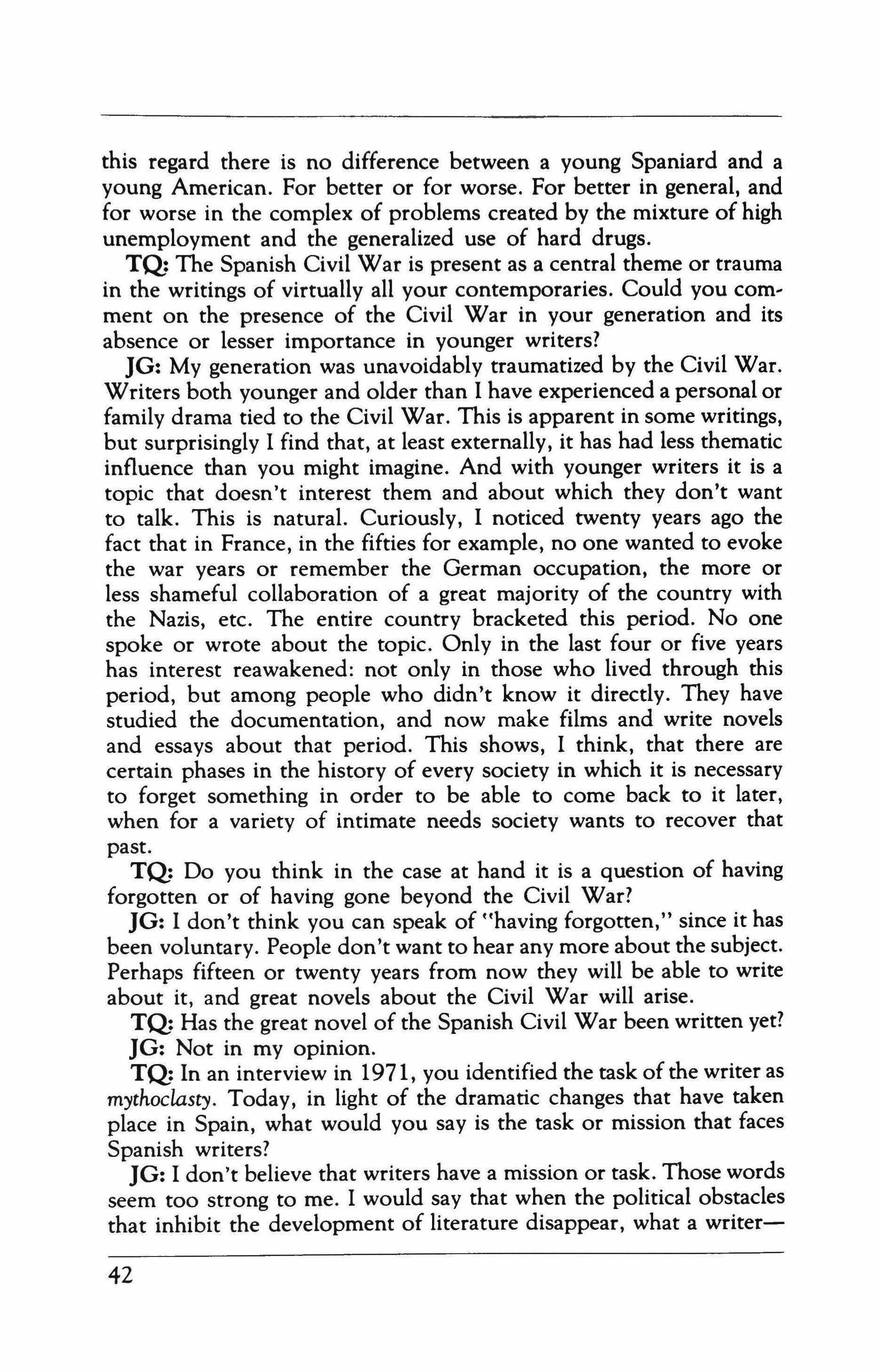
this regard there is no difference between a young Spaniard and a young American. For better or for worse. For better in general, and for worse in the complex of problems created by the mixture of high unemployment and the generalized use of hard drugs.
TQ; The Spanish Civil War is present as a central theme or trauma in the writings of virtually all your contemporaries. Could you comment on the presence of the Civil War in your generation and its absence or lesser importance in younger writers?
JG: My generation was unavoidably traumatized by the Civil War. Writers both younger and older than I have experienced a personal or family drama tied to the Civil War. This is apparent in some writings, but surprisingly I find that, at least externally, it has had less thematic influence than you might imagine. And with younger writers it is a topic that doesn't interest them and about which they don't want to talk. This is natural. Curiously, I noticed twenty years ago the fact that in France, in the fifties for example, no one wanted to evoke the war years or remember the German occupation, the more or less shameful collaboration of a great majority of the country with the Nazis, etc. The entire country bracketed this period. No one spoke or wrote about the topic. Only in the last four or five years has interest reawakened: not only in those who lived through this period, but among people who didn't know it directly. They have studied the documentation, and now make films and write novels and essays about that period. This shows, I think, that there are certain phases in the history of every society in which it is necessary to forget something in order to be able to come back to it later, when for a variety of intimate needs society wants to recover that past.
TQ; Do you think in the case at hand it is a question of having forgotten or of having gone beyond the Civil War?
JG: I don't think you can speak of "having forgotten," since it has been voluntary. People don't want to hear any more about the subject. Perhaps fifteen or twenty years from now they will be able to write about it, and great novels about the Civil War will arise.
TQ; Has the great novel of the Spanish Civil War been written yet?
JG: Not in my opinion.
TQ; In an interview in 1971, you identified the task of the writer as mythoclasty. Today, in light of the dramatic changes that have taken place in Spain, what would you say is the task or mission that faces Spanish writers?
JG: I don't believe that writers have a mission or task. Those words seem too strong to me. I would say that when the political obstacles that inhibit the development of literature disappear, what a writer-
42
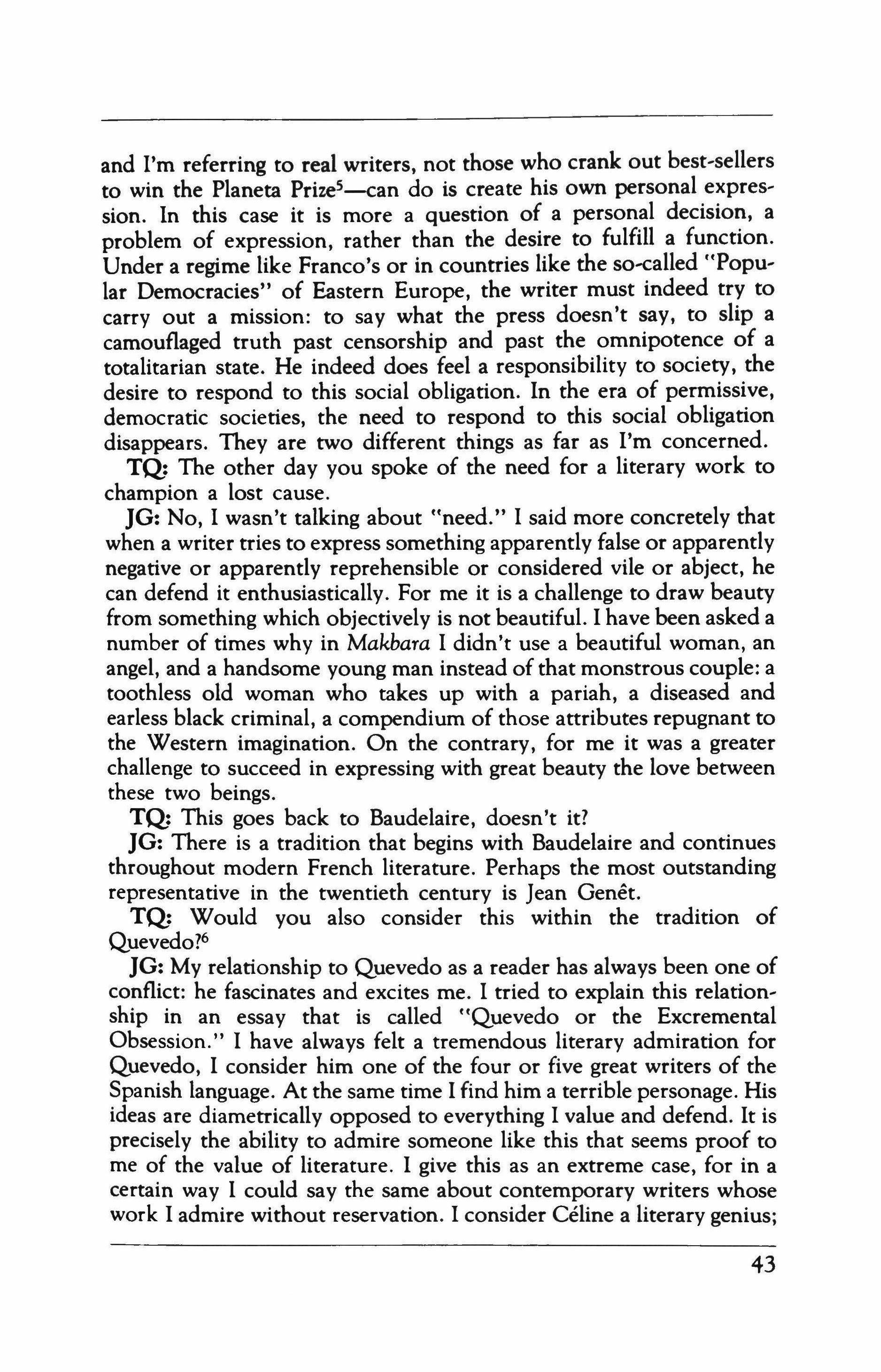
and I'm referring to real writers, not those who crank out best-sellers to win the Planeta Prize5-can do is create his own personal expression. In this case it is more a question of a personal decision, a problem of expression, rather than the desire to fulfill a function. Under a regime like Franco's or in countries like the so-called "Popular Democracies" of Eastern Europe, the writer must indeed try to carry out a mission: to say what the press doesn't say, to slip a camouflaged truth past censorship and past the omnipotence of a totalitarian state. He indeed does feel a responsibility to society, the desire to respond to this social obligation. In the era of permissive, democratic societies, the need to respond to this social obligation disappears. They are two different things as far as I'm concerned.
TQ: The other day you spoke of the need for a literary work to champion a lost cause.
JG: No, I wasn't talking about "need." I said more concretely that when a writer tries to express something apparently false or apparently negative or apparently reprehensible or considered vile or abject, he can defend it enthusiastically. For me it is a challenge to draw beauty from something which objectively is not beautiful. I have been asked a number of times why in Makbara I didn't use a beautiful woman, an angel, and a handsome young man instead of that monstrous couple: a toothless old woman who takes up with a pariah, a diseased and earless black criminal, a compendium of those attributes repugnant to the Western imagination. On the contrary, for me it was a greater challenge to succeed in expressing with great beauty the love between these two beings.
TQ: This goes back to Baudelaire, doesn't it?
JG: There is a tradition that begins with Baudelaire and continues throughout modern French literature. Perhaps the most outstanding representative in the twentieth century is Jean Genet.
TQ: Would you also consider this within the tradition of Quevedol"
JG: My relationship to Quevedo as a reader has always been one of conflict: he fascinates and excites me. I tried to explain this relation' ship in an essay that is called "Quevedo or the Excremental Obsession." I have always felt a tremendous literary admiration for Quevedo, I consider him one of the four or five great writers of the Spanish language. At the same time I find him a terrible personage. His ideas are diametrically opposed to everything I value and defend. It is precisely the ability to admire someone like this that seems proof to me of the value of literature. I give this as an extreme case, for in a certain way I could say the same about contemporary writers whose work I admire without reservation. I consider Celine a literary genius;
43

he was an anti-Semite, a Nazi collaborator, and at the same time one of the great writers of the twentieth century.
TQ: By the way, I wonder if in time we will be able to judge, more dispassionately, the contributions of some of the cultural heroes ofthe Spanish Left: Rafael Alberti, Miguel Hernandez, Antonio Machado.
JG: I hope so. I'm not speaking now of their work, but about the cult grown up around them. Those expressions that one reads-"Don Antonio Machado the Good"-go against the spirit and message of Juan de Mairena.? For a number of years we had a series of saints set up by the Right; now it would be a shame to replace them with saints from the Left. The political mvthification that has grown up around them in fact obstructs the comprehension of their literary work. This beatification doesn't do them justice.
TQ: I would like to change topics now, and talk about the regional and national autonomies in Spain. What role does literature written in the peripheral languages of Spain-Catahin, Valencian, Gallidan and Basque-play in Spanish culture today?
JG: From a literary point of view I would only speak of Catalan and Gallician. Practically speaking, there is not a Basque literature; Valencian and Mallorquin are dialects of Catalan, although the contribution of the Valencians is perhaps richer in many cases than that of the Catalans. As you well know, these cultures suffered tremendous oppression, not only under Franco but for historical reasons since the unification of Spain, specifically since centralization under the Bourbons, after the War of Succession.f With democracy these cultures have regained their liberty and can now express themselves with complete freedom. This is very positive. What I do see, though, is a certain social tension. You can't forget that half the population of the country is Spanish-speaking. I believe that Catalans have every right to be educated in their own culture and language, but the inhabitants of Catalonia who want to be educated and express themselves in Castilian have the same right. We must not commit the same error that Franco did in the forties when he tried to impose cultural standardization throughout Spain. Catalonia's wealth lies precisely in the existence of two languages and two cultures.
TQ: It seems to me that one of the obstacles to the necessary decentralization of Spanish cultural life has to do precisely with these languages. Don't you think they are perceived as a way of countering the centripetal force of Madrid?
JG: Yes, but this must be seen not only in regard to these two cultures, which already have their own momentum, but within Castilian culture itself. As you well know, until very recently, Spanish culture has been totally centralized in Madrid and to a lesser extent in Barce-
44
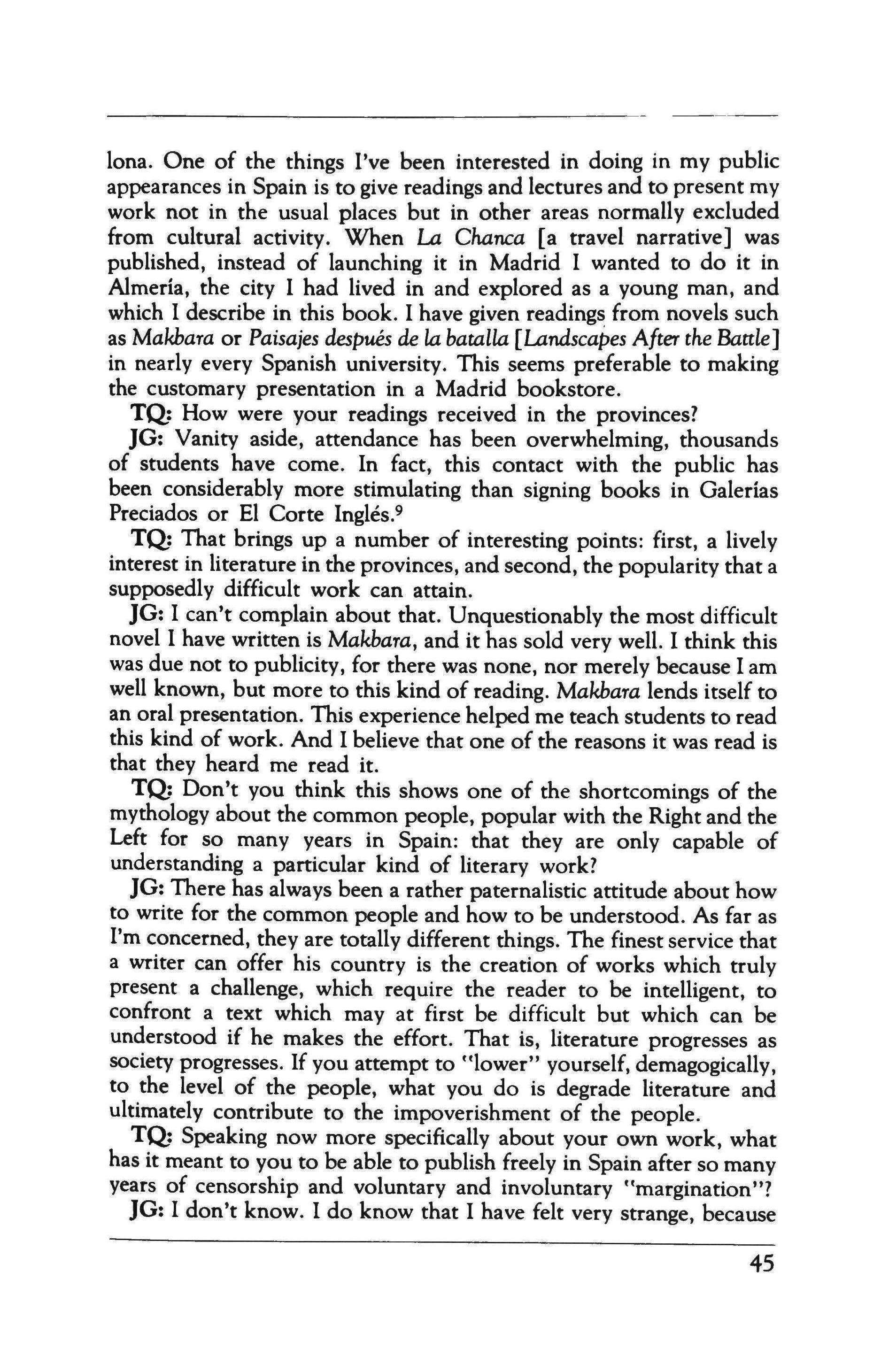
lona. One of the things I've been interested in doing in my public appearances in Spain is to give readings and lectures and to present my work not in the usual places but in other areas normally excluded from cultural activity. When La Chaoca [a travel narrative] was published, instead of launching it in Madrid I wanted to do it in Almeria, the city I had lived in and explored as a young man, and which I describe in this book. I have given readings from novels such as Makbara or Paisajes despues de la. baralla. [Landscapes After the Battle] in nearly every Spanish university. This seems preferable to making the customary presentation in a Madrid bookstore.
TQ: How were your readings received in the provinces?
JG: Vanity aside, attendance has been overwhelming, thousands of students have come. In fact, this contact with the public has been considerably more stimulating than signing books in Galerias Preciados or EI Corte Ingles."
TQ: That brings up a number of interesting points: first, a lively interest in literature in the provinces, and second, the popularity that a supposedly difficult work can attain.
JG: I can't complain about that. Unquestionably the most difficult novel I have written is Makbara, and it has sold very well. I think this was due not to publicity, for there was none, nor merely because I am well known, but more to this kind of reading. Makbara lends itself to an oral presentation. This experience helped me teach students to read this kind of work. And I believe that one of the reasons it was read is that they heard me read it.
TQ: Don't you think this shows one of the shortcomings of the mythology about the common people, popular with the Right and the Left for so many years in Spain: that they are only capable of understanding a particular kind of literary work?
JG: There has always been a rather paternalistic attitude about how to write for the common people and how to be understood. As far as I'm concerned, they are totally different things. The finest service that a writer can offer his country is the creation of works which truly present a challenge, which require the reader to be intelligent, to confront a text which may at first be difficult but which can be understood if he makes the effort. That is, literature progresses as society progresses. If you attempt to "lower" yourself, demagogically, to the level of the people, what you do is degrade literature and ultimately contribute to the impoverishment of the people.
TQ: Speaking now more specifically about your own work, what has it meant to you to be able to publish freely in Spain after so many years of censorship and voluntary and involuntary "margination"?
JG: I don't know. I do know that I have felt very strange, because
45
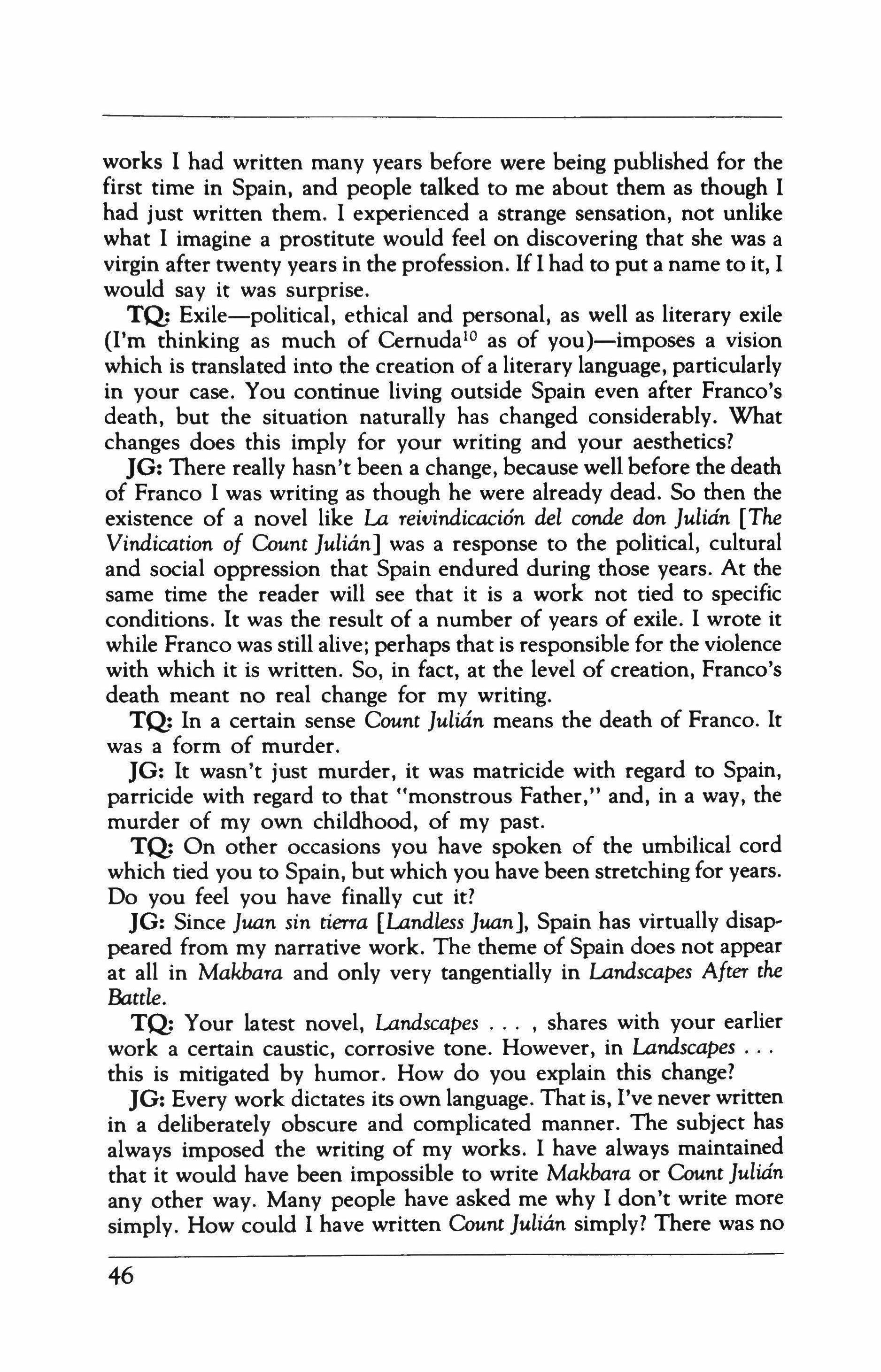
works I had written many years before were being published for the first time in Spain, and people talked to me about them as though I had just written them. I experienced a strange sensation, not unlike what I imagine a prostitute would feel on discovering that she was a virgin after twenty years in the profession. If I had to put a name to it, I would say it was surprise.
TQ; Exile-political, ethical and personal, as well as literary exile (I'm thinking as much of Cernuda'? as of you)-imposes a vision which is translated into the creation of a literary language, particularly in your case. You continue living outside Spain even after Franco's death, but the situation naturally has changed considerably. What changes does this imply for your writing and your aesthetics?
JG: There really hasn't been a change, because well before the death of Franco I was writing as though he were already dead. So then the existence of a novel like La reivindicacion del conde don Julian [The Vindication of Count Julian] was a response to the political, cultural and social oppression that Spain endured during those years. At the same time the reader will see that it is a work not tied to specific conditions. It was the result of a number of years of exile. I wrote it while Franco was still alive; perhaps that is responsible for the violence with which it is written. So, in fact, at the level of creation, Franco's death meant no real change for my writing.
TQ; In a certain sense Count Julidn means the death of Franco. It was a form of murder.
JG: It wasn't just murder, it was matricide with regard to Spain, parricide with regard to that "monstrous Father," and, in a way, the murder of my own childhood, of my past.
TQ; On other occasions you have spoken of the umbilical cord which tied you to Spain, but which you have been stretching for years. Do you feel you have finally cut it?
JG: Since Juan sin tierra [Landless JuanJ, Spain has virtually disappeared from my narrative work. The theme of Spain does not appear at all in Makbara and only very tangentially in Landscapes After the Battle.
TQ; Your latest novel, Landscapes shares with your earlier work a certain caustic, corrosive tone. However, in Landscapes this is mitigated by humor. How do you explain this change?
JG: Every work dictates its own language. That is, I've never written in a deliberately obscure and complicated manner. The subject has always imposed the writing of my works. I have always maintained that it would have been impossible to write Makbara or Count Julidn any other way. Many people have asked me why I don't write more simply. How could I have written Count Julian simply? There was no
46
other way to write it. The same thing happened with Makbara, in which the kind of narration, its oral character, imposed a type of language in which rhythm and prosody playa fundamental role. In the case of Landscapes the subject allowed me to use a simpler language than in my earlier novels. The complexity of Landscapes lies in the conception of the text and in the relations it establishes between narrator, character and reader.
TQ; To conclude, I would like to talk about your desire to be always on the periphery, what Severo Sarduy has called the "marginality" or "ex-centricity" of your work. Like it or not, you are becoming a "classic" of contemporary Spanish literature. Would you say that your own literary trajectory as well as historical events around you have, paradoxically, carried you to the center?
JG: This is not due to any virtue or merit of mine. Ever since I was a child I have almost always stayed on the edge of things. I remember that when I was in school and all the other kids were playing, I would sit and watch them. I have always been this way. Of course, in regard to literary life, I have always preferred to be a spectator rather than a protagonist. The few times I have been moved to participate in something have been for political reasons. I am referring to my antiFranco stance during my years of active militancy, my enthusiasm during the first years of the Cuban revolution, etc. But for a number of political and personal reasons, I have returned to my true nature. Spectator rather than actor, I have placed myself once again in the periphery, at the edge of things.

Puerto Rico, January 31, 1983
1. On October 28, 1982 the Socialist Workers Party of Spain (PSOE) won the national elections, succeeding a centrist coalition parry, the Union of the Democratic Center (UCD).
2. See note 1.
3. On April 14, 1931 the Republican parry swept the municipal elections throughout Spain, leading to the fall of the monarchy and the proclamation of a democratic republic. On July 18, 1936 the army under the command of General Franco rebelled against the government, sparking a civil war that lasted nearly three years.
4. Luis de Gongora y Argote (1561-1627), whose Soledades, a long, elaborate poem, has been alternately excoriated and praised for its complexity and the beaury of its imagery. Lezama Lima, a contemporary Cuban writer. His Paradiso is considered one of the most intricate and complex novels of contemporary Larin-American literature.
47
5. Planeta Prize. A highly remunerative literary prize awarded to a new novel each year by Planeta, a large, commercial publishing house in Barcelona.
6. Francisco de Quevedo y Villegas (15BO-1643). A writer known especially for his satiric and burlesque poetry and his linguistic inventiveness. He was an implacable enemy of Gongora (see note 4), against whom he launched vicious attacks in verse and prose.
7. Juan de Mairena. An apocryphal professor ofaesthetics and physical education invented by Antonio Machado, Mairena champions in his writings tolerance, moderation, common sense and simplicity of language.
B. Unification of Spain: The marriage of Fernando, King of Aragon, and Isabel, Queen of Castile, in 1469 united the various kingdoms of Spain.
Bourbon centralism: The Bourbons succeeded the Hapsburgs to the throne of Spain in 1701, sparking the War of Spanish Succession, which lasted until 1713.
9. Galerias Preciados, EI Corte Ingles: Department stores comparable to Bloomingdale's or Macy's.
10. Luis Cernuda (1902-1963). A contemporary of Garcia Lorca; poet and critic admired by Goytisolo.
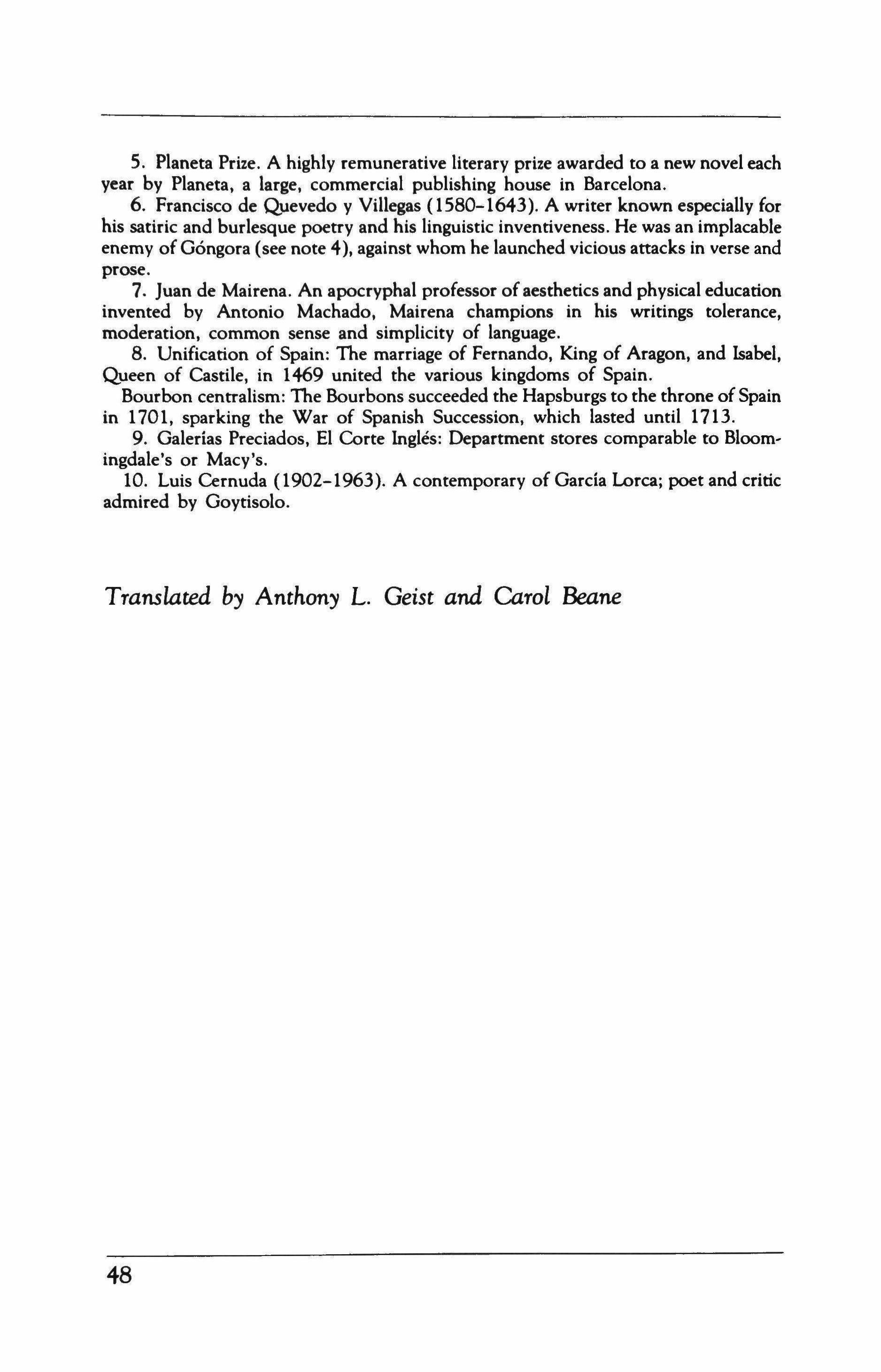 Translated
Translated
by
Anthony L. Geist and Carol Beane
48
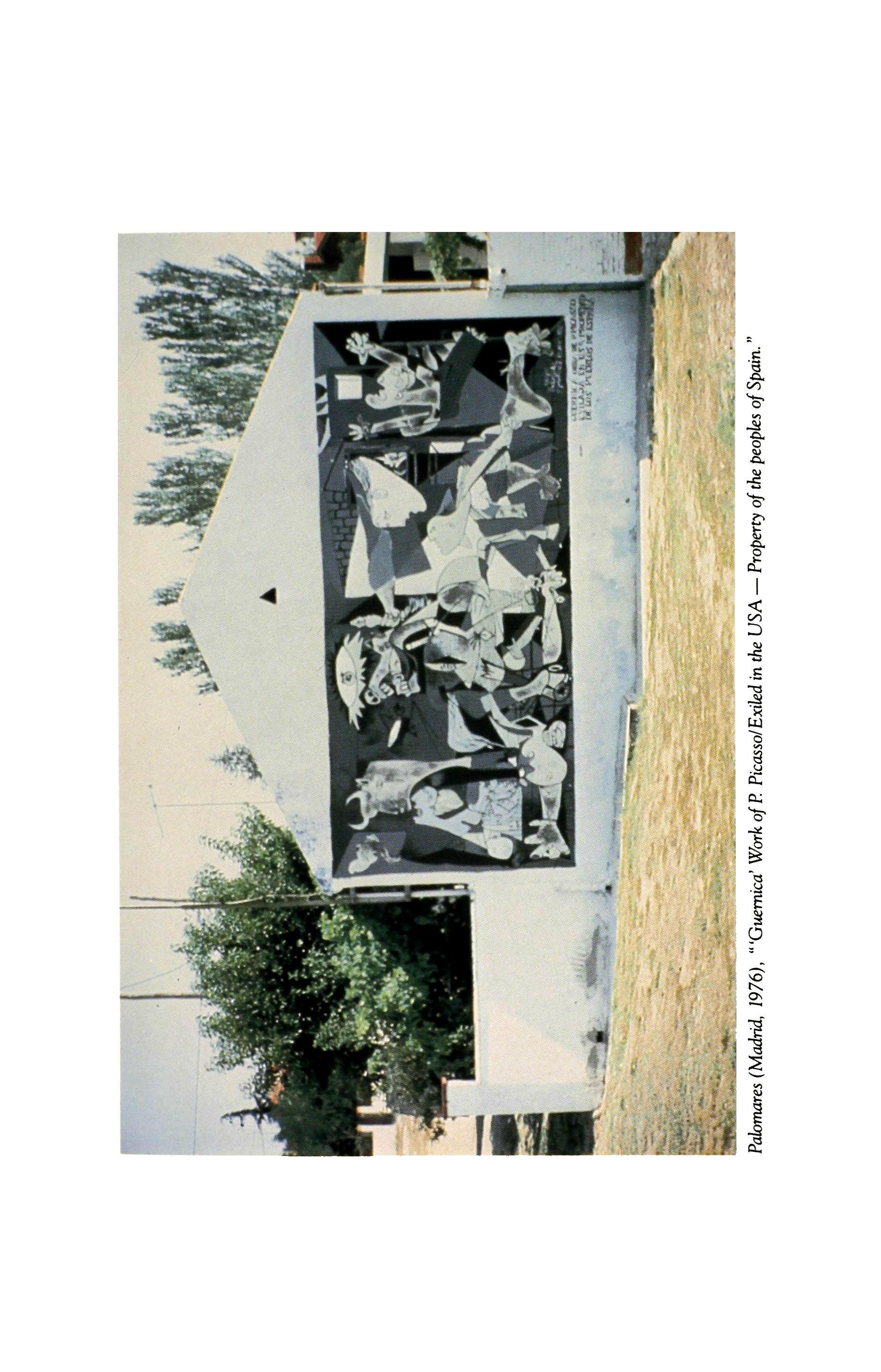 Palomares (Madrid, 1976), "'Guemica' Work of P. Picasso/Exiled in the USA - Property of
Palomares (Madrid, 1976), "'Guemica' Work of P. Picasso/Exiled in the USA - Property of
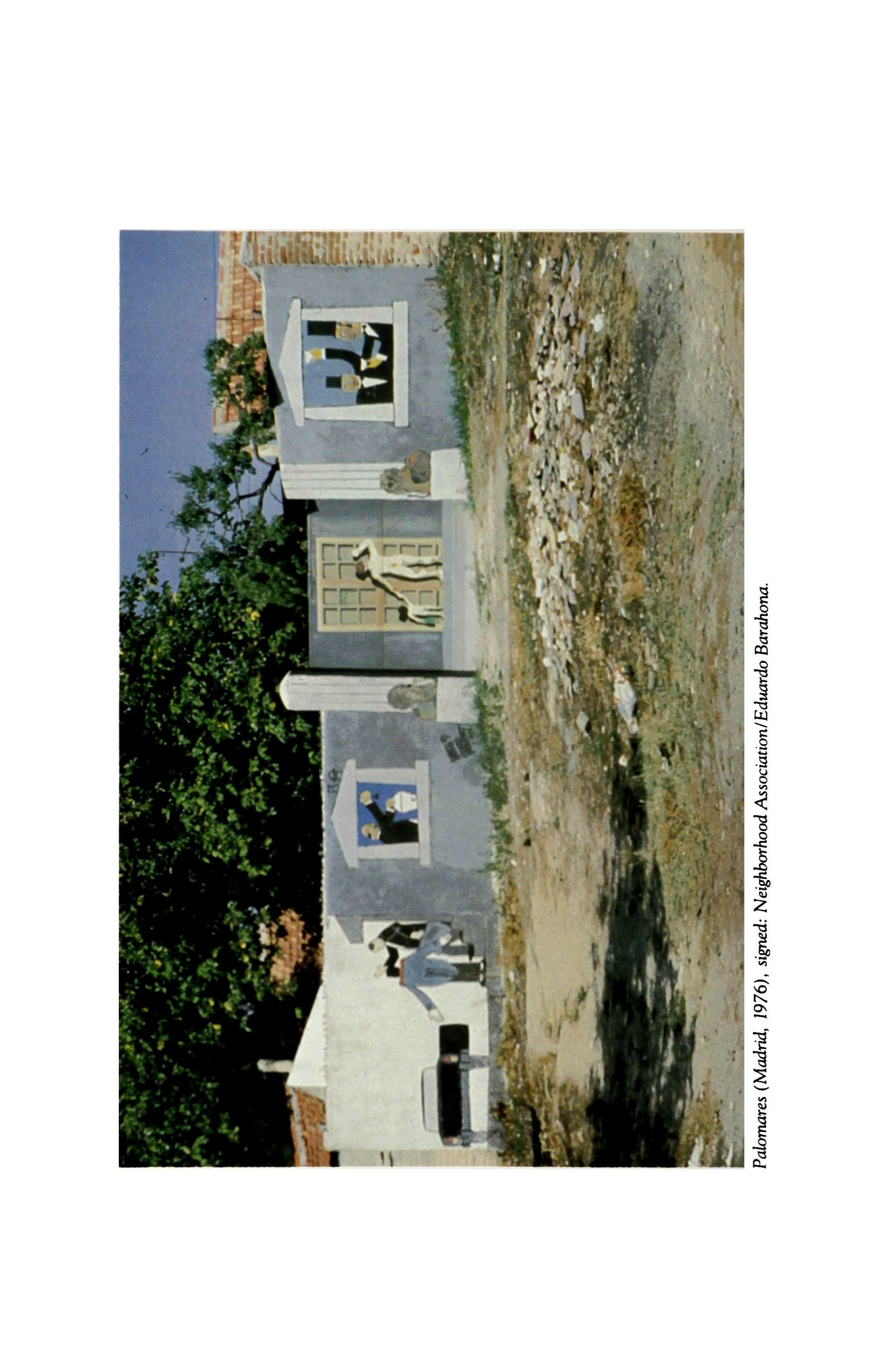
University

1.1.P.
•
ofMadrid (1975), "R. I. P. Here Lies the Majority Silenced by the Tenebrous Minority"; because it is certain.
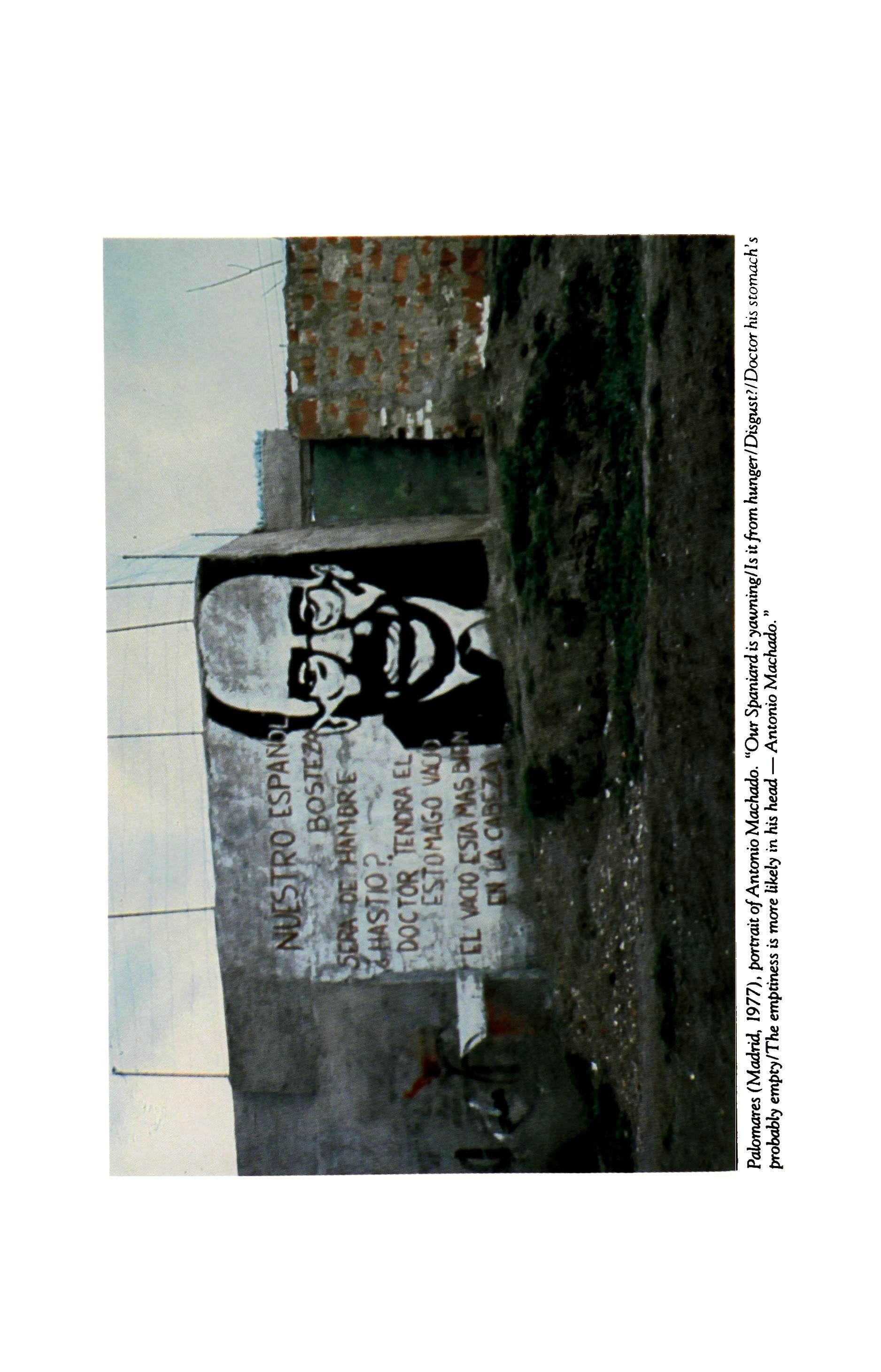 Palomares (Madrid, 1977), portrait ofAntonio Machado. "Our Spaniard is yawninglIs itfromhunger/Disgust?/Doctor his stomach's probably empty/The emptiness is more likely in his head - Antonio Machado. II
Palomares (Madrid, 1977), portrait ofAntonio Machado. "Our Spaniard is yawninglIs itfromhunger/Disgust?/Doctor his stomach's probably empty/The emptiness is more likely in his head - Antonio Machado. II
University ofMadrid (1975), "Dwarfs, homosexuals, syphilitics, sons ofbitches, students, dogs, psychologists, real McCoys, hipPies, women, artists, modem weaklings, drunks, [illegible}, surrealists, pregnant women, albinos, churchwardens, loners, baldies, drifters, hot-chestnut ladies, bikers WE MUST CHOOSE EITHER NEUROSIS OR THE BARRICADES. II
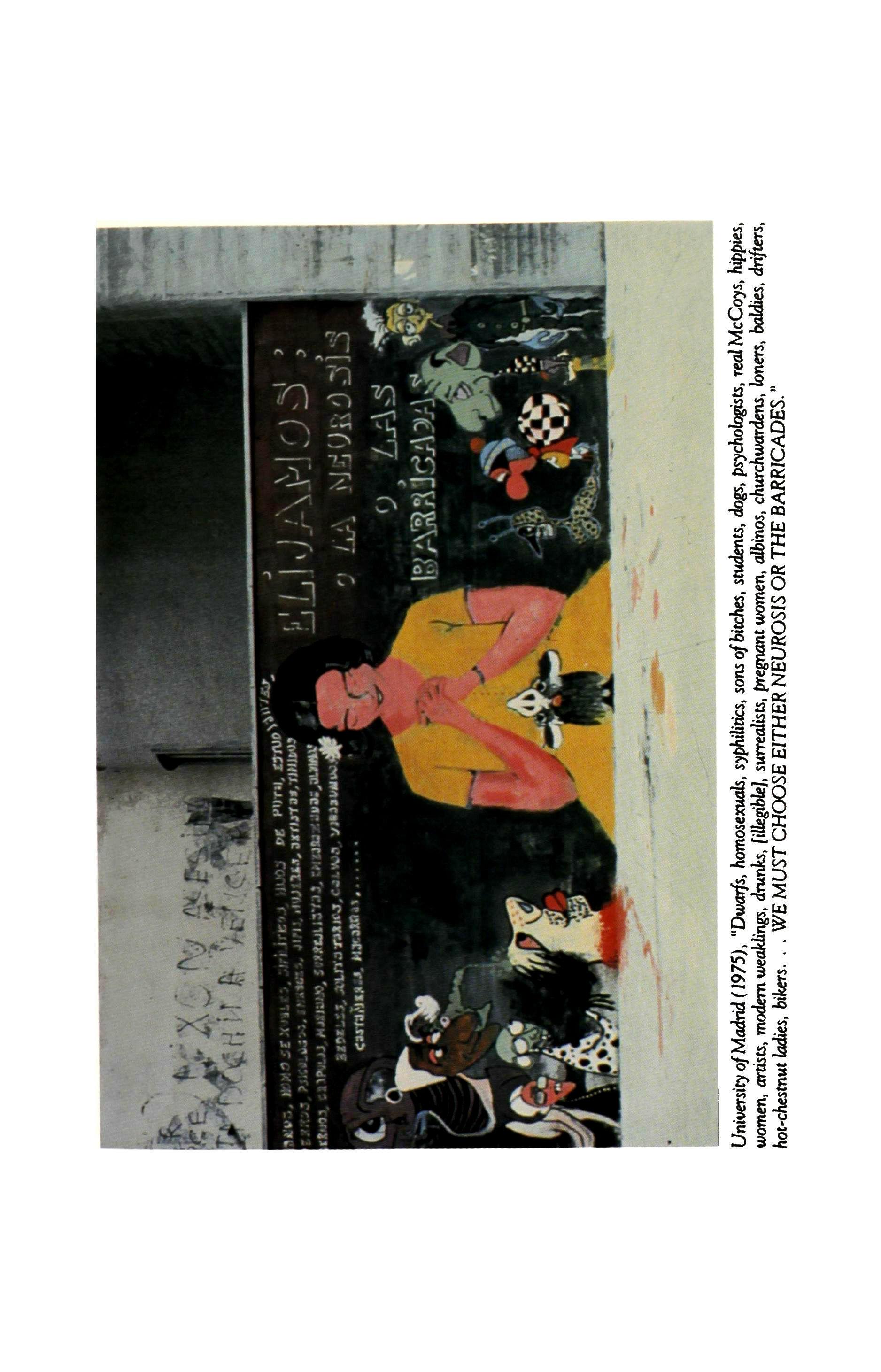
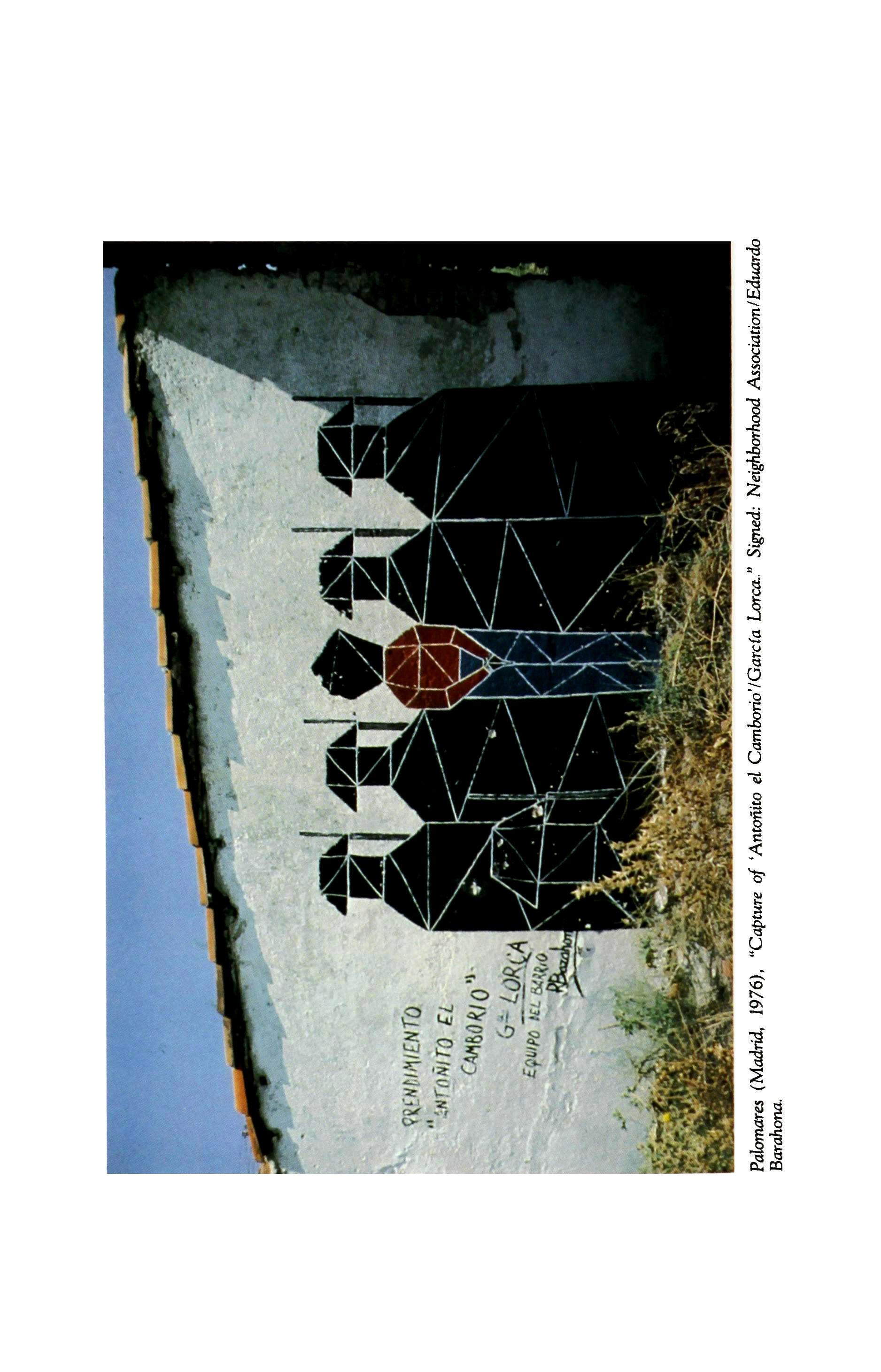
.1 �N
q�[Nbli�IENrD
Palomares (Madrid, 1976), "Capture of 'Antonito el Camborio'/Garc(a Lorca."
Signed: Neighborhood Barahona.
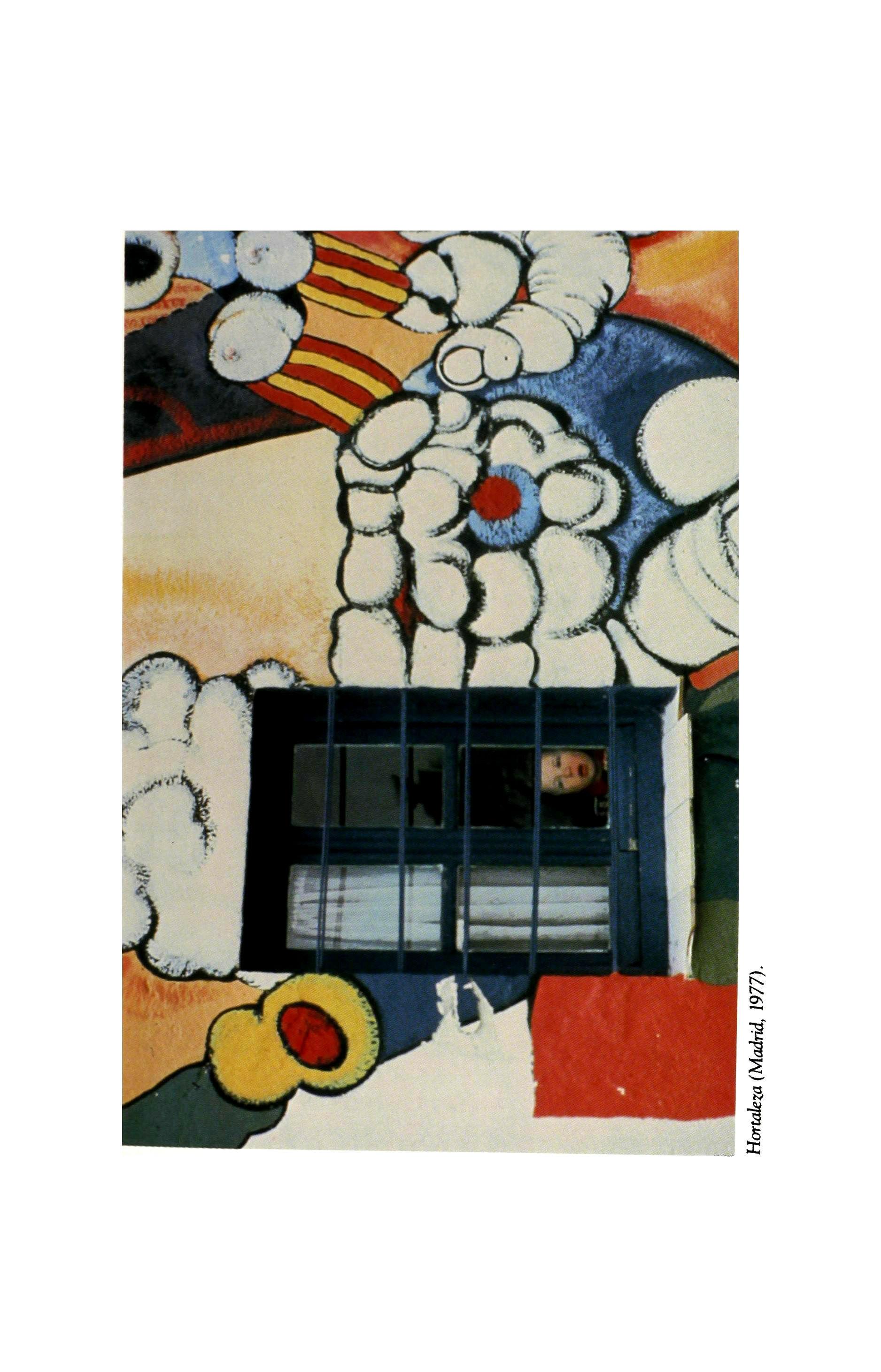
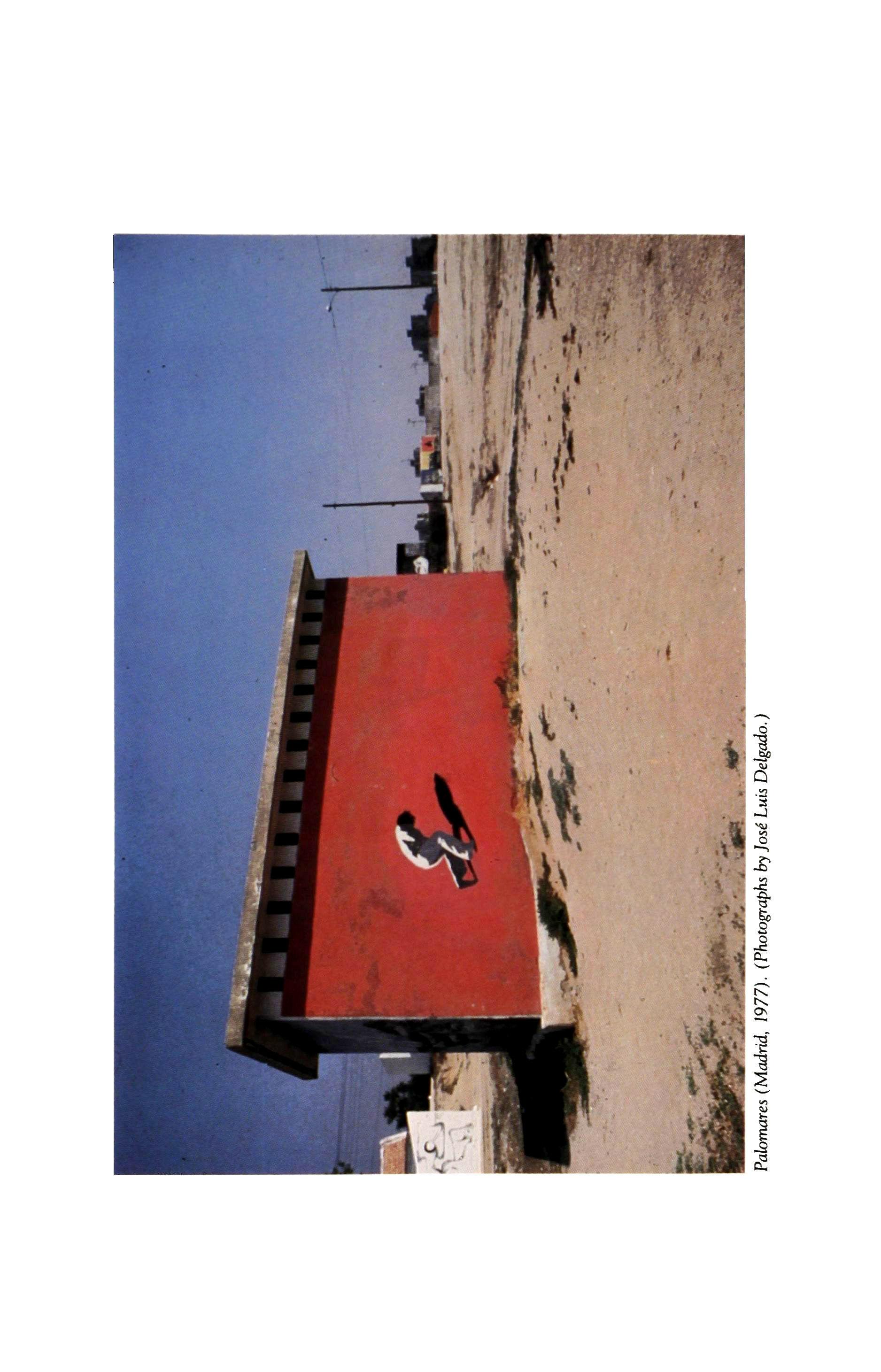
FrOlll Landscapes after the battle
Juan Goytisolo
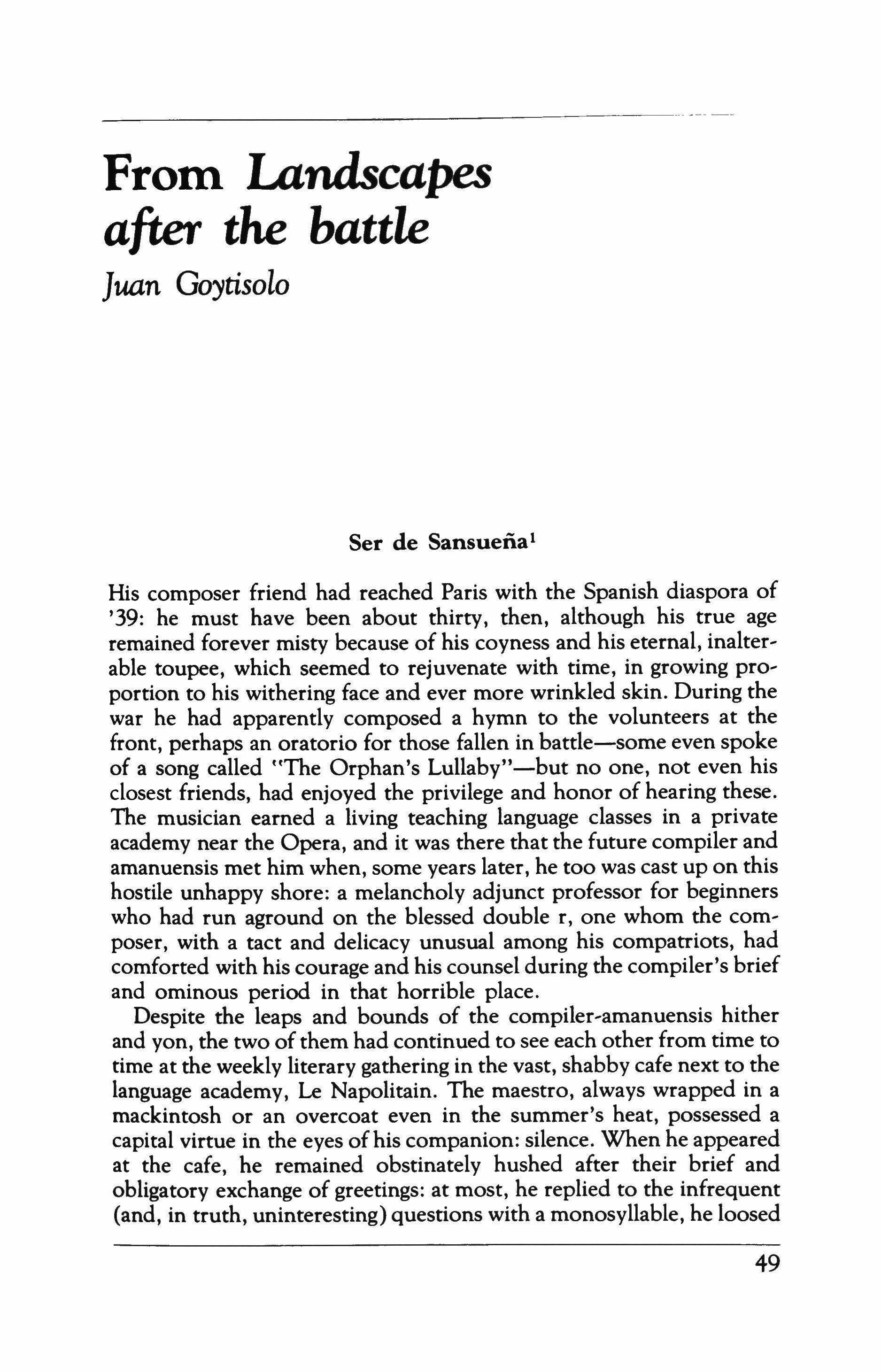 Ser de Sansueiia 1
Ser de Sansueiia 1
His composer friend had reached Paris with the Spanish diaspora of '39: he must have been about thirty, then, although his true age remained forever misty because of his coyness and his eternal, inalterable toupee, which seemed to rejuvenate with time, in growing proportion to his withering face and ever more wrinkled skin. During the war he had apparently composed a hymn to the volunteers at the front, perhaps an oratorio for those fallen in battle-some even spoke of a song called "The Orphan's Lullaby"-but no one, not even his closest friends, had enjoyed the privilege and honor of hearing these. The musician earned a living teaching language classes in a private academy near the Opera, and it was there that the future compiler and amanuensis met him when, some years later, he too was cast up on this hostile unhappy shore: a melancholy adjunct professor for beginners who had run aground on the blessed double r, one whom the cornposer, with a tact and delicacy unusual among his compatriots, had comforted with his courage and his counsel during the compiler's brief and ominous period in that horrible place.
Despite the leaps and bounds of the compiler-amanuensis hither and yon, the two ofthem had continued to see each other from time to time at the weekly literary gathering in the vast, shabby cafe next to the language academy, Le Napolitain. The maestro, always wrapped in a mackintosh or an overcoat even in the summer's heat, possessed a capital virtue in the eyes ofhis companion: silence. When he appeared at the cafe, he remained obstinately hushed after their brief and obligatory exchange of greetings: at most, he replied to the infrequent (and, in truth, uninteresting) questions with a monosyllable, he loosed
49
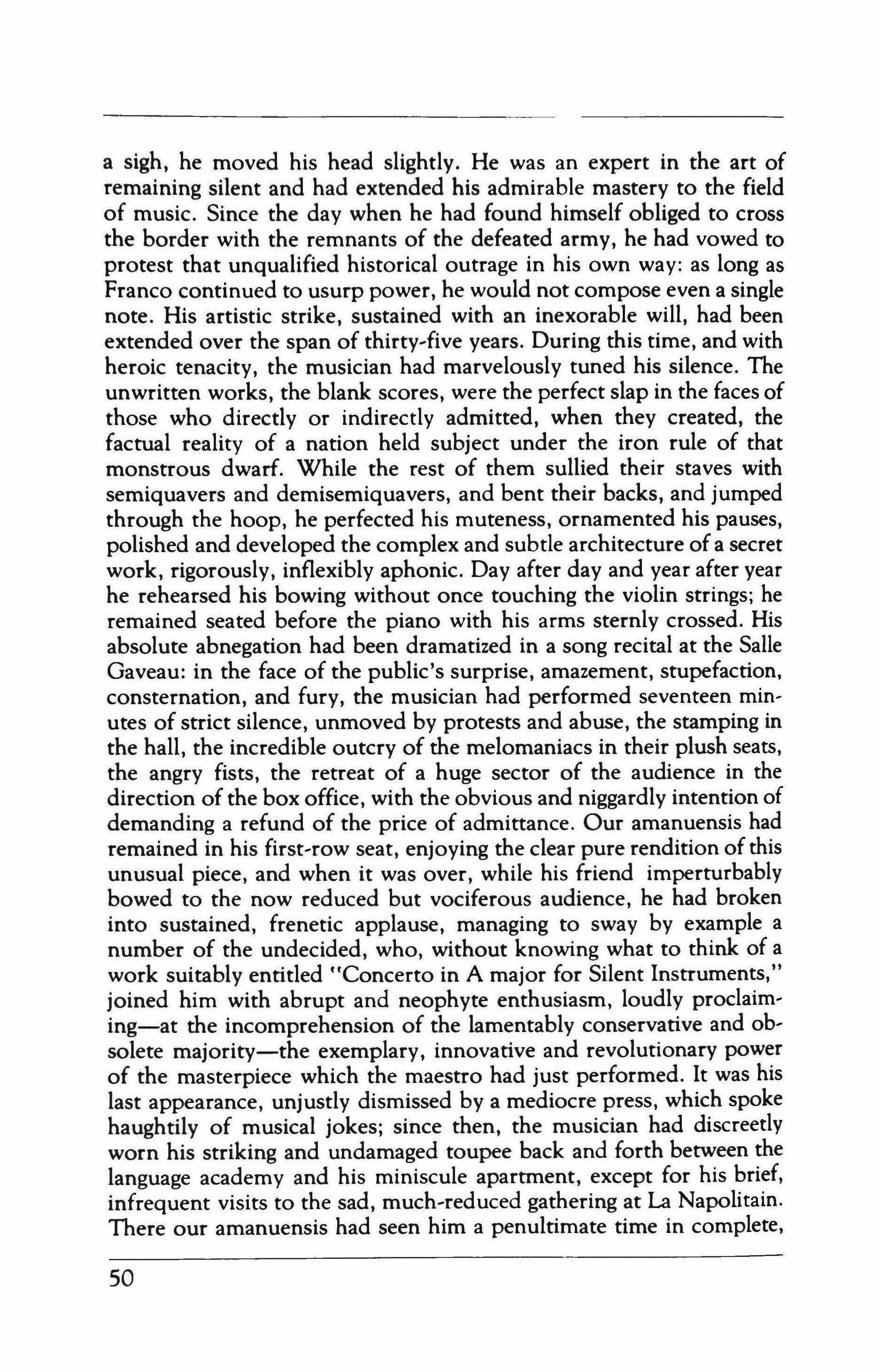
a sigh, he moved his head slightly. He was an expert in the art of remaining silent and had extended his admirable mastery to the field of music. Since the day when he had found himself obliged to cross the border with the remnants of the defeated army, he had vowed to protest that unqualified historical outrage in his own way: as long as Franco continued to usurp power, he would not compose even a single note. His artistic strike, sustained with an inexorable will, had been extended over the span of thirty-five years. During this time, and with heroic tenacity, the musician had marvelously tuned his silence. The unwritten works, the blank scores, were the perfect slap in the faces of those who directly or indirectly admitted, when they created, the factual reality of a nation held subject under the iron rule of that monstrous dwarf. While the rest of them sullied their staves with semiquavers and demisemiquavers, and bent their backs, and jumped through the hoop, he perfected his muteness, ornamented his pauses, polished and developed the complex and subtle architecture of a secret work, rigorously, inflexibly aphonic. Day after day and year after year he rehearsed his bowing without once touching the violin strings; he remained seated before the piano with his arms sternly crossed. His absolute abnegation had been dramatized in a song recital at the Salle Gaveau: in the face of the public's surprise, amazement, stupefaction, consternation, and fury, the musician had performed seventeen min, utes of strict silence, unmoved by protests and abuse, the stamping in the hall, the incredible outcry of the melomaniacs in their plush seats, the angry fists, the retreat of a huge sector of the audience in the direction of the box office, with the obvious and niggardly intention of demanding a refund of the price of admittance. Our amanuensis had remained in his first-row seat, enjoying the clear pure rendition of this unusual piece, and when it was over, while his friend imperturbably bowed to the now reduced but vociferous audience, he had broken into sustained, frenetic applause, managing to sway by example a number of the undecided, who, without knowing what to think of a work suitably entitled "Concerto in A major for Silent Instruments," joined him with abrupt and neophyte enthusiasm, loudly proclaim, ing-at the incomprehension of the lamentably conservative and obsolete majority-the exemplary, innovative and revolutionary power of the masterpiece which the maestro had just performed. It was his last appearance, unjustly dismissed by a mediocre press, which spoke haughtily of musical jokes; since then, the musician had discreetly worn his striking and undamaged toupee back and forth between the language academy and his miniscule apartment, except for his brief, infrequent visits to the sad, much-reduced gathering at La Napolitain. There our amanuensis had seen him a penultimate time in complete,
50
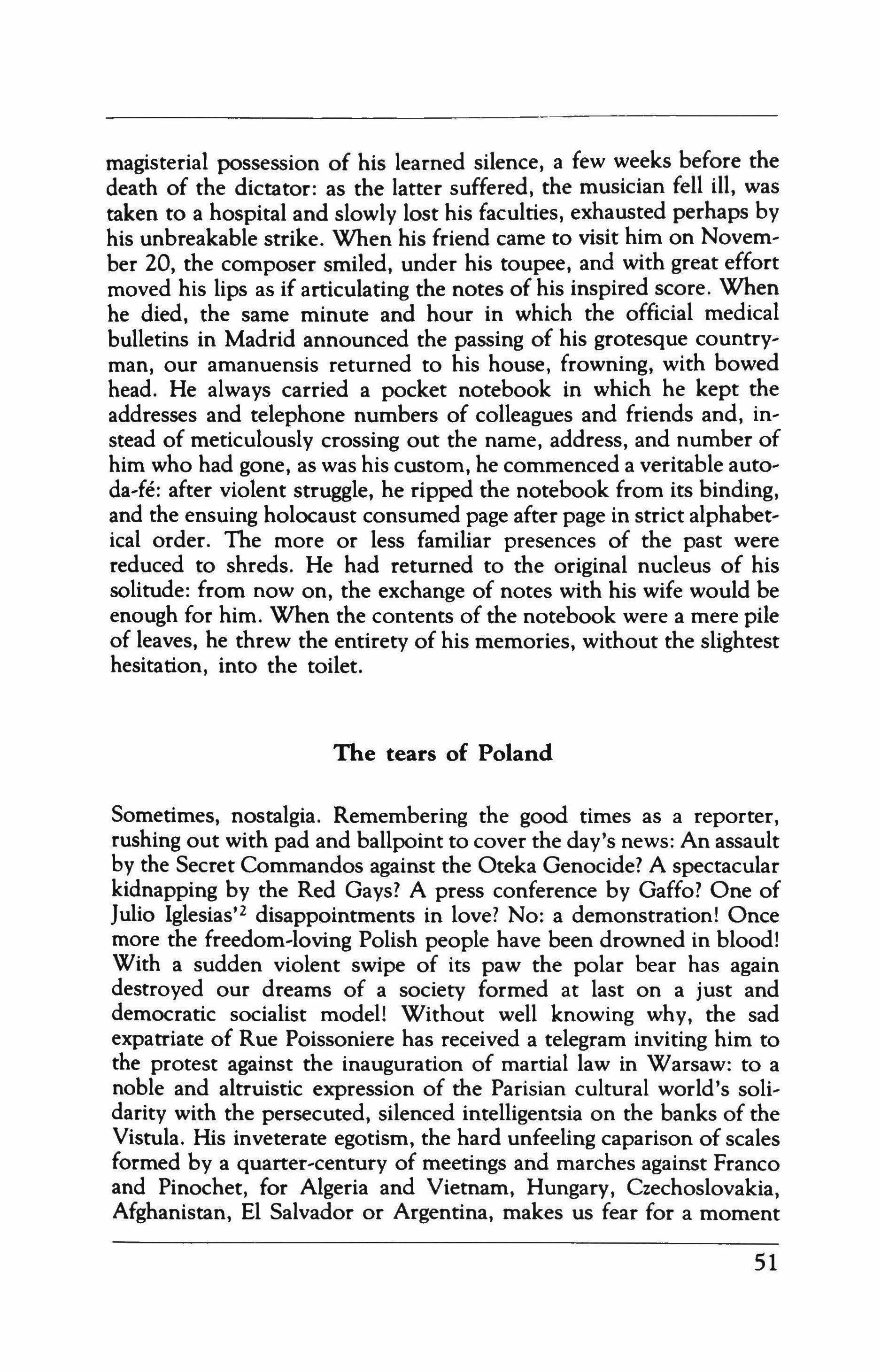
magisterial possession of his learned silence, a few weeks before the death of the dictator: as the latter suffered, the musician fell ill, was taken to a hospital and slowly lost his faculties, exhausted perhaps by his unbreakable strike. When his friend came to visit him on Novernber 20, the composer smiled, under his toupee, and with great effort moved his lips as if articulating the notes of his inspired score. When he died, the same minute and hour in which the official medical bulletins in Madrid announced the passing of his grotesque country' man, our amanuensis returned to his house, frowning, with bowed head. He always carried a pocket notebook in which he kept the addresses and telephone numbers of colleagues and friends and, in' stead of meticulously crossing out the name, address, and number of him who had gone, as was his custom, he commenced a veritable auto, da-fe: after violent struggle, he ripped the notebook from its binding, and the ensuing holocaust consumed page after page in strict alphabet' ical order. The more or less familiar presences of the past were reduced to shreds. He had returned to the original nucleus of his solitude: from now on, the exchange of notes with his wife would be enough for him. When the contents of the notebook were a mere pile of leaves, he threw the entirety of his memories, without the slightest hesitation, into the toilet.
The tears of Poland
Sometimes, nostalgia. Remembering the good times as a reporter, rushing out with pad and ballpoint to cover the day's news: An assault by the Secret Commandos against the Oteka Genocide? A spectacular kidnapping by the Red Gays? A press conference by Gaffo? One of Julio Iglesias" disappointments in love? No: a demonstration! Once more the freedom-loving Polish people have been drowned in blood! With a sudden violent swipe of its paw the polar bear has again destroyed our dreams of a society formed at last on a just and democratic socialist model! Without well knowing why, the sad expatriate of Rue Poissoniere has received a telegram inviting him to the protest against the inauguration of martial law in Warsaw: to a noble and altruistic expression of the Parisian cultural world's soli, darity with the persecuted, silenced intelligentsia on the banks of the Vistula. His inveterate egotism, the hard unfeeling caparison of scales formed by a quarter-century of meetings and marches against Franco and Pinochet, for Algeria and Vietnam, Hungary, Czechoslovakia, Afghanistan, EI Salvador or Argentina, makes us fear for a moment
51
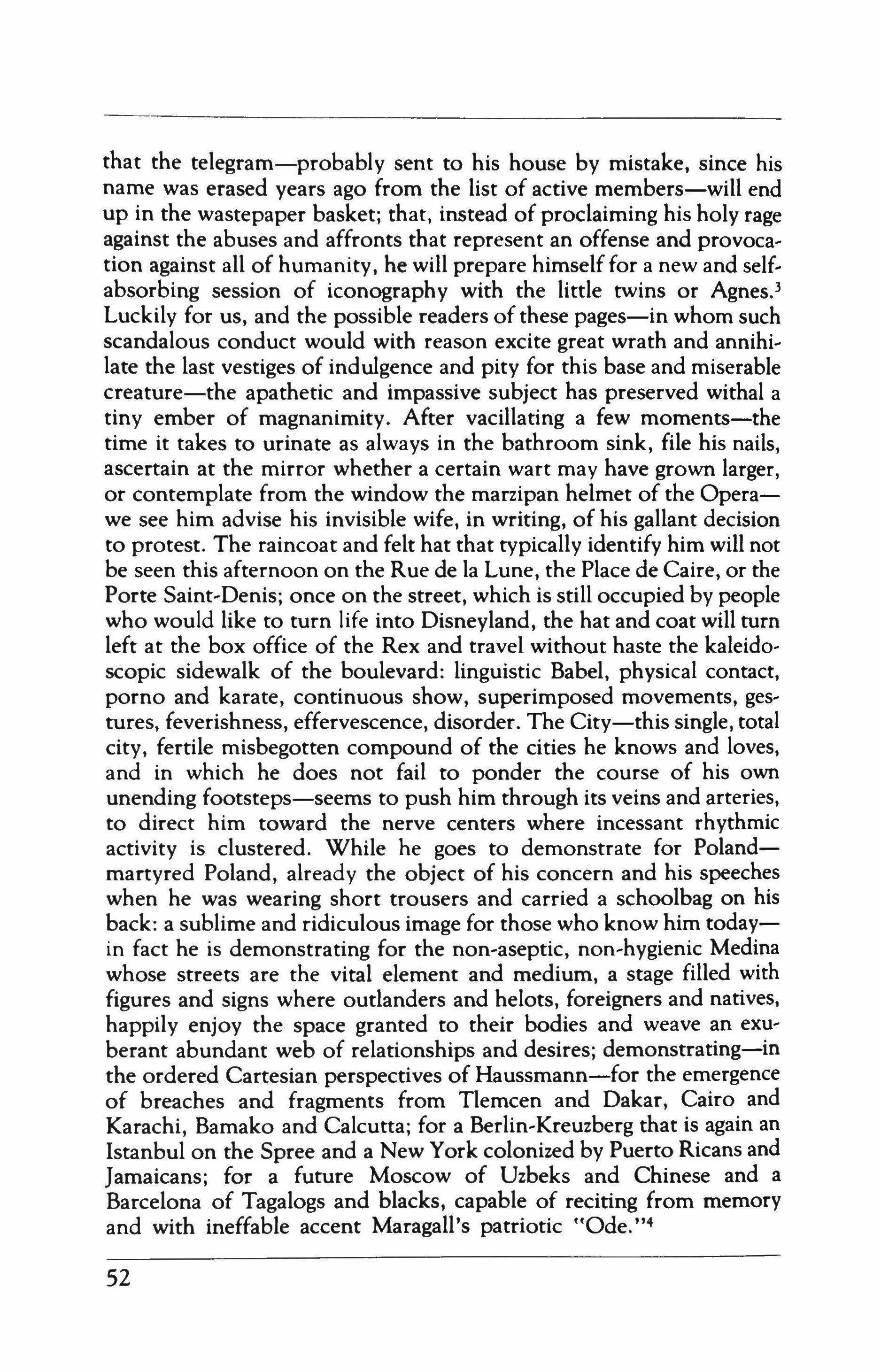
that the telegram-probably sent to his house by mistake, since his name was erased years ago from the list of active members-will end up in the wastepaper basket; that, instead of proclaiming his holy rage against the abuses and affronts that represent an offense and provocation against all of humanity, he will prepare himself for a new and selfabsorbing session of iconography with the little twins or Agnes.' Luckily for us, and the possible readers of these pages-in whom such scandalous conduct would with reason excite great wrath and annihilate the last vestiges of indulgence and pity for this base and miserable creature-the apathetic and impassive subject has preserved withal a tiny ember of magnanimity. After vacillating a few moments-the time it takes to urinate as always in the bathroom sink, file his nails, ascertain at the mirror whether a certain wart may have grown larger, or contemplate from the window the marzipan helmet of the Operawe see him advise his invisible wife, in writing, of his gallant decision to protest. The raincoat and felt hat that typically identify him will not be seen this afternoon on the Rue de la Lune, the Place de Caire, or the Porte Saint-Denis; once on the street, which is still occupied by people who would like to turn life into Disneyland, the hat and coat will turn left at the box office of the Rex and travel without haste the kaleidoscopic sidewalk of the boulevard: linguistic Babel, physical contact, porno and karate, continuous show, superimposed movements, gestures, feverishness, effervescence, disorder. The City-this single, total city, fertile misbegotten compound of the cities he knows and loves, and in which he does not fail to ponder the course of his own unending footsteps-seems to push him through its veins and arteries, to direct him toward the nerve centers where incessant rhythmic activity is clustered. While he goes to demonstrate for Polandmartyred Poland, already the object of his concern and his speeches when he was wearing short trousers and carried a schoolbag on his back: a sublime and ridiculous image for those who know him todayin fact he is demonstrating for the non-aseptic, non-hygienic Medina whose streets are the vital element and medium, a stage filled with figures and signs where outlanders and helots, foreigners and natives, happily enjoy the space granted to their bodies and weave an exuberant abundant web of relationships and desires; demonstrating-in the ordered Cartesian perspectives of Haussmann-for the emergence of breaches and fragments from Tlemcen and Dakar, Cairo and Karachi, Bamako and Calcutta; for a Berlin-Kreuzberg that is again an Istanbul on the Spree and a New York colonized by Puerto Ricans and Jamaicans; for a future Moscow of Uzbeks and Chinese and a Barcelona of Tagalogs and blacks, capable of reciting from memory and with ineffable accent Maragall's patriotic "Ode. "4
52

An afternoon at the Opera
The demonstrators who-employing the most diverse means of loco, motion, from the overwhelming Rolls-Royce to the democratic sub, way ticket-converge on the majestic steps of the Opera, proudly exhibit the telegram from the Minister of Culture that confers on them the privilege of passing the barrier of an iron security guard charged with intercepting all petitioners who-either as individuals or in striking groups, like that handful of poor ravenous Afghanis wanting to take advantage of this occasion to remind these thrilled, touched spectators of the absurd, offensive, and already forgotten tragedy of their remote nation-with incredible innocence (which some would label cheek) have shown up at the National Academy of Music with no invitation, not knowing or pretending not to know that the right to protest in such a noble and distinguished precinct belongs exclusively to those who like you have been expressly con, voked, by reason of personal merit or ideological pedigree, who possess the necessary cultural credentials, the obligatory prerequisite of a literary and artistic sensibility, and who are the only ones, therefore, who may attend in the orchestra, in boxes, in the dress circle, mezzanine and balcony of this illustrious edifice, the ritual celebration of musical exequies for the land of St. Stanislaw and Kosciuszko, Wojtyla and Mickievicz, Chopin and Maria Walewskadead and sacrificed like Christ, perennially torn and eaten by beasts: the romantic agony already celebrated in Parisian salons of the eighteenth and nineteenth centuries to the accompaniment of waltzes and etudes, nocturnes and sonatas, ballads and preludes, barcaroles and scherzos. In the vestibule, on the staircase, in the foyer and hallways, the creme de la creme of the elect, with the compliments of the appropriate minister, greet each other with remorseful expressions and gestures, with the seriousness and decorum that the circum, stances require-they exchange signs of admiration and recognition, they make soft comment: "I saw your latest film, I devoured your latest book, I read your latest column or interview. Extraordinary, simply extraordinary!" Mutually praised, they bow with satisfaction and when one of them wanders off, you will hear the one left behind murmur, !fA failure, poor bastard, a shadow of what he was, he's lost his gift ," while, ignored by all these, you make your way as best you can around the dazzling elite who have come, just like you, to see or hear: the inflamed oration of a writer; the poem recited by a famous stage actress; the presence incarnate of one of those representatives of the heroic, beleaguered people, who, after being feted for days by the divine, humane left, will fall quickly into the pit of
53
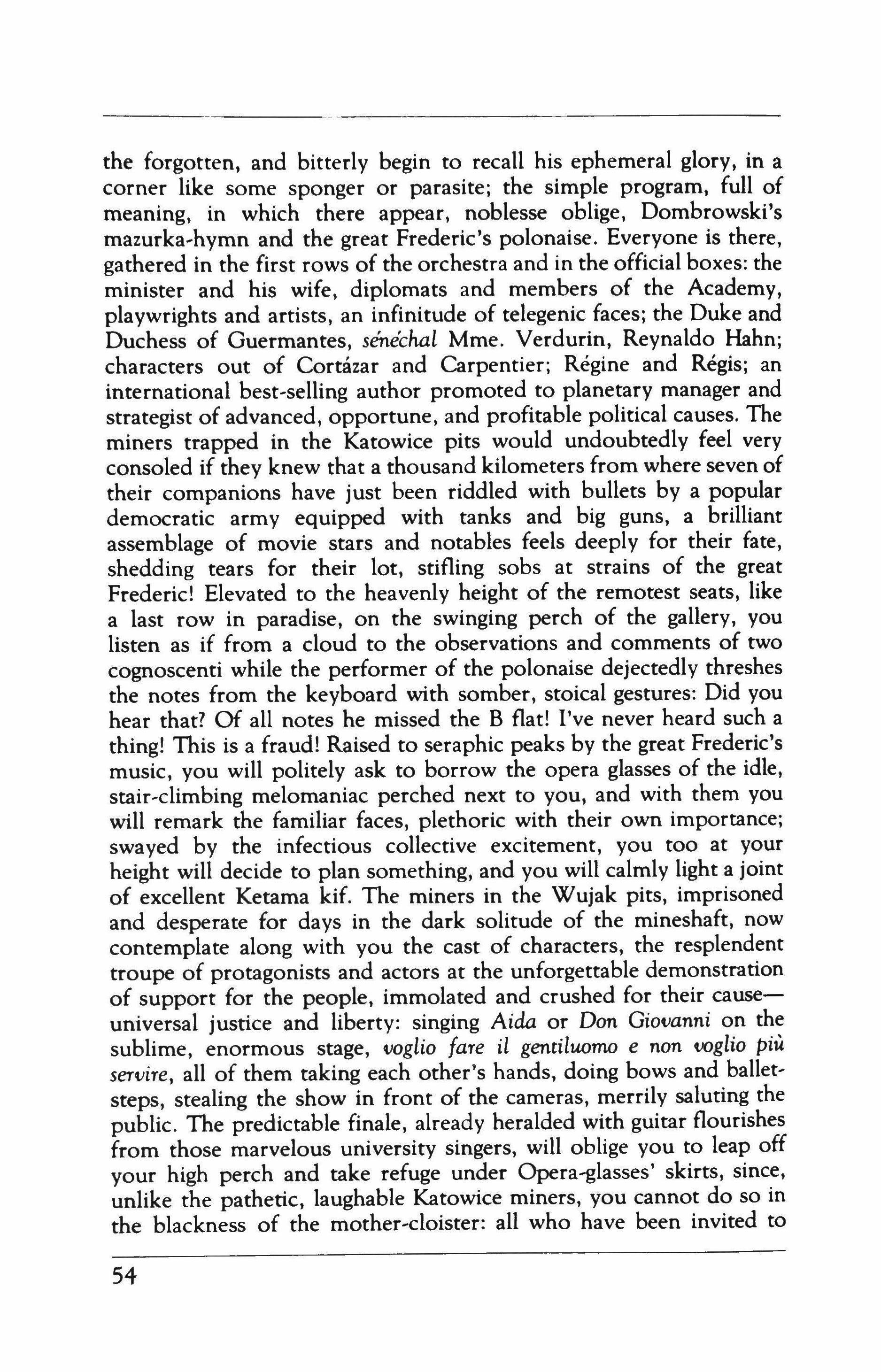
the forgotten, and bitterly begin to recall his ephemeral glory, in a corner like some sponger or parasite; the simple program, full of meaning, in which there appear, noblesse oblige, Dombrowski's mazurka-hymn and the great Frederic's polonaise. Everyone is there, gathered in the first rows of the orchestra and in the official boxes: the minister and his wife, diplomats and members of the Academy, playwrights and artists, an infinitude of telegenic faces; the Duke and Duchess of Guermantes, senechal Mme. Verdurin, Reynaldo Hahn; characters out of Cortazar and Carpentier; Regine and Regis; an international best-selling author promoted to planetary manager and strategist of advanced, opportune, and profitable political causes. The miners trapped in the Katowice pits would undoubtedly feel very consoled if they knew that a thousand kilometers from where seven of their companions have just been riddled with bullets by a popular democratic army equipped with tanks and big guns, a brilliant assemblage of movie stars and notables feels deeply for their fate, shedding tears for their lot, stifling sobs at strains of the great Frederic! Elevated to the heavenly height of the remotest seats, like a last row in paradise, on the swinging perch of the gallery, you listen as if from a cloud to the observations and comments of two cognoscenti while the performer of the polonaise dejectedly threshes the notes from the keyboard with somber, stoical gestures: Did you hear that? Of all notes he missed the B flat! I've never heard such a thing! This is a fraud! Raised to seraphic peaks by the great Frederic's music, you will politely ask to borrow the opera glasses of the idle, stair-climbing melomaniac perched next to you, and with them you will remark the familiar faces, plethoric with their own importance; swayed by the infectious collective excitement, you too at your height will decide to plan something, and you will calmly light a joint of excellent Ketama kif. The miners in the Wujak pits, imprisoned and desperate for days in the dark solitude of the mineshaft, now contemplate along with you the cast of characters, the resplendent troupe of protagonists and actors at the unforgettable demonstration of support for the people, immolated and crushed for their causeuniversal justice and liberty: singing Aida or Don Giovanni on the sublime, enormous stage, voglio fare it gentiluomo e non voglio piu servire, all of them taking each other's hands, doing bows and balletsteps, stealing the show in front of the cameras, merrily saluting the public. The predictable finale, already heralded with guitar flourishes from those marvelous university singers, will oblige you to leap off your high perch and take refuge under Opera-glasses' skirts, since, unlike the pathetic, laughable Katowice miners, you cannot do so in the blackness of the mother-cloister: all who have been invited to
54
cry at the Opera for the fate of pitiful Poland will sing for you, and for everyone, their world-renowned version of the famous, immortal "Clavelitos"!"
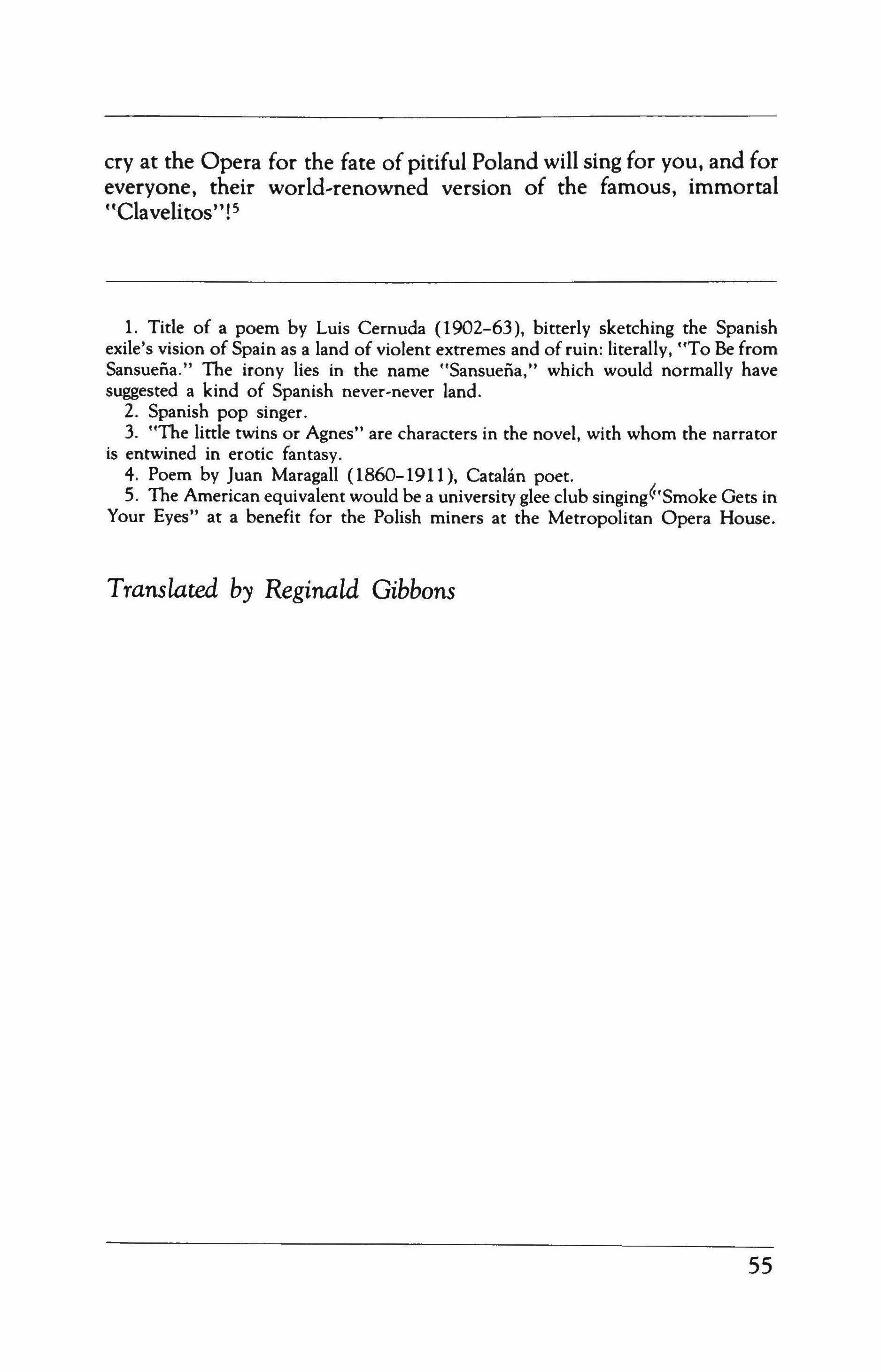
1. Title of a poem by Luis Cernuda (1902-63), bitterly sketching the Spanish exile's vision of Spain as a land of violent extremes and of ruin: literally, "To Be from Sansuefia." The irony lies in the name "Sansuefia," which would normally have suggested a kind of Spanish never-never land.
2. Spanish pop singer.
3. "The little twins or Agnes" are characters in the novel, with whom the narrator is entwined in erotic fantasy.
4. Poem by Juan Maragall (1860-1911), Catalan poet.
S. The American equivalent would be a university glee club singing�'Smoke Gets in Your Eyes" at a benefit for the Polish miners at the Metropolitan Opera House.
Translated
by
Reginald Gibbons
55
From The same sea as every summer
Esther Tusquets
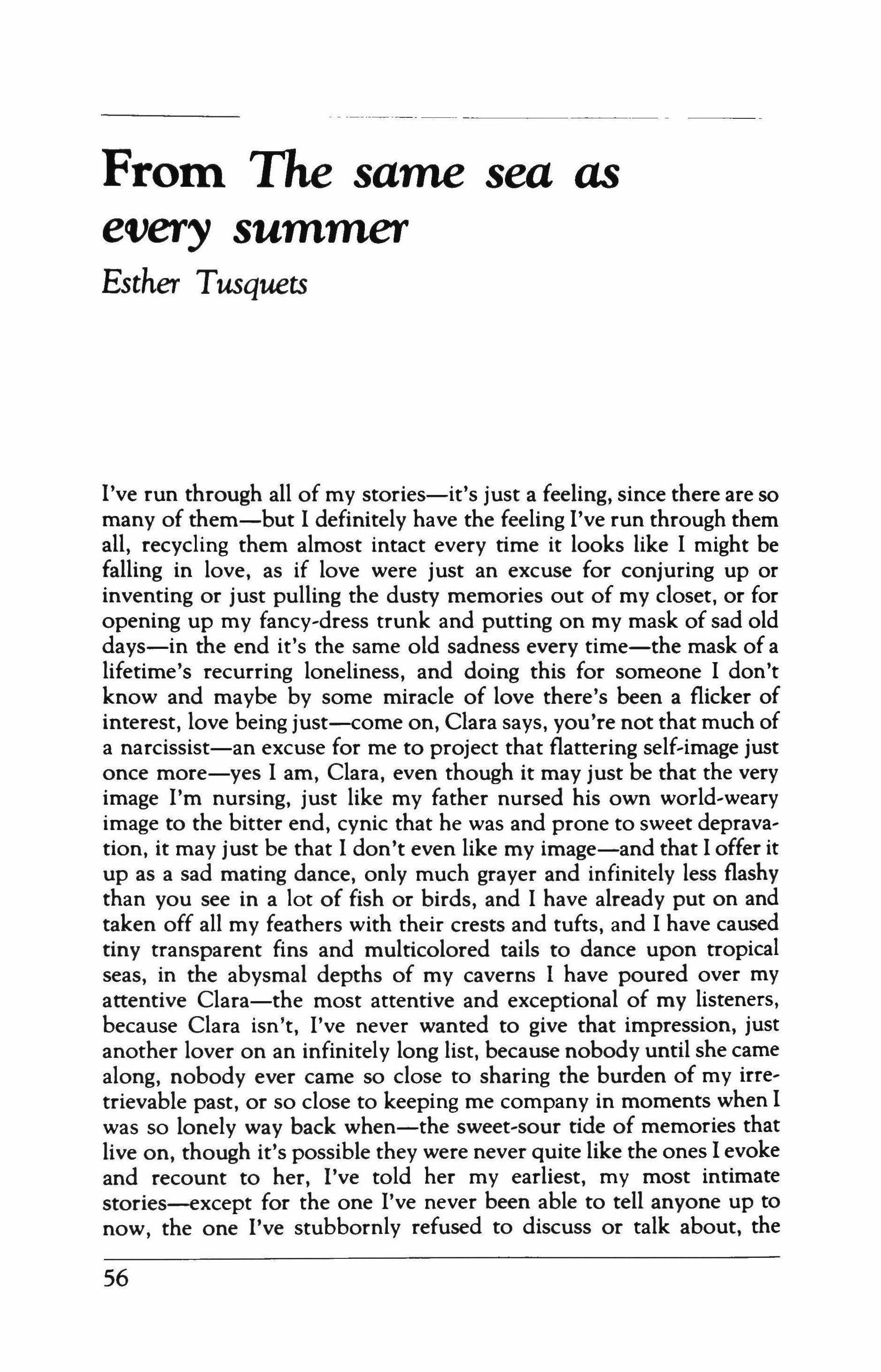
I've run through all of my stories-it's just a feeling, since there are so many of them-but I definitely have the feeling I've run through them all, recycling them almost intact every time it looks like I might be falling in love, as if love were just an excuse for conjuring up or inventing or just pulling the dusty memories out of my closet, or for opening up my fancy-dress trunk and putting on my mask of sad old days-in the end it's the same old sadness every time-the mask of a lifetime's recurring loneliness, and doing this for someone I don't know and maybe by some miracle of love there's been a flicker of interest, love being just-come on, Clara says, you're not that much of a narcissist-an excuse for me to project that flattering self-image just once more-yes I am, Clara, even though it may just be that the very image I'm nursing, just like my father nursed his own world,weary image to the bitter end, cynic that he was and prone to sweet depravation, it may just be that I don't even like my image-and that I offer it up as a sad mating dance, only much grayer and infinitely less flashy than you see in a lot of fish or birds, and I have already put on and taken off all my feathers with their crests and tufts, and I have caused tiny transparent fins and multicolored tails to dance upon tropical seas, in the abysmal depths of my caverns I have poured over my attentive Clara-the most attentive and exceptional of my listeners, because Clara isn't, I've never wanted to give that impression, just another lover on an infinitely long list, because nobody until she came along, nobody ever came so close to sharing the burden of my irretrievable past, or so close to keeping me company in moments when I was so lonely way back when-the sweet-sour tide of memories that live on, though it's possible they were never quite like the ones I evoke and recount to her, I've told her my earliest, my most intimate stories-except for the one I've never been able to tell anyone up to now, the one I've stubbornly refused to discuss or talk about, the
56
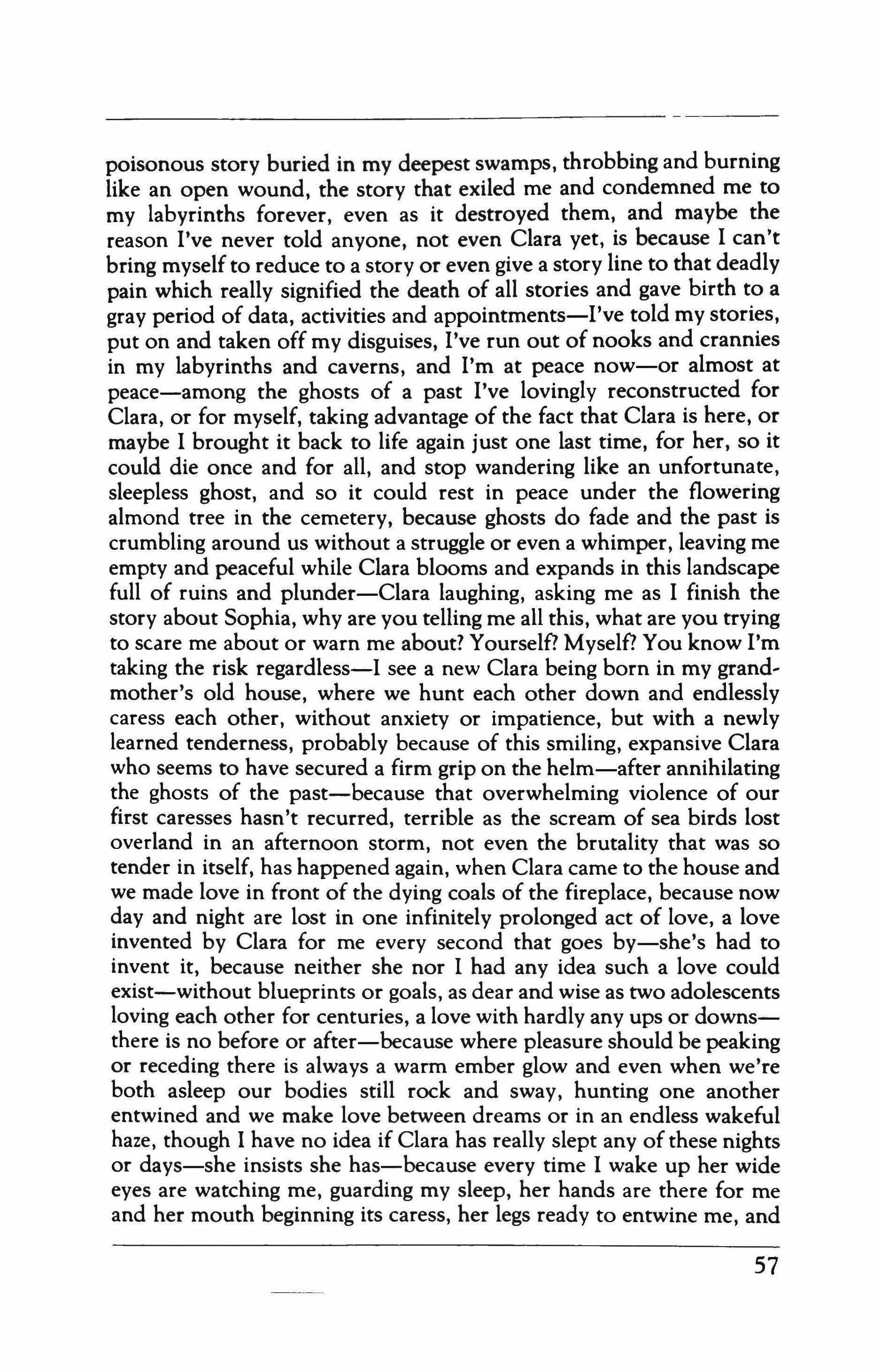
poisonous story buried in my deepest swamps, throbbing and burning like an open wound, the story that exiled me and condemned me to my labyrinths forever, even as it destroyed them, and maybe the reason I've never told anyone, not even Clara yet, is because I can't bring myself to reduce to a story or even give a story line to that deadly pain which really signified the death of all stories and gave birth to a gray period of data, activities and appointments-I've told my stories, put on and taken off my disguises, I've run out of nooks and crannies in my labyrinths and caverns, and I'm at peace now-or almost at peace-among the ghosts of a past I've lovingly reconstructed for Clara, or for myself, taking advantage of the fact that Clara is here, or maybe I brought it back to life again just one last time, for her, so it could die once and for all, and stop wandering like an unfortunate, sleepless ghost, and so it could rest in peace under the flowering almond tree in the cemetery, because ghosts do fade and the past is crumbling around us without a struggle or even a whimper, leaving me empty and peaceful while Clara blooms and expands in this landscape full of ruins and plunder-Clara laughing, asking me as I finish the story about Sophia, why are you telling me all this, what are you trying to scare me about or warn me about? Yourself? Myself? You know I'm taking the risk regardless-I see a new Clara being born in my grandmother's old house, where we hunt each other down and endlessly caress each other, without anxiety or impatience, but with a newly learned tenderness, probably because of this smiling, expansive Clara who seems to have secured a firm grip on the helm-after annihilating the ghosts of the past-because that overwhelming violence of our first caresses hasn't recurred, terrible as the scream of sea birds lost overland in an afternoon storm, not even the brutality that was so tender in itself, has happened again, when Clara came to the house and we made love in front of the dying coals of the fireplace, because now day and night are lost in one infinitely prolonged act of love, a love invented by Clara for me every second that goes by-she's had to invent it, because neither she nor I had any idea such a love could exist-without blueprints or goals, as dear and wise as two adolescents loving each other for centuries, a love with hardly any ups or downsthere is no before or after-because where pleasure should be peaking or receding there is always a warm ember glow and even when we're both asleep our bodies still rock and sway, hunting one another entwined and we make love between dreams or in an endless wakeful haze, though I have no idea if Clara has really slept any of these nights or days-she insists she has-because every time I wake up her wide eyes are watching me, guarding my sleep, her hands are there for me and her mouth beginning its caress, her legs ready to entwine me, and
57
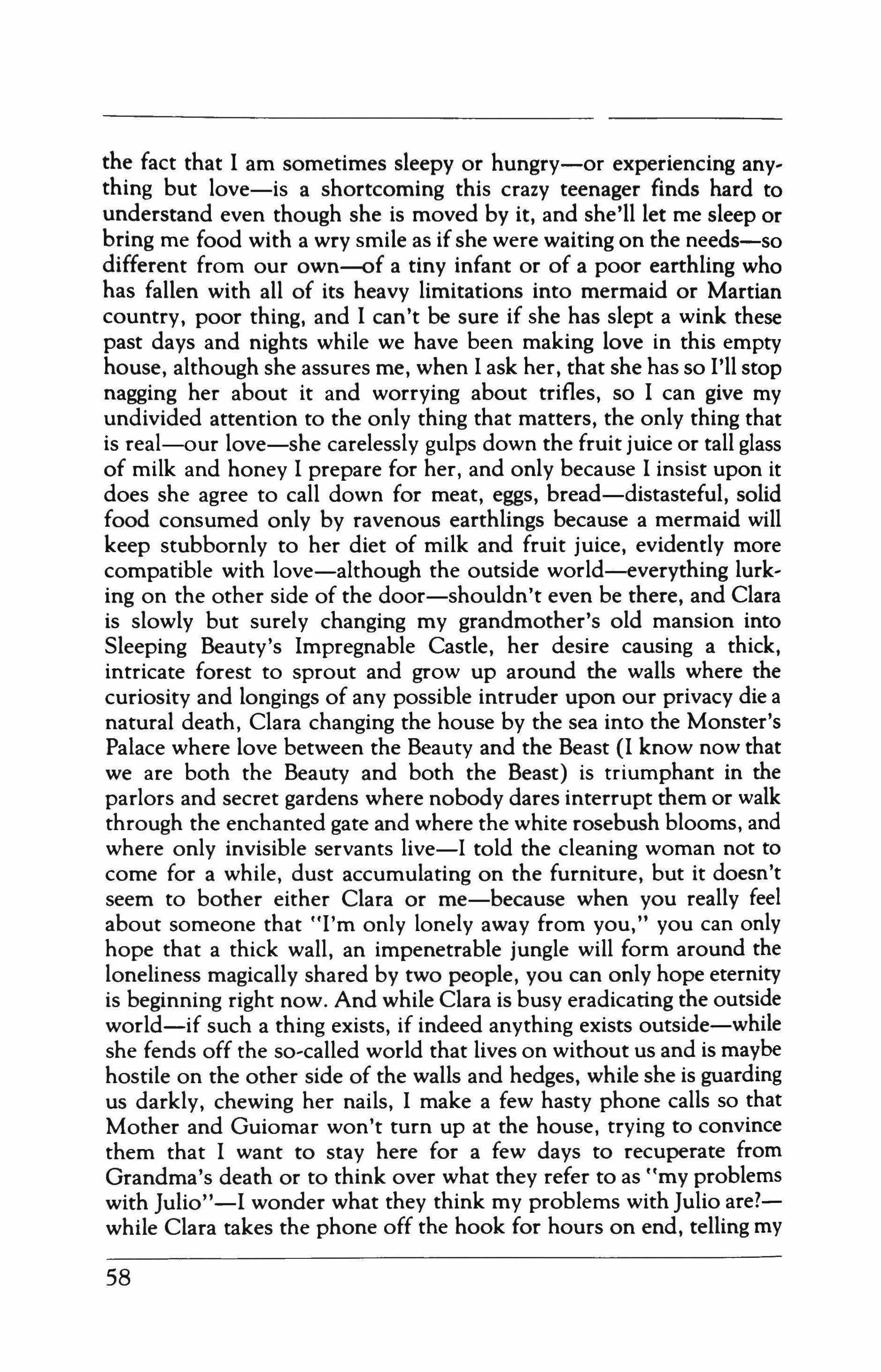
the fact that I am sometimes sleepy or hungry-or experiencing any, thing but love-is a shortcoming this crazy teenager finds hard to understand even though she is moved by it, and she'll let me sleep or bring me food with a wry smile as if she were waiting on the needs-so different from our own-of a tiny infant or of a poor earthling who has fallen with all of its heavy limitations into mermaid or Martian country, poor thing, and I can't be sure if she has slept a wink these past days and nights while we have been making love in this empty house, although she assures me, when I ask her, that she has so I'll stop nagging her about it and worrying about trifles, so I can give my undivided attention to the only thing that matters, the only thing that is real-our love-she carelessly gulps down the fruit juice or tall glass of milk and honey I prepare for her, and only because I insist upon it does she agree to call down for meat, eggs, bread-distasteful, solid food consumed only by ravenous earthlings because a mermaid will keep stubbornly to her diet of milk and fruit juice, evidently more compatible with love-although the outside world-everything lurk, ing on the other side of the door-shouldn't even be there, and Clara is slowly but surely changing my grandmother's old mansion into Sleeping Beauty's Impregnable Castle, her desire causing a thick, intricate forest to sprout and grow up around the walls where the curiosity and longings of any possible intruder upon our privacy die a natural death, Clara changing the house by the sea into the Monster's Palace where love between the Beauty and the Beast (I know now that we are both the Beauty and both the Beast) is triumphant in the parlors and secret gardens where nobody dares interrupt them or walk through the enchanted gate and where the white rosebush blooms, and where only invisible servants live-I told the cleaning woman not to come for a while, dust accumulating on the furniture, but it doesn't seem to bother either Clara or me-because when you really feel about someone that "I'm only lonely away from you," you can only hope that a thick wall, an impenetrable jungle will form around the loneliness magically shared by two people, you can only hope eternity is beginning right now. And while Clara is busy eradicating the outside world-if such a thing exists, if indeed anything exists outside-while she fends off the so-called world that lives on without us and is maybe hostile on the other side of the walls and hedges, while she is guarding us darkly, chewing her nails, I make a few hasty phone calls so that Mother and Guiomar won't turn up at the house, trying to convince them that I want to stay here for a few days to recuperate from Grandma's death or to think over what they refer to as "my problems with Julio"-I wonder what they think my problems with Julio are?while Clara takes the phone off the hook for hours on end, telling my
58
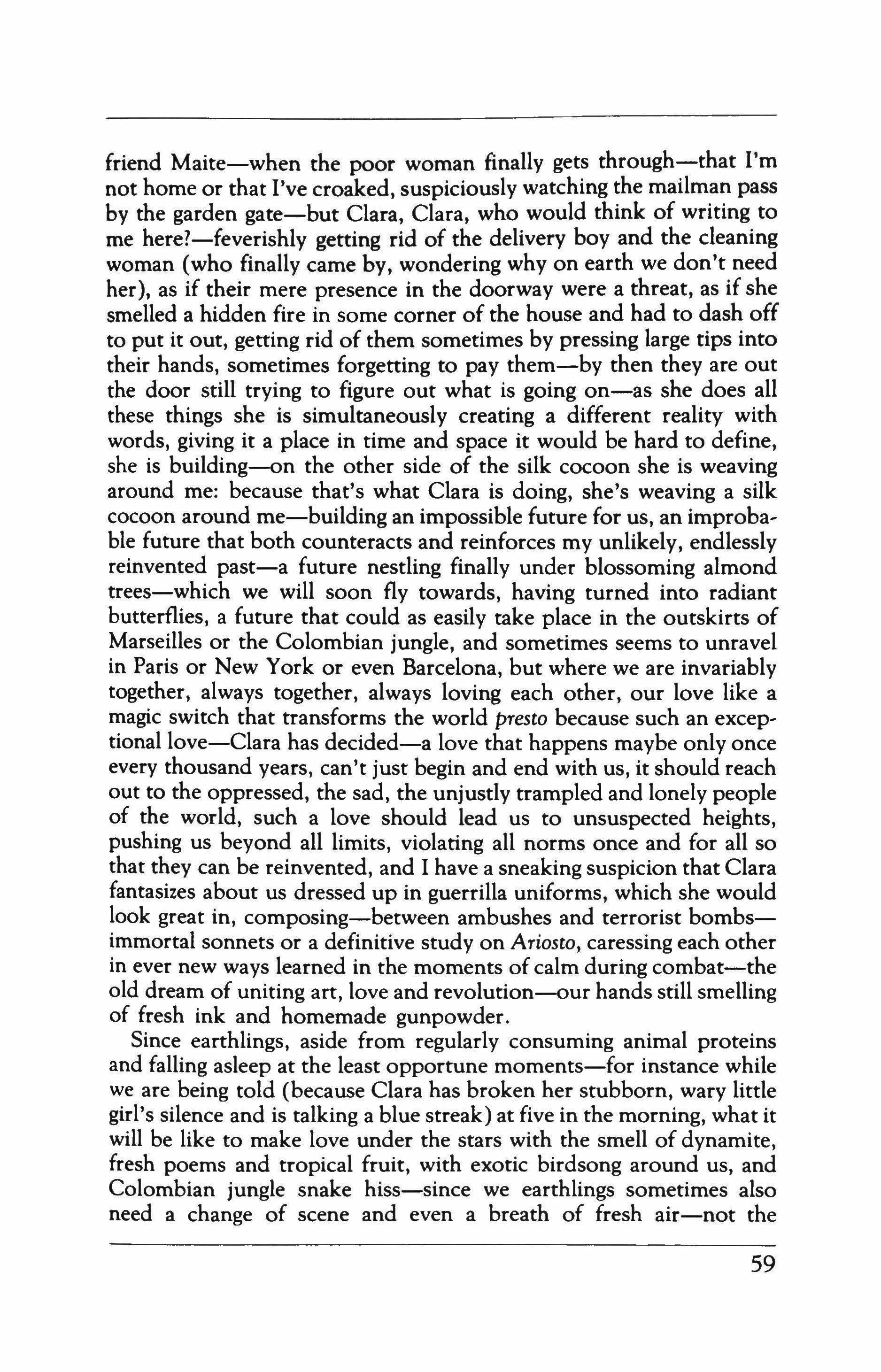
friend Maite-when the poor woman finally gets through-that I'm not home or that I've croaked, suspiciously watching the mailman pass by the garden gate-but Clara, Clara, who would think of writing to me here?-feverishly getting rid of the delivery boy and the cleaning woman (who finally came by, wondering why on earth we don't need her), as if their mere presence in the doorway were a threat, as if she smelled a hidden fire in some corner of the house and had to dash off to put it out, getting rid of them sometimes by pressing large tips into their hands, sometimes forgetting to pay them-by then they are out the door still trying to figure out what is going on-as she does all these things she is simultaneously creating a different reality with words, giving it a place in time and space it would be hard to define, she is building-on the other side of the silk cocoon she is weaving around me: because that's what Clara is doing, she's weaving a silk cocoon around me-building an impossible future for us, an improbable future that both counteracts and reinforces my unlikely, endlessly reinvented past-a future nestling finally under blossoming almond trees-which we will soon fly towards, having turned into radiant butterflies, a future that could as easily take place in the outskirts of Marseilles or the Colombian jungle, and sometimes seems to unravel in Paris or New York or even Barcelona, but where we are invariably together, always together, always loving each other, our love like a magic switch that transforms the world presto because such an exceptionallove-Clara has decided-a love that happens maybe only once every thousand years, can't just begin and end with us, it should reach out to the oppressed, the sad, the unjustly trampled and lonely people of the world, such a love should lead us to unsuspected heights, pushing us beyond all limits, violating all norms once and for all so that they can be reinvented, and I have a sneaking suspicion that Clara fantasizes about us dressed up in guerrilla uniforms, which she would look great in, composing-between ambushes and terrorist bombsimmortal sonnets or a definitive study on Ariosto, caressing each other in ever new ways learned in the moments of calm during combat-the old dream of uniting art, love and revolution-our hands still smelling of fresh ink and homemade gunpowder.
Since earthlings, aside from regularly consuming animal proteins and falling asleep at the least opportune moments-for instance while we are being told (because Clara has broken her stubborn, wary little girl's silence and is talking a blue streak) at five in the morning, what it will be like to make love under the stars with the smell of dynamite, fresh poems and tropical fruit, with exotic birdsong around us, and Colombian jungle snake hiss-since we earthlings sometimes also need a change of scene and even a breath of fresh air-not the
59
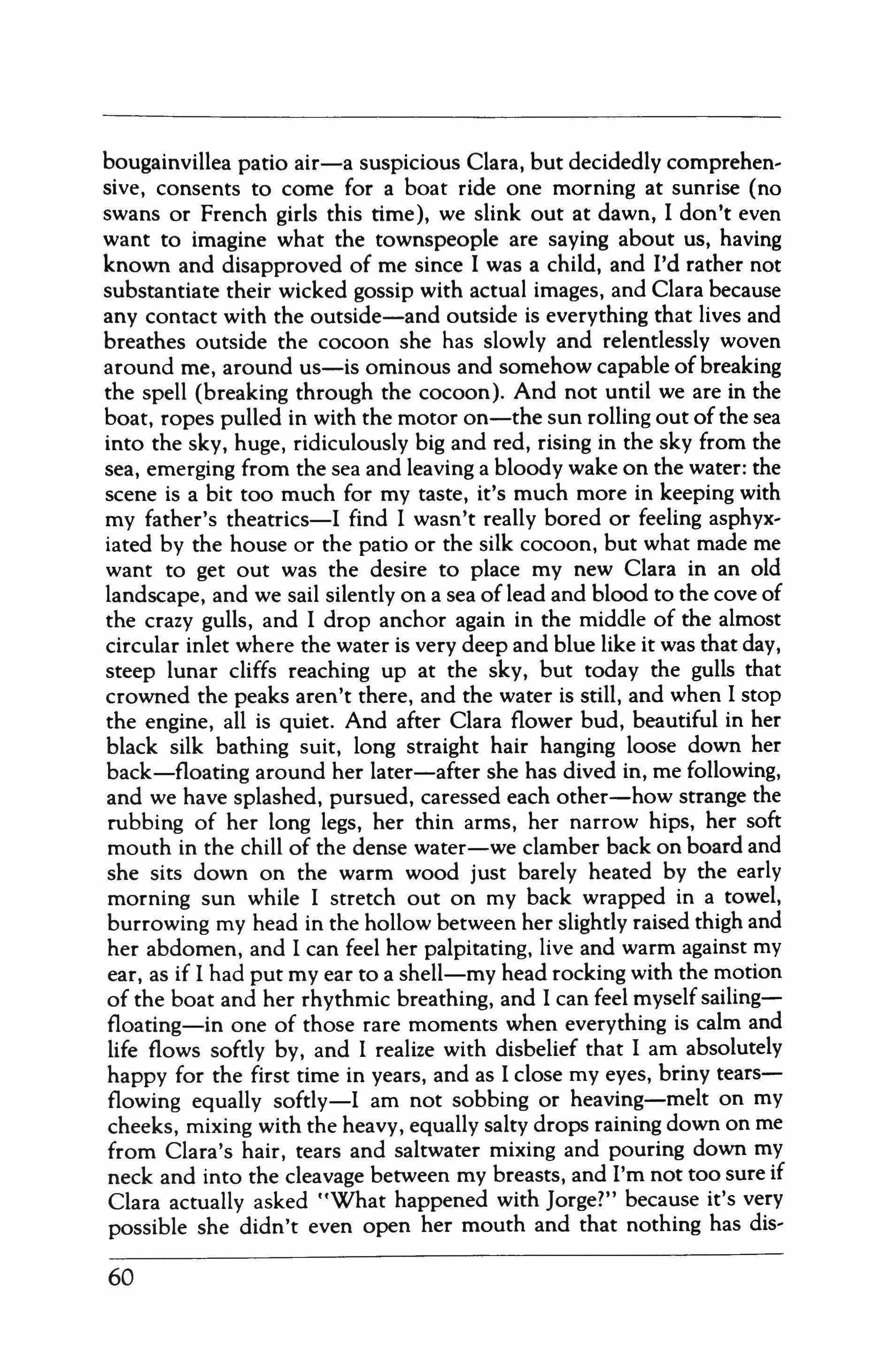
bougainvillea patio air-a suspicious Clara, but decidedly cornprehensive, consents to come for a boat ride one morning at sunrise (no swans or French girls this time), we slink out at dawn, I don't even want to imagine what the townspeople are saying about us, having known and disapproved of me since I was a child, and I'd rather not substantiate their wicked gossip with actual images, and Clara because any contact with the outside-and outside is everything that lives and breathes outside the cocoon she has slowly and relentlessly woven around me, around us-is ominous and somehow capable of breaking the spell (breaking through the cocoon). And not until we are in the boat, ropes pulled in with the motor on-the sun rolling out of the sea into the sky, huge, ridiculously big and red, rising in the sky from the sea, emerging from the sea and leaving a bloody wake on the water: the scene is a bit too much for my taste, it's much more in keeping with my father's theatrics-I find I wasn't really bored or feeling asphvxiated by the house or the patio or the silk cocoon, but what made me want to get out was the desire to place my new Clara in an old landscape, and we sail silently on a sea oflead and blood to the cove of the crazy gulls, and I drop anchor again in the middle of the almost circular inlet where the water is very deep and blue like it was that day, steep lunar cliffs reaching up at the sky, but today the gulls that crowned the peaks aren't there, and the water is still, and when I stop the engine, all is quiet. And after Clara flower bud, beautiful in her black silk bathing suit, long straight hair hanging loose down her back-floating around her later-after she has dived in, me following, and we have splashed, pursued, caressed each other-how strange the rubbing of her long legs, her thin arms, her narrow hips, her soft mouth in the chill of the dense water-we clamber back on board and she sits down on the warm wood just barely heated by the early morning sun while I stretch out on my back wrapped in a towel, burrowing my head in the hollow between her slightly raised thigh and her abdomen, and I can feel her palpitating, live and warm against my ear, as if I had put my ear to a shell-my head rocking with the motion of the boat and her rhythmic breathing, and I can feel myselfsailingfloating-in one of those rare moments when everything is calm and life flows softly by, and I realize with disbelief that I am absolutely happy for the first time in years, and as I close my eyes, briny tearsflowing equally softly-I am not sobbing or heaving-melt on my cheeks, mixing with the heavy, equally salty drops raining down on me from Clara's hair, tears and saltwater mixing and pouring down my neck and into the cleavage between my breasts, and I'm not too sure if Clara actually asked "What happened with Jorge?" because it's very possible she didn't even open her mouth and that nothing has dis,
60
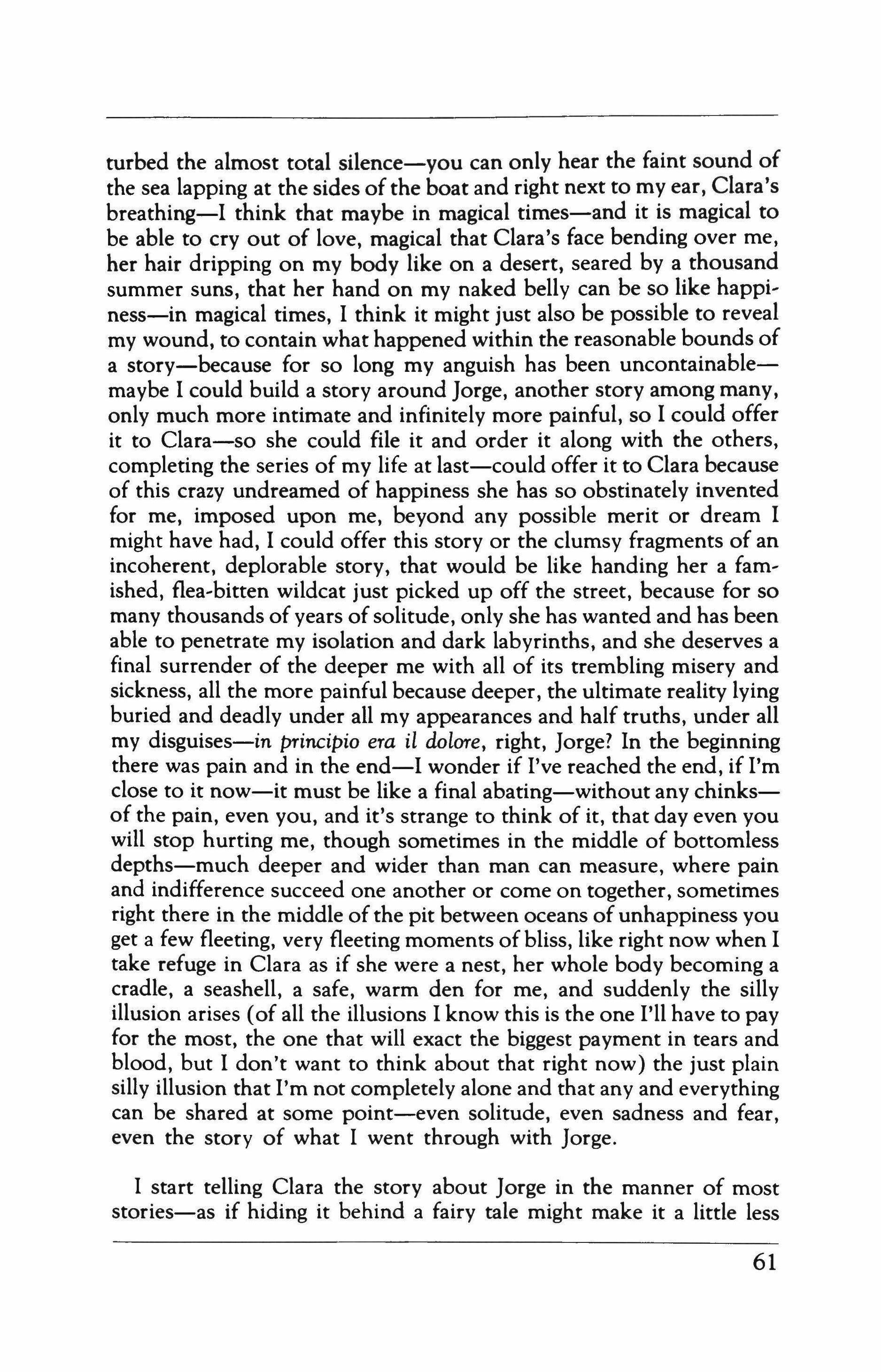
turbed the almost total silence-you can only hear the faint sound of the sea lapping at the sides of the boat and right next to my ear, Clara's breathing-I think that maybe in magical times-and it is magical to be able to cry out of love, magical that Clara's face bending over me, her hair dripping on my body like on a desert, seared by a thousand summer suns, that her hand on my naked belly can be so like happiness-in magical times, I think it might just also be possible to reveal my wound, to contain what happened within the reasonable bounds of a story-because for so long my anguish has been uncontainablemaybe I could build a story around Jorge, another story among many, only much more intimate and infinitely more painful, so I could offer it to Clara-so she could file it and order it along with the others, completing the series of my life at last-could offer it to Clara because of this crazy undreamed of happiness she has so obstinately invented for me, imposed upon me, beyond any possible merit or dream I might have had, I could offer this story or the clumsy fragments of an incoherent, deplorable story, that would be like handing her a famished, flea-bitten wildcat just picked up off the street, because for so many thousands of years of solitude, only she has wanted and has been able to penetrate my isolation and dark labyrinths, and she deserves a final surrender of the deeper me with all of its trembling misery and sickness, all the more painful because deeper, the ultimate reality lying buried and deadly under all my appearances and half truths, under all my disguises-in princiPio era il dolore, right, Jorge? In the beginning there was pain and in the end-I wonder if I've reached the end, if I'm close to it now-it must be like a final abating-without any chinksof the pain, even you, and it's strange to think of it, that day even you will stop hurting me, though sometimes in the middle of bottomless depths-much deeper and wider than man can measure, where pain and indifference succeed one another or come on together, sometimes right there in the middle ofthe pit between oceans of unhappiness you get a few fleeting, very fleeting moments of bliss, like right now when I take refuge in Clara as if she were a nest, her whole body becoming a cradle, a seashell, a safe, warm den for me, and suddenly the silly illusion arises (of all the illusions I know this is the one I'll have to pay for the most, the one that will exact the biggest payment in tears and blood, but I don't want to think about that right now) the just plain silly illusion that I'm not completely alone and that any and everything can be shared at some point-even solitude, even sadness and fear, even the story of what I went through with Jorge.
I start telling Clara the story about Jorge in the manner of most stories-as if hiding it behind a fairy tale might make it a little less
61
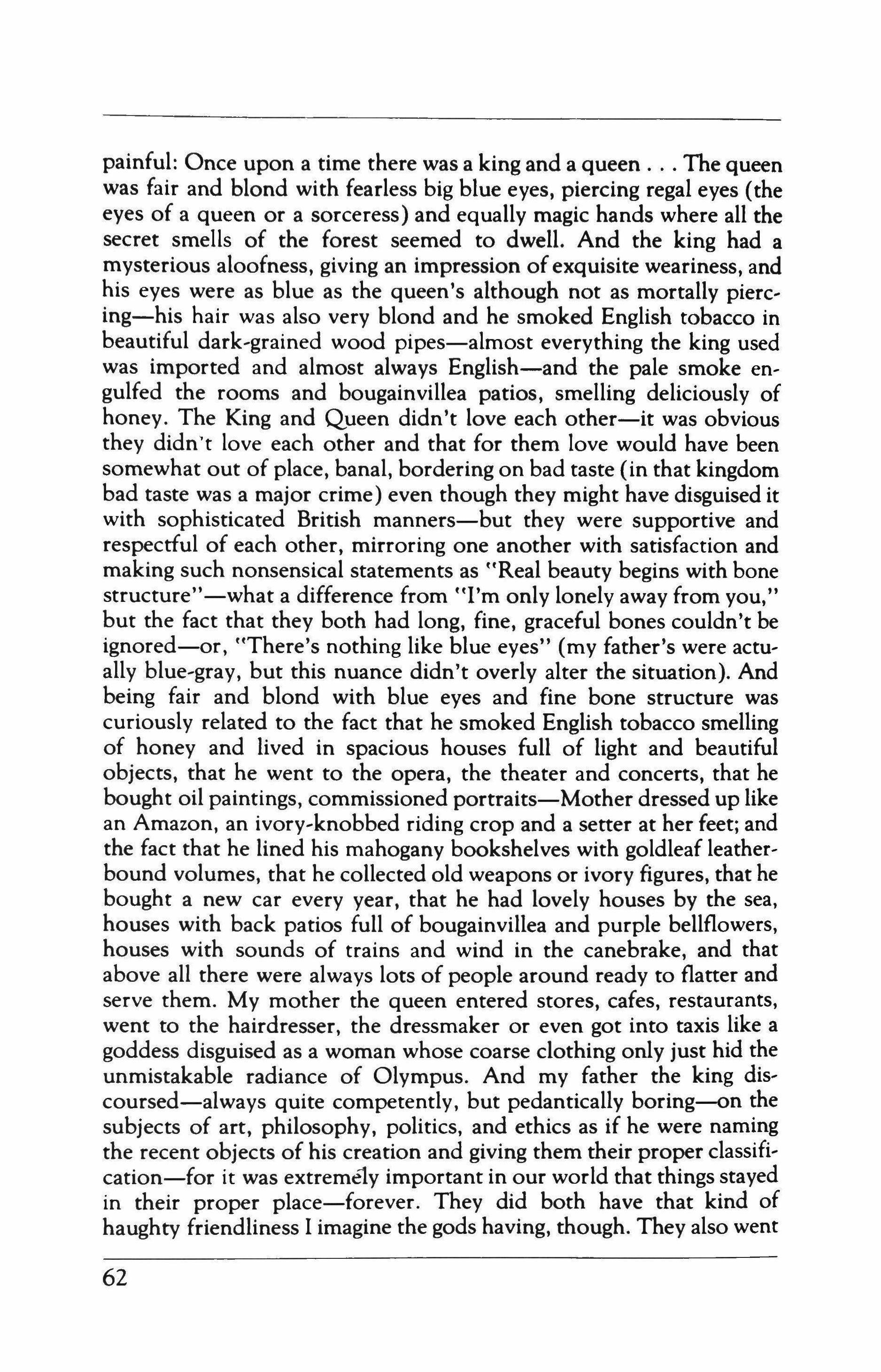
painful: Once upon a time there was a king and a queen The queen was fair and blond with fearless big blue eyes, piercing regal eyes (the eyes of a queen or a sorceress) and equally magic hands where all the secret smells of the forest seemed to dwell. And the king had a mysterious aloofness, giving an impression ofexquisite weariness, and his eyes were as blue as the queen's although not as mortally piercing-his hair was also very blond and he smoked English tobacco in beautiful dark-grained wood pipes-almost everything the king used was imported and almost always English-and the pale smoke engulfed the rooms and bougainvillea patios, smelling deliciously of honey. The King and Queen didn't love each other-it was obvious they didn't love each other and that for them love would have been somewhat out of place, banal, bordering on bad taste (in that kingdom bad taste was a major crime) even though they might have disguised it with sophisticated British manners-but they were supportive and respectful of each other, mirroring one another with satisfaction and making such nonsensical statements as "Real beauty begins with bone structure"-what a difference from "I'm only lonely away from you," but the fact that they both had long, fine, graceful bones couldn't be ignored-or, "There's nothing like blue eyes" (my father's were actually blue-gray, but this nuance didn't overly alter the situation). And being fair and blond with blue eyes and fine bone structure was curiously related to the fact that he smoked English tobacco smelling of honey and lived in spacious houses full of light and beautiful objects, that he went to the opera, the theater and concerts, that he bought oil paintings, commissioned portraits-Mother dressed up like an Amazon, an ivory-knobbed riding crop and a setter at her feet; and the fact that he lined his mahogany bookshelves with goldleaf leatherbound volumes, that he collected old weapons or ivory figures, that he bought a new car every year, that he had lovely houses by the sea, houses with back patios full of bougainvillea and purple bellflowers, houses with sounds of trains and wind in the canebrake, and that above all there were always lots of people around ready to flatter and serve them. My mother the queen entered stores, cafes, restaurants, went to the hairdresser, the dressmaker or even got into taxis like a goddess disguised as a woman whose coarse clothing only just hid the unmistakable radiance of Olympus. And my father the king discoursed-always quite competently, but pedantically boring-on the subjects of art, philosophy, politics, and ethics as if he were naming the recent objects of his creation and giving them their proper classification-for it was extremely important in our world that things stayed in their proper place-forever. They did both have that kind of haughty friendliness I imagine the gods having, though. They also went
62
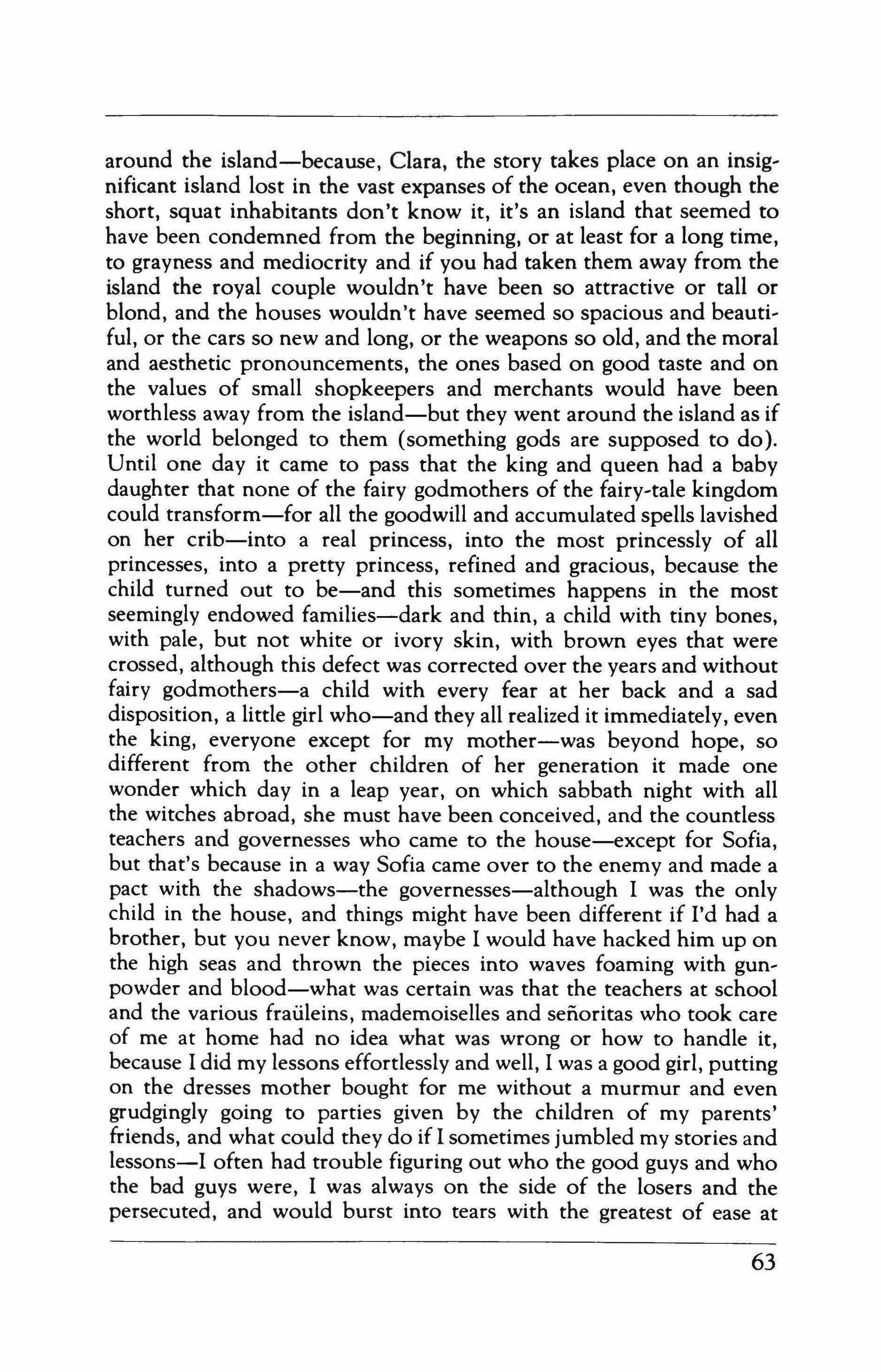
around the island-because, Clara, the story takes place on an insignificant island lost in the vast expanses of the ocean, even though the short, squat inhabitants don't know it, it's an island that seemed to have been condemned from the beginning, or at least for a long time, to grayness and mediocrity and if you had taken them away from the island the royal couple wouldn't have been so attractive or tall or blond, and the houses wouldn't have seemed so spacious and beautiful, or the cars so new and long, or the weapons so old, and the moral and aesthetic pronouncements, the ones based on good taste and on the values of small shopkeepers and merchants would have been worthless away from the island-but they went around the island as if the world belonged to them (something gods are supposed to do). Until one day it came to pass that the king and queen had a baby daughter that none of the fairy godmothers of the fairy-tale kingdom could transform-for all the goodwill and accumulated spells lavished on her crib-into a real princess, into the most princessly of all princesses, into a pretty princess, refined and gracious, because the child turned out to be-and this sometimes happens in the most seemingly endowed families-dark and thin, a child with tiny bones, with pale, but not white or ivory skin, with brown eyes that were crossed, although this defect was corrected over the years and without fairy godmothers-a child with every fear at her back and a sad disposition, a little girl who-and they all realized it immediately, even the king, everyone except for my mother-was beyond hope, so different from the other children of her generation it made one wonder which day in a leap year, on which sabbath night with all the witches abroad, she must have been conceived, and the countless teachers and governesses who came to the house-except for Sofia, but that's because in a way Sofia came over to the enemy and made a pact with the shadows-the governesses-although I was the only child in the house, and things might have been different if I'd had a brother, but you never know, maybe I would have hacked him up on the high seas and thrown the pieces into waves foaming with gun, powder and blood-what was certain was that the teachers at school and the various frauleins, mademoiselles and senoritas who took care of me at home had no idea what was wrong or how to handle it, because I did my lessons effortlessly and well, I was a good girl, putting on the dresses mother bought for me without a murmur and even grudgingly going to parties given by the children of my parents' friends, and what could they do if I sometimes jumbled my stories and lessons-I often had trouble figuring out who the good guys and who the bad guys were, I was always on the side of the losers and the persecuted, and would burst into tears with the greatest of ease at
63
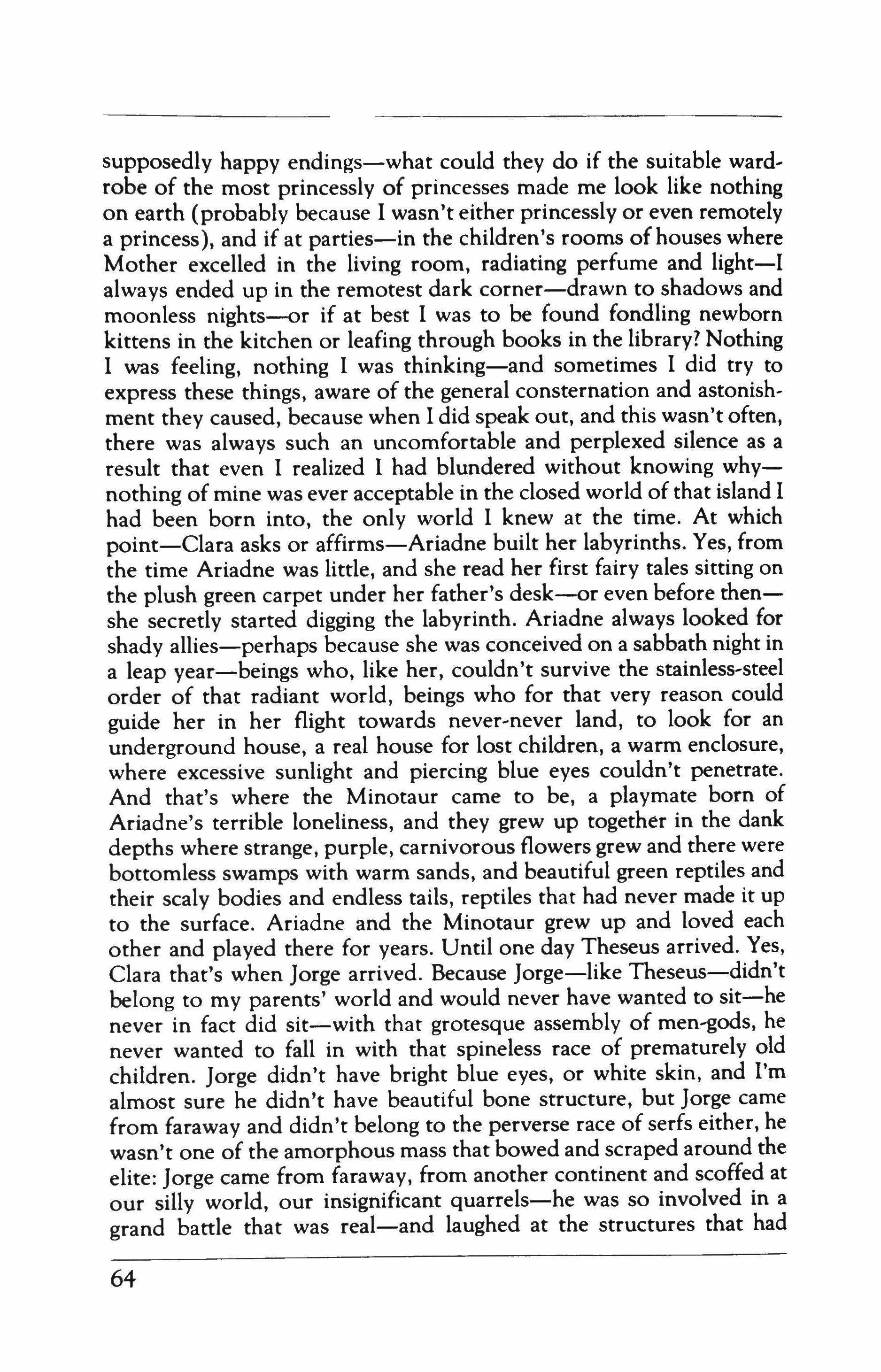
supposedly happy endings-what could they do if the suitable wardrobe of the most princessly of princesses made me look like nothing on earth (probably because I wasn't either princessly or even remotely a princess), and if at parties-in the children's rooms of houses where Mother excelled in the living room, radiating perfume and light-l always ended up in the remotest dark corner-drawn to shadows and moonless nights-or if at best I was to be found fondling newborn kittens in the kitchen or leafing through books in the library? Nothing I was feeling, nothing I was thinking-and sometimes I did try to express these things, aware of the general consternation and astonishment they caused, because when I did speak out, and this wasn't often, there was always such an uncomfortable and perplexed silence as a result that even I realized I had blundered without knowing whynothing of mine was ever acceptable in the closed world of that island I had been born into, the only world I knew at the time. At which point-Clara asks or affirms-Ariadne built her labyrinths. Yes, from the time Ariadne was little, and she read her first fairy tales sitting on the plush green carpet under her father's desk-or even before thenshe secretly started digging the labyrinth. Ariadne always looked for shady allies-perhaps because she was conceived on a sabbath night in a leap year-beings who, like her, couldn't survive the stainless-steel order of that radiant world, beings who for that very reason could guide her in her flight towards never-never land, to look for an underground house, a real house for lost children, a warm enclosure, where excessive sunlight and piercing blue eyes couldn't penetrate. And that's where the Minotaur came to be, a playmate born of Ariadne's terrible loneliness, and they grew up together in the dank depths where strange, purple, carnivorous flowers grew and there were bottomless swamps with warm sands, and beautiful green reptiles and their scaly bodies and endless tails, reptiles that had never made it up to the surface. Ariadne and the Minotaur grew up and loved each other and played there for years. Until one day Theseus arrived. Yes, Clara that's when Jorge arrived. Because Jorge-like Theseus-didn't belong to my parents' world and would never have wanted to sit-he never in fact did sit-with that grotesque assembly of men-gods, he never wanted to fall in with that spineless race of prematurely old children. Jorge didn't have bright blue eyes, or white skin, and I'm almost sure he didn't have beautiful bone structure, but Jorge carne from faraway and didn't belong to the perverse race of serfs either, he wasn't one of the amorphous mass that bowed and scraped around the elite: Jorge came from faraway, from another continent and scoffed at our silly world, our insignificant quarrels-he was so involved in a grand battle that was real-and laughed at the structures that had
64
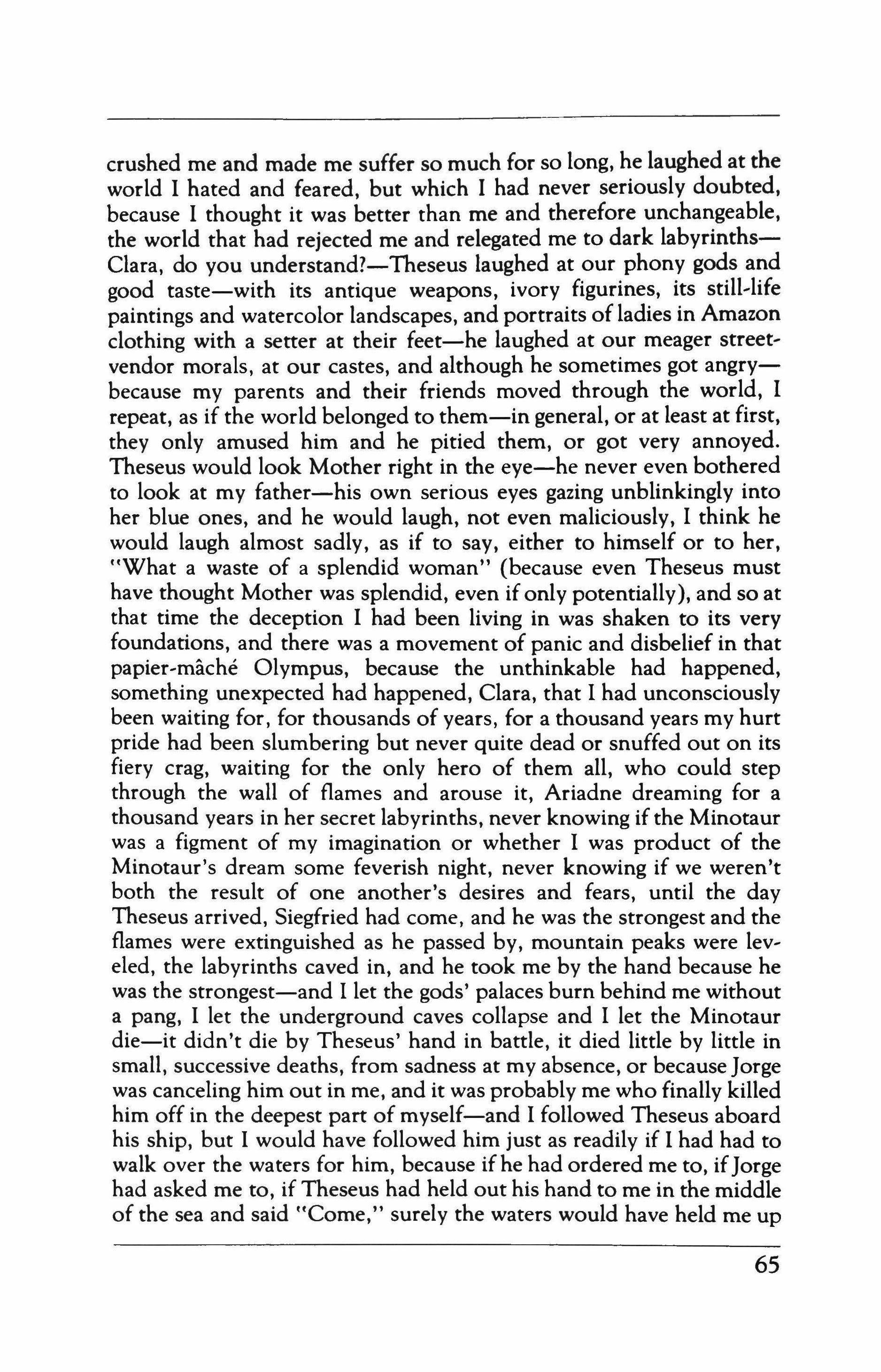
crushed me and made me suffer so much for so long, he laughed at the world I hated and feared, but which I had never seriously doubted, because I thought it was better than me and therefore unchangeable, the world that had rejected me and relegated me to dark labyrinthsClara, do you understand?-Theseus laughed at our phony gods and good taste-with its antique weapons, ivory figurines, its still-life paintings and watercolor landscapes, and portraits of ladies in Amazon clothing with a setter at their feet-he laughed at our meager street, vendor morals, at our castes, and although he sometimes got angrybecause my parents and their friends moved through the world, I repeat, as if the world belonged to them-in general, or at least at first, they only amused him and he pitied them, or got very annoyed. Theseus would look Mother right in the eye-he never even bothered to look at my father-his own serious eyes gazing unblinkingly into her blue ones, and he would laugh, not even maliciously, I think he would laugh almost sadly, as if to say, either to himself or to her, "What a waste of a splendid woman" (because even Theseus must have thought Mother was splendid, even if only potentially), and so at that time the deception I had been living in was shaken to its very foundations, and there was a movement of panic and disbelief in that papier-rnache Olympus, because the unthinkable had happened, something unexpected had happened, Clara, that I had unconsciously been waiting for, for thousands of years, for a thousand years my hurt pride had been slumbering but never quite dead or snuffed out on its fiery crag, waiting for the only hero of them all, who could step through the wall of flames and arouse it, Ariadne dreaming for a thousand years in her secret labyrinths, never knowing if the Minotaur was a figment of my imagination or whether I was product of the Minotaur's dream some feverish night, never knowing if we weren't both the result of one another's desires and fears, until the day Theseus arrived, Siegfried had come, and he was the strongest and the flames were extinguished as he passed by, mountain peaks were lev, eled, the labyrinths caved in, and he took me by the hand because he was the strongest-and I let the gods' palaces burn behind me without a pang, I let the underground caves collapse and I let the Minotaur die-it didn't die by Theseus' hand in battle, it died little by little in small, successive deaths, from sadness at my absence, or because Jorge was canceling him out in me, and it was probably me who finally killed him off in the deepest part of myself-and I followed Theseus aboard his ship, but I would have followed him just as readily if I had had to walk over the waters for him, because ifhe had ordered me to, ifJorge had asked me to, if Theseus had held out his hand to me in the middle of the sea and said "Come," surely the waters would have held me up
65
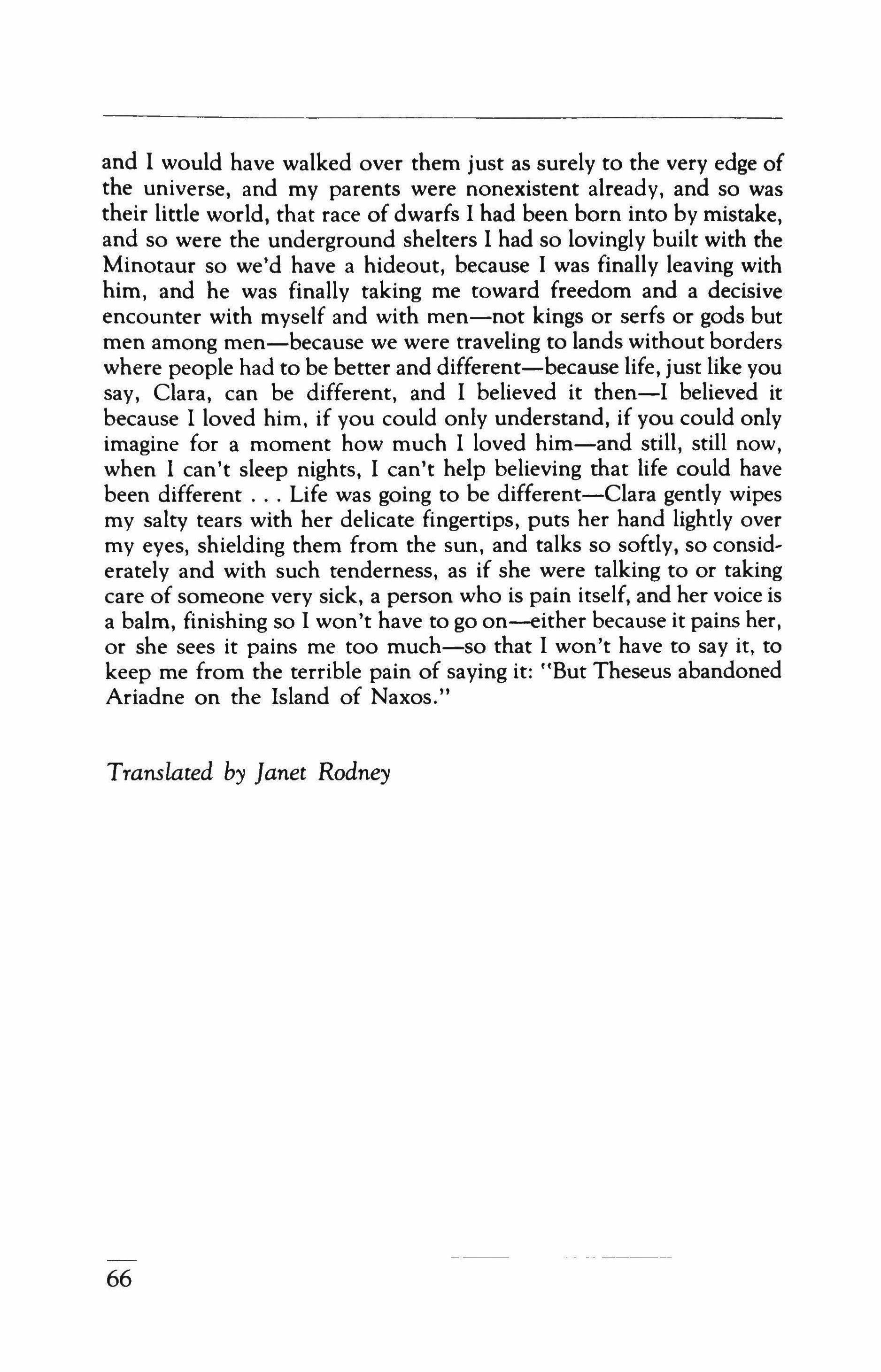
and I would have walked over them just as surely to the very edge of the universe, and my parents were nonexistent already, and so was their little world, that race of dwarfs I had been born into by mistake, and so were the underground shelters I had so lovingly built with the Minotaur so we'd have a hideout, because I was finally leaving with him, and he was finally taking me toward freedom and a decisive encounter with myself and with men-not kings or serfs or gods but men among men-because we were traveling to lands without borders where people had to be better and different-because life, just like you say, Clara, can be different, and I believed it then-I believed it because I loved him, if you could only understand, if you could only imagine for a moment how much I loved him-and still, still now, when I can't sleep nights, I can't help believing that life could have been different Life was going to be different-Clara gently wipes my salty tears with her delicate fingertips, puts her hand lightly over my eyes, shielding them from the sun, and talks so softly, so considerately and with such tenderness, as if she were talking to or taking care of someone very sick, a person who is pain itself, and her voice is a balm, finishing so I won't have to go on-either because it pains her, or she sees it pains me too much-so that I won't have to say it, to keep me from the terrible pain of saying it: "But Theseus abandoned Ariadne on the Island of Naxos."
Translated by Janet Rodney
66
From The thousand nights of Hortensia Romero
Fernando Quifiones
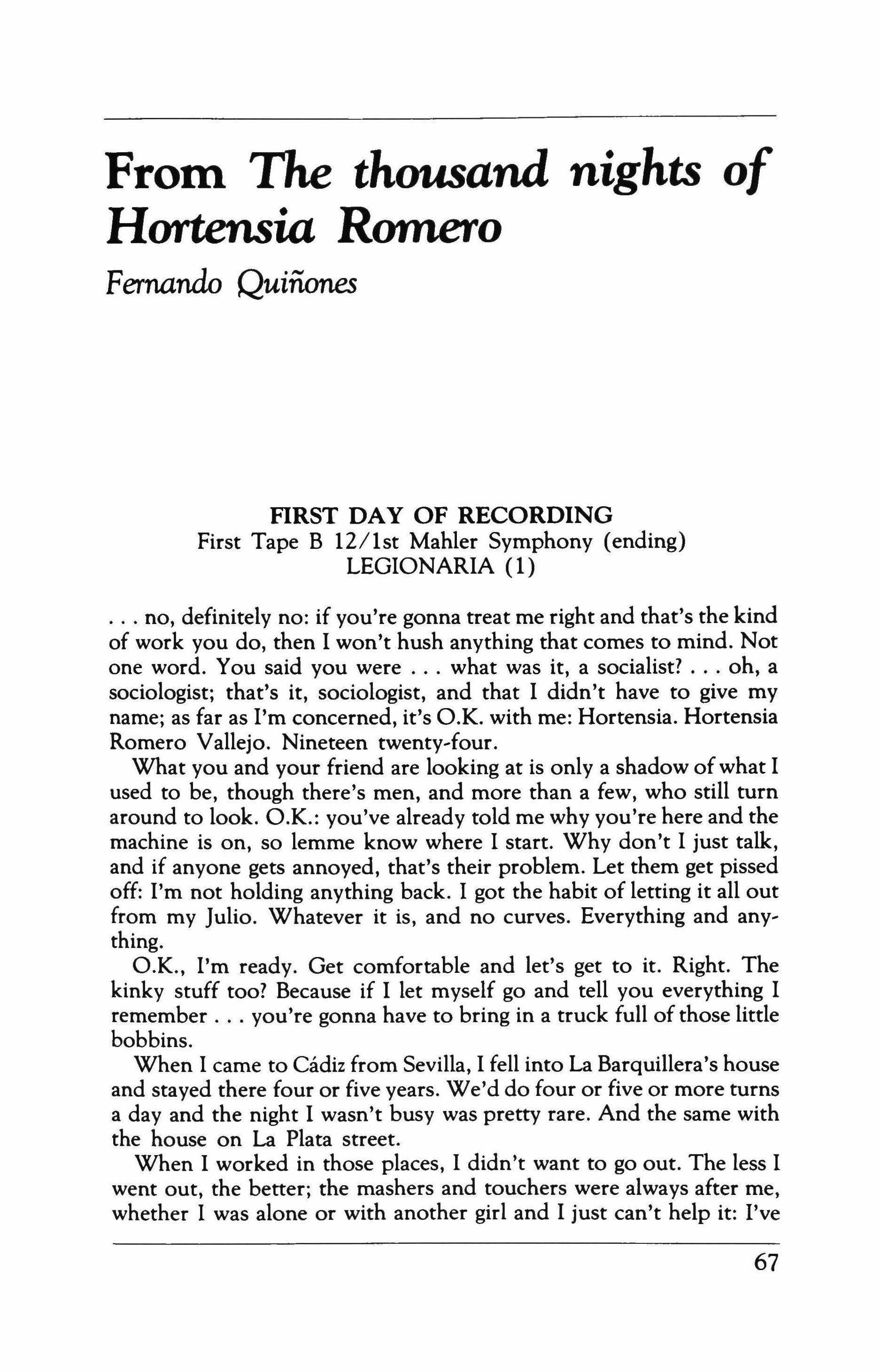
FIRST DAY OF RECORDING
First Tape B 12/1st Mahler Symphony (ending) LEGION
ARIA (1)
no, definitely no: if you're gonna treat me right and that's the kind of work you do, then I won't hush anything that comes to mind. Not one word. You said you were what was it, a socialist? oh, a sociologist; that's it, sociologist, and that I didn't have to give my name; as far as I'm concerned, it's O.K. with me: Hortensia. Hortensia Romero Vallejo. Nineteen twentv-four.
What you and your friend are looking at is only a shadow ofwhat I used to be, though there's men, and more than a few, who still turn around to look. O.K.: you've already told me why you're here and the machine is on, so lemme know where I start. Why don't I just talk, and if anyone gets annoyed, that's their problem. Let them get pissed off: I'm not holding anything back. I got the habit of letting it all out from my Julio. Whatever it is, and no curves. Everything and any' thing.
O.K., I'm ready. Get comfortable and let's get to it. Right. The kinky stuff too? Because if I let myself go and tell you everything I remember you're gonna have to bring in a truck full of those little bobbins.
When I came to Cadiz from Sevilla, I fell into La Barquillera's house and stayed there four or five years. We'd do four or five or more turns a day and the night I wasn't busy was pretty rare. And the same with the house on La Plata street.
When I worked in those places, I didn't want to go out. The less I went out, the better; the mashers and touchers were always after me, whether I was alone or with another girl and I just can't help it: I've
67

never been able to stay tough when someone lets loose with something truly witty or simpatico. So you can imagine the faces ofthe ladies and the married women in the street; especially the ones dressed in black, Jesus. I didn't need to go out. I got plenty of sun and fresh air on the rooftop and at the beach. I'd go far out, past EI Chato, near Torregorda. In those days, nobody hung out there. I'd grab a taxi in the plaza and later I'd return with a cab coming back empty from San Fernando, or the trolley, or I'd stop a truck. They'd always stop for me if there was room.
I used to like the movies and I still do. A lot. O.K., since they showed movies during working hours, I could only go on Thursdays and Sundays, at 3:30 in the afternoon; to the cowboy pictures and the cartoons, and when the picture was about to end, I'd get up and stand near the exit with my coat around my shoulders so I could run out quickly before the lights came on.
Those were the years I was earning good money. If it wasn't for that and what I got from my Julio, who knows where I'd be now.
And like I said: I always had a good time with everyone. Sure, with some more than others but listen: the art of the bed, either you have it or you don't, and if you have it, you're the one who enjoys it and you make others enjoy it. Not everybody is into it. It's not so common as you think. From really liking to screw any time, and I mean any time, and the man notices that, which is important, to choosing this position or that one, to pumping quickly or slowly, according to the man and the moment, quickly but smooth and mellow, or slowly but in a wild way, or the opposite knowing how to shift and repeat the wild and the mellow. The way you look at someone, the way you touch them. And without thinking about it: it's an art you can't learn and you can't teach. You better believe it. And it's the same for a man: no book can teach it to you. Lord, there are so many books about it now. It's in your blood or it's not, and often, you don't realize what you're doing and you're surprised to see the guy shit in his pants with something you just did spontaneously. And I mean shit in his pants. Like the way I used to position my thighs, which was gold. Pure gold. What? wait, don't stop me now, don't stop me. Let me finish or I'll forget. I was saying that no one taught me that particular position. I'd put my thighs (and I still do when the occasion comes along) way up without preventing the man from laying wherever he wanted, but feeling my thighs caressing him up and down his back and like I said, letting him reach wherever he desired, including my face and arms. One guy once said to me that it felt like he'd been with three women at the same time. Yeah, it was the way I held my thighs. And it was the same the way I'd stroke them with my feet. I'd drive
68
them crazy. Quite a few were more into the feet-tickling than with the other and I didn't do it on purpose. It was a natural thing and I myself get pleasure from it.
What participation me? My participation? No once in the lottery of the blind. What? I thought you were talking about the lottery and I was saying I've never won never oh yeah, once I got my money back O.K., O.K you mean my participation in bed oh yes, yes almost always, definitely except with very few. I told you: I always got pleasure. It was very rare for me not to feel like it. When I was young and when I was older. At least, to the point where it was an effort to go to bed like it is for some women. Not me. And not even during my period. I'm telling you, I hardly know it's my period: it's like drinking a glass of water. Except for a few days, once in a long while, and it's got nothing to do with my period. My body is simply off and I don't feel like it. But that was few and far between. I was not the cold-pussy type. Not to feel like it on a given day is one thing but a cold pussy is another. You know, like men who can't get it up, but in women. Sure, I know. Nowadays they call them frigid, right? And I knew a few. Quite a few, because there's more than what people think. O.K., what was I saying? Right: not feeling like it on a given day is one thing, but frigid-not me, honey, not me. I don't understand it. Either they're finicky or capricious, or they were spoiled as young girls. Or a firm hand was missing at the right time and place. How is it possible for a woman not to like to screw? Hey, it was made for that. It was made to fit. I'll bet you a good beating would change the situation for more than one!
But listen, to come all the time, not me nor nobody, even with all the work I had. Can't be. Sometimes I'd have a hot streak and I'd scare myself because the pleasure would be too much and I felt I was going to have a heart attack or something because it was too much. And I'd say: "O.K., not with this guy: no way." And then I'd come sometimes five or six times a day. But naturally, that was once in a while. Streaks. Streaks. A few long ones, to be sure.
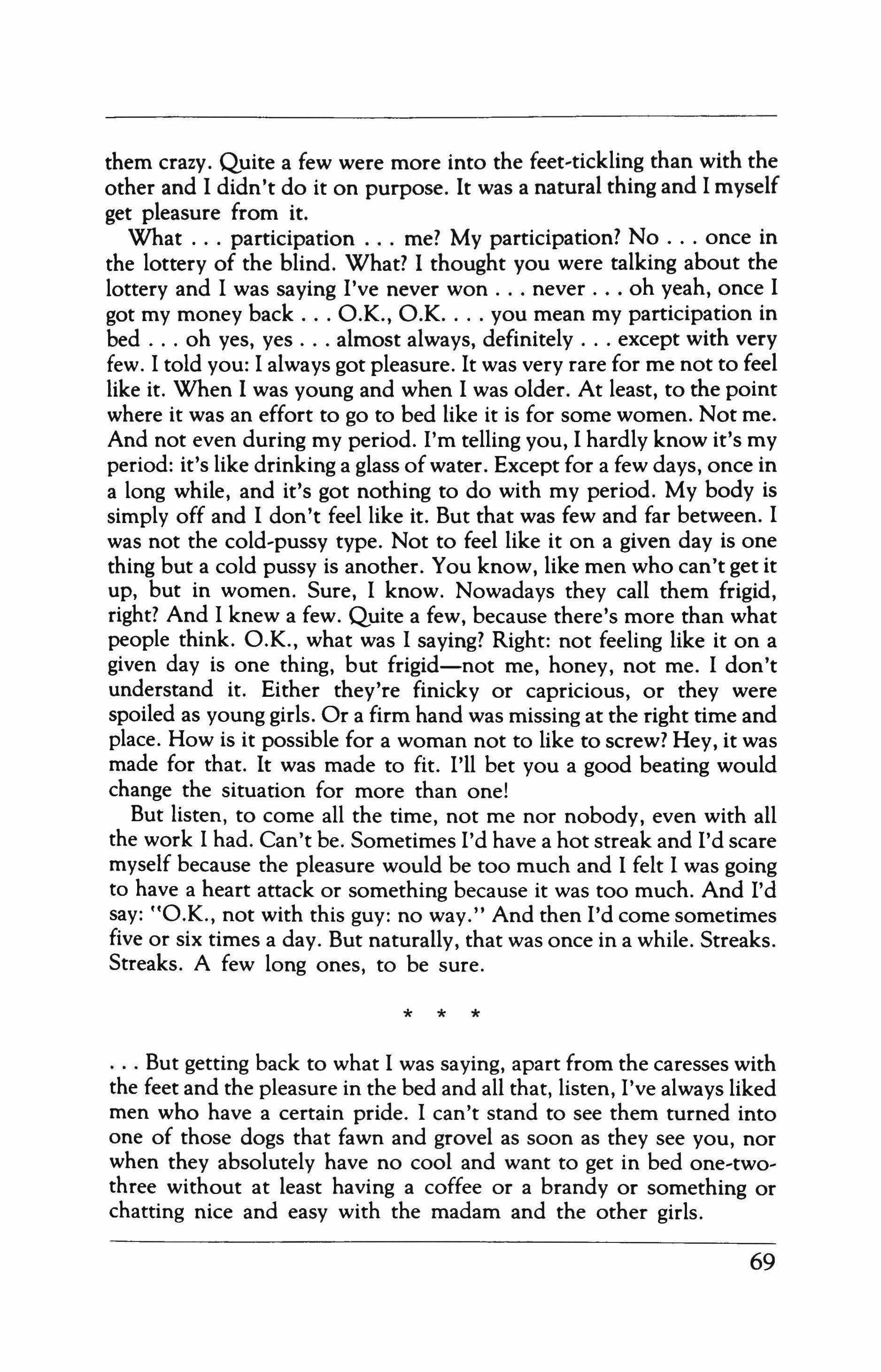
But getting back to what I was saying, apart from the caresses with the feet and the pleasure in the bed and all that, listen, I've always liked men who have a certain pride. I can't stand to see them turned into one of those dogs that fawn and grovel as soon as they see you, nor when they absolutely have no cool and want to get in bed one-twothree without at least having a coffee or a brandy or something or chatting nice and easy with the madam and the other girls.
* * *
69
Oh yeah: I could see right away, I mean the guys who were cool, I could see their desire and I knew I had them locked up good and tight. But I appreciated, in the salon or in the parlor, when they showed finesse, when they were not in a hurry, when they did not corne on to me, giving me the eye or using some syrupy line. No, when I saw a guy, sitting there relaxed and natural, hiding his desire and not looking at me much or paying me too much attention, then I would get turned on and I'd start to feel the itch: men who dominate have always won me over.
Abuse, no, uh-uh, Except for two scenes, and I myself allowed it to happen. One was a kid who hadn't even done his military service. Later, he went into the Marines and he was a boxer. Except for those two, when I lost my head for a while, and I even liked some of the evil things they did to me, in the bedroom and out of it, I never took any abuse or pimpish guff. But, on the other hand, to see a man on his knees, begging, that's worse, because then he doesn't seem like a man to me wait, except for the guy who falls in love, you can spot that and that's a whole different story. But the servile lapdogs and the trembling jellyfish, no, I could never stomach that type.
Maybe it's a mania of mine, I'm not saying no. But hey: if they stuck a flashlight in our mouths and took a good look inside, who knows what they'd find? I mean everybody, everybody, with no exception, is up to his hips with whims, manias, desires, and weird stuff that he doesn't understand or is even aware of. Aren't people strange?
And in bed? Listen: what happens in bed has never been written down. I swear by my mother there's more crazy things going on in bed than in the movies.
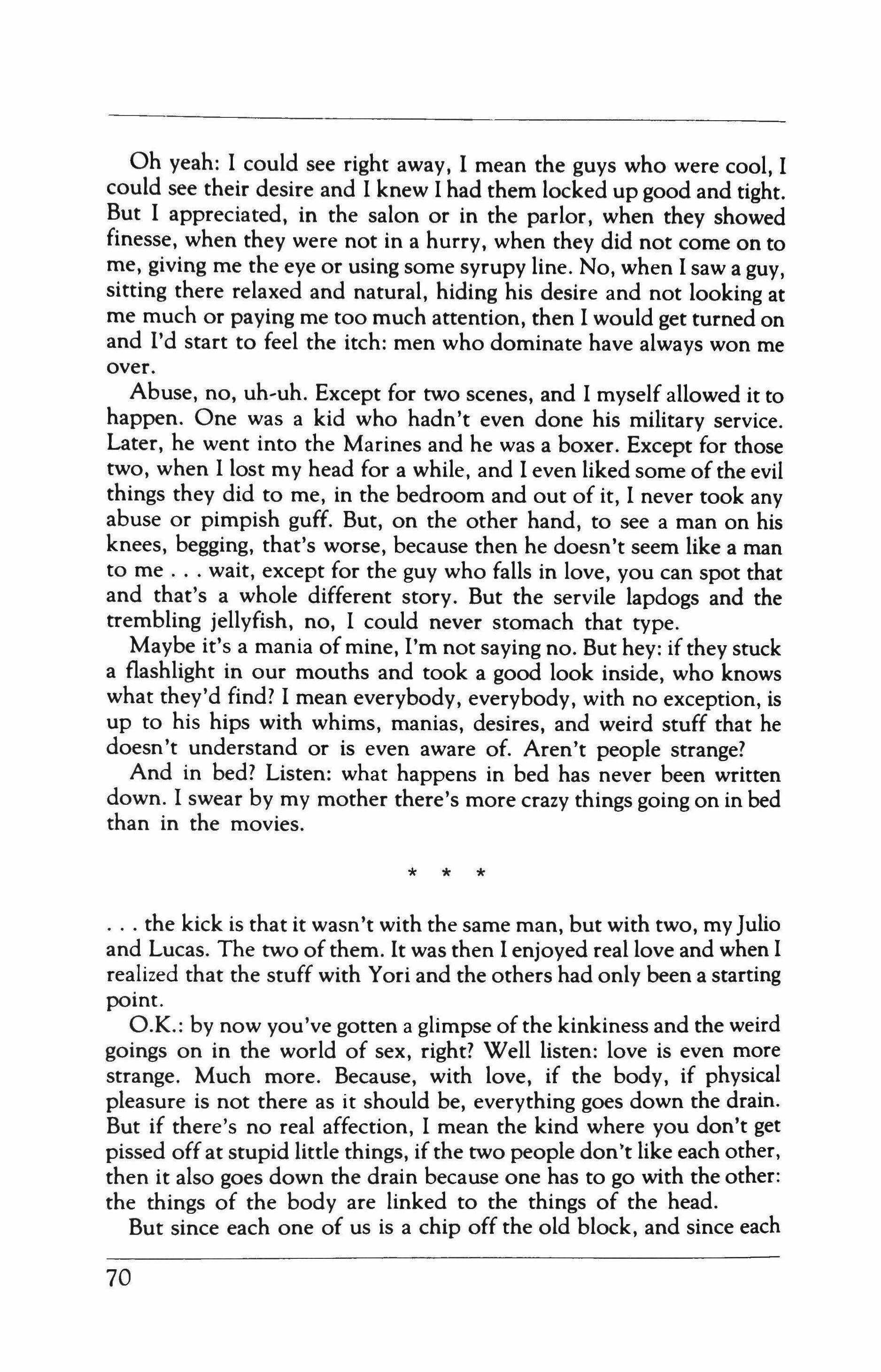
the kick is that it wasn't with the same man, but with two, my Julio and Lucas. The two of them. It was then I enjoyed real love and when I realized that the stuff with Yori and the others had only been a starting point.
O.K.: by now you've gotten a glimpse of the kinkiness and the weird goings on in the world of sex, right? Well listen: love is even more strange. Much more. Because, with love, if the body, if physical pleasure is not there as it should be, everything goes down the drain. But if there's no real affection, I mean the kind where you don't get pissed off at stupid little things, if the two people don't like each other, then it also goes down the drain because one has to go with the other: the things of the body are linked to the things of the head.
But since each one of us is a chip off the old block, and since each
* * *
70
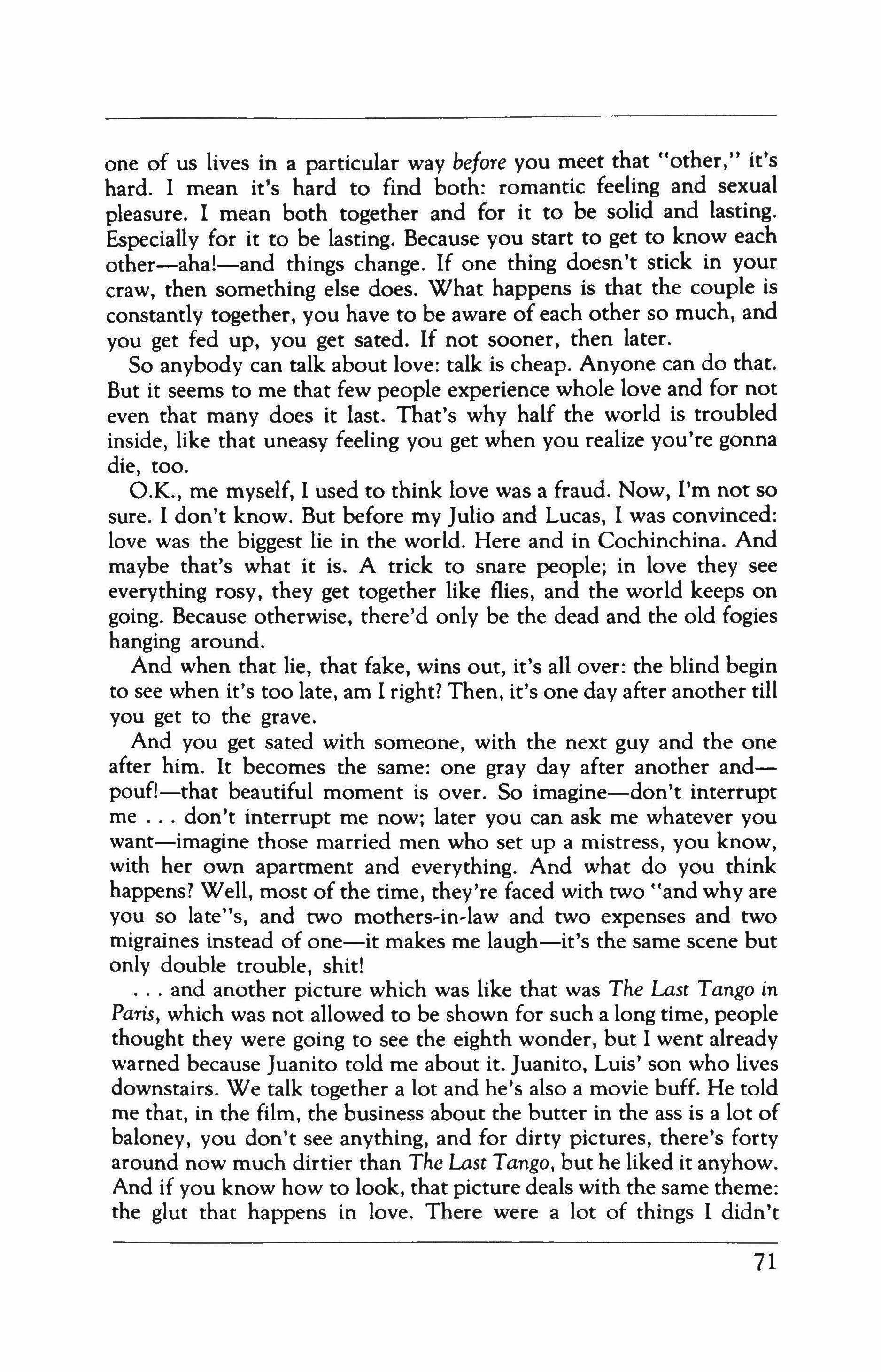
one of us lives in a particular way before you meet that "other," it's hard. I mean it's hard to find both: romantic feeling and sexual pleasure. I mean both together and for it to be solid and lasting. Especially for it to be lasting. Because you start to get to know each other-aha!-and things change. If one thing doesn't stick in your craw, then something else does. What happens is that the couple is constantly together, you have to be aware of each other so much, and you get fed up, you get sated. If not sooner, then later.
So anybody can talk about love: talk is cheap. Anyone can do that. But it seems to me that few people experience whole love and for not even that many does it last. That's why half the world is troubled inside, like that uneasy feeling you get when you realize you're gonna die, too.
O.K., me myself, I used to think love was a fraud. Now, I'm not so sure. I don't know. But before my Julio and Lucas, I was convinced: love was the biggest lie in the world. Here and in Cochinchina. And maybe that's what it is. A trick to snare people; in love they see everything rosy, they get together like flies, and the world keeps on going. Because otherwise, there'd only be the dead and the old fogies hanging around.
And when that lie, that fake, wins out, it's all over: the blind begin to see when it's too late, am I right? Then, it's one day after another till you get to the grave.
And you get sated with someone, with the next guy and the one after him. It becomes the same: one gray day after another andpouf!-that beautiful moment is over. So imagine-don't interrupt me don't interrupt me now; later you can ask me whatever you want-imagine those married men who set up a mistress, you know, with her own apartment and everything. And what do you think happens? Well, most of the time, they're faced with two "and why are you so late"s, and two mothers-in-law and two expenses and two migraines instead of one-it makes me laugh-it's the same scene but only double trouble, shit! and another picture which was like that was The Last Tango in Paris, which was not allowed to be shown for such a long time, people thought they were going to see the eighth wonder, but I went already warned because juanito told me about it. Juanito, Luis' son who lives downstairs. We talk together a lot and he's also a movie buff. He told me that, in the film. the business about the butter in the ass is a lot of baloney, you don't see anything, and for dirty pictures, there's forty around now much dirtier than The Last Tango, but he liked it anyhow. And if you know how to look, that picture deals with the same theme: the glut that happens in love. There were a lot of things I didn't
71
understand; when he pulls his pants down on the dance floor and sticks out his ass, 1 don't understand why he did that no, it was too much, drunk or sober, and he wasn't that drunk I thought it was funny he showed his ass, but it didn't fit, in that moment I mean, and the bit when he's talking to his dead wife, I didn't get that either. I saw it a while ago, and every day I remember less What did come through was that they were basically out of tune with each other, and when they got sated with screwing, it was over. Because they only meshed while fucking, but outside of that, nothing. It's like when I lived in the country. If I'd have been without my Julio, if I'd have been only with Lucas-I'll tell you about that later. What I mean is that as much as I liked Lucas, it would have lasted maybe a couple of months, because that's all it was: pleasure in bed. Which is great but, in time, the bed alone becomes wearisome, it needs its complement. It's got to be balanced with the other. If not, then it's the last tango. But pronto
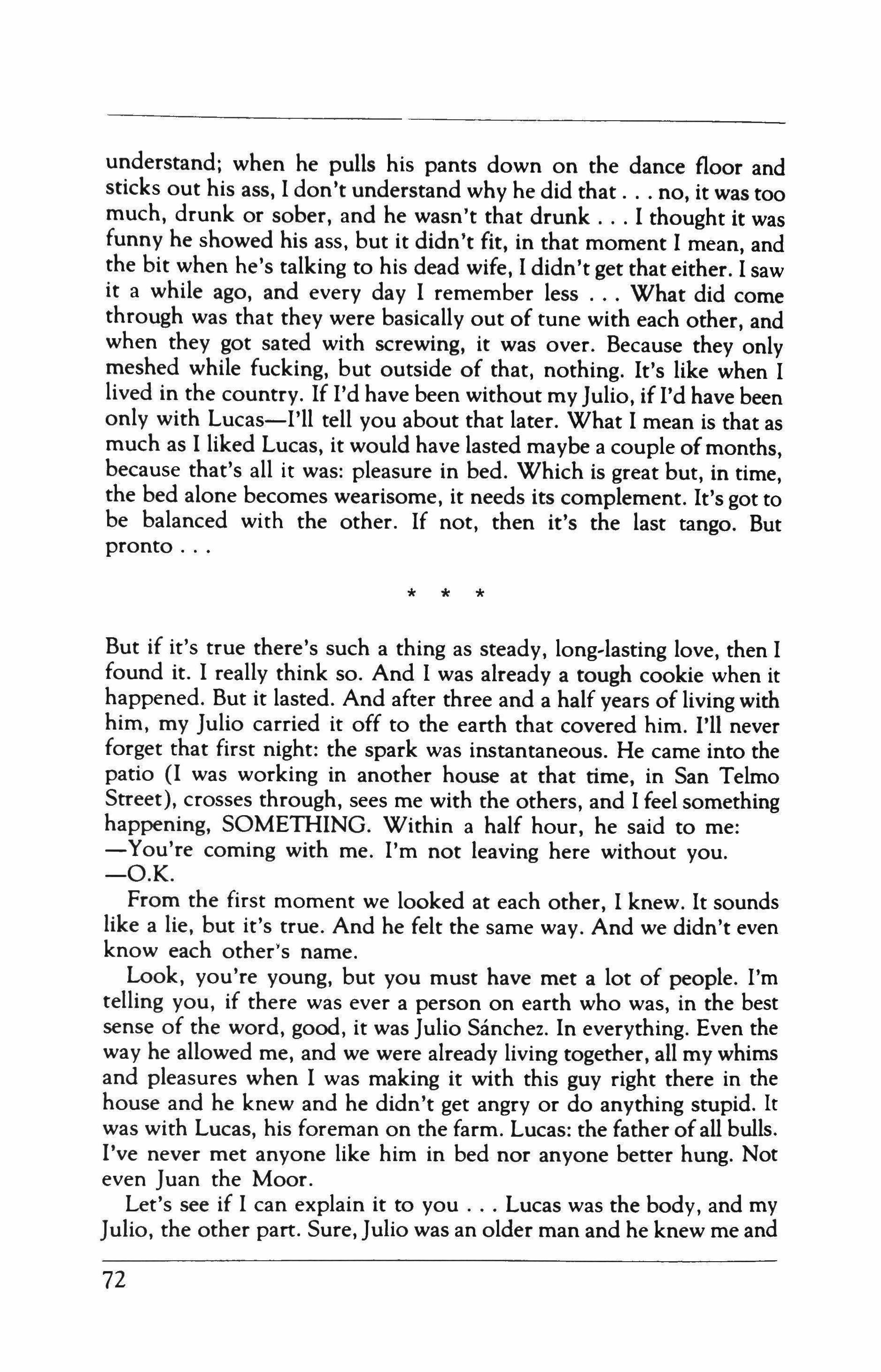
But if it's true there's such a thing as steady, long-lasting love, then I found it. I really think so. And I was already a tough cookie when it happened. But it lasted. And after three and a half years of living with him, my Julio carried it off to the earth that covered him. I'll never forget that first night: the spark was instantaneous. He came into the patio (I was working in another house at that time, in San Telmo Street), crosses through, sees me with the others, and I feel something happening, SOMETHING. Within a half hour, he said to me: - You're coming with me. I'm not leaving here without you. -O.K.
From the first moment we looked at each other, I knew. It sounds like a lie, but it's true. And he felt the same way. And we didn't even know each other's name.
Look, you're young, but you must have met a lot of people. I'm telling you, if there was ever a person on earth who was, in the best sense of the word, good, it was Julio Sanchez. In everything. Even the way he allowed me, and we were already living together, all my whims and pleasures when I was making it with this guy right there in the house and he knew and he didn't get angry or do anything stupid. It was with Lucas, his foreman on the farm. Lucas: the father ofall bulls. I've never met anyone like him in bed nor anyone better hung. Not even Juan the Moor.
Let's see if I can explain it to you Lucas was the body, and my Julio, the other part. Sure, Julio was an older man and he knew me and
* * *
72

loved me and since, on the farm there was no one to object or criticize, he probably said to himself: "Why shouldn't this tigress give herself the pleasures that I can't give her?"
He was an older man. And so, once a month he would make love and come like a gentleman and I was happy for him to have that pleasure and I was really getting it on with Lucas who was a donkey on two feet but affectionate and considerate. And he would split me apart in bed. What joy, honey, what joy! So much that in the middle of those hot sessions with Lucas, I felt the same passion for him as for my Julio. The same, or even more. Although not later. Afterwards, I could distinguish the one from the other: I was not stupid and I was aware. The sting is that the two were not one single man. But that's too much to ask. Too much.
With Lucas, sure, when someone splits you in half like that, you get dizzy, and in the moment, the male who's heating you up and really grooving, whoever it is, becomes something, I don't know, almost sacred, and you feel like climbing inside of him or just dying there on the spot, and afterwards there's a huge feeling of gratitude-you must know what I mean. I mean, it's much more than just having a good time. Much more.
Now Lucas was not the kind who beats women. But the first time he threw me down on the bed, I was in glory, and with the first thrust, I was wild. The way it wound up was that all I had to do was see Lucas and it was like heat on wheels running down my body from my throat to my thighs, my mouth dry and my nipples standing up like two pencils which always gave me away. It was always like that with my nipples. They were something special: cone-shaped with long tips. And they still give me away. But before, and not too long ago, if I put a brick under my blouse, they'd still stand at attention like a pair of horns pointing at the men: hey, they were something else! I was always in a bother and had to put something on over my blouse even if it wasn't cold. And I'd babble away, not knowing what they or I was saying, just thinking about getting into bed and I had to sit down anywhere to hold my knees, which were shaking like crazy.
The way that guy moved and touched down below, around the waist and up around my breasts was a work of art and I felt like I was coming for a quarter or half an hour in a kind of marvelous mixed suffering and pleasure. It was beautiful. Because he was also like Paqui or Yori or the Marine. The type who likes to prolong it; the type who makes you feel that if someone lit a match nearby, everything and the night table would blow sky high.
I'm telling you, he would leave me dead, but with a desire to keep on fucking. Forever.
73
And it was the same thing with my Julio in the terrain of understanding. Which is the most beautiful thing there is and who can ask for more: to feel the same things in and towards the world, from the fact that we both liked animals (we had pigeons, rabbits, chickens, guinea pigs, cats, dogs and who knows what else), to what we were thinking and saying, without checking even one syllable of what came to our minds in the moment. And being really absorbed in how amazing life is, if you just look. That's where 1 picked up the habit of not curbing one iota of what I'm feeling when I talk, and I'm really set in that habit and nobody can take it away from me.
The hours would go by while we sat and loved each other without saying it, without getting tired or annoyed, feeling more pleasure than a faggot with tapeworms. Julio liked for me to tell him things about my life and even the stories of my grandmother Pepa. And sometimes he liked to hear them a second time. That's what 1 call harmony.
And since he had consented to my scene with Lucas, sometimes, when we ate outside in the cool air, he'd ask:
-So, is Lucas doing right by you?
-More than right, dear heart.
-I mean you're totally satisfied?
And 1 would answer with a deep kiss; of course: the heart and the body are grateful to what is given without fear or self-interest.
The delicate touch of Julio, it was an art, was that I was afraid he would ask me a lot of details. But he never did. Not once. My fear was silly because he wasn't like that. But I was nervous he would ask, not what Lucas did or didn't do with me, but the things it occurred to me to do with that man. Since he turned me on so much, 1 got into some far-out cravings and desires and we'd wind up breathless and blind. I figure Julio imagined some of that stuff. But he had the delicacy to never poke or pry.
And so, he left me everything. He had no family, not even a nephew. He left me all his possessions, which he had promised me. The two estates with the two houses, the one in the country and the other one here. He died within two weeks just the way he lived: serenely, without causing any trouble
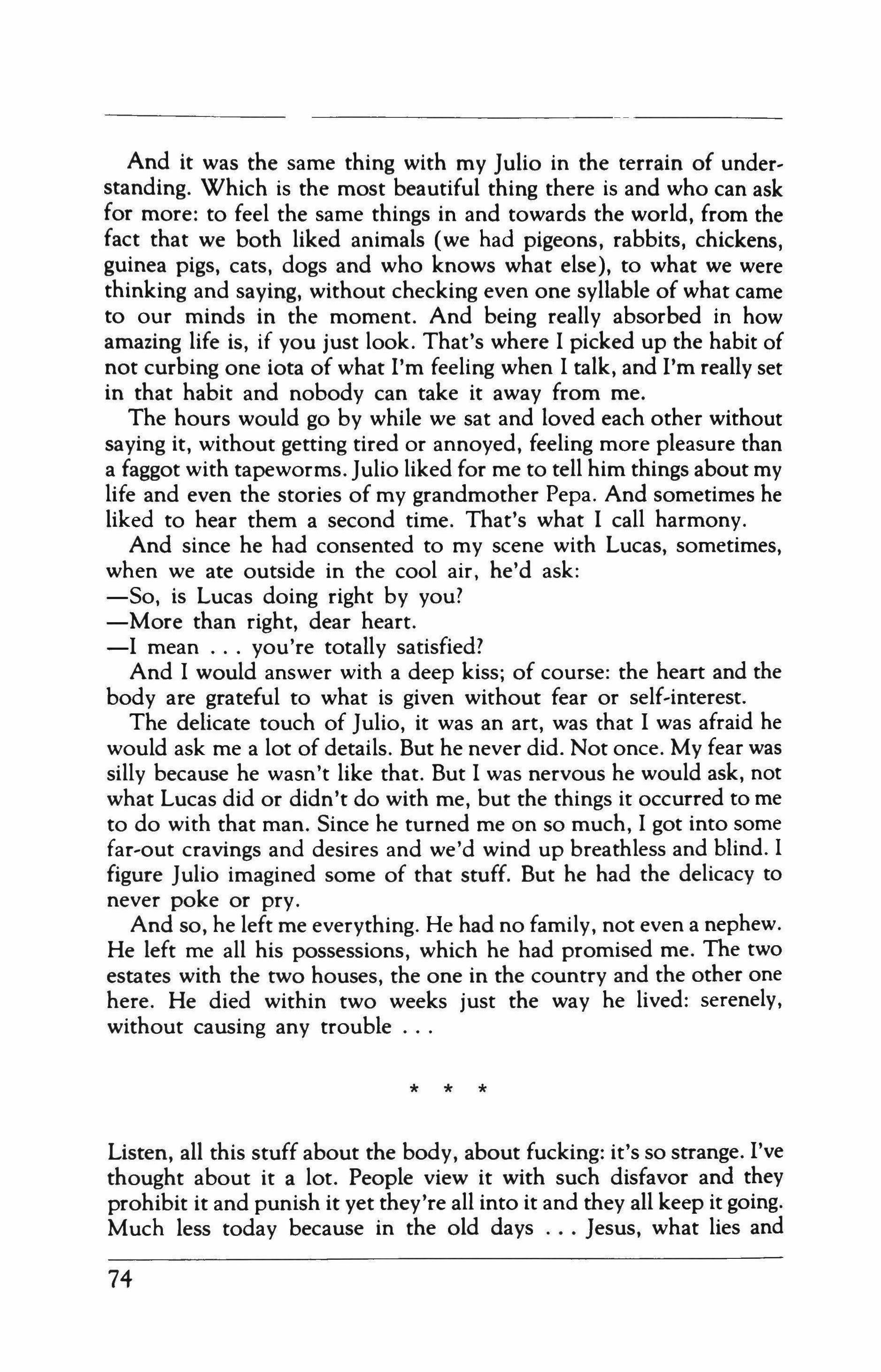
Listen, all this stuff about the body, about fucking: it's so strange. I've thought about it a lot. People view it with such disfavor and they prohibit it and punish it yet they're all into it and they all keep it going. Much less today because in the old days Jesus, what lies and
74
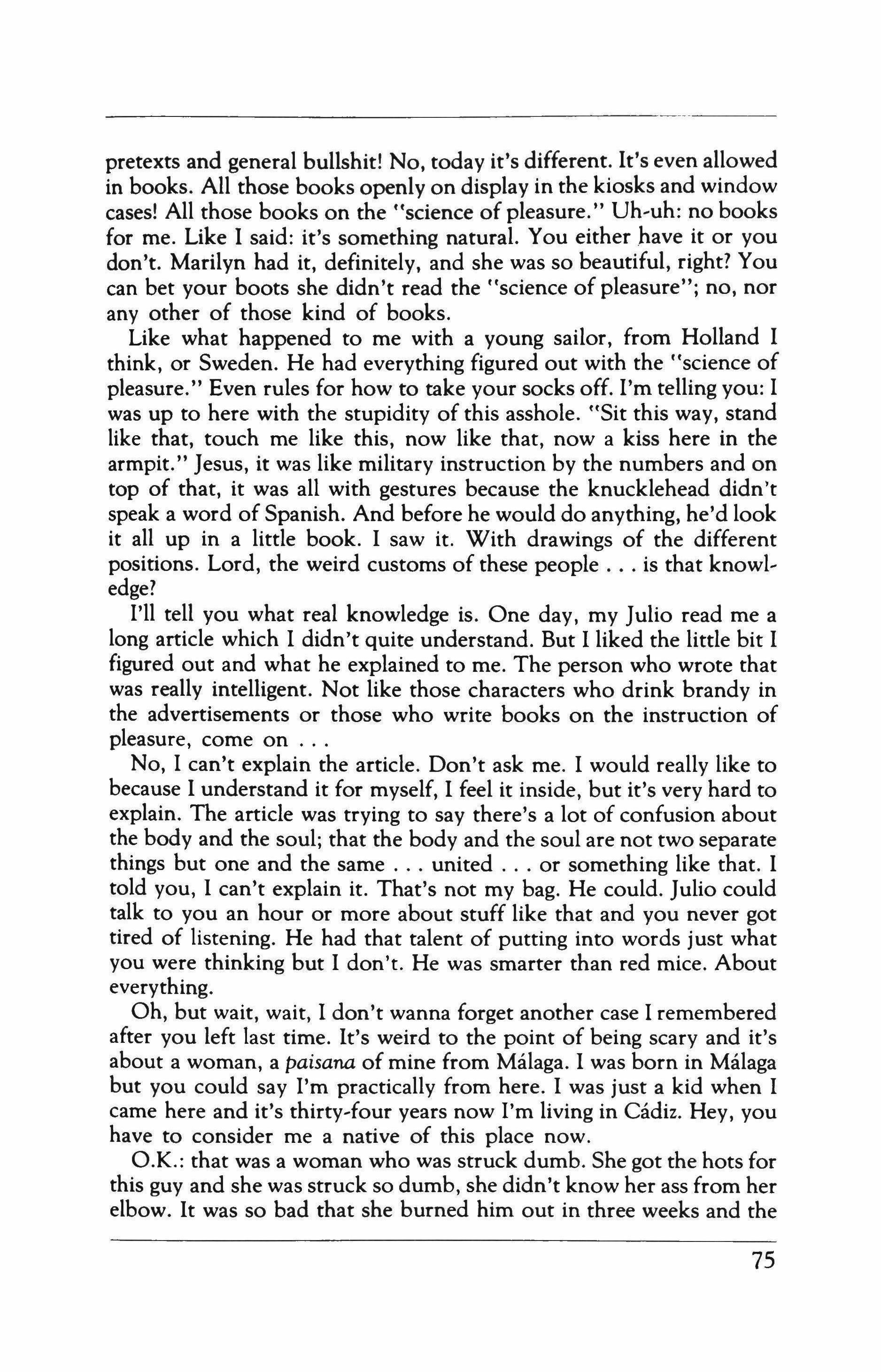
pretexts and general bullshit! No, today it's different. It's even allowed in books. All those books openly on display in the kiosks and window cases! All those books on the "science of pleasure." Uh-uh: no books for me. Like I said: it's something natural. You either have it or you don't. Marilyn had it, definitely, and she was so beautiful, right? You can bet your boots she didn't read the "science of pleasure"; no, nor any other of those kind of books.
Like what happened to me with a young sailor, from Holland I think, or Sweden. He had everything figured out with the "science of pleasure." Even rules for how to take your socks off. I'm telling you: I was up to here with the stupidity of this asshole. "Sit this way, stand like that, touch me like this, now like that, now a kiss here in the armpit." Jesus, it was like military instruction by the numbers and on top of that, it was all with gestures because the knucklehead didn't speak a word of Spanish. And before he would do anything, he'd look it all up in a little book. I saw it. With drawings of the different positions. Lord, the weird customs of these people is that knowledge?
I'll tell you what real knowledge is. One day, my Julio read me a long article which I didn't quite understand. But I liked the little bit I figured out and what he explained to me. The person who wrote that was really intelligent. Not like those characters who drink brandy in the advertisements or those who write books on the instruction of pleasure, come on
No, I can't explain the article. Don't ask me. I would really like to because I understand it for myself, I feel it inside, but it's very hard to explain. The article was trying to say there's a lot of confusion about the body and the soul; that the body and the soul are not two separate things but one and the same united or something like that. I told you, I can't explain it. That's not my bag. He could. Julio could talk to you an hour or more about stuff like that and you never got tired of listening. He had that talent of putting into words just what you were thinking but I don't. He was smarter than red mice. About everything.
Oh, but wait, wait, I don't wanna forget another case I remembered after you left last time. It's weird to the point of being scary and it's about a woman, a paisana of mine from Malaga. I was born in Malaga but you could say I'm practically from here. I was just a kid when I came here and it's thirty-four years now I'm living in Cadiz. Hey, you have to consider me a native of this place now.
O.K.: that was a woman who was struck dumb. She got the hots for this guy and she was struck so dumb, she didn't know her ass from her elbow. It was so bad that she burned him out in three weeks and the
75

funny thing was that, in the beginning, he was crazy about her and she didn't even notice him. But when she did Joseph Mary and Jesus! Right, she got so crazy, it only lasted three weeks. It was in the house of La Barquillera. Try to imagine how that woman felt about this guy. You know we use the expression: "So-and-so is crazy about so-andso." Most of the time, it's just an expression. Well, I've only seen it happen once: and it was with her. There's a Japanese film I think deals with the same kind of loonies; at the end she cuts off his private parts. They weren't allowed to show it at the Film Festival, the Caracola, in spite of all the excitement to see it. Well, with these two I'm talking about, it was the same: when they went to bed you couldn't get them up with a crane.
She wasn't exactly a spring chicken but she was prettier than a movie star. It's no accident that we malagueiias have the reputation for being good-looking. Her name was Regina and we didn't get along too well. She was very snooty. But you have to give her her due. The madam used to say about her, a sevillana from Cazalla called Loli, and me: "Don't tell the others, but the day anyone of you is not around, it's like we're missing ten."
Regina got so entangled with that guy, Jesus, crying and fighting and laying money on him. Which was nothing out of the ordinary. But Regina got so stuck on him, she couldn't leave him alone for a second. She'd even go into the toilet with him and sit on the floor next to him like a dog while he was doing his business with the smell and everything. Can you figure it? She was so pretty and so proud. Prouder than a queen or a sultan's wife, and clinging to even his nasty smell when, in the beginning, she never even gave him a look. And in the bedroom, when they first went at it hot and heavy, they never left the room, day or night. I don't know how the madam stood for it. She probably worked out an arrangement and he gave her a nice piece of change. They would set the food down for them by the door, their room was way in the back with no balcony or window, and the only time she went out in the three weeks was to hand her daughter over to him for deflowering and he never even asked her or brought it up, Jesus, he didn't even know she had a daughter!
Then one day, they'd already gotten to the stage of fighting and screaming, Regina cut him bad in the shoulder with a kitchen knife and it was all over. He went to the emergency ward, she packed a suitcase and took off without a word. I found out later, two or three years later, that she killed herself in Ceuta a short time after the affair. You can figure out how crazy she'd become because she told a friend of hers in the house, Chari, that she realized the guy was a bum and a dumb asshole, but that she couldn't do anything about it, she couldn't
76
control herself and that if he asked her for her eyes, she'd tear them out and give them to him.
Listen, real love, I don't think that's real love, huh? And if it is, it's sick. The body. The flesh takes over and the rest of us goes blind. Some handle it better and others worse. Who knows: maybe she behaved that way because of her very pride. Because, for pride, she took the cake

You said you were a sociologist And you're so young I know I'm not supposed to be asking the questions but what's a sociologist? I'd really like to know. It sounds very nice. Sociologist. And what do you people do?
Wait, wait, slower a little slower Societal relations, the economic factor right: bread you do studies aha! the problems and the behavior of people, not ofJoe Blow or Jane Doe but of the masses Uh-huh and how each one lives, right, honey? Sure, I understand it perfectly. And that's why you want me to talk to you and tell you the things I know. Me or anyone else you can grab. O.K., maybe it's too much to ask but here goes: is anything gained by bringing out all that stuff and writing it down, with the unholy muddle that life is, my God? Because you're not asking specifically what so-and-so earns each week, though even if they told you, I'm not sure it would mean much. But you stick your nose in everything. Like with me, you're sniffing around in the business of love and sex, which is the greatest mystery in the world and tell me: do you also study that? You do.
Well, I'm going to give you a comparison and don't let it surprise you because I get some weird ideas I think I'm a little crazy But I'm not gonna keep quiet. O.K.: it struck me that love and sex are just like a whole town with its clean pretty houses and its hidden secrets, its flowers on the balconies and its rats and shit underneath and they all come out in the wash and everything, the flowers and the shit, gets mixed up and no one can set it straight, am I lying?
I already told you I believe I've known true love. Even if it was only for three and a half years. All right: that was that, that was real but I'm still telling you love is a weird puzzle and the person in love can't solve it or understand what's happening. Especially the person in love. And, like I said, for it to be lasting and for the couple to know, or not know, that life is nothing more than getting maximum pleasure but there are those with an appetite for life and those who are starving or fasting and whatever I've lost the gist of what I was saying,
* * *
77
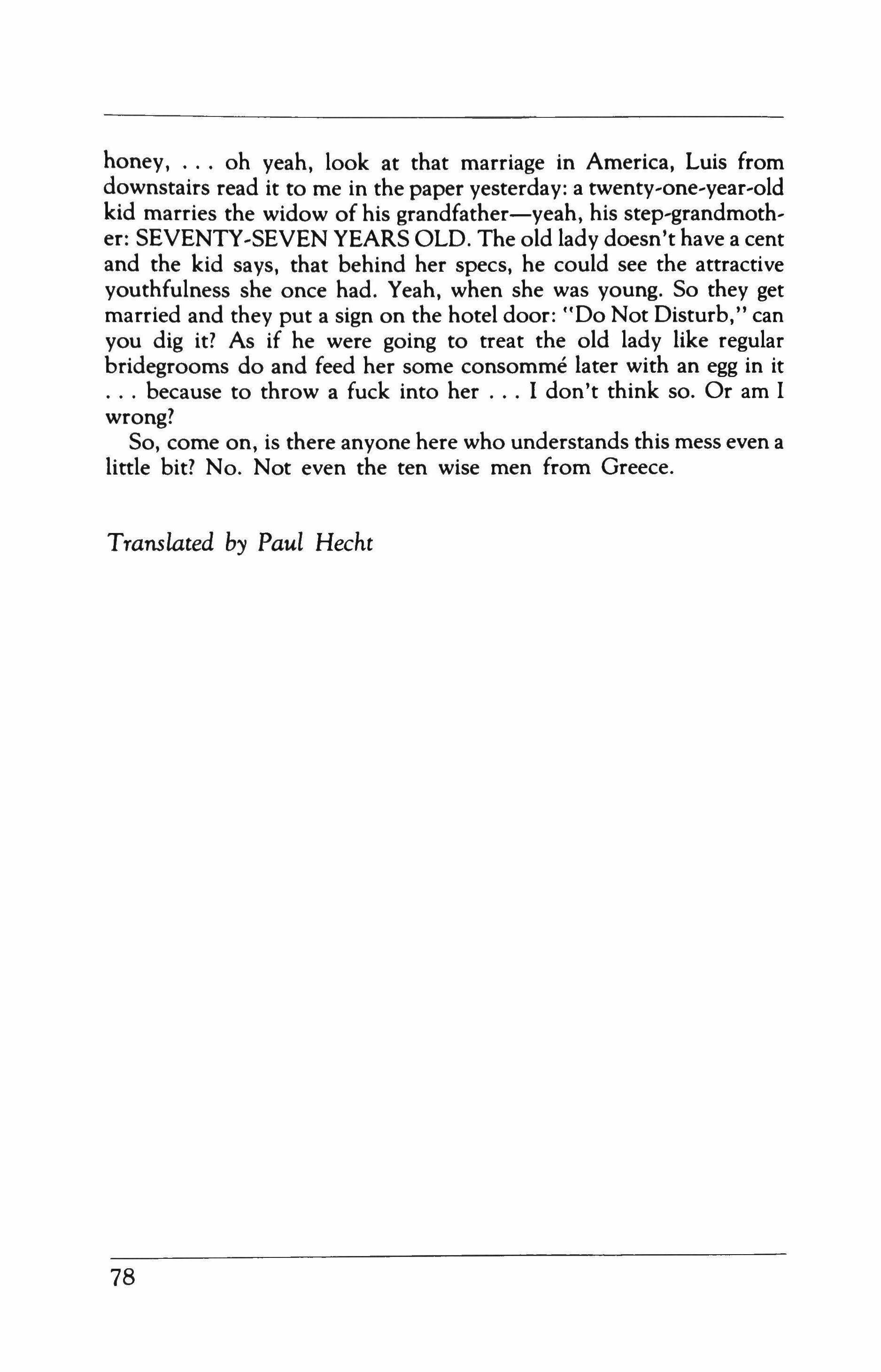
honey, oh yeah, look at that marriage in America, Luis from downstairs read it to me in the paper yesterday: a rwentv-one-vear-old kid marries the widow of his grandfather-yeah, his step-grandmother: SEVENTY,SEVEN YEARS OLD. The old lady doesn't have a cent and the kid says, that behind her specs, he could see the attractive youthfulness she once had. Yeah, when she was young. So they get married and they put a sign on the hotel door: "Do Not Disturb," can you dig it? As if he were going to treat the old lady like regular bridegrooms do and feed her some consomme later with an egg in it because to throw a fuck into her I don't think so. Or am I wrong?
So, come on, is there anyone here who understands this mess even a little bit? No. Not even the ten wise men from Greece.
Translated by Paul Hecht
78
Fables
Juan Benet
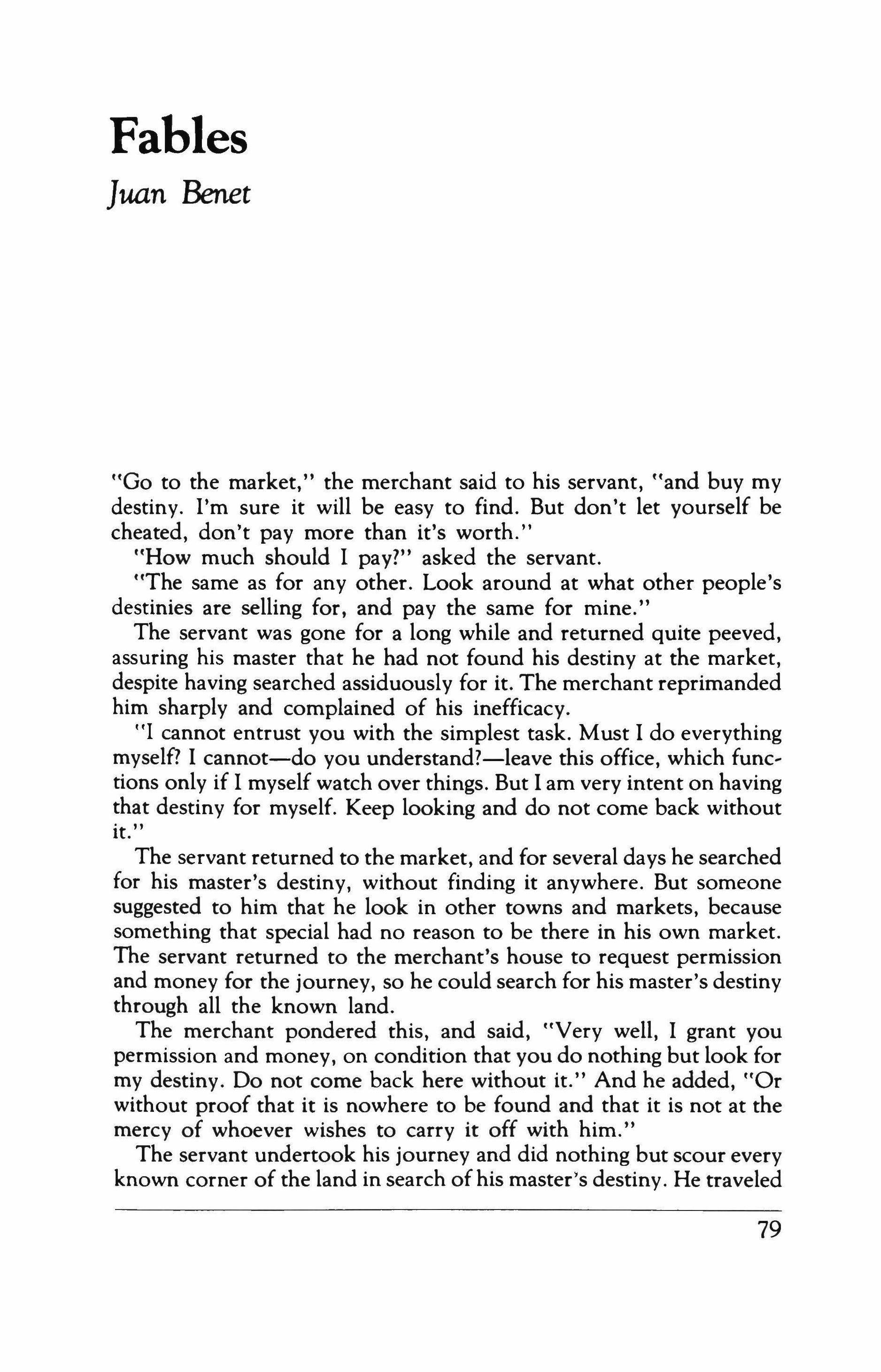
"Go to the market," the merchant said to his servant, "and buy my destiny. I'm sure it will be easy to find. But don't let yourself be cheated, don't pay more than it's worth."
"How much should I pay?" asked the servant.
"The same as for any other. Look around at what other people's destinies are selling for, and pay the same for mine."
The servant was gone for a long while and returned quite peeved, assuring his master that he had not found his destiny at the market, despite having searched assiduously for it. The merchant reprimanded him sharply and complained of his inefficacy.
"I cannot entrust you with the simplest task. Must I do everything myself? I cannot-do you understand?-leave this office, which functions only if I myself watch over things. But I am very intent on having that destiny for myself. Keep looking and do not come back without it.
The servant returned to the market, and for several days he searched for his master's destiny, without finding it anywhere. But someone suggested to him that he look in other towns and markets, because something that special had no reason to be there in his own market. The servant returned to the merchant's house to request permission and money for the journey, so he could search for his master's destiny through all the known land.
The merchant pondered this, and said, "Very well, I grant you permission and money, on condition that you do nothing but look for my destiny. Do not come back here without it." And he added, "Or without proof that it is nowhere to be found and that it is not at the mercy of whoever wishes to carry it off with him."
The servant undertook his journey and did nothing but scour every known corner of the land in search ofhis master's destiny. He traveled
79
through distant regions, and grew old, he lost his memory but, faithful still to his promise to his master, continued the task to which he had agreed. The merchant, too, grew old, and lost many of his faculties. One day the servant's constant peregrinations brought him to the offices of his master, whom he no longer recognized but whom he asked for help in his search.
"Given what you tell me," the merchant said, "I have something here that might suit you." And he showed him his own destiny.
"That's exactly what I want," replied the servant. "But I hope it's not too expensive. I have been searching for it for so many years that I have spent nearly all the money I had. All that's left is this-"
"That's enough, it's all right," replied the master. "I've had that piece of junk in the house my whole life, and no one was interested in it till now. You can take it, on condition that you tell me what you want it for."
"That I can't say, because I don't know. I have forgotten. I know quite well that I do need it, but I don't know why."
"It's yours, then," his old master answered. "It's about right for someone as forgetful as you. I think I remember someone forgetting it here. I can't think of a better destiny for it, than leaving it wrapped up in the forgetfulness of someone who needs it so."
And when the merchant saw his old servant drawing away with his destiny under one arm, he said to himself, "At last."

As he departed, he warned her, with a rather severe tone of voice"While I am away you must not visit Pertinax. Take special care not to do so, because otherwise you could bring us to great grief."
The woman remained in the house, obeying the instructions of her husband, who on his return questioned her concerning the persons she had seen in his absence.
"I saw Pertinax," she answered.
"Didn't I warn you not to go visit him?" he asked angrily.
"I didn't go visit him. It was he who came here, in your absence."
The husband went out in search of Pertinax and asked him, "By what right do you visit my wife in my absence?"
"I didn't go visit your wife," Pertinax replied, without losing his composure, "but to see you, since I did not know you were away from home. In the future, you must warn me of that, if you do not wish to cause once more this situation that mortifies you so."
Dissatisfied with this explanation, the husband conceived a scheme to test Pertinax's intentions, and to discover what sort of relations
* * *
80
existed between Pertinax and his wife. He sent her away from the house on some pretext or other, and disguising himself in her clothes, he sent a servant to Pertinax to inform him that, alone in the house, the wife hoped he would favor her with a visit.
But the wife, suspicious ofthe behavior of a husband whose manner was so inconsiderate and rash, and somewhat guessing his purpose, decided to return to her house disguised as Pertinax to play the role that she wished her husband to behold.
On his own account, Pertinax, noting that the wife was alone at home, contrary to the news he had heard, disguised himself as her husband, with the sole intention of discovering what sort of private relations they were that bound the two of them to each other.
Thus, when the false Pertinax-who was none other than the wiferepaired to her house to pay the visit to which she had been invited, she found herself with the couple already awaiting her, contrary to what she had expected.
The situation in which the three were caught was similar for each of them, since the three knew, each in his own turn, that at least one of the others was in disguise, without being able to determine which of them it was, nor even if the both of them were. In effect, anyone of them could reason thusly: If only one of them is disguised, that one must be disguised as me, since I am disguised as that one, and there, fore, the true one can only be the one as whom I am not disguised. Well, then, this one, who is not disguised, will have no reason to think that we two are, and therefore, not expecting any hoax, will not unmask it. And if, on the other hand, both of them are disguised, the one disguised as me is the one as whom I am not disguised and that one's identity cannot be confirmed one way or the other. Thus it is not possible to know who is disguised as whom, unless one-daring to reveal with what intentions the disguise was donned-goes ahead and discloses his true identity before the others do, something which is not very likely.
As a consequence-they must have thought, each in his turn-if we wish to protect our most intimate thoughts and intentions, we must go on in disguise forever-which, if each has chosen his disguise well, will not change things in the slightest.
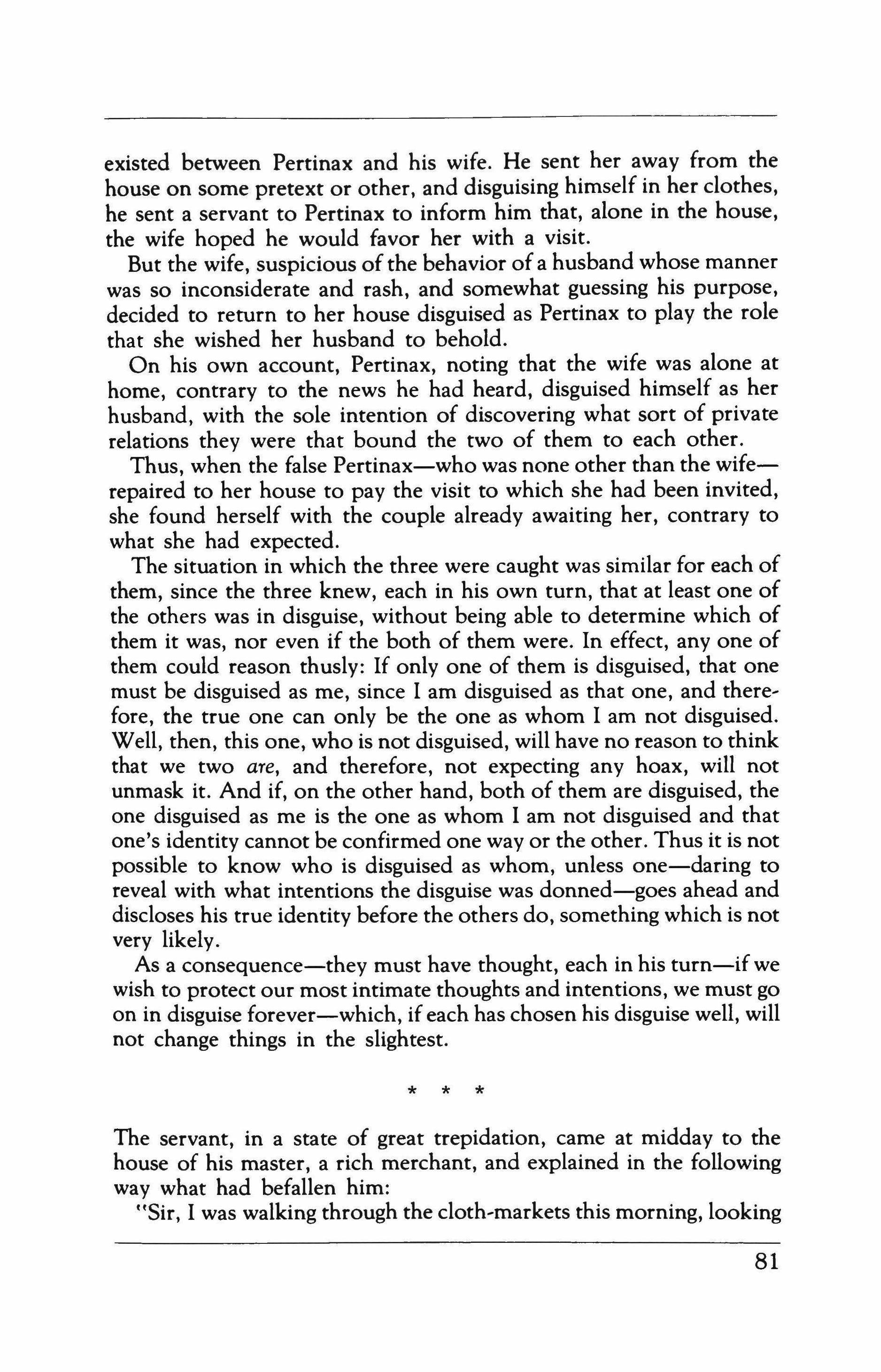
The servant, in a state of great trepidation, came at midday to the house of his master, a rich merchant, and explained in the following way what had befallen him:
"Sir, I was walking through the cloth-markets this morning, looking
* *
81
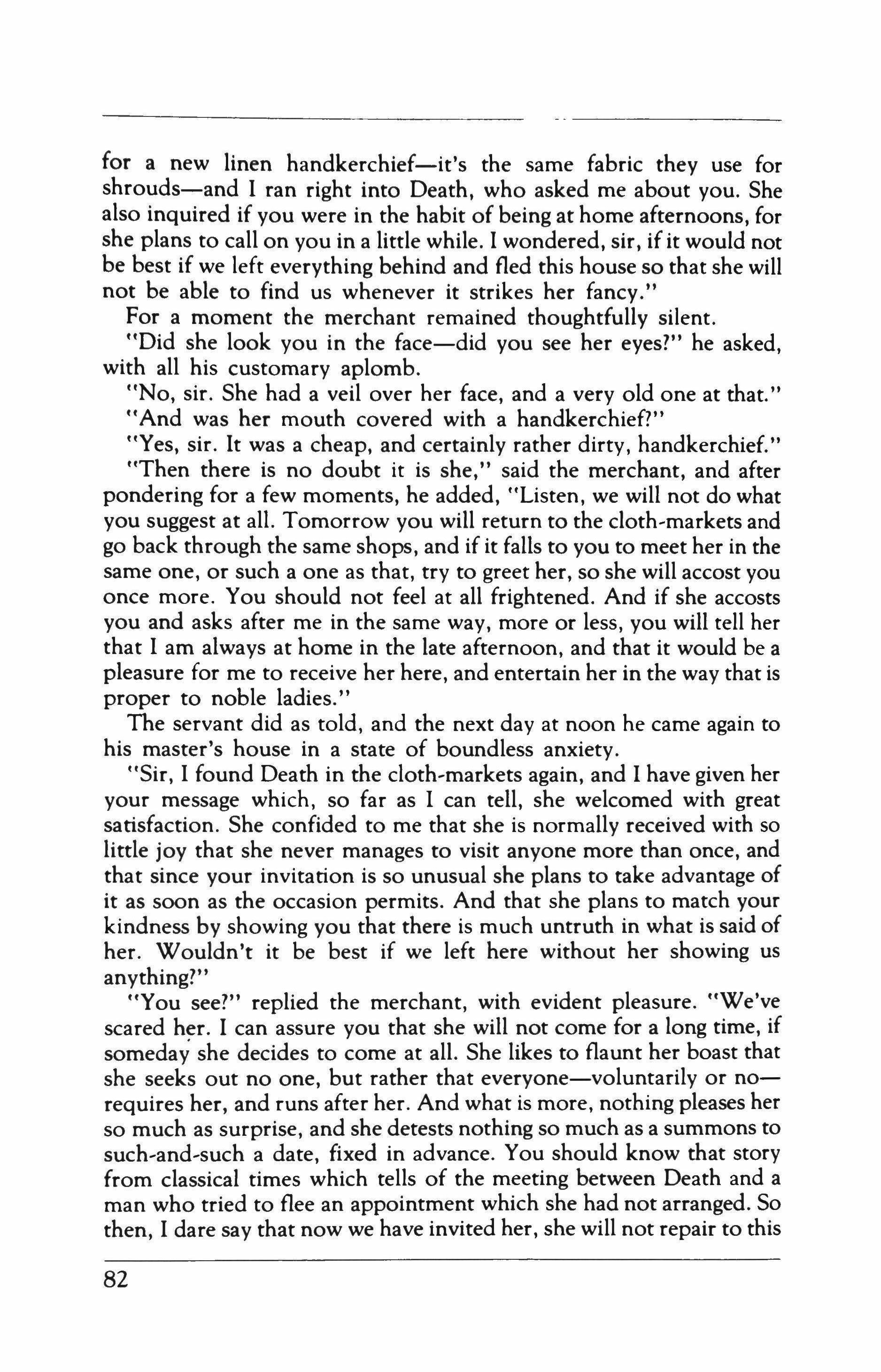
for a new linen handkerchief-it's the same fabric they use for shrouds-and I ran right into Death, who asked me about you. She also inquired if you were in the habit of being at home afternoons, for she plans to call on you in a little while. I wondered, sir, if it would not be best if we left everything behind and fled this house so that she will not be able to find us whenever it strikes her fancy."
For a moment the merchant remained thoughtfully silent.
"Did she look you in the face-did you see her eyes?" he asked, with all his customary aplomb.
"No, sir. She had a veil over her face, and a very old one at that."
"And was her mouth covered with a handkerchief?"
"Yes, sir. It was a cheap, and certainly rather dirty, handkerchief."
"Then there is no doubt it is she," said the merchant, and after pondering for a few moments, he added, "Listen, we will not do what you suggest at all. Tomorrow you will return to the cloth-markers and go back through the same shops, and if it falls to you to meet her in the same one, or such a one as that, try to greet her, so she will accost you once more. You should not feel at all frightened. And if she accosts you and asks after me in the same way, more or less, you will tell her that I am always at home in the late afternoon, and that it would be a pleasure for me to receive her here, and entertain her in the way that is proper to noble ladies."
The servant did as told, and the next day at noon he came again to his master's house in a state of boundless anxiety.
"Sir, I found Death in the cloth-markets again, and I have given her your message which, so far as I can tell, she welcomed with great satisfaction. She confided to me that she is normally received with so little joy that she never manages to visit anyone more than once, and that since your invitation is so unusual she plans to take advantage of it as soon as the occasion permits. And that she plans to match your kindness by showing you that there is much untruth in what is said of her. Wouldn't it be best if we left here without her showing us anything?"
"You see?" replied the merchant, with evident pleasure. "We've scared her. I can assure you that she will not come for a long time, if someday she decides to come at all. She likes to flaunt her boast that she seeks out no one, but rather that everyone-voluntarily or norequires her, and runs after her. And what is more, nothing pleases her so much as surprise, and she detests nothing so much as a summons to such-and-such a date, fixed in advance. You should know that story from classical times which tells of the meeting between Death and a man who tried to flee an appointment which she had not arranged. So then, I dare say that now we have invited her, she will not repair to this
82
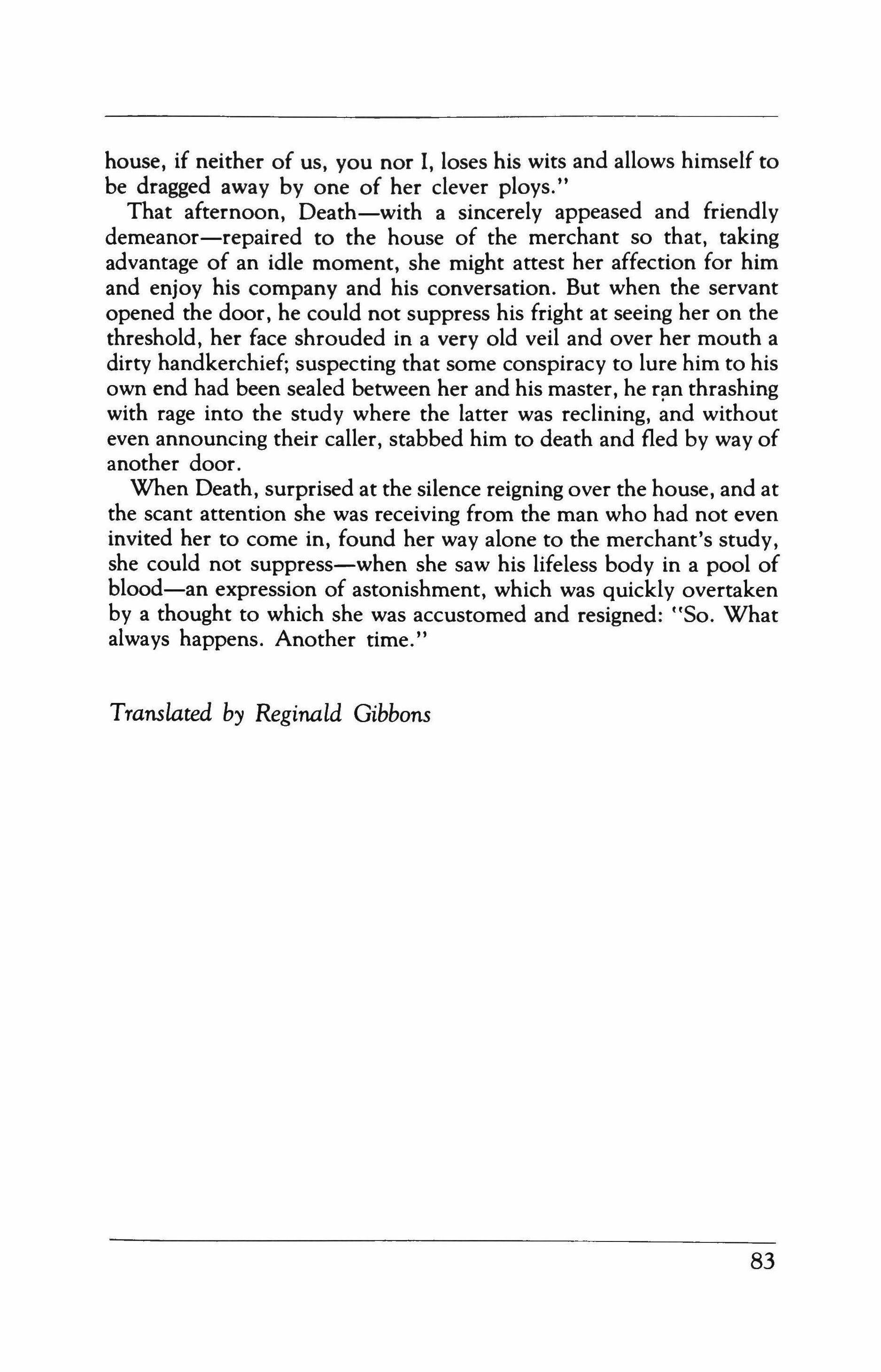
house, if neither of us, you nor I, loses his wits and allows himself to be dragged away by one of her clever ploys."
That afternoon, Death-with a sincerely appeased and friendly demeanor-repaired to the house of the merchant so that, taking advantage of an idle moment, she might attest her affection for him and enjoy his company and his conversation. But when the servant opened the door, he could not suppress his fright at seeing her on the threshold, her face shrouded in a very old veil and over her mouth a dirty handkerchief; suspecting that some conspiracy to lure him to his own end had been sealed between her and his master, he qm thrashing with rage into the study where the latter was reclining, and without even announcing their caller, stabbed him to death and fled by way of another door.
When Death, surprised at the silence reigning over the house, and at the scant attention she was receiving from the man who had not even invited her to come in, found her way alone to the merchant's study, she could not suppress-when she saw his lifeless body in a pool of blood-an expression of astonishment, which was quickly overtaken by a thought to which she was accustomed and resigned: "So. What always happens. Another time."
Translated by Reginald Gibbons
83
Two columns from Chatting with Troylol
Antonio Gala

Spaniards without policemen
The other day I swatted a kid who pulled your tail just because he thought that no one was watching. I didn't spank him so much for pulling your tail (perhaps I could have given him a lecture on universal brotherhood, or I could have pulled his tail so he would know what it felt like) as because it outrages me to see something done by stealth that should not be done at all. You and I have spoken of this on more than one occasion. Laws of morality-morality in the broadest sense-do not depend on the presence of spectators. Furthermore, I believe the infraction is even more serious, at least in my eyes, when it is committed with the assurance of avoiding punishment. Breaking the law because there is no risk makes me sick, as I suppose it does you, Troylo. You don't know how to sin sneakily. All your peccadillos, before or after they are committed, are discovered. They all have your signature. You are naked in body and soul, as they say man is in the eyes of God. Thus, with your good nose for everything, you have nothing against justice, and practically ask for your bad actions to be sanctioned beforehand. (It's enough to see the anguished way you approach me when I come home and you know you have something to feel guilty about.) For that same reason, perhaps, you're not wild about children: you find them irritating, arbitrary, selfish, fickle, hell, raising and unpredictable.
Unfortunately, Troylo, I must confess to you that adult Spaniards are no different. It is evident that too many years under a paternalistic government and a foolish and wordy system of education, based on threats, has kept us all minors. We are people who, if there are no guards in sight, pick flowers in public parks, or shoplift in big depart' ment stores, or jaywalk, or roar through stop signs like a matador, or
84
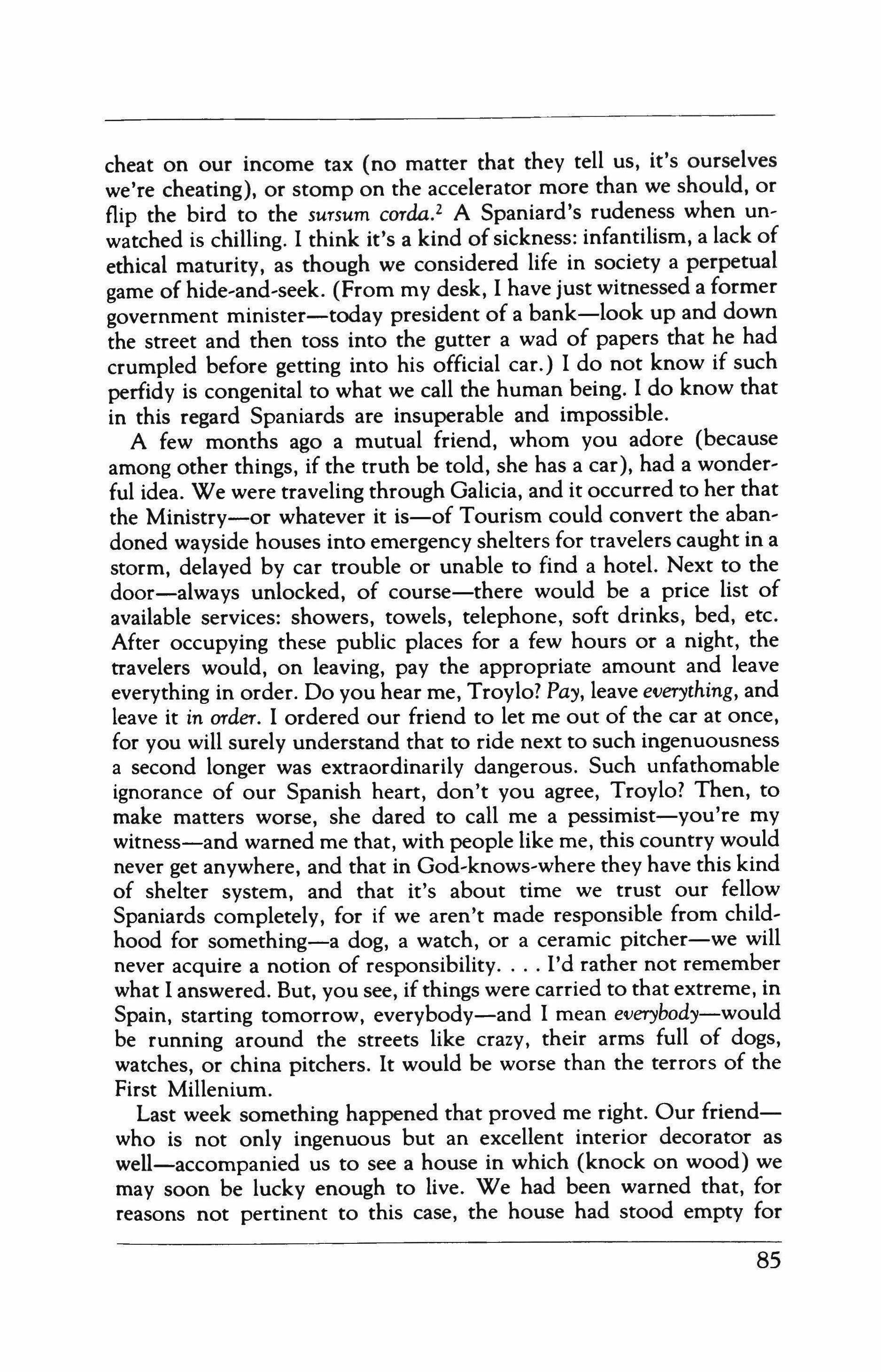
cheat on our income tax (no matter that they tell us, it's ourselves we're cheating), or stomp on the accelerator more than we should, or flip the bird to the sursum corda.2 A Spaniard's rudeness when unwatched is chilling. I think it's a kind of sickness: infantilism, a lack of ethical maturity, as though we considered life in society a perpetual game of hide-and-seek. (From my desk, I have just witnessed a former government minister-today president of a bank-look up and down the street and then toss into the gutter a wad of papers that he had crumpled before getting into his official car.) I do not know if such perfidy is congenital to what we call the human being. I do know that in this regard Spaniards are insuperable and impossible.
A few months ago a mutual friend, whom you adore (because among other things, if the truth be told, she has a car), had a wonderful idea. We were traveling through Galicia, and it occurred to her that the Ministry-or whatever it is-of Tourism could convert the abandoned wayside houses into emergency shelters for travelers caught in a storm, delayed by car trouble or unable to find a hotel. Next to the door-always unlocked, of course-there would be a price list of available services: showers, towels, telephone, soft drinks, bed, etc. After occupying these public places for a few hours or a night, the travelers would, on leaving, pay the appropriate amount and leave everything in order. Do you hear me, Troylo? Pay, leave everything, and leave it in order. I ordered our friend to let me out of the car at once, for you will surely understand that to ride next to such ingenuousness a second longer was extraordinarily dangerous. Such unfathomable ignorance of our Spanish heart, don't you agree, Troylo? Then, to make matters worse, she dared to call me a pessimist-you're my witness-and warned me that, with people like me, this country would never get anywhere, and that in God-knows-where they have this kind of shelter system, and that it's about time we trust our fellow Spaniards completely, for if we aren't made responsible from childhood for something-a dog, a watch, or a ceramic pitcher-we will never acquire a notion of responsibility I'd rather not remember what I answered. But, you see, if things were carried to that extreme, in Spain, starting tomorrow, everybody-and I mean everybody-would be running around the streets like crazy, their arms full of dogs, watches, or china pitchers. It would be worse than the terrors of the First Millenium.
Last week something happened that proved me right. Our friendwho is not only ingenuous but an excellent interior decorator as well-accompanied us to see a house in which (knock on wood) we may soon be lucky enough to live. We had been warned that, for reasons not pertinent to this case, the house had stood empty for
85
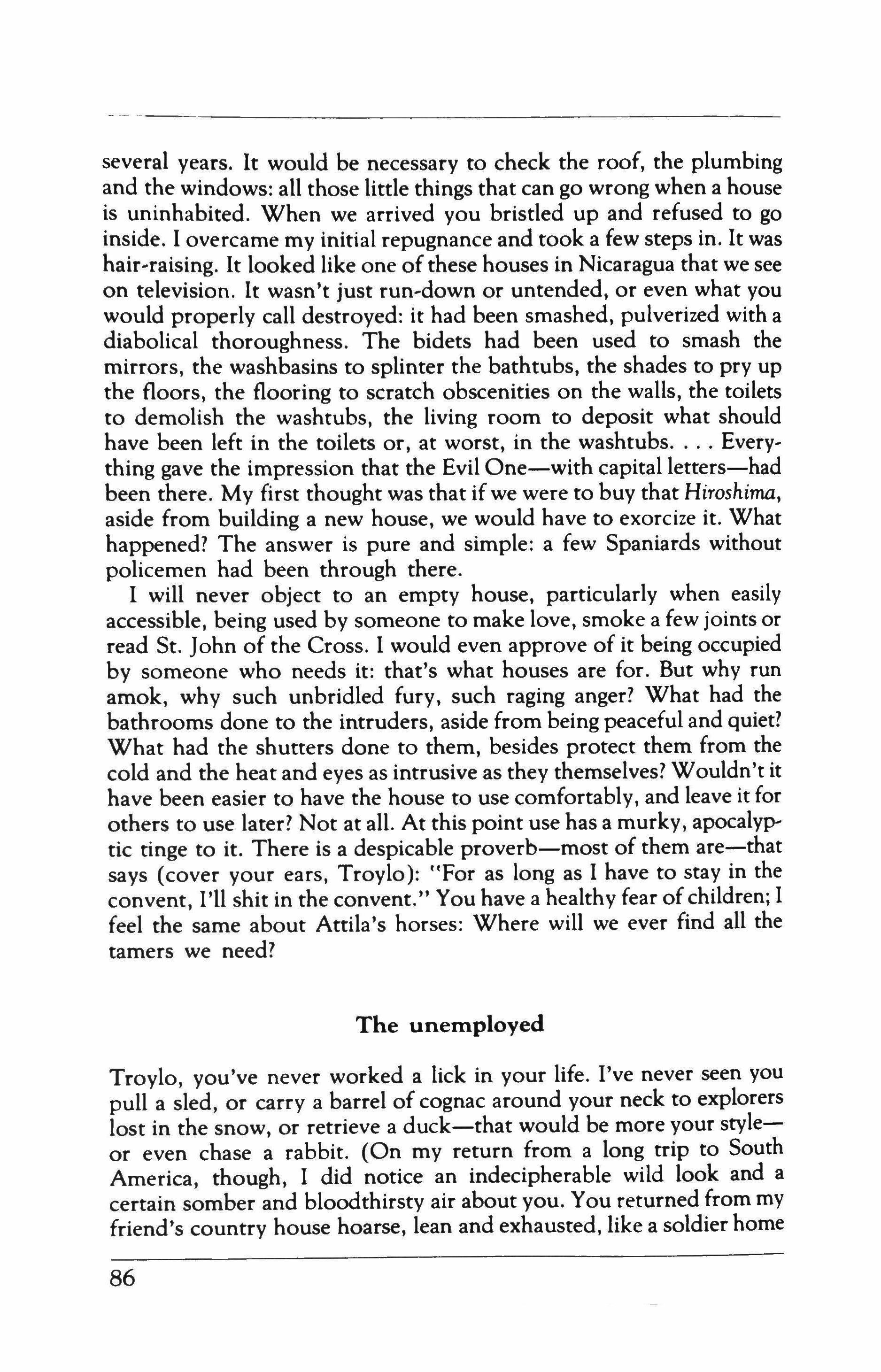
several years. It would be necessary to check the roof, the plumbing and the windows: all those little things that can go wrong when a house is uninhabited. When we arrived you bristled up and refused to go inside. I overcame my initial repugnance and took a few steps in. It was hair-raising. It looked like one of these houses in Nicaragua that we see on television. It wasn't just run-down or untended, or even what you would properly call destroyed: it had been smashed, pulverized with a diabolical thoroughness. The bidets had been used to smash the mirrors, the washbasins to splinter the bathtubs, the shades to pry up the floors, the flooring to scratch obscenities on the walls, the toilets to demolish the washtubs, the living room to deposit what should have been left in the toilets or, at worst, in the washtubs Everything gave the impression that the Evil One-with capital letters-had been there. My first thought was that if we were to buy that Hiroshima, aside from building a new house, we would have to exorcize it. What happened? The answer is pure and simple: a few Spaniards without policemen had been through there.
I will never object to an empty house, particularly when easily accessible, being used by someone to make love, smoke a few joints or read St. John of the Cross. I would even approve of it being occupied by someone who needs it: that's what houses are for. But why run amok, why such unbridled fury, such raging anger? What had the bathrooms done to the intruders, aside from being peaceful and quiet? What had the shutters done to them, besides protect them from the cold and the heat and eyes as intrusive as they themselves? Wouldn't it have been easier to have the house to use comfortably, and leave it for others to use later? Not at all. At this point use has a murky, apocalyptic tinge to it. There is a despicable proverb-most of them are-that says (cover your ears, Troylo): "For as long as I have to stay in the convent, I'll shit in the convent." You have a healthy fear of children; I feel the same about Attila's horses: Where will we ever find all the tamers we need?
The unemployed
Troylo, you've never worked a lick in your life. I've never seen you pull a sled, or carry a barrel of cognac around your neck to explorers lost in the snow, or retrieve a duck-that would be more your styleor even chase a rabbit. (On my return from a long trip to South America, though, I did notice an indecipherable wild look and a certain somber and bloodthirsty air about you. You returned from my friend's country house hoarse, lean and exhausted, like a soldier home
86
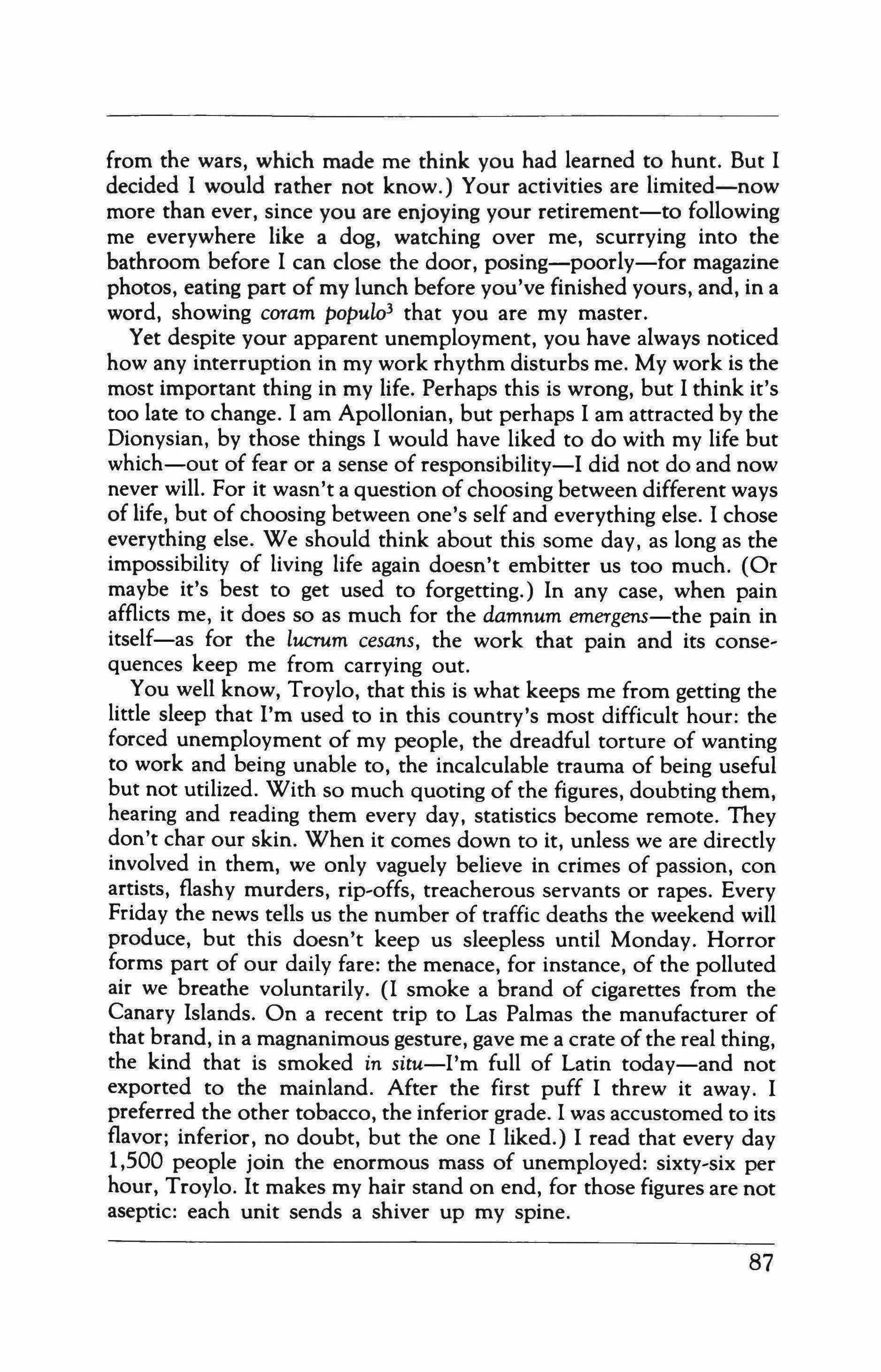
from the wars, which made me think you had learned to hunt. But I decided I would rather not know.) Your activities are limited-now more than ever, since you are enjoying your retirement-to following me everywhere like a dog, watching over me, scurrying into the bathroom before I can close the door, posing-poorly-for magazine photos, eating part of my lunch before you've finished yours, and, in a word, showing coram populo3 that you are my master.
Yet despite your apparent unemployment, you have always noticed how any interruption in my work rhythm disturbs me. My work is the most important thing in my life. Perhaps this is wrong, but I think it's too late to change. I am Apollonian, but perhaps I am attracted by the Dionysian, by those things I would have liked to do with my life but which-out of fear or a sense of responsibility-I did not do and now never will. For it wasn't a question of choosing between different ways of life, but of choosing between one's self and everything else. I chose everything else. We should think about this some day, as long as the impossibility of living life again doesn't embitter us too much. (Or maybe it's best to get used to forgetting.) In any case, when pain afflicts me, it does so as much for the damnum emergens-the pain in itself-as for the lucrum cesans, the work that pain and its consequences keep me from carrying out.
You well know, Trovlo, that this is what keeps me from getting the little sleep that I'm used to in this country's most difficult hour: the forced unemployment of my people, the dreadful torture of wanting to work and being unable to, the incalculable trauma of being useful but not utilized. With so much quoting of the figures, doubting them, hearing and reading them every day, statistics become remote. They don't char our skin. When it comes down to it, unless we are directly involved in them, we only vaguely believe in crimes of passion, con artists, flashy murders, rip-offs, treacherous servants or rapes. Every Friday the news tells us the number of traffic deaths the weekend will produce, but this doesn't keep us sleepless until Monday. Horror forms part of our daily fare: the menace, for instance, of the polluted air we breathe voluntarily. (l smoke a brand of cigarettes from the Canary Islands. On a recent trip to Las Palmas the manufacturer of that brand, in a magnanimous gesture, gave me a crate of the real thing, the kind that is smoked in situ-I'm full of Latin today-and not exported to the mainland. After the first puff I threw it away. I preferred the other tobacco, the inferior grade. I was accustomed to its flavor; inferior, no doubt, but the one I liked.) I read that every day 1,500 people join the enormous mass of unemployed: sixty-six per hour, Troylo. It makes my hair stand on end, for those figures are not aseptic: each unit sends a shiver up my spine.
87
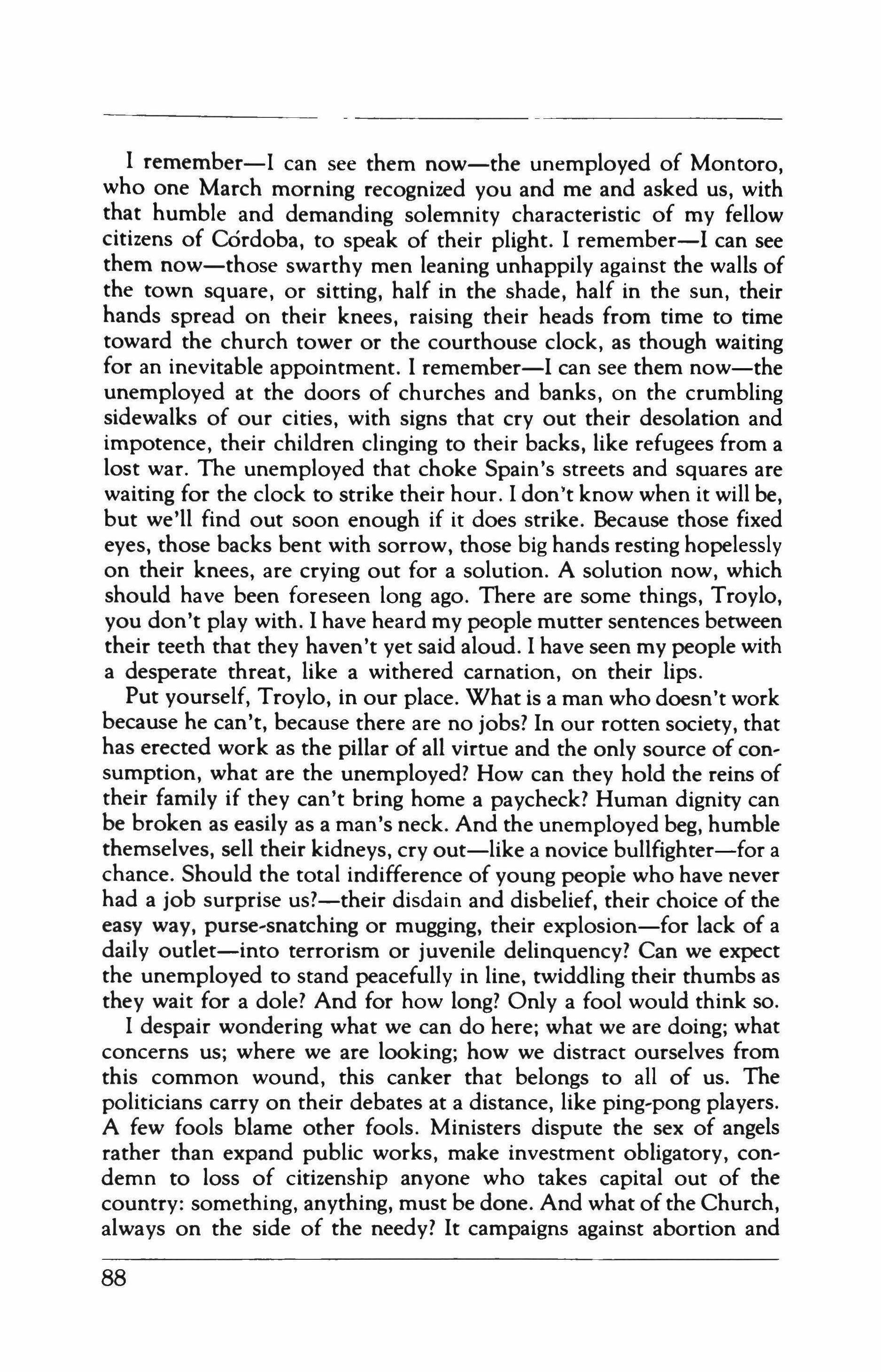
I remember-I can see them now-the unemployed of Montoro, who one March morning recognized you and me and asked us, with that humble and demanding solemnity characteristic of my fellow citizens of COrdoba, to speak of their plight. I remember-I can see them now-those swarthy men leaning unhappily against the walls of the town square, or sitting, half in the shade, half in the sun, their hands spread on their knees, raising their heads from time to time toward the church tower or the courthouse clock, as though waiting for an inevitable appointment. I remember-I can see them now-the unemployed at the doors of churches and banks, on the crumbling sidewalks of our cities, with signs that cry out their desolation and impotence, their children clinging to their backs, like refugees from a lost war. The unemployed that choke Spain's streets and squares are waiting for the clock to strike their hour. I don't know when it will be, but we'll find out soon enough if it does strike. Because those fixed eyes, those backs bent with sorrow, those big hands resting hopelessly on their knees, are crying out for a solution. A solution now, which should have been foreseen long ago. There are some things, Troylo, you don't play with. I have heard my people mutter sentences between their teeth that they haven't yet said aloud. I have seen my people with a desperate threat, like a withered carnation, on their lips.
Put yourself, Troylo, in our place. What is a man who doesn't work because he can't, because there are no jobs? In our rotten society, that has erected work as the pillar of all virtue and the only source of consumption, what are the unemployed? How can they hold the reins of their family if they can't bring home a paycheck? Human dignity can be broken as easily as a man's neck. And the unemployed beg, humble themselves, sell their kidneys, cry out-like a novice bullfighter-for a chance. Should the total indifference of young people who have never had a job surprise us?-their disdain and disbelief, their choice of the easy way, purse-snatching or mugging, their explosion-for lack of a daily outlet-into terrorism or juvenile delinquency? Can we expect the unemployed to stand peacefully in line, twiddling their thumbs as they wait for a dole? And for how long? Only a fool would think so.
I despair wondering what we can do here; what we are doing; what concerns us; where we are looking; how we distract ourselves from this common wound, this canker that belongs to all of us. The politicians carryon their debates at a distance, like ping-pong players. A few fools blame other fools. Ministers dispute the sex of angels rather than expand public works, make investment obligatory, condemn to loss of citizenship anyone who takes capital out of the country: something, anything, must be done. And what of the Church, always on the side of the needy? It campaigns against abortion and
88
divorce, or defends its control over the schools. But what is it doing to solve the most serious problem? For unemployment is not just an economic or even political problem, but a moral problem, a question of human solidarity. A problem that affects all of us: from the King down, all of us. This is the first thing that must be resolved (primum vivere,4 to round things off in Latin). We are doing nothing, we are resolving nothing, the hunger that surrounds us does not move us. We are all chattering, sordid and dispersed, Troylo. The terrifying number of our unemployed must make us understand that Spain, as a unity, does not yet exist.

1. The pretext of the columns is the writer's speaking to his dog, Troylo. The columns were published from 1979 to 1981, then collected in book form. Gala stopped writing them when Troylo died.
2. Words in the Catholic mass signifying "lift up your hearts, elevate your thinking."
3. Before the multitude.
4. Primum "ivere, deinde philosophari-first live, then philosophize.
Translated by Anthony L. Geist
89
The aunt, her nephews, the ticket girl and the punk
Juan Benet

For years he had accompanied his aunt on Thursday evenings to the movies, to the double features. Her husband played cards with the boys on Thursdays, and aunt and nephew would go out for a bite to eat and a picture. Following a half-hour discussion of the movie page, they always wound up, aunt and nephew, at the same local theaters, at seven-thirty in the evening. after a cup of cafe con leche and some meat pies. They would usually see each picture three or four times due to schedule overlaps, his aunt's spotty memory and the close similarity of titles. His aunt-an avid movie fan from the time she was little, thanks to a father who welcomed all technical progress-lamented their decadence and longed for the actors and actresses of the good old days, those sagas of passion. They all seemed alike to her nowadays, never stopping to consider that they were always the same ones. During intermission they gulped down an ice-cream bar, and when they were finished, after delicately depositing the stick wrapped in silver foil on the floor, she told him adventures from her youth. "Your aunt," she would say, bending her face down close in confidence and patting him on the knee, "almost made it to Hollywood." In the early days, when half an hour into the picture the inevitable first kiss started looming-usually on a garden bench or in front of a fireplace-his aunt would order him, "Run along, now; scram," and the nephew would find himself obliged to leave the theater and retire to the lobby, from which he would come back five or ten minutes later, after smoking a cigarette with the usher. At first he opted to watch this scene from a seat in the last row-they liked to sit down front, aunt and nephew-but as time went by, due to the numerous repetitions, he preferred the company of the usher, the boy who sold ice cream and the ticket girl in the booth, returning to his aunt's side just in time for the happily-ever-after strings and the camera panning back from the radiant horizon. The ticket girl-an excellent creature in every
90
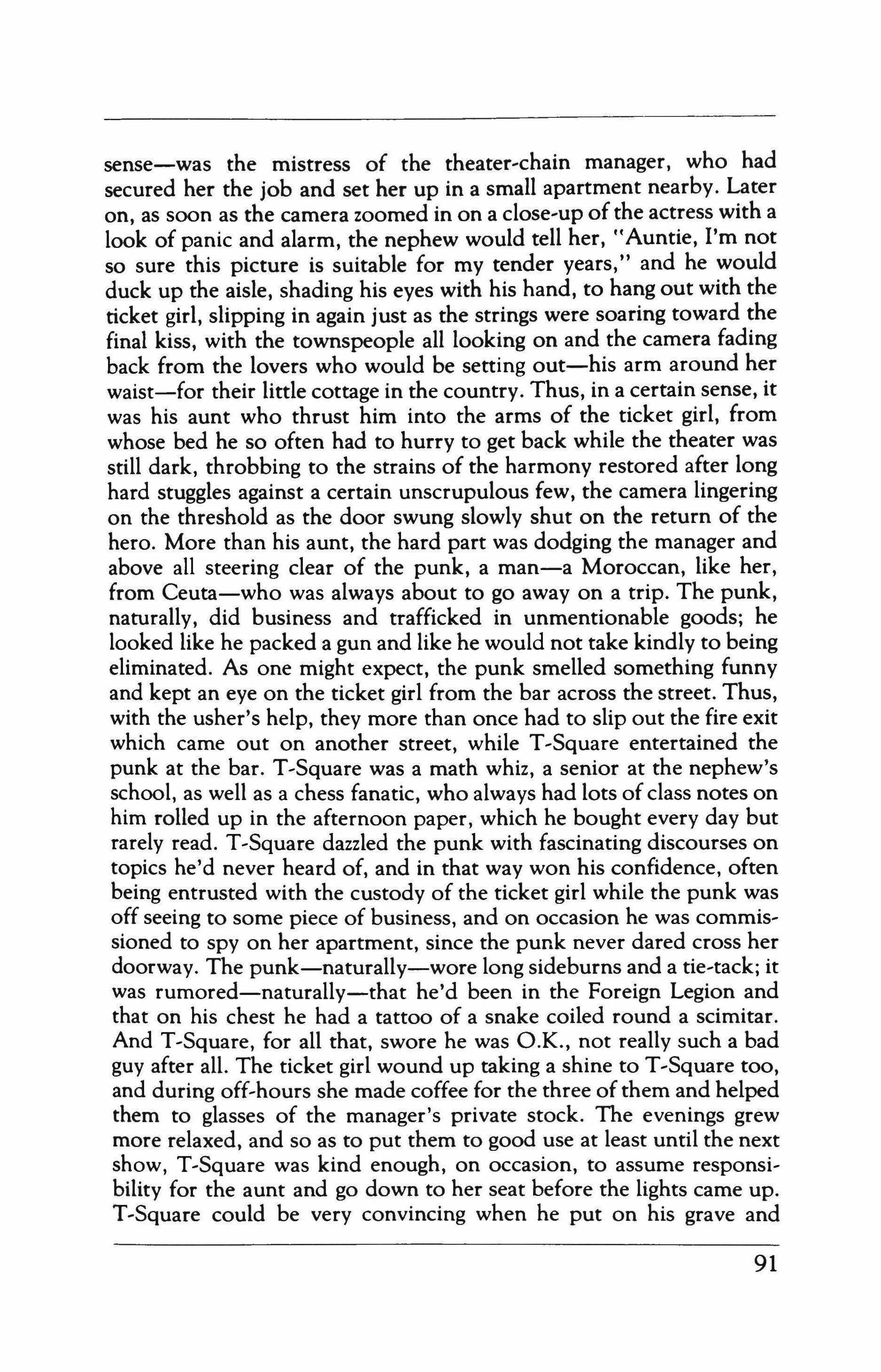
sense-was the mistress of the theater-chain manager, who had secured her the job and set her up in a small apartment nearby. Later on, as soon as the camera zoomed in on a close-up ofthe actress with a look of panic and alarm, the nephew would tell her, "Auntie, I'm not so sure this picture is suitable for my tender years," and he would duck up the aisle, shading his eyes with his hand, to hang out with the ticket girl, slipping in again just as the strings were soaring toward the final kiss, with the townspeople all looking on and the camera fading back from the lovers who would be setting out-his arm around her waist-for their little cottage in the country. Thus, in a certain sense, it was his aunt who thrust him into the arms of the ticket girl, from whose bed he so often had to hurry to get back while the theater was still dark, throbbing to the strains of the harmony restored after long hard stuggles against a certain unscrupulous few, the camera lingering on the threshold as the door swung slowly shut on the return of the hero. More than his aunt, the hard part was dodging the manager and above all steering clear of the punk, a man-a Moroccan, like her, from Ceuta-who was always about to go away on a trip. The punk, naturally, did business and trafficked in unmentionable goods; he looked like he packed a gun and like he would not take kindly to being eliminated. As one might expect, the punk smelled something funny and kept an eye on the ticket girl from the bar across the street. Thus, with the usher's help, they more than once had to slip out the fire exit which came out on another street, while T,Square entertained the punk at the bar. T,Square was a math whiz, a senior at the nephew's school, as well as a chess fanatic, who always had lots of class notes on him rolled up in the afternoon paper, which he bought every day but rarely read. T,Square dazzled the punk with fascinating discourses on topics he'd never heard of, and in that way won his confidence, often being entrusted with the custody of the ticket girl while the punk was off seeing to some piece of business, and on occasion he was cornmissioned to spy on her apartment, since the punk never dared cross her doorway. The punk-naturally-wore long sideburns and a tie-tack; it was rumored-naturally-that he'd been in the Foreign Legion and that on his chest he had a tattoo of a snake coiled round a scimitar. And T,Square, for all that, swore he was O.K., not really such a bad guy after all. The ticket girl wound up taking a shine to T,Square too, and during off-hours she made coffee for the three of them and helped them to glasses of the manager's private stock. The evenings grew more relaxed, and so as to put them to good use at least until the next show, T,Square was kind enough, on occasion, to assume responsibility for the aunt and go down to her seat before the lights came up. T,Square could be very convincing when he put on his grave and
91
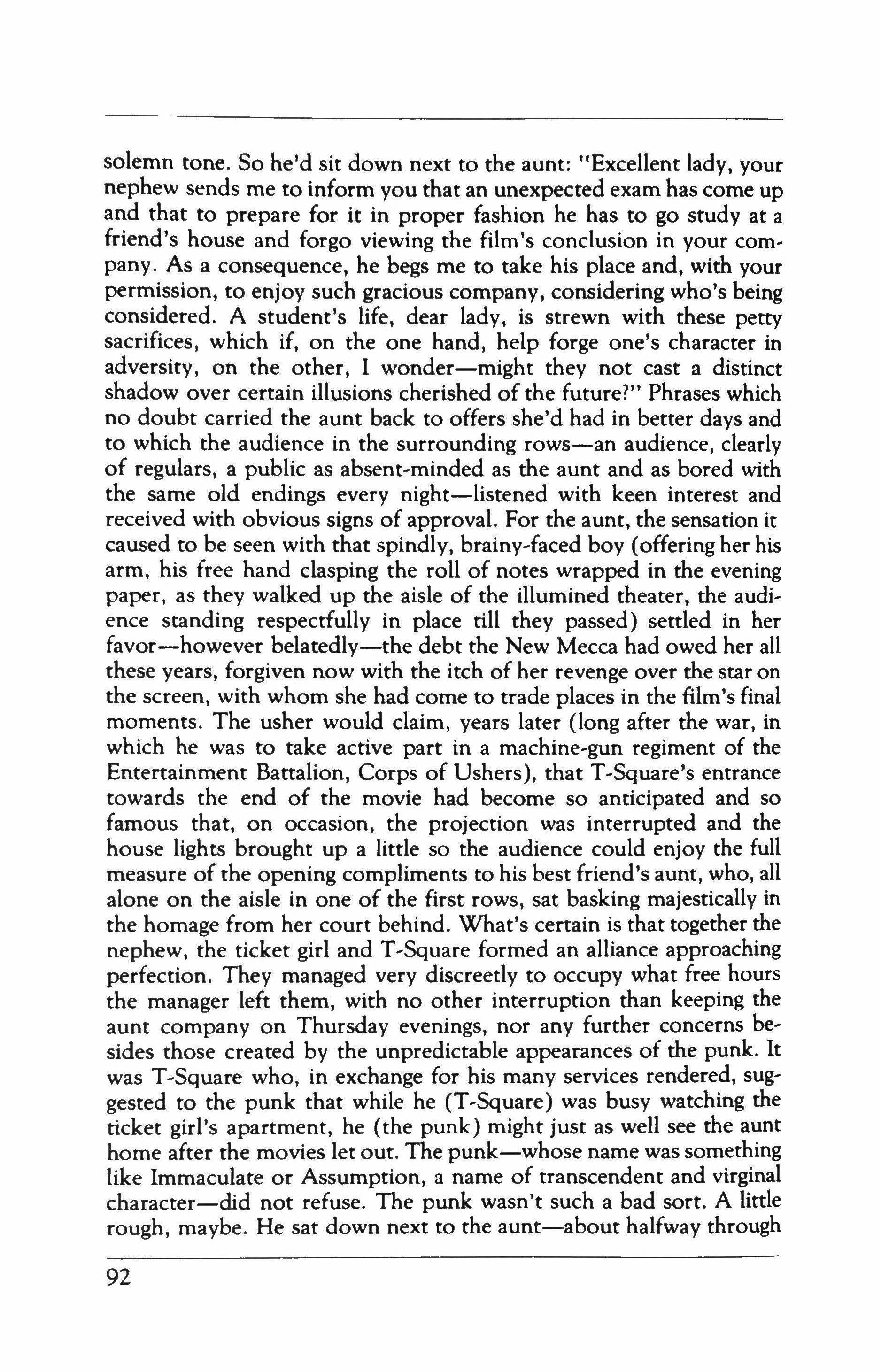
solemn tone. So he'd sit down next to the aunt: "Excellent lady, your nephew sends me to inform you that an unexpected exam has come up and that to prepare for it in proper fashion he has to go study at a friend's house and forgo viewing the film's conclusion in your cornpany. As a consequence, he begs me to take his place and, with your permission, to enjoy such gracious company, considering who's being considered. A student's life, dear lady, is strewn with these petty sacrifices, which if, on the one hand, help forge one's character in adversity, on the other, I wonder-might they not cast a distinct shadow over certain illusions cherished of the future?" Phrases which no doubt carried the aunt back to offers she'd had in better days and to which the audience in the surrounding rows-an audience, clearly of regulars, a public as absent-minded as the aunt and as bored with the same old endings every night-listened with keen interest and received with obvious signs of approval. For the aunt, the sensation it caused to be seen with that spindly, brainy-faced boy (offering her his arm, his free hand clasping the roll of notes wrapped in the evening paper, as they walked up the aisle of the illumined theater, the audience standing respectfully in place till they passed) settled in her favor-however belatedly-the debt the New Mecca had owed her all these years, forgiven now with the itch of her revenge over the star on the screen, with whom she had come to trade places in the film's final moments. The usher would claim, years later (long after the war, in which he was to take active part in a machine-gun regiment of the Entertainment Battalion, Corps of Ushers), that T-Square's entrance towards the end of the movie had become so anticipated and so famous that, on occasion, the projection was interrupted and the house lights brought up a little so the audience could enjoy the full measure of the opening compliments to his best friend's aunt, who, all alone on the aisle in one of the first rows, sat basking majestically in the homage from her court behind. What's certain is that together the nephew, the ticket girl and T-Square formed an alliance approaching perfection. They managed very discreetly to occupy what free hours the manager left them, with no other interruption than keeping the aunt company on Thursday evenings, nor any further concerns besides those created by the unpredictable appearances of the punk. It was T-Square who, in exchange for his many services rendered, suggested to the punk that while he (T�Square) was busy watching the ticket girl's apartment, he (the punk) might just as well see the aunt home after the movies let out. The punk-whose name was something like Immaculate or Assumption, a name of transcendent and virginal character-did not refuse. The punk wasn't such a bad sort. A little rough, maybe. He sat down next to the aunt-about halfway through
92
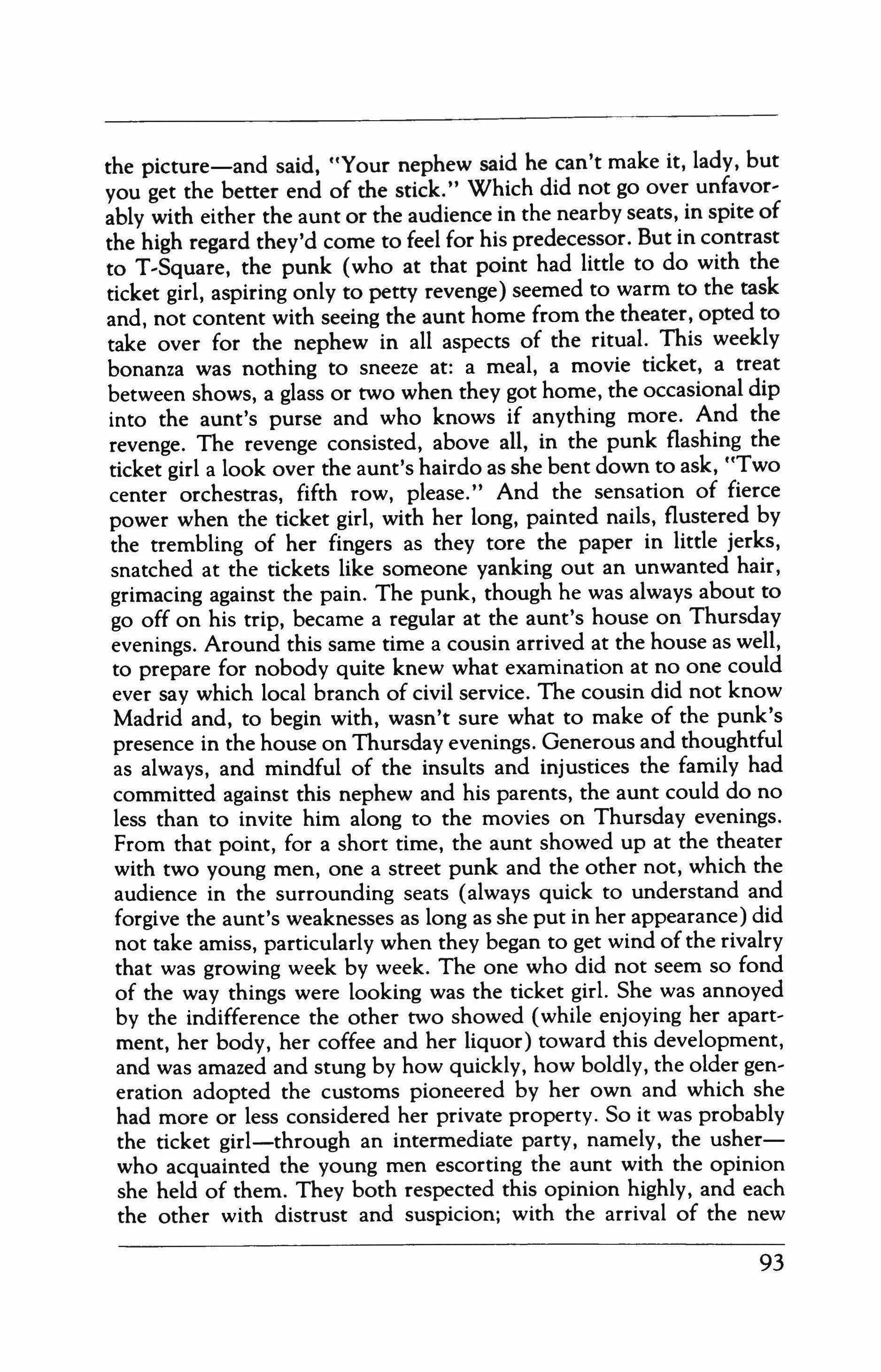
the picture-and said, "Your nephew said he can't make it, lady, but you get the better end of the stick." Which did not go over unfavorably with either the aunt or the audience in the nearby seats, in spite of the high regard they'd come to feel for his predecessor. But in contrast to T-Square, the punk (who at that point had little to do with the ticket girl, aspiring only to petty revenge) seemed to warm to the task and, not content with seeing the aunt home from the theater, opted to take over for the nephew in all aspects of the ritual. This weekly bonanza was nothing to sneeze at: a meal, a movie ticket, a treat between shows, a glass or two when they got home, the occasional dip into the aunt's purse and who knows if anything more. And the revenge. The revenge consisted, above all, in the punk flashing the ticket girl a look over the aunt's hairdo as she bent down to ask, "Two center orchestras, fifth row, please." And the sensation of fierce power when the ticket girl, with her long, painted nails, flustered by the trembling of her fingers as they tore the paper in little jerks, snatched at the tickets like someone yanking out an unwanted hair, grimacing against the pain. The punk, though he was always about to go off on his trip, became a regular at the aunt's house on Thursday evenings. Around this same time a cousin arrived at the house as well, to prepare for nobody quite knew what examination at no one could ever say which local branch of civil service. The cousin did not know Madrid and, to begin with, wasn't sure what to make of the punk's presence in the house on Thursday evenings. Generous and thoughtful as always, and mindful of the insults and injustices the family had committed against this nephew and his parents, the aunt could do no less than to invite him along to the movies on Thursday evenings. From that point, for a short time, the aunt showed up at the theater with two young men, one a street punk and the other not, which the audience in the surrounding seats (always quick to understand and forgive the aunt's weaknesses as long as she put in her appearance) did not take amiss, particularly when they began to get wind of the rivalry that was growing week by week. The one who did not seem so fond of the way things were looking was the ticket girl. She was annoyed by the indifference the other two showed (while enjoying her apart, ment, her body, her coffee and her liquor) toward this development, and was amazed and stung by how quickly, how boldly, the older generation adopted the customs pioneered by her own and which she had more or less considered her private property. So it was probably the ticket girl-through an intermediate party, namely, the usherwho acquainted the young men escorting the aunt with the opinion she held of them. They both respected this opinion highly, and each the other with distrust and suspicion; with the arrival of the new
93
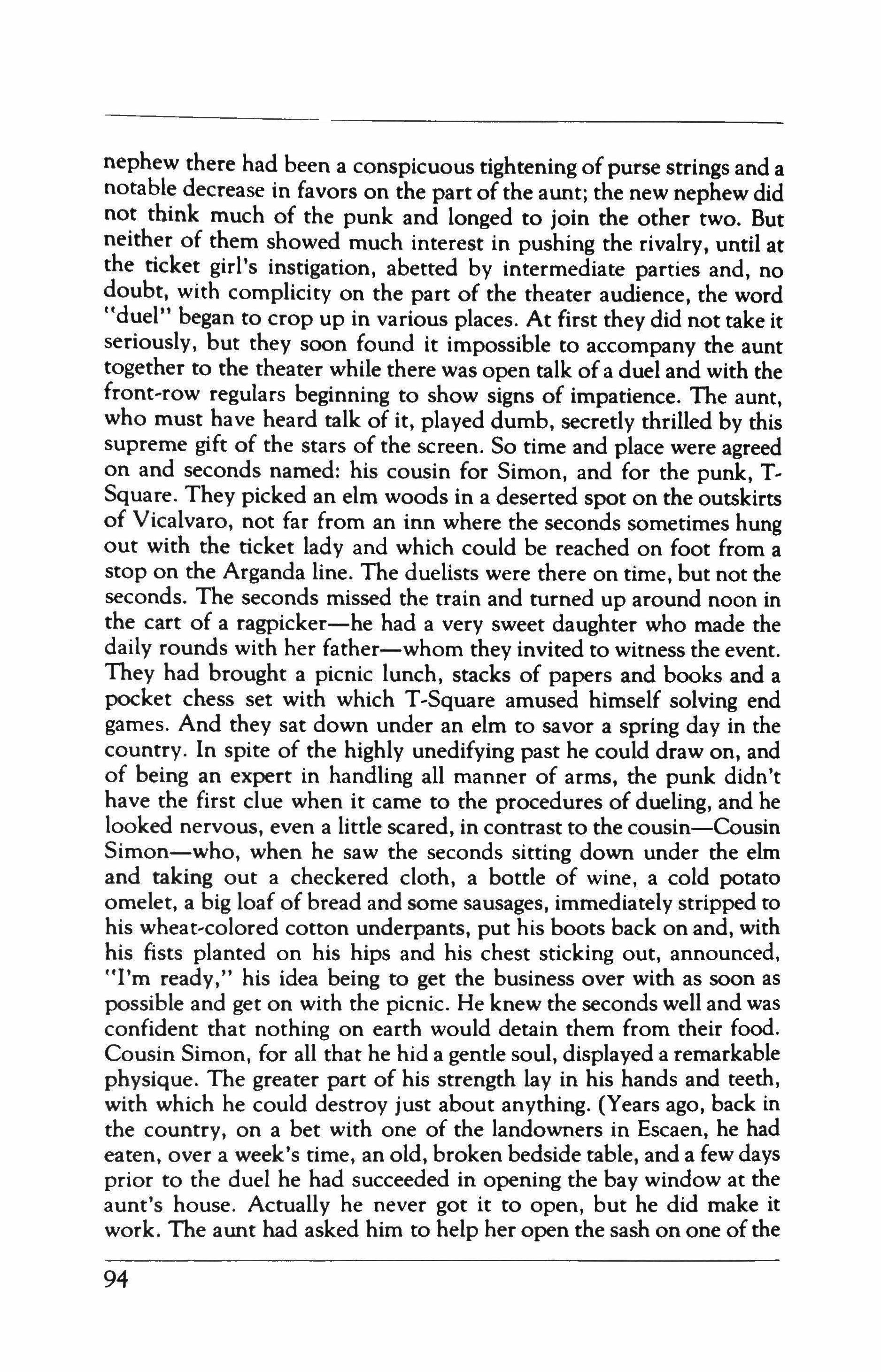
nephew there had been a conspicuous tightening of purse strings and a notable decrease in favors on the part of the aunt; the new nephew did not think much of the punk and longed to join the other two. But neither of them showed much interest in pushing the rivalry, until at the ticket girl's instigation, abetted by intermediate parties and, no doubt, with complicity on the part of the theater audience, the word "duel" began to crop up in various places. At first they did not take it seriously, but they soon found it impossible to accompany the aunt together to the theater while there was open talk of a duel and with the front-row regulars beginning to show signs of impatience. The aunt, who must have heard talk of it, played dumb, secretly thrilled by this supreme gift of the stars of the screen. So time and place were agreed on and seconds named: his cousin for Simon, and for the punk, TSquare. They picked an elm woods in a deserted spot on the outskirts of Vicalvaro, not far from an inn where the seconds sometimes hung out with the ticket lady and which could be reached on foot from a stop on the Arganda line. The duelists were there on time, but not the seconds. The seconds missed the train and turned up around noon in the cart of a ragpicker-he had a very sweet daughter who made the daily rounds with her father-whom they invited to witness the event. They had brought a picnic lunch, stacks of papers and books and a pocket chess set with which T-Square amused himself solving end games. And they sat down under an elm to savor a spring day in the country. In spite of the highly unedifying past he could draw on, and of being an expert in handling all manner of arms, the punk didn't have the first clue when it came to the procedures of dueling, and he looked nervous, even a little scared, in contrast to the cousin-Cousin Simon-who, when he saw the seconds sitting down under the elm and taking out a checkered cloth, a bottle of wine, a cold potato omelet, a big loaf of bread and some sausages, immediately stripped to his wheat-colored cotton underpants, put his boots back on and, with his fists planted on his hips and his chest sticking out, announced, "I'm ready," his idea being to get the business over with as soon as possible and get on with the picnic. He knew the seconds well and was confident that nothing on earth would detain them from their food. Cousin Simon, for all that he hid a gentle soul, displayed a remarkable physique. The greater part of his strength lay in his hands and teeth, with which he could destroy just about anything. (Years ago, back in the country, on a bet with one of the landowners in Escaen, he had eaten, over a week's time, an old, broken bedside table, and a few days prior to the duel he had succeeded in opening the bay window at the aunt's house. Actually he never got it to open, but he did make it work. The aunt had asked him to help her open the sash on one of the
94
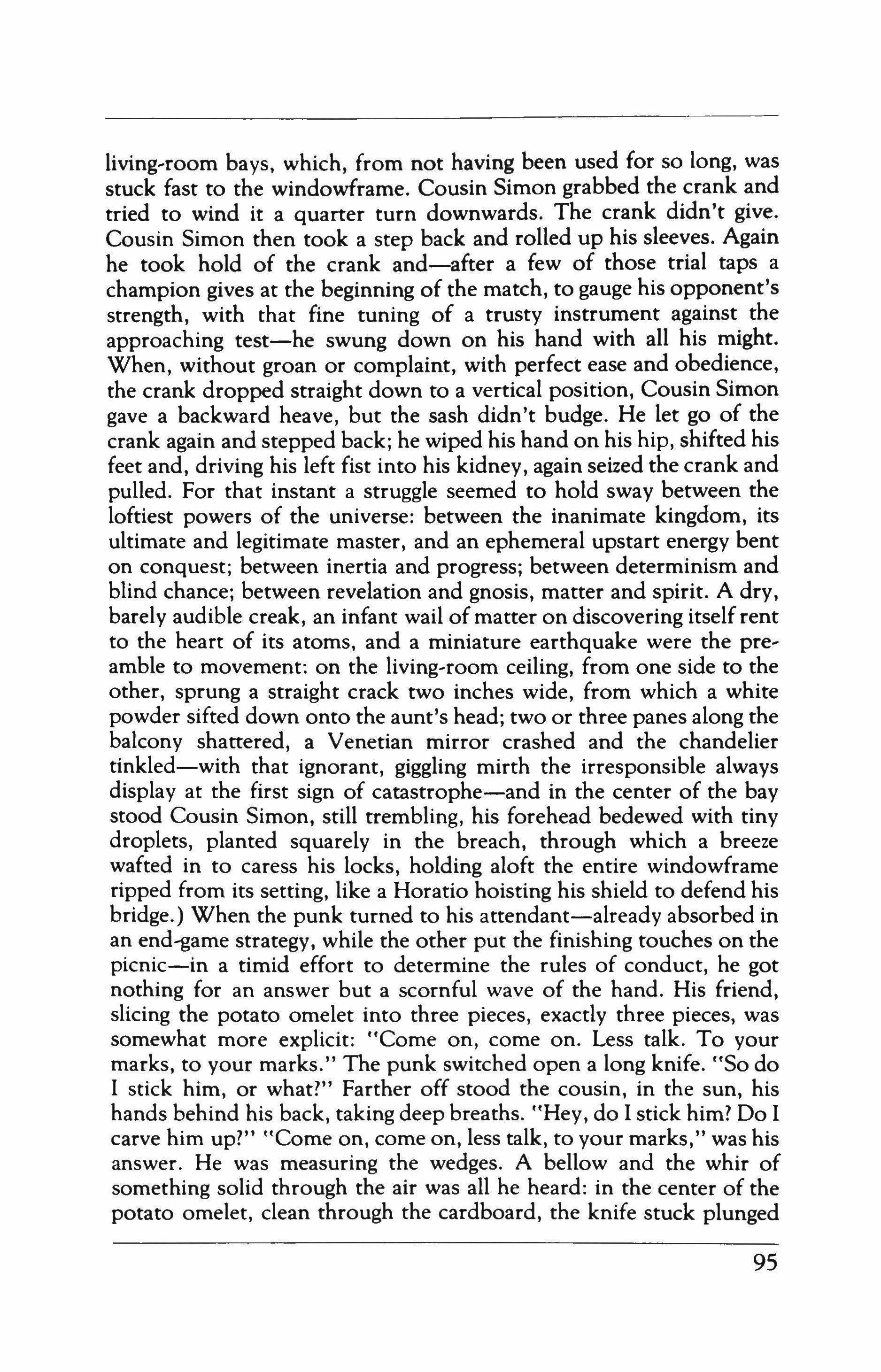
living-room bays, which, from not having been used for so long, was stuck fast to the windowframe. Cousin Simon grabbed the crank and tried to wind it a quarter turn downwards. The crank didn't give. Cousin Simon then took a step back and rolled up his sleeves. Again he took hold of the crank and-after a few of those trial taps a champion gives at the beginning of the match, to gauge his opponent's strength, with that fine tuning of a trusty instrument against the approaching test-he swung down on his hand with all his might. When, without groan or complaint, with perfect ease and obedience, the crank dropped straight down to a vertical position, Cousin Simon gave a backward heave, but the sash didn't budge. He let go of the crank again and stepped back; he wiped his hand on his hip, shifted his feet and, driving his left fist into his kidney, again seized the crank and pulled. For that instant a struggle seemed to hold sway between the loftiest powers of the universe: between the inanimate kingdom, its ultimate and legitimate master, and an ephemeral upstart energy bent on conquest; between inertia and progress; between determinism and blind chance; between revelation and gnosis, matter and spirit. A dry, barely audible creak, an infant wail of matter on discovering itself rent to the heart of its atoms, and a miniature earthquake were the pre, amble to movement: on the living-room ceiling, from one side to the other, sprung a straight crack two inches wide, from which a white powder sifted down onto the aunt's head; two or three panes along the balcony shattered, a Venetian mirror crashed and the chandelier tinkled-with that ignorant, giggling mirth the irresponsible always display at the first sign of catastrophe-and in the center of the bay stood Cousin Simon, still trembling, his forehead bedewed with tiny droplets, planted squarely in the breach, through which a breeze wafted in to caress his locks, holding aloft the entire windowframe ripped from its setting, like a Horatio hoisting his shield to defend his bridge.) When the punk turned to his attendant-already absorbed in an end-game strategy, while the other put the finishing touches on the picnic-in a timid effort to determine the rules of conduct, he got nothing for an answer but a scornful wave of the hand. His friend, slicing the potato omelet into three pieces, exactly three pieces, was somewhat more explicit: "Come on, come on. Less talk. To your marks, to your marks." The punk switched open a long knife. "So do I stick him, or what?" Farther off stood the cousin, in the sun, his hands behind his back, taking deep breaths. "Hey, do I stick him? Do I carve him up?" "Come on, come on, less talk, to your marks," was his answer. He was measuring the wedges. A bellow and the whir of something solid through the air was all he heard: in the center of the potato omelet, clean through the cardboard, the knife stuck plunged
95
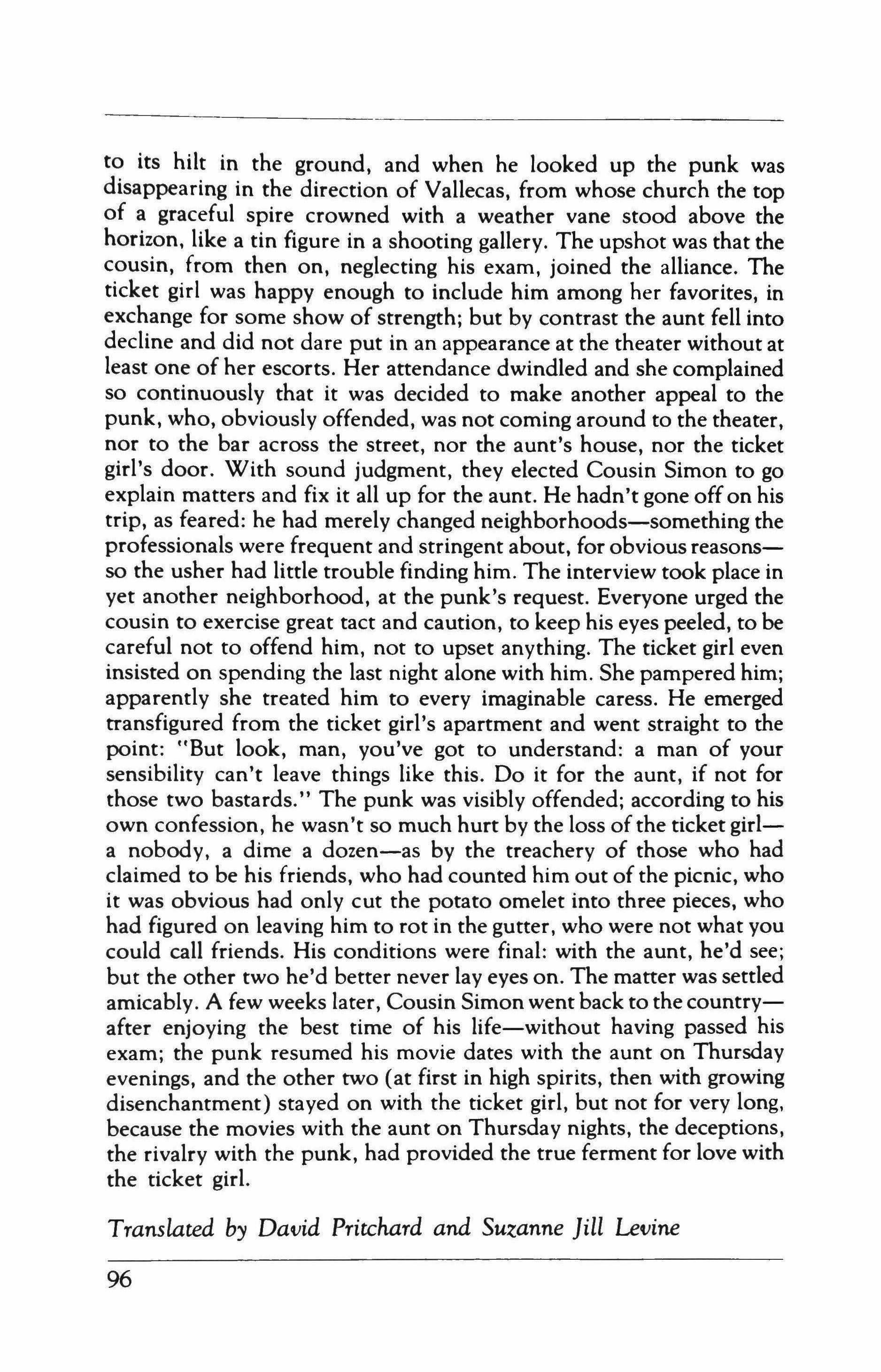
to its hilt in the ground, and when he looked up the punk was disappearing in the direction of Vallecas, from whose church the top of a graceful spire crowned with a weather vane stood above the horizon, like a tin figure in a shooting gallery. The upshot was that the cousin, from then on, neglecting his exam, joined the alliance. The ticket girl was happy enough to include him among her favorites, in exchange for some show of strength; but by contrast the aunt fell into decline and did not dare put in an appearance at the theater without at least one of her escorts. Her attendance dwindled and she complained so continuously that it was decided to make another appeal to the punk, who, obviously offended, was not coming around to the theater, nor to the bar across the street, nor the aunt's house, nor the ticket girl's door. With sound judgment, they elected Cousin Simon to go explain matters and fix it all up for the aunt. He hadn't gone off on his trip, as feared: he had merely changed neighborhoods-something the professionals were frequent and stringent about, for obvious reasonsso the usher had little trouble finding him. The interview took place in yet another neighborhood, at the punk's request. Everyone urged the cousin to exercise great tact and caution, to keep his eyes peeled, to be careful not to offend him, not to upset anything. The ticket girl even insisted on spending the last night alone with him. She pampered him; apparently she treated him to every imaginable caress. He emerged transfigured from the ticket girl's apartment and went straight to the point: "But look, man, you've got to understand: a man of your sensibility can't leave things like this. Do it for the aunt, if not for those two bastards." The punk was visibly offended; according to his own confession, he wasn't so much hurt by the loss ofthe ticket girla nobody, a dime a dozen-as by the treachery of those who had claimed to be his friends, who had counted him out of the picnic, who it was obvious had only cut the potato omelet into three pieces, who had figured on leaving him to rot in the gutter, who were not what you could call friends. His conditions were final: with the aunt, he'd see; but the other two he'd better never lay eyes on. The matter was settled amicably. A few weeks later, Cousin Simon went back to the countryafter enjoying the best time of his life-without having passed his exam; the punk resumed his movie dates with the aunt on Thursday evenings, and the other two (at first in high spirits, then with growing disenchantment) stayed on with the ticket girl, but not for very long, because the movies with the aunt on Thursday nights, the deceptions, the rivalry with the punk, had provided the true ferment for love with the ticket girl.
Translated by David Pritchard and Suzanne Jill Levine
96
From Someday I'll be back
Juan Marse
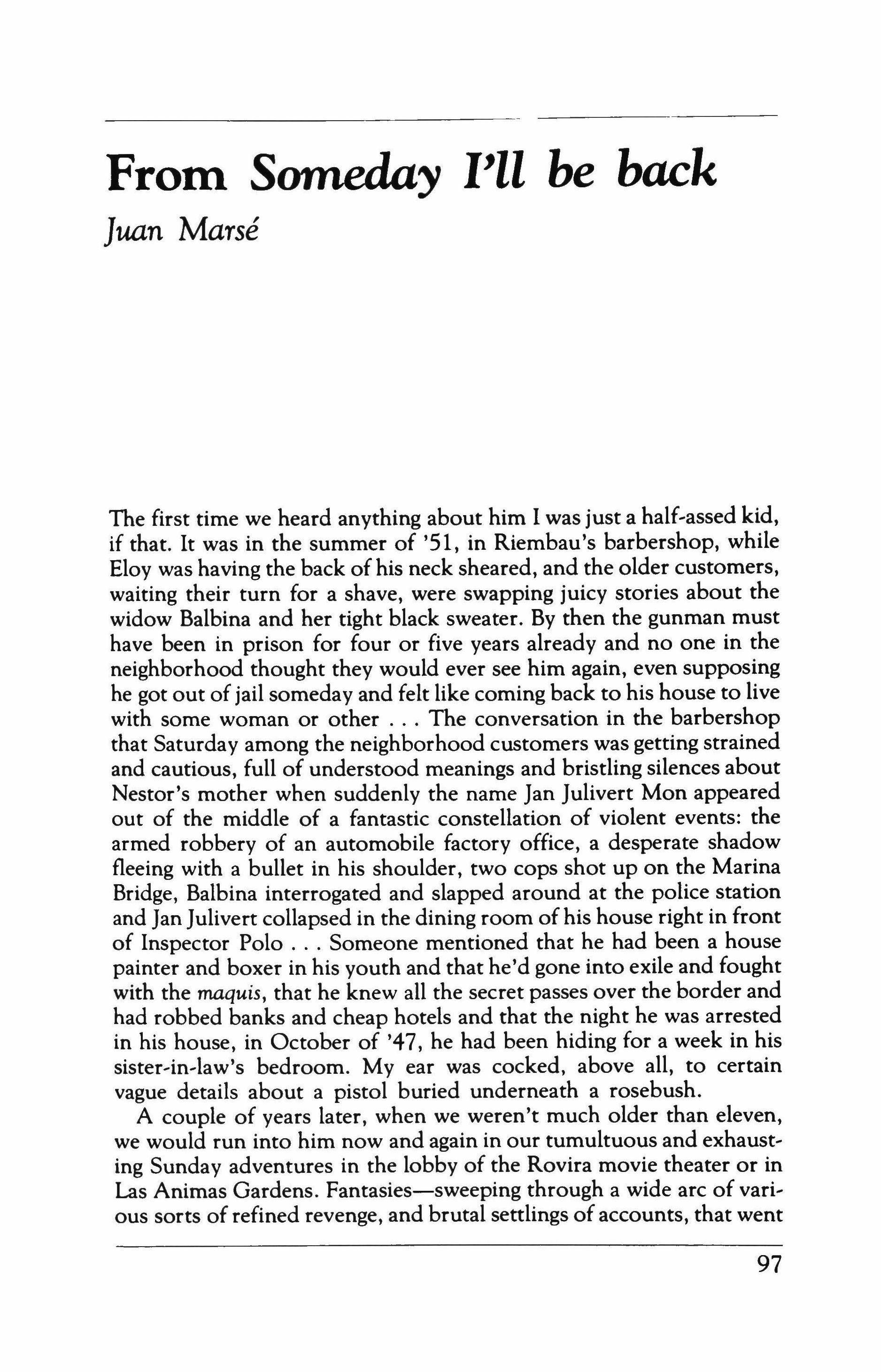
The first time we heard anything about him I was just a half-assed kid, if that. It was in the summer of '51, in Riembau's barbershop, while Eloy was having the back ofhis neck sheared, and the older customers, waiting their turn for a shave, were swapping juicy stories about the widow Balbina and her tight black sweater. By then the gunman must have been in prison for four or five years already and no one in the neighborhood thought they would ever see him again, even supposing he got out ofjail someday and felt like coming back to his house to live with some woman or other The conversation in the barbershop that Saturday among the neighborhood customers was getting strained and cautious, full of understood meanings and bristling silences about Nestor's mother when suddenly the name Jan julivert Mon appeared out of the middle of a fantastic constellation of violent events: the armed robbery of an automobile factory office, a desperate shadow fleeing with a bullet in his shoulder, two cops shot up on the Marina Bridge, Balbina interrogated and slapped around at the police station and Jan julivert collapsed in the dining room of his house right in front of Inspector Polo Someone mentioned that he had been a house painter and boxer in his youth and that he'd gone into exile and fought with the maquis, that he knew all the secret passes over the border and had robbed banks and cheap hotels and that the night he was arrested in his house, in October of '47, he had been hiding for a week in his sister-in-law's bedroom. My ear was cocked, above all, to certain vague details about a pistol buried underneath a rosebush.
A couple of years later, when we weren't much older than eleven, we would run into him now and again in our tumultuous and exhaust, ing Sunday adventures in the lobby of the Rovira movie theater or in Las Animas Gardens. Fantasies-sweeping through a wide arc of various sorts of refined revenge, and brutal settlings of accounts, that went
97
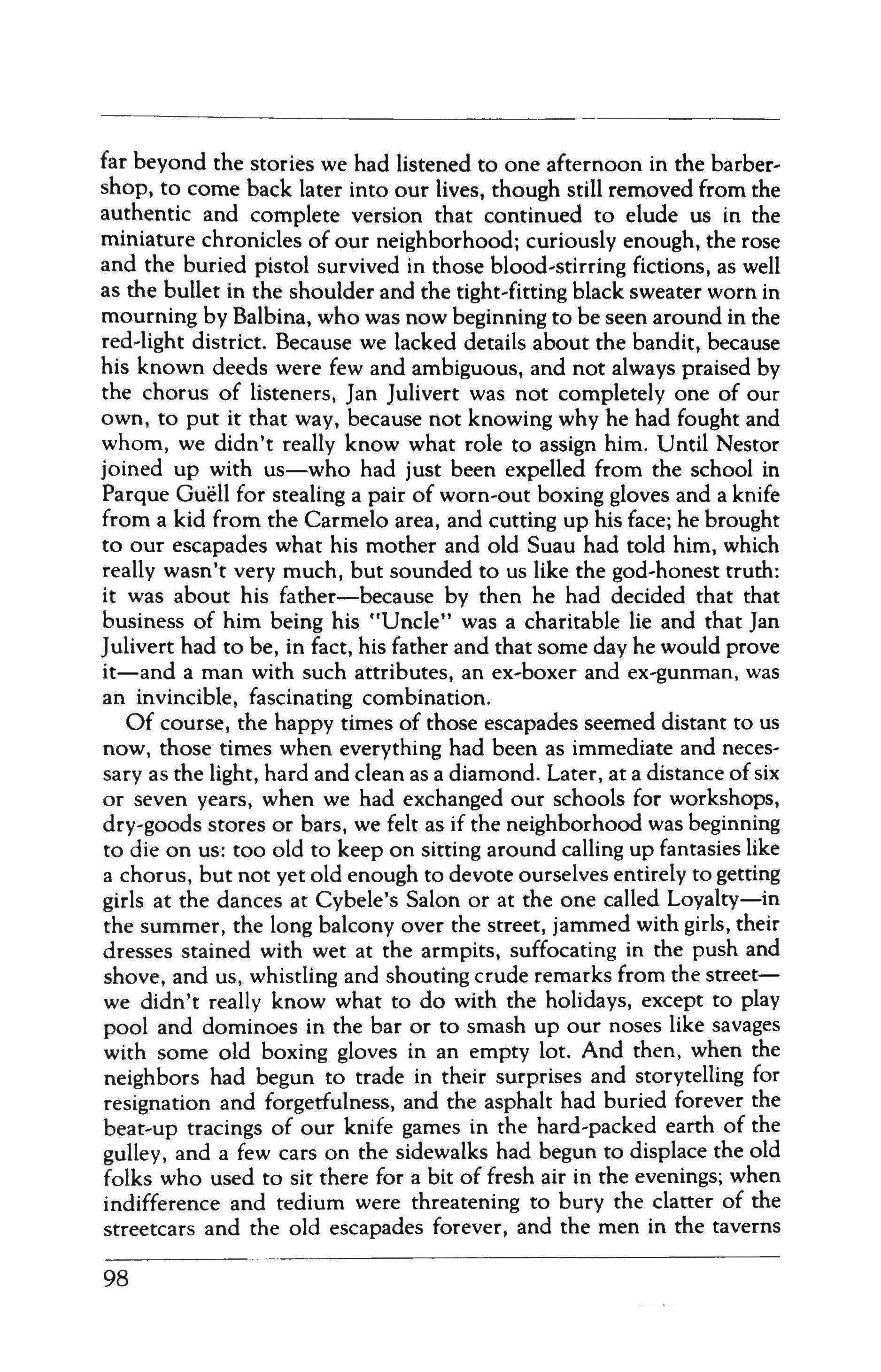
far beyond the stories we had listened to one afternoon in the barbershop, to come back later into our lives, though still removed from the authentic and complete version that continued to elude us in the miniature chronicles of our neighborhood; curiously enough, the rose and the buried pistol survived in those blood-stirring fictions, as well as the bullet in the shoulder and the tight-fitting black sweater worn in mourning by Balbina, who was now beginning to be seen around in the red-light district. Because we lacked details about the bandit, because his known deeds were few and ambiguous, and not always praised by the chorus of listeners, Jan julivert was not completely one of our own, to put it that way, because not knowing why he had fought and whom, we didn't really know what role to assign him. Until Nestor joined up with us-who had just been expelled from the school in Parque Guell for stealing a pair of worn-out boxing gloves and a knife from a kid from the Carmelo area, and cutting up his face; he brought to our escapades what his mother and old Suau had told him, which really wasn't very much, but sounded to us like the god-honest truth: it was about his father-because by then he had decided that that business of him being his "Uncle" was a charitable lie and that Jan Julivert had to be, in fact, his father and that some day he would prove it-and a man with such attributes, an ex-boxer and ex-gunman, was an invincible, fascinating combination.
Of course, the happy times of those escapades seemed distant to us now, those times when everything had been as immediate and necessary as the light, hard and clean as a diamond. Later, at a distance of six or seven years, when we had exchanged our schools for workshops, dry-goods stores or bars, we felt as if the neighborhood was beginning to die on us: too old to keep on sitting around calling up fantasies like a chorus, but not yet old enough to devote ourselves entirely to getting girls at the dances at Cybele's Salon or at the one called Loyalty-in the summer, the long balcony over the street, jammed with girls, their dresses stained with wet at the armpits, suffocating in the push and shove, and us, whistling and shouting crude remarks from the streetwe didn't really know what to do with the holidays, except to play pool and dominoes in the bar or to smash up our noses like savages with some old boxing gloves in an empty lot. And then, when the neighbors had begun to trade in their surprises and storytelling for resignation and forgetfulness, and the asphalt had buried forever the beat-up tracings of our knife games in the hard-packed earth of the gulley, and a few cars on the sidewalks had begun to displace the old folks who used to sit there for a bit of fresh air in the evenings; when indifference and tedium were threatening to bury the clatter of the streetcars and the old escapades forever, and the men in the taverns
98
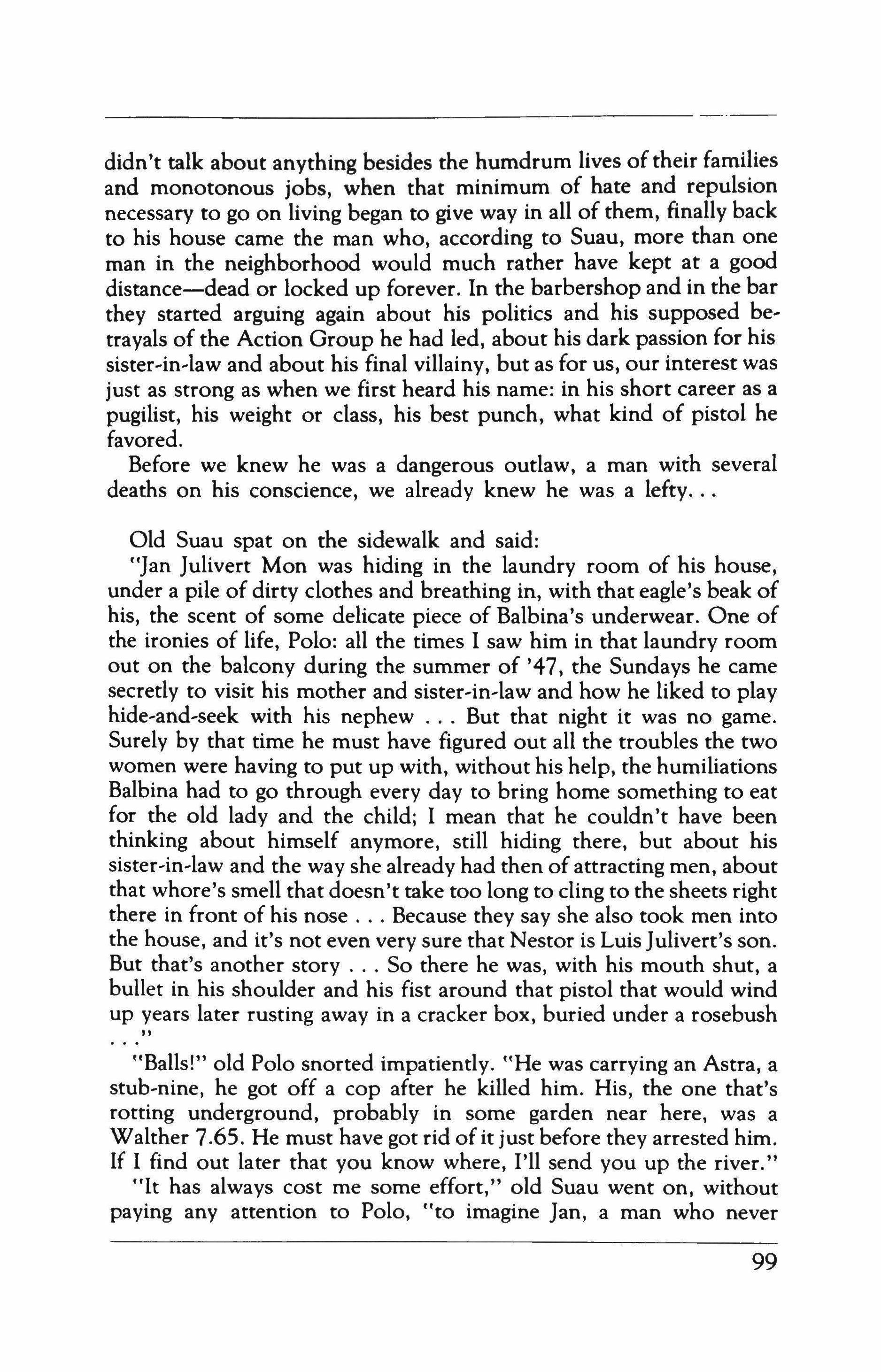
didn't talk about anything besides the humdrum lives oftheir families and monotonous jobs, when that minimum of hate and repulsion necessary to go on living began to give way in all of them, finally back to his house came the man who, according to Suau, more than one man in the neighborhood would much rather have kept at a good distance-dead or locked up forever. In the barbershop and in the bar they started arguing again about his politics and his supposed be' trayals of the Action Group he had led, about his dark passion for his sister-in-law and about his final villainy, but as for us, our interest was just as strong as when we first heard his name: in his short career as a pugilist, his weight or class, his best punch, what kind of pistol he favored.
Before we knew he was a dangerous outlaw, a man with several deaths on his conscience, we already knew he was a lefty
Old Suau spat on the sidewalk and said:
"Jan [ulivert Mon was hiding in the laundry room of his house, under a pile of dirty clothes and breathing in, with that eagle's beak of his, the scent of some delicate piece of Balbina's underwear. One of the ironies of life, Polo: all the times I saw him in that laundry room out on the balcony during the summer of '47, the Sundays he came secretly to visit his mother and sister-in-law and how he liked to play hide-and-seek with his nephew But that night it was no game. Surely by that time he must have figured out all the troubles the two women were having to put up with, without his help, the humiliations Balbina had to go through every day to bring home something to eat for the old lady and the child; I mean that he couldn't have been thinking about himself anymore, still hiding there, but about his sister-in-law and the way she already had then of attracting men, about that whore's smell that doesn't take too long to cling to the sheets right there in front of his nose Because they say she also took men into the house, and it's not even very sure that Nestor is Luis juliverr's son. But that's another story So there he was, with his mouth shut, a bullet in his shoulder and his fist around that pistol that would wind up years later rusting away in a cracker box, buried under a rosebush
"Balls!" old Polo snorted impatiently. "He was carrying an Astra, a stub-nine, he got off a cop after he killed him. His, the one that's rotting underground, probably in some garden near here, was a Walther 7.65. He must have got rid of it just before they arrested him. If I find out later that you know where, I'll send you up the river."
"It has always cost me some effort," old Suau went on, without paying any attention to Polo, "to imagine Jan, a man who never
99
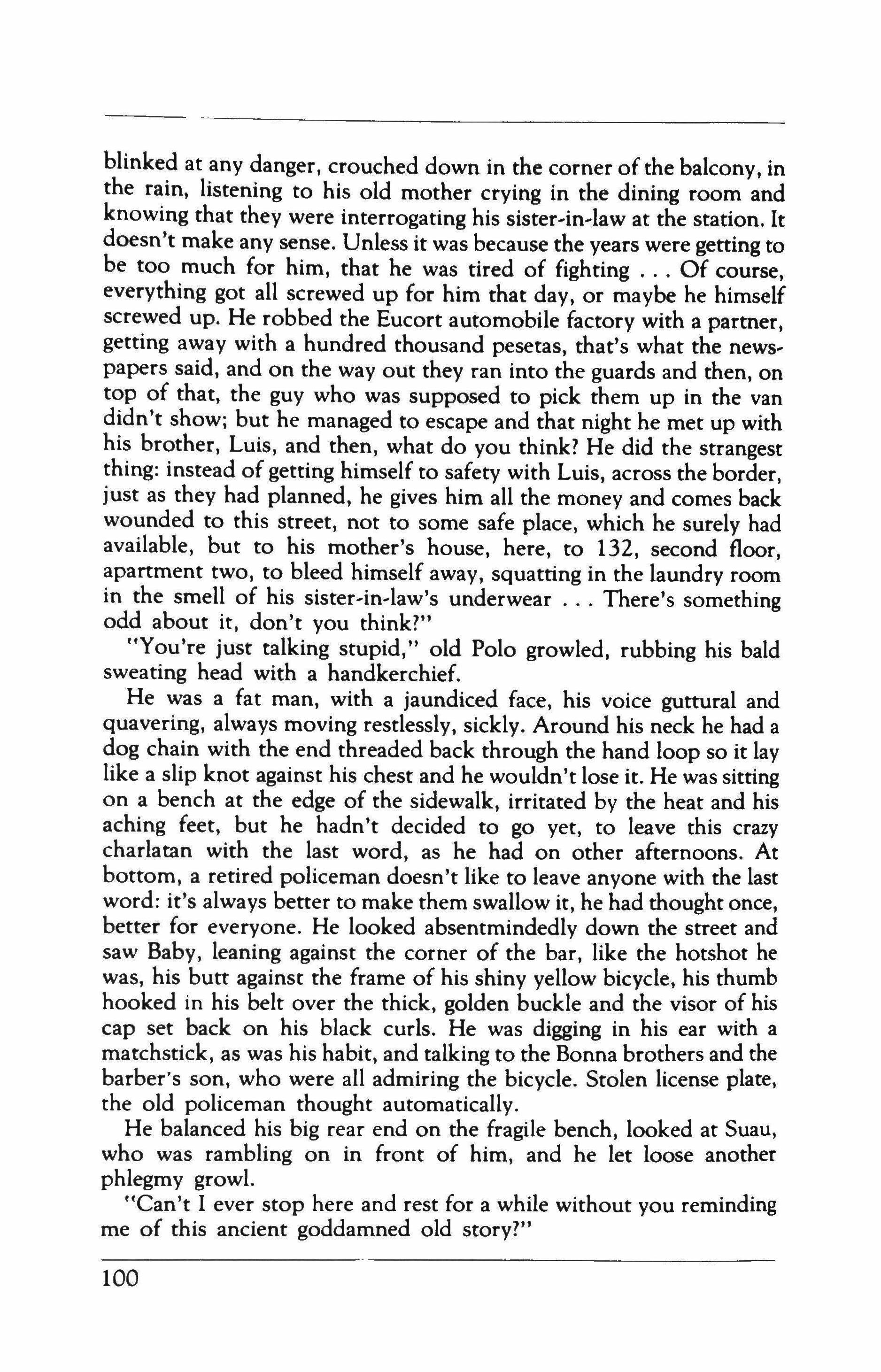
blinked at any danger, crouched down in the corner of the balcony, in the rain, listening to his old mother crying in the dining room and knowing that they were interrogating his sister-in-law at the station. It doesn't make any sense. Unless it was because the years were getting to be too much for him, that he was tired of fighting Of course, everything got all screwed up for him that day, or maybe he himself screwed up. He robbed the Eucort automobile factory with a partner, getting away with a hundred thousand pesetas, that's what the newspapers said, and on the way out they ran into the guards and then, on top of that, the guy who was supposed to pick them up in the van didn't show; but he managed to escape and that night he met up with his brother, Luis, and then, what do you think? He did the strangest thing: instead of getting himself to safety with Luis, across the border, just as they had planned, he gives him all the money and comes back wounded to this street, not to some safe place, which he surely had available, but to his mother's house, here, to 132, second floor, apartment two, to bleed himself away, squatting in the laundry room in the smell of his sister-in-law's underwear There's something odd about it, don't you think?"
"You're just talking stupid," old Polo growled, rubbing his bald sweating head with a handkerchief.
He was a fat man, with a jaundiced face, his voice guttural and quavering, always moving restlessly, sickly. Around his neck he had a dog chain with the end threaded back through the hand loop so it lay like a slip knot against his chest and he wouldn't lose it. He was sitting on a bench at the edge of the sidewalk, irritated by the heat and his aching feet, but he hadn't decided to go yet, to leave this crazy charlatan with the last word, as he had on other afternoons. At bottom, a retired policeman doesn't like to leave anyone with the last word: it's always better to make them swallow it, he had thought once, better for everyone. He looked absentmindedly down the street and saw Baby, leaning against the corner of the bar, like the hotshot he was, his butt against the frame of his shiny yellow bicycle, his thumb hooked in his belt over the thick, golden buckle and the visor of his cap set back on his black curls. He was digging in his ear with a matchstick, as was his habit, and talking to the Bonna brothers and the barber's son, who were all admiring the bicycle. Stolen license plate, the old policeman thought automatically.
He balanced his big rear end on the fragile bench, looked at Suau, who was rambling on in front of him, and he let loose another phlegmy growl.
"Can't I ever stop here and rest for a while without you reminding me of this ancient goddarnned old story?" 100
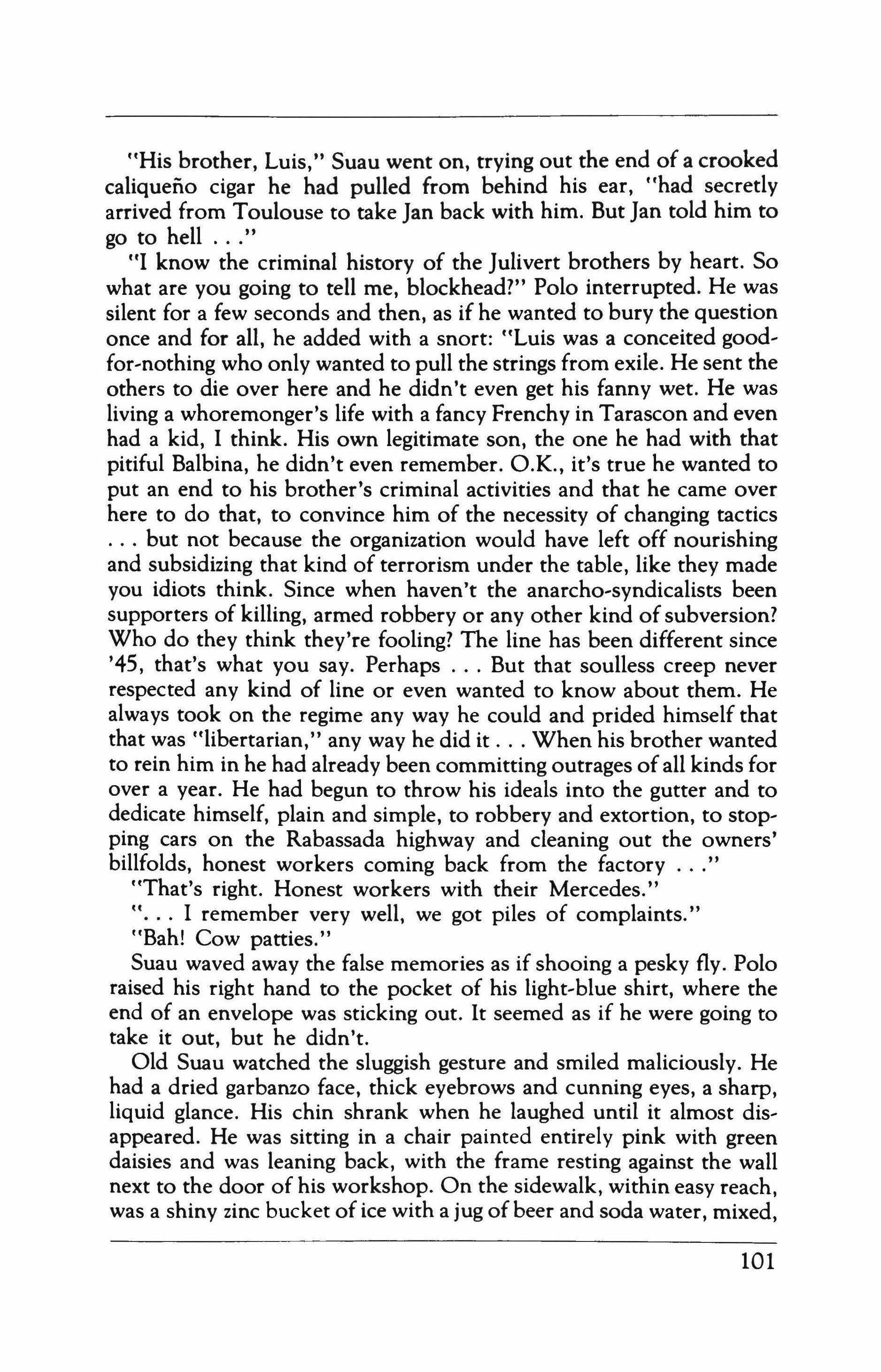
"His brother, Luis," Suau went on, trying out the end of a crooked caliquefio cigar he had pulled from behind his ear, "had secretly arrived from Toulouse to take Jan back with him. But Jan told him to go to hell
"I know the criminal history of the julivert brothers by heart. So what are you going to tell me, blockhead?" Polo interrupted. He was silent for a few seconds and then, as if he wanted to bury the question once and for all, he added with a snort: "Luis was a conceited goodfor-nothing who only wanted to pull the strings from exile. He sent the others to die over here and he didn't even get his fanny wet. He was living a whoremonger's life with a fancy Frenchy in Tarascon and even had a kid, I think. His own legitimate son, the one he had with that pitiful Balbina, he didn't even remember. O.K., it's true he wanted to put an end to his brother's criminal activities and that he came over here to do that, to convince him of the necessity of changing tactics but not because the organization would have left off nourishing and subsidizing that kind of terrorism under the table, like they made you idiots think. Since when haven't the anarcho-svndicalists been supporters of killing, armed robbery or any other kind ofsubversion? Who do they think they're fooling? The line has been different since '45, that's what you say. Perhaps But that soulless creep never respected any kind of line or even wanted to know about them. He always took on the regime any way he could and prided himself that that was "libertarian," any way he did it
When his brother wanted to rein him in he had already been committing outrages ofall kinds for over a year. He had begun to throw his ideals into the gutter and to dedicate himself, plain and simple, to robbery and extortion, to stopping cars on the Rabassada highway and cleaning out the owners' billfolds, honest workers coming back from the factory "
"That's right. Honest workers with their Mercedes."
". I remember very well, we got piles of complaints."
"Bah! Cow patties."
Suau waved away the false memories as if shooing a pesky fly. Polo raised his right hand to the pocket of his light-blue shirt, where the end of an envelope was sticking out. It seemed as if he were going to take it out, but he didn't.
Old Suau watched the sluggish gesture and smiled maliciously. He had a dried garbanzo face, thick eyebrows and cunning eyes, a sharp, liquid glance. His chin shrank when he laughed until it almost disappeared. He was sitting in a chair painted entirely pink with green daisies and was leaning back, with the frame resting against the wall next to the door of his workshop. On the sidewalk, within easy reach, was a shiny zinc bucket of ice with a jug of beer and soda water, mixed,
101
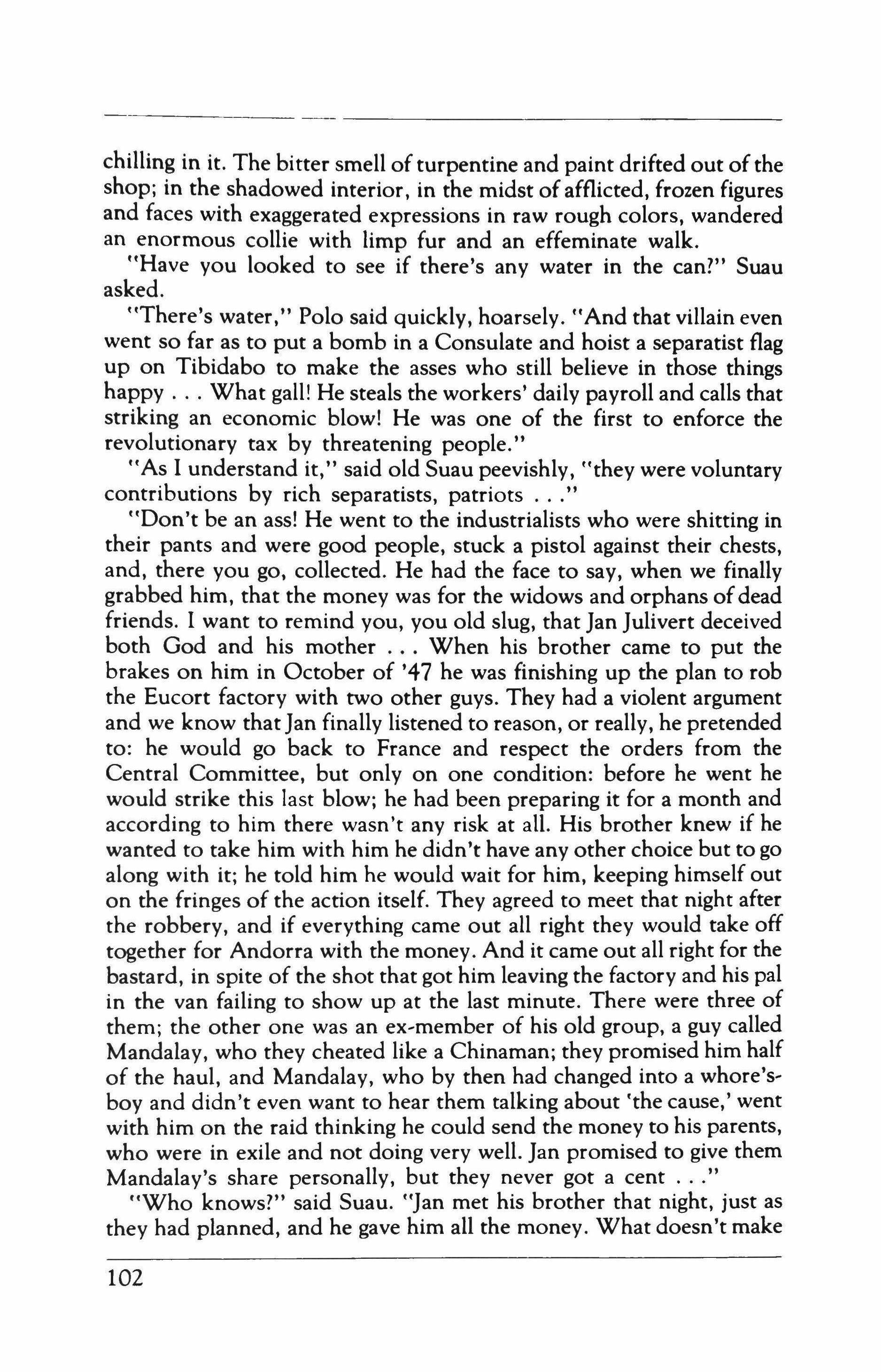
chilling in it. The bitter smell of turpentine and paint drifted out of the shop; in the shadowed interior, in the midst of afflicted, frozen figures and faces with exaggerated expressions in raw rough colors, wandered an enormous collie with limp fur and an effeminate walk.
"Have you looked to see if there's any water in the can?" Suau asked.
"There's water," Polo said quickly, hoarsely. "And that villain even went so far as to put a bomb in a Consulate and hoist a separatist flag up on Tibidabo to make the asses who still believe in those things happy What gall! He steals the workers' daily payroll and calls that striking an economic blow! He was one of the first to enforce the revolutionary tax by threatening people."
"As I understand it," said old Suau peevishly, "they were voluntary contributions by rich separatists, patriots
"Don't be an ass! He went to the industrialists who were shitting in their pants and were good people, stuck a pistol against their chests, and, there you go, collected. He had the face to say, when we finally grabbed him, that the money was for the widows and orphans ofdead friends. I want to remind you, you old slug, that Jan Julivert deceived both God and his mother When his brother carne to put the brakes on him in October of '47 he was finishing up the plan to rob the Eucort factory with two other guys. They had a violent argument and we know that Jan finally listened to reason, or really, he pretended to: he would go back to France and respect the orders from the Central Committee, but only on one condition: before he went he would strike this last blow; he had been preparing it for a month and according to him there wasn't any risk at all. His brother knew if he wanted to take him with him he didn't have any other choice but to go along with it; he told him he would wait for him, keeping himself out on the fringes of the action itself. They agreed to meet that night after the robbery, and if everything carne out all right they would take off together for Andorra with the money. And it carne out all right for the bastard, in spite of the shot that got him leaving the factory and his pal in the van failing to show up at the last minute. There were three of them; the other one was an ex-member of his old group, a guy called Mandalay, who they cheated like a Chinaman; they promised him half of the haul, and Mandalay, who by then had changed into a whore's, boy and didn't even want to hear them talking about 'the cause,' went with him on the raid thinking he could send the money to his parents, who were in exile and not doing very well. Jan promised to give them Mandalay's share personally, but they never got a cent "
"Who knows?" said Suau. "Jan met his brother that night, just as they had planned, and he gave him all the money. What doesn't make
102
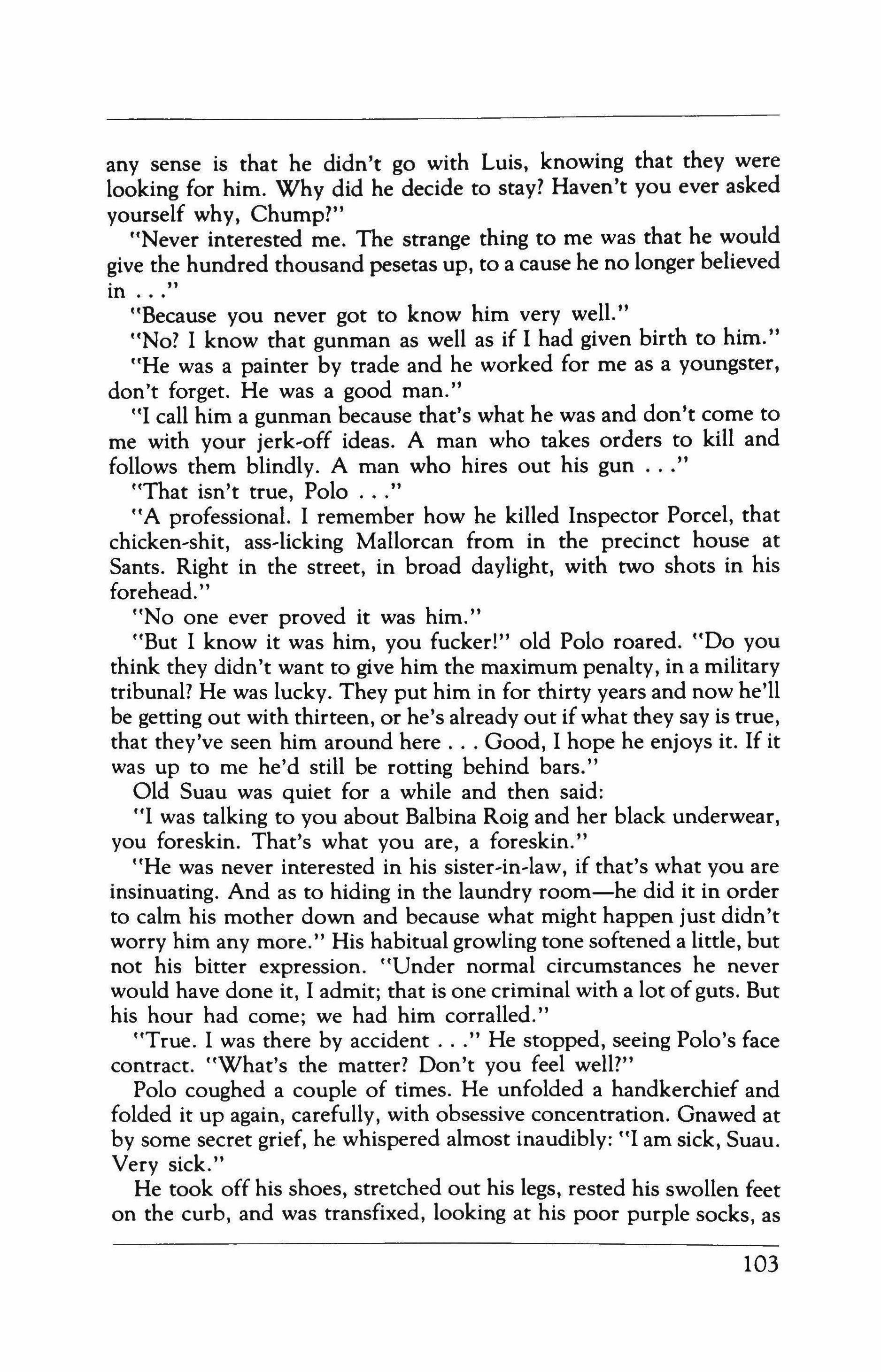
any sense is that he didn't go with Luis, knowing that they were looking for him. Why did he decide to stay? Haven't you ever asked yourself why, Chump?"
"Never interested me. The strange thing to me was that he would give the hundred thousand pesetas up, to a cause he no longer believed in
"Because you never got to know him very well."
"No? I know that gunman as well as if I had given birth to him."
"He was a painter by trade and he worked for me as a youngster, don't forget. He was a good man."
"I call him a gunman because that's what he was and don't come to me with your jerk-off ideas. A man who takes orders to kill and follows them blindly. A man who hires out his gun
"That isn't true, Polo
"A professional. I remember how he killed Inspector Porcel, that chicken-shit, ass-licking Mallorcan from in the precinct house at Sants. Right in the street, in broad daylight, with two shots in his forehead.
"No one ever proved it was him."
"But I know it was him, you fucker!" old Polo roared. "Do you think they didn't want to give him the maximum penalty, in a military tribunal? He was lucky. They put him in for thirty years and now he'll be getting out with thirteen, or he's already out if what they say is true, that they've seen him around here Good, I hope he enjoys it. If it was up to me he'd still be rotting behind bars."
Old Suau was quiet for a while and then said:
"I was talking to you about Balbina Roig and her black underwear, you foreskin. That's what you are, a foreskin."
"He was never interested in his sister-in-law, if that's what you are insinuating. And as to hiding in the laundry room-he did it in order to calm his mother down and because what might happen just didn't worry him any more." His habitual growling tone softened a little, but not his bitter expression. "Under normal circumstances he never would have done it, I admit; that is one criminal with a lot of guts. But his hour had come; we had him corralled."
"True. I was there by accident He stopped, seeing Polo's face contract. "What's the matter? Don't you feel well?"
Polo coughed a couple of times. He unfolded a handkerchief and folded it up again, carefully, with obsessive concentration. Gnawed at by some secret grief, he whispered almost inaudibly: "I am sick, Suau. Very sick."
He took off his shoes, stretched out his legs, rested his swollen feet on the curb, and was transfixed, looking at his poor purple socks, as
103

translucent as spider webs. Suau watched him in silence. Without knowing why, he wondered who washed his clothes and who made his meals and he thought about the small retired-policeman's bar he frequented on Travasera Avenue, and about his lonely flat on Cerdefia Street, his incurable ulcer and his old pistol. His intolerance and his notorious brutalities had at last been checked by cancer, and he had put a silencer on his pistol so he could keep on amusing himself with his young blue centurions, on the deserted side of Mount Pelada, shooting at empty bottles and cans of preserves. He had to amuse his own bitter nature somehow.
The dog appeared in the doorway of the shop and squatted over his back feet, arching his back, straining to drop his dung. Polo put his shoes on again and then with his fingers lightly touched the letter he was carrying in his shirt pocket and muttered:
"I got another one, goddamnit
"Yes, I was in his house by accident that night," old Suau said calmly, but Polo had already gotten up and was busy putting the chain on the collie. Suau said, "Are you going?"
"I'll be back later to see if you've changed your song yet." And holding the dog firmly, his crippled raggedy legs betraying him a little, he set off down the middle of the street.
A half an hour later, Polo came back, still walking Senora Grau's majestic collie. As he did every day, before returning it to the owner, he pulled up to the door of the workshop once more, sat on the bench and took a good swallow from the jug. Then he hung the chain around his neck and took a look at the shit the dog had left there on the sidewalk.
Old Suau continued calmly, as if the retired policeman had not moved from the bench for the whole time.
"I found myself there by accident, painting the ceiling in the hall, way. I was doing it without charging her a nickel, out of affection for the poor old lady, and at night too because I had a lot of work then. From the top of the ladder I saw the boy, who couldn't have been more than five years old, standing in a corner of the dining room. You had just arrived from the police station, with Balbina, after interrogating her for two hours, and the boy was looking at the blood on his mother's split lip with those furious eyes that, now he's grown, take up his whole face ."
"This animal is constipated
"The old lady was sorting through a plate of lentils, sitting at the table, and when she saw what they had done to her daughter-in-law she began to cry; or maybe she was crying for her son hiding in the
104
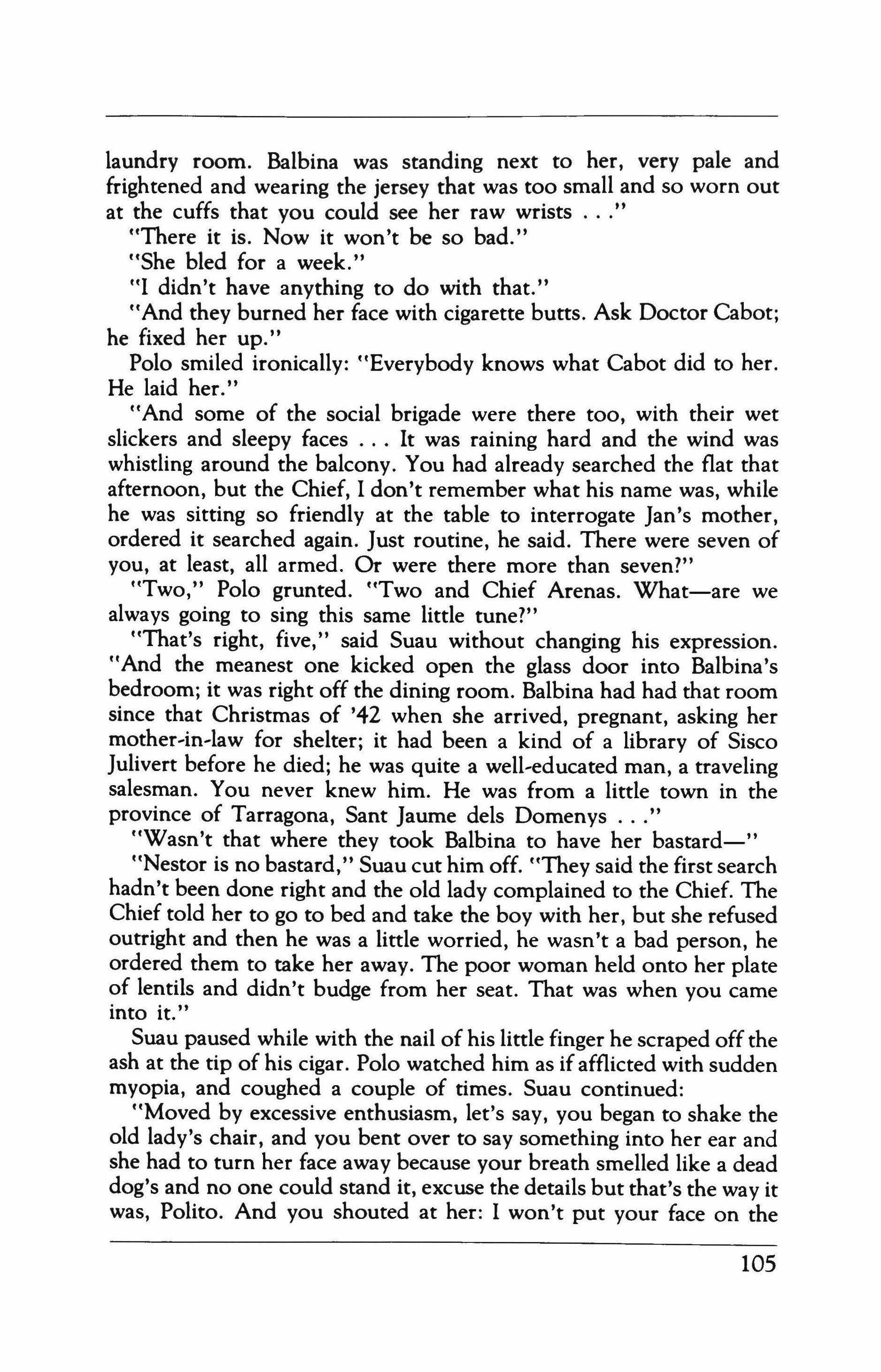
laundry room. Balbina was standing next to her, very pale and frightened and wearing the jersey that was too small and so worn out at the cuffs that you could see her raw wrists
"There it is. Now it won't be so bad."
"She bled for a week."
"I didn't have anything to do with that."
"And they burned her face with cigarette butts. Ask Doctor Cabot; he fixed her up."
Polo smiled ironically: "Everybody knows what Cabot did to her. He laid her."
"And some of the social brigade were there too, with their wet slickers and sleepy faces It was raining hard and the wind was whistling around the balcony. You had already searched the flat that afternoon, but the Chief, I don't remember what his name was, while he was sitting so friendly at the table to interrogate jan's mother, ordered it searched again. Just routine, he said. There were seven of you, at least, all armed. Or were there more than seven?"
"Two," Polo grunted. "Two and Chief Arenas. What-are we always going to sing this same little tune?"
"That's right, five," said Suau without changing his expression. "And the meanest one kicked open the glass door into Balbina's bedroom; it was right off the dining room. Balbina had had that room since that Christmas of '42 when she arrived, pregnant, asking her mother-in-law for shelter; it had been a kind of a library of Sisco julivert before he died; he was quite a well-educated man, a traveling salesman. You never knew him. He was from a little town in the province of Tarragona, Sant Jaume dels Domenys
"Wasn't that where they took Balbina to have her bastard-"
"Nestor is no bastard," Suau cut him off. "They said the first search hadn't been done right and the old lady complained to the Chief. The Chief told her to go to bed and take the boy with her, but she refused outright and then he was a little worried, he wasn't a bad person, he ordered them to take her away. The poor woman held onto her plate of lentils and didn't budge from her seat. That was when you came into it."
Suau paused while with the nail of his little finger he scraped off the ash at the tip of his cigar. Polo watched him as ifafflicted with sudden myopia, and coughed a couple of times. Suau continued:
"Moved by excessive enthusiasm, let's say, you began to shake the old lady's chair, and you bent over to say something into her ear and she had to turn her face away because your breath smelled like a dead dog's and no one could stand it, excuse the details but that's the way it was, Polito. And you shouted at her: I won't put your face on the
105
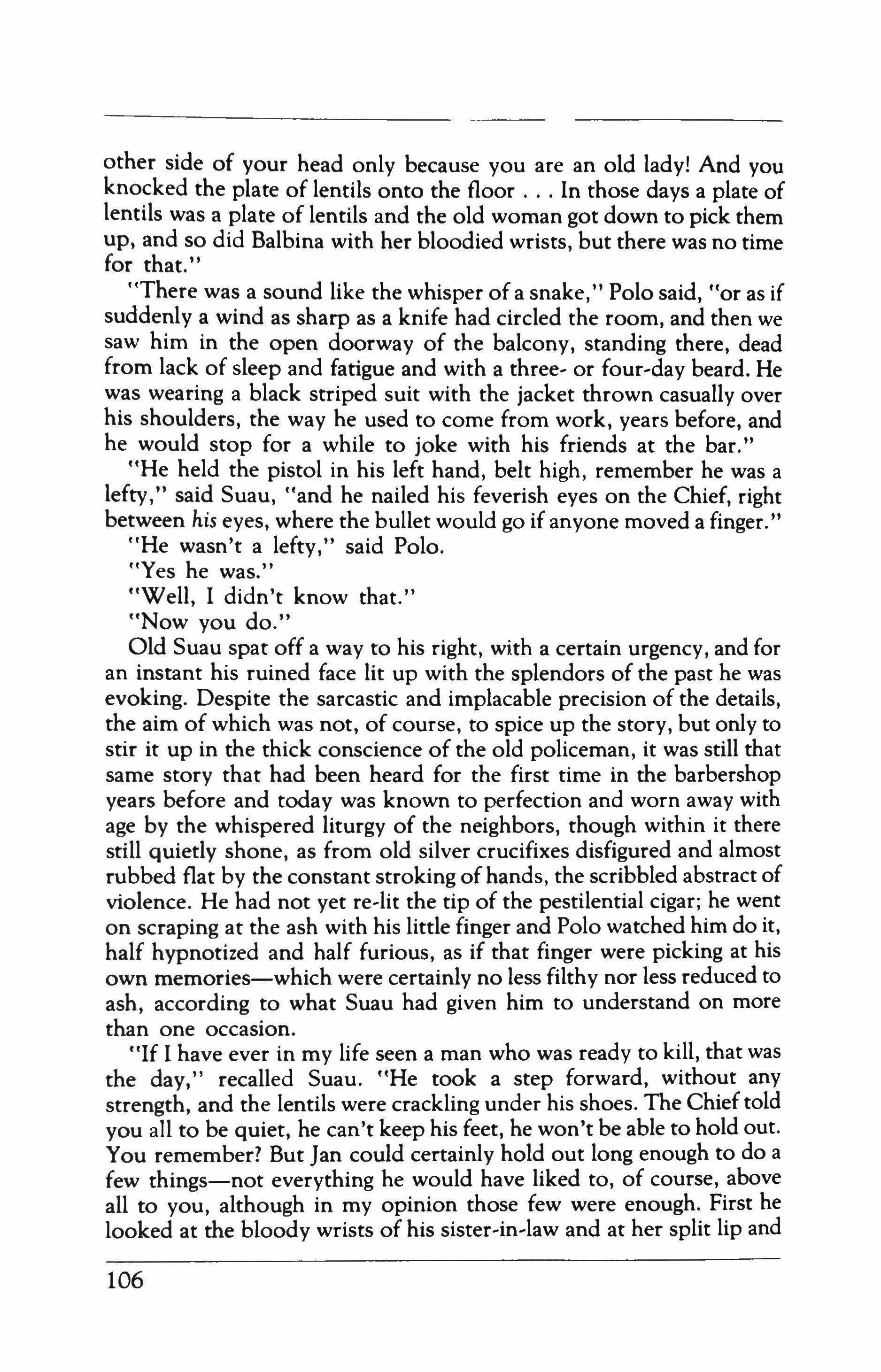
other side of your head only because you are an old lady! And you knocked the plate of lentils onto the floor In those days a plate of lentils was a plate of lentils and the old woman got down to pick them up, and so did Balbina with her bloodied wrists, but there was no time for that."
"There was a sound like the whisper of a snake," Polo said, "or as if suddenly a wind as sharp as a knife had circled the room, and then we saw him in the open doorway of the balcony, standing there, dead from lack of sleep and fatigue and with a three- or four-day beard. He was wearing a black striped suit with the jacket thrown casually over his shoulders, the way he used to come from work, years before, and he would stop for a while to joke with his friends at the bar."
"He held the pistol in his left hand, belt high, remember he was a lefty," said Suau, "and he nailed his feverish eyes on the Chief, right between his eyes, where the bullet would go if anyone moved a finger."
"He wasn't a lefty," said Polo.
"Yes he was."
"Well, I didn't know that."
"Now you do."
Old Suau spat off a way to his right, with a certain urgency, and for an instant his ruined face lit up with the splendors of the past he was evoking. Despite the sarcastic and implacable precision of the details, the aim of which was not, of course, to spice up the story, but only to stir it up in the thick conscience of the old policeman, it was still that same story that had been heard for the first time in the barbershop years before and today was known to perfection and worn away with age by the whispered liturgy of the neighbors, though within it there still quietly shone, as from old silver crucifixes disfigured and almost rubbed flat by the constant stroking of hands, the scribbled abstract of violence. He had not yet re-lit the tip of the pestilential cigar; he went on scraping at the ash with his little finger and Polo watched him do it, half hypnotized and half furious, as if that finger were picking at his own memories-which were certainly no less filthy nor less reduced to ash, according to what Suau had given him to understand on more than one occasion.
"If I have ever in my life seen a man who was ready to kill, that was the day," recalled Suau. "He took a step forward, without any strength, and the lentils were crackling under his shoes. The Chief told you all to be quiet, he can't keep his feet, he won't be able to hold out. You remember? But Jan could certainly hold out long enough to do a few things-not everything he would have liked to, of course, above all to you, although in my opinion those few were enough. First he looked at the bloody wrists of his sister-in-law and at her split lip and
106
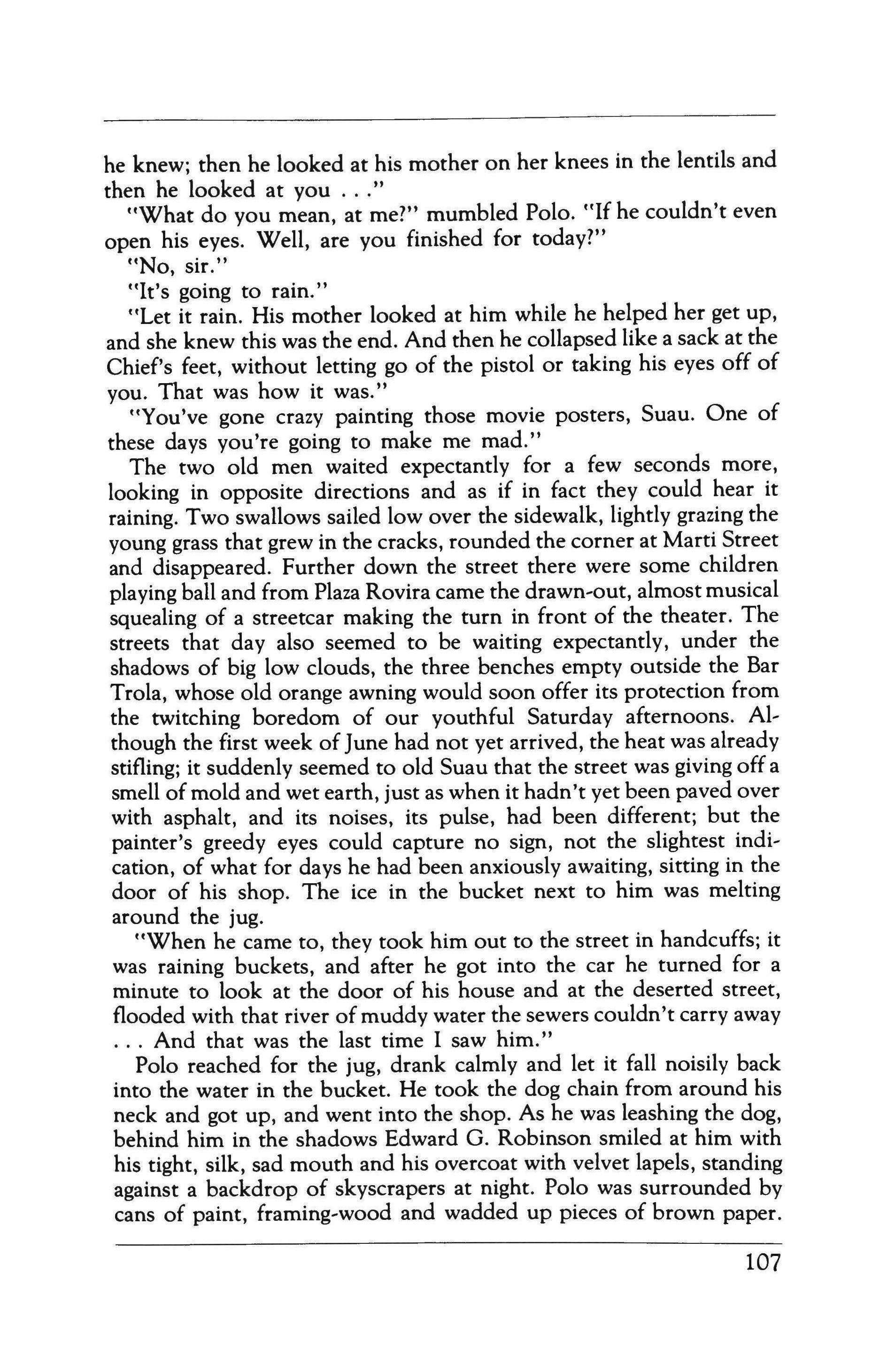
he knew; then he looked at his mother on her knees in the lentils and then he looked at you
"What do you mean, at me?" mumbled Polo. "If he couldn't even open his eyes. Well, are you finished for today?"
"No, sir."
"It's going to rain."
"Let it rain. His mother looked at him while he helped her get up, and she knew this was the end. And then he collapsed like a sack at the Chief's feet, without letting go of the pistol or taking his eyes off of you. That was how it was."
"You've gone crazy painting those movie posters, Suau. One of these days you're going to make me mad."
The two old men waited expectantly for a few seconds more, looking in opposite directions and as if in fact they could hear it raining. Two swallows sailed low over the sidewalk, lightly grazing the young grass that grew in the cracks, rounded the corner at Marti Street and disappeared. Further down the street there were some children playing ball and from Plaza Rovira came the drawn-out, almost musical squealing of a streetcar making the turn in front of the theater. The streets that day also seemed to be waiting expectantly, under the shadows of big low clouds, the three benches empty outside the Bar Trola, whose old orange awning would soon offer its protection from the twitching boredom of our youthful Saturday afternoons. AI� though the first week of June had not yet arrived, the heat was already stifling; it suddenly seemed to old Suau that the street was giving off a smell of mold and wet earth, just as when it hadn't yet been paved over with asphalt, and its noises, its pulse, had been different; but the painter's greedy eyes could capture no sign, not the slightest indication, of what for days he had been anxiously awaiting, sitting in the door of his shop. The ice in the bucket next to him was melting around the jug.
"When he came to, they took him out to the street in handcuffs; it was raining buckets, and after he got into the car he turned for a minute to look at the door of his house and at the deserted street, flooded with that river of muddy water the sewers couldn't carry away And that was the last time I saw him."
Polo reached for the jug, drank calmly and let it fall noisily back into the water in the bucket. He took the dog chain from around his neck and got up, and went into the shop. As he was leashing the dog, behind him in the shadows Edward O. Robinson smiled at him with his tight, silk, sad mouth and his overcoat with velvet lapels, standing against a backdrop of skyscrapers at night. Polo was surrounded by cans of paint, framing-wood and wadded up pieces of brown paper.
107
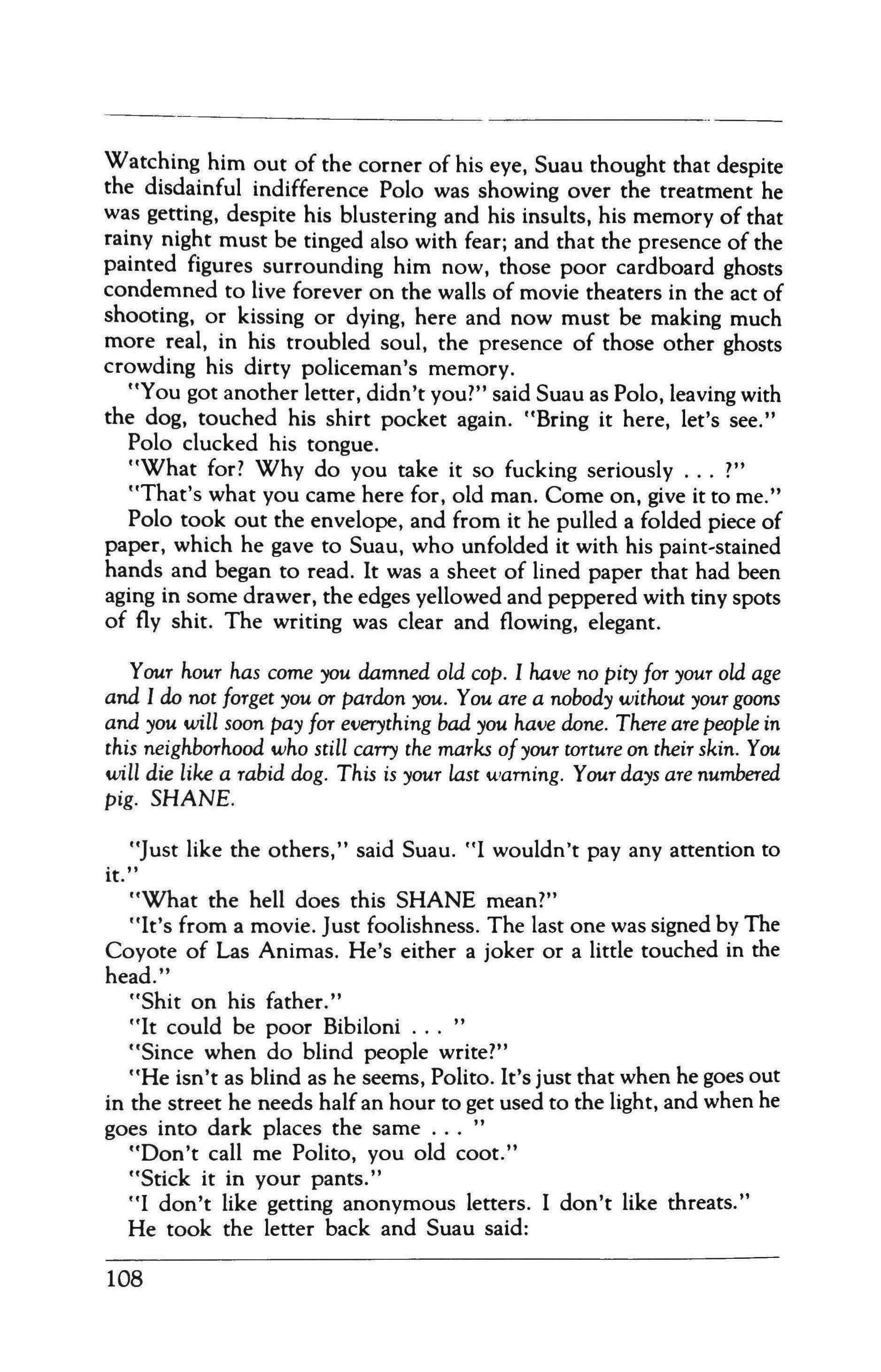
Watching him out of the corner of his eye, Suau thought that despite the disdainful indifference Polo was showing over the treatment he was getting, despite his blustering and his insults, his memory of that rainy night must be tinged also with fear; and that the presence of the painted figures surrounding him now, those poor cardboard ghosts condemned to live forever on the walls of movie theaters in the act of shooting, or kissing or dying, here and now must be making much more real, in his troubled soul, the presence of those other ghosts crowding his dirty policeman's memory.
"You got another letter, didn't you?" said Suau as Polo, leaving with the dog, touched his shirt pocket again. "Bring it here, let's see."
Polo clucked his tongue.
"What for? Why do you take it so fucking seriously ?"
"That's what you came here for, old man. Come on, give it to me."
Polo took out the envelope, and from it he pulled a folded piece of paper, which he gave to Suau, who unfolded it with his paint-stained hands and began to read. It was a sheet of lined paper that had been aging in some drawer, the edges yellowed and peppered with tiny spots of fly shit. The writing was clear and flowing, elegant.
Your hour has come you damned old cop. I have no pity for your old age and I do not forget you or pardon you. You are a nobody without your goons and you will soon pay for everything bad you have done. There are people in this neighborhood who still carry the marks ofyour torture on their skin. Yau will die like a rabid dog. This is your last ulaming. Your days are numbered pig. SHANE.
"Just like the others," said Suau. "I wouldn't pay any attention to it.
"What the hell does this SHANE mean?"
"It's from a movie. Just foolishness. The last one was signed by The Coyote of Las Animas. He's either a joker or a little touched in the head."
"Shit on his father."
"It could be poor Bibiloni
"Since when do blind people write?"
"He isn't as blind as he seems, Polito. It's just that when he goes out in the street he needs half an hour to get used to the light, and when he goes into dark places the same
"Don't call me Polito, you old coot."
"Stick it in your pants."
"I don't like getting anonymous letters. I don't like threats." He took the letter back and Suau said:
108

"I don't know why you hold on to them. All you'll do is make your ulcer worse. How many do you have?"
"Three."
"It's only a joke! Forget it." He unwrinkled his frown and an affectionate light sparkled in his crafty eyes. "What's happening with your new work? Didn't they offer you a guard job in that apartment building at night ?"
"I haven't decided. The night is for sleeping."
"It's got to be better than walking ladies' dogs." Suau saw by the sullen look on his face that he was still pondering the business of the anonymous letters and he said, "I wouldn't take it seriously. It must be a prank."
"Where is Paquita?"
"I don't know."
"Tell her to come out."
"I don't want to. And you're crazy if you think my niece " HI didn't say it was her! It could be one of that gang of shameless jerks that hang out here, one of those lazy friends of hers that don't have any respect for anyone I want her to see the letter."
HAnd how is she going to know who this letter is from?" Suau said roughly. "Do you think that the boys write love letters to a poor little crippled girl, or what? You are getting old, Polo, you're not the bloodhound you used to be."
Polo thought to himself while he was tightening the dog's chain. Then he gave it a strong tug and the animal followed him.
"There's no hurry," he said. "I have all the time in the world now. We shall see who the funny one is. I'll catch him and slap his ideas of playing masked justice right out ofhim I'm going. It's getting late."
After Polo had left, Suau suddenly thought of distant blue moun, tains closing off green, windswept plains and the high peaks rising up behind Shane's back, and he was filled with an overwhelming desire to paint the snow on the peaks.
He got up slowly and went back to work.
Translated by Will Kirkland
109
Contributors

Merce Rodoreda is one of the most highly regarded Catalan writers. She was born in Barcelona in 1909. So Much of Such a War, her most recent novel, was published in Catalan in Spain by Edhasa in 1980. Will Kirkland's translation of Federico Garda Lorca's The Cricket Sings was published by New Directions, and other translations have appeared in Pequod, Hambone, and American Poetry Review. Professor of Ethics at the Universidad del Pais Vasco, Fernando Savater is perhaps Spain's foremost young philosopher. He has written several books on philosophy, a novel, a play, and numerous columns and articles in Spanish newspapers and journals.
Anthony L. Geist teaches Spanish literature and language at Dart, mouth. He has published a book on Spanish poetics of the 1920s and '30s, and is cotranslator of Guillen on Guillen (Princeton, 1979). Geist is currently at work on a book on Rafael Alberti's poetry and on a documentary film on art and literature during the Spanish Civil War. Born in Barcelona in 1931, Juan Goytisolo published his first novel at the age of twenty-one. His novels of Franco Spain have made him one of Spain's most influential writers. Since 1956 Goytisolo has lived in Paris.
Esther Tusquets has published a trilogy of novels, a book ofshort stories, and a children's book, as well as regular contributions to Spanish magazines and newspapers. She presently writes for La Van, guardia, a daily newspaper in Barcelona, where she was born in 1936. Janet Rodney spent many years in Spain, where she worked as a journalist, editor, interpreter, and literary agent. Fernando Quinones was born in Cadiz in 1930. He has published several volumes of poetry and short stories, a novel, and two studies of flamenco art. He is a journalist and a director of Spanish television in Madrid. Paul Hecht has spent twelve years in Spain, including a year on a Fulbright
110
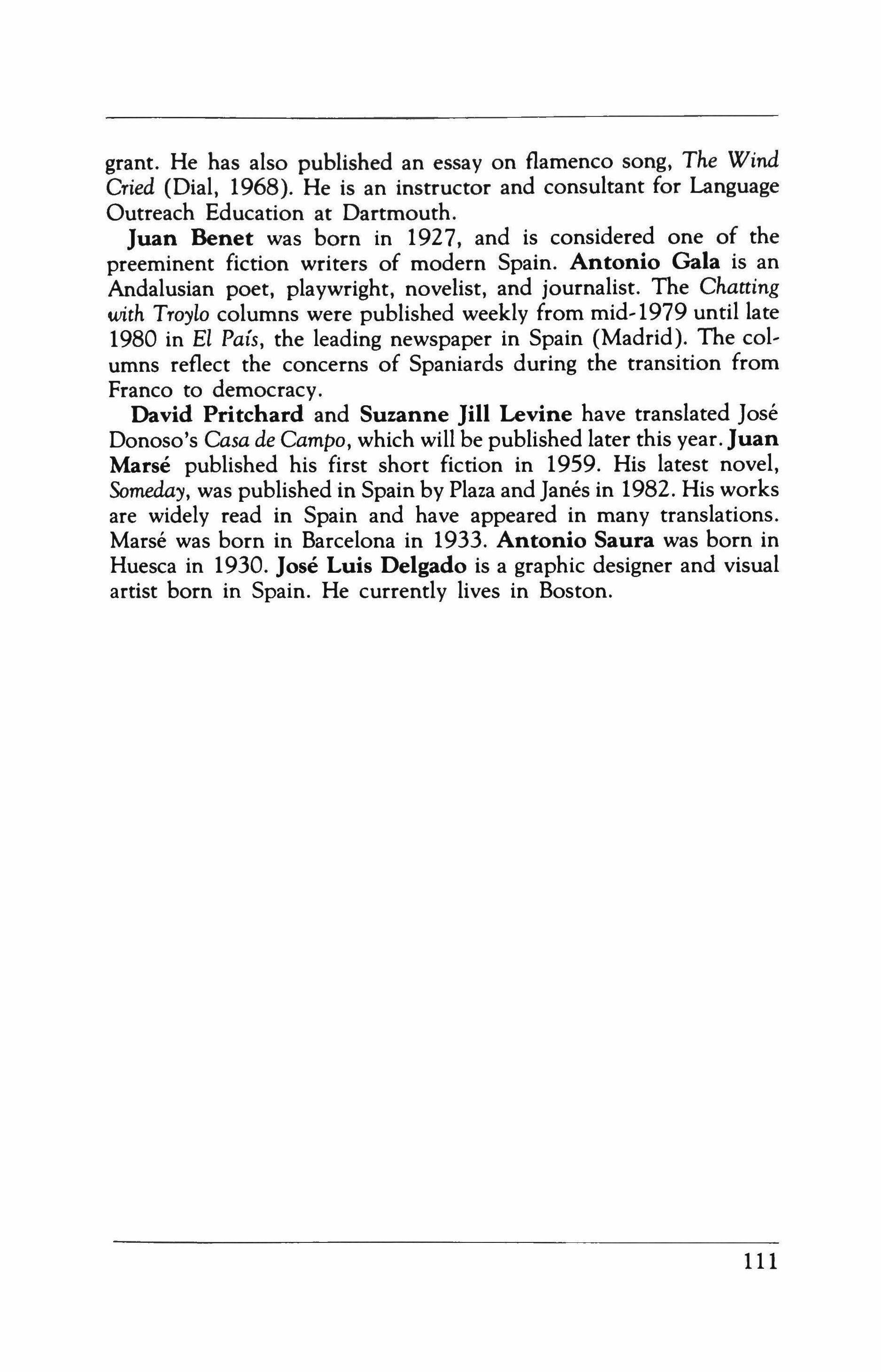
grant. He has also published an essay on flamenco song, The Wind Cried (Dial, 1968). He is an instructor and consultant for Language Outreach Education at Dartmouth.
Juan Benet was born in 1927, and is considered one of the preeminent fiction writers of modern Spain. Antonio Gala is an Andalusian poet, playwright, novelist, and journalist. The Chatting with Troylo columns were published weekly from mid�1979 until late 1980 in El Pais, the leading newspaper in Spain (Madrid). The columns reflect the concerns of Spaniards during the transition from Franco to democracy.
David Pritchard and Suzanne Jill Levine have translated Jose Donoso's Casa de Campo, which will be published later this year. Juan Marse published his first short fiction in 1959. His latest novel, Someday, was published in Spain by Plaza and Janes in 1982. His works are widely read in Spain and have appeared in many translations. Marse was born in Barcelona in 1933. Antonio Saura was born in Huesca in 1930. Jose Luis Delgado is a graphic designer and visual artist born in Spain. He currently lives in Boston.
111
A recent article in the New York Times called TriOuarterly "perhaps the preeminent journal for literary fiction" in America. Founded in 1964, TO publishes three handsome issues a year of fiction, essays, poetry and graphic work, to the continuing acclaim of readers and critics. Now, as a special bonus to new subscribers, we are offering a free back-issue with each subscription. Choose from the following collector's items: #25, Prose for Borges; #26, fiction by Stanley Elkin, Thomas McGuane, Alain Robbe-Grillet, and others; #38, In the Wake of the WAKE, a special forum on the lovcean classic; #37, fiction by Robert Stone, Joyce Carol Oates, Herbert Gold and others on "Love and Hate." Or select any back-issue listed in TO #55 or 56. Join us-and choose your free bonus. Please 0 enter a subscription to TriQuarterly for:
o I enclose $ o Please bill me
o Charge my VISA/MasterCard # Signature
Please start subscription With Issue #

or gift subscriptions are available at $12 for one year and $20 for two years Please send me, free, issue #
o renew o 1 year ($14) o 2 years ($25) o 3 years ($35) o life ($100)
Exp. date
Name Address City State, Zip, Additional

Merce Rodoreda
Fernando Savater
Anthony L. Geist
Juan Goytisolo
Esther Tusquets
Fernando Quinones
Juan Benet
Antonio Gala
Juan Marse
Antonio Saura
Jose Luis Delgado
Spanish neighborhood associations
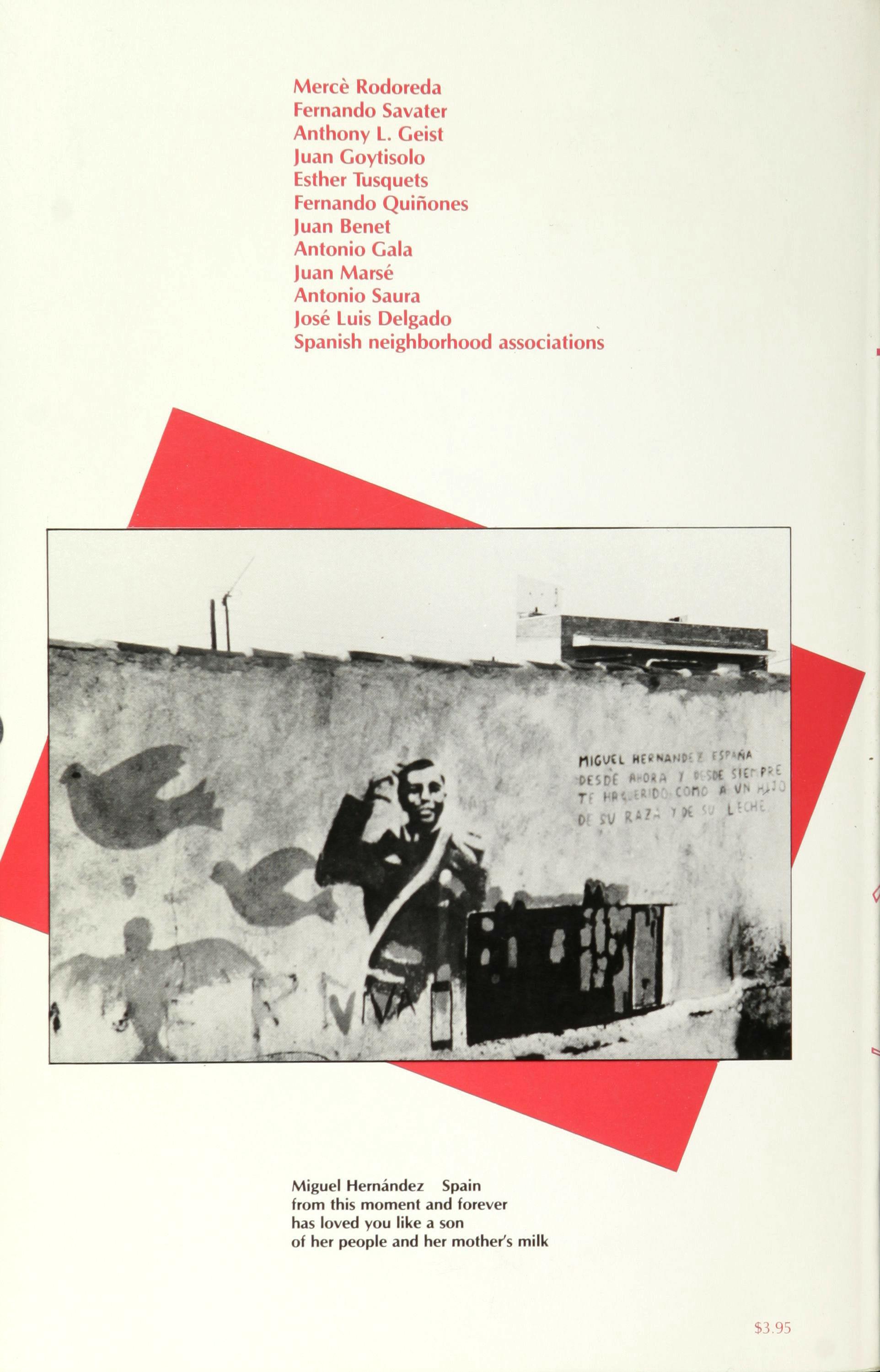
Miguel Hernandez Spain from this moment and forever has loved you like a son of her people and her mother's milk
$3.95



































 Translated
Translated














 Translated
Translated
 Palomares (Madrid, 1976), "'Guemica' Work of P. Picasso/Exiled in the USA - Property of
Palomares (Madrid, 1976), "'Guemica' Work of P. Picasso/Exiled in the USA - Property of


 Palomares (Madrid, 1977), portrait ofAntonio Machado. "Our Spaniard is yawninglIs itfromhunger/Disgust?/Doctor his stomach's probably empty/The emptiness is more likely in his head - Antonio Machado. II
Palomares (Madrid, 1977), portrait ofAntonio Machado. "Our Spaniard is yawninglIs itfromhunger/Disgust?/Doctor his stomach's probably empty/The emptiness is more likely in his head - Antonio Machado. II




 Ser de Sansueiia 1
Ser de Sansueiia 1































































